Blogs
By Apex Advisor Group Inc

December 13, 2025
Top Tax Considerations for Business Succession
Passing a business down feels like handing over a story you wrote with sweat, late nights, and countless decisions. But stories don’t end simply because the author steps away. They twist, they turn, and sometimes they face battles no one saw coming.
Taxes, for example. They’re more than numbers on a page; they’re silent players that can change everything when you least expect it.
And in the world of business succession, understanding those tax shadows is smart and necessary. But what exactly should you watch out for? That’s where the real story begins.
1) Estate Taxes Can Still Apply to Small Business Owners
Plenty of small businesses are asset-rich, even if their cash flow is modest. Commercial property, equipment, trademarks, and client contracts can quietly add up. Once you factor in your business valuation plus your personal home, retirement accounts, and life insurance, it’s not hard to cross the line.
“2025 Federal Estate Tax Exemption:
$13.61 million per individual
~$27.22 million for married couples”
(Source: IRS, Unified Credit under §2010(c))
This looks generous for now, but there’s a deadline ticking. Unless Congress steps in, the exemption gets cut roughly in half after 2025, dropping to around $6 million per person. That puts a lot more small business owners in the taxable range than most people assume.
And here’s the catch: Florida doesn’t have its own estate tax, but that doesn’t make you immune. The federal estate tax rate can reach 40% once you exceed the exemption.
So no, being “small” doesn’t guarantee safety. If your business owns property, holds patents, or carries real value in goodwill, your heirs could be facing a surprise tax bill, one that could force them to sell assets just to pay it.
2) Why You Need a Professional Valuation for Your Business
Many owners lean on informal estimates when valuing their business—especially during succession planning—but that guesswork can lead to major tax issues. When it’s time to transfer ownership or pass the business through an estate, the IRS expects proper documentation backed by a qualified, credentialed appraisal. Without it, both the owner and successor risk unexpected tax assessments.
IRS Requirement:
Qualified appraisals are required for business transfers during estate or gift planning.
“Undervaluation can result in penalties up to 40% of the tax understatement.”
(Source: IRS Code §6662, Valuation Misstatements)
An inaccurate valuation doesn’t just throw off the math; it can open the door to penalties, audits, and legal complications. If your business has real assets, growth potential, or a unique market position, its true value needs to be on paper and defensible. A professional valuation keeps the plan clean, protects your successors, and prevents disputes before they start.
3) Should You Transfer Shares Now or Later?

Thinking about handing over your business before you're gone? Moving shares during your lifetime offers tax-smart advantages, yet each choice brings its own tradeoffs.
Giving equity now helps shrink your taxable estate. That means less exposure to federal estate taxes when the time comes. Plus, your heirs can start benefiting from earnings or appreciation right away.
“2025 IRS Annual Gift-Tax Exclusion:
$18,000 per recipient per year”
(Source: IRS Annual Gift Tax Exclusion, 2025)
Going over the limit means you have to report gift tax but most people can use their lifetime exemption to avoid paying. Still, the paperwork and rules make it a hassle.
Transferring shares post-death means heirs may enjoy a step-up in basis to current market value. If they sell later, this reduces capital gains taxes. That rollover can be a major financial win, especially in fast-growing businesses.
Choosing when to transfer requires balancing present-day estate shrinkage and possible gift-tax consequences against the future benefit of a stepped-up basis. Each path has its own tax implications, so tailor the strategy to your long‑term goals and your heirs’ situation.
4) How FLPs and Trusts Help With Business Succession
Family Limited Partnerships (FLPs) and Grantor Retained Annuity Trusts (GRATs) are popular tools for transferring business ownership gradually while keeping control in the hands of the original owner. FLPs, in particular, may allow valuation discounts on non-controlling interests due to limited marketability or lack of voting rights.
But these benefits only hold up if everything is properly documented and has a clear business purpose. If the structure looks sloppy or purely tax-driven, the IRS may step in and challenge the advantages.
The IRS pays close attention to FLPs that appear to lack legitimate business purposes. A flawed structure or failure to follow partnership formalities can lead to full revaluation and penalties.
5) Don’t Overlook Life Insurance in Your Business Exit Plan
Life insurance is a go-to method for funding buy-sell agreements, allowing a smooth transfer of ownership when a business partner exits or passes away. Ownership of the policy determines how the payout is taxed. Policies owned by the business are treated differently from those held by individual owners.
Cross-purchase agreements involve each owner holding policies on the others. Entity-purchase agreements place ownership with the business itself. Both have different consequences for taxation, reporting, and deductibility.
“Life insurance tax treatment depends on the ownership structure, and proceeds may be taxable if not planned properly.”
(Source: Tax Policy Center, Life Insurance and Estate Tax Planning, 2023)
Proceeds from policies held by the business may be included in the taxable estate or treated as income in some cases. Agreements should be reviewed alongside policy ownership to avoid surprises.
6) Your Business Structure Affects Your Succession Taxes

Sole proprietorships, partnerships, S-Corporations, and C-Corporations all come with different rules for taxes, ownership, and succession planning. For instance, if you transfer S-Corp shares to the wrong kind of trust—like a non-grantor trust—it can automatically terminate the company’s S-Corp status, triggering unintended tax consequences.
C-Corporations, on the other hand, may face double taxation: first, when the business sells its assets, and again when the profits are distributed to shareholders as dividends.
Without a clear succession plan that accounts for entity structure, heirs may face unnecessary taxes or disputes over ownership.
Each structure triggers different obligations, from capital gains to corporate income taxes. A review of bylaws or operating agreements is necessary to identify risks and close loopholes.
7) State Taxes May Still Affect Your Business Succession
Florida doesn’t have estate or inheritance taxes, but if the business owns property or operates in states like New York or Massachusetts that do, it could still face tax liabilities there. Multi-state businesses are often subject to additional estate, inheritance, or income taxes outside Florida.
State-level rules vary and are not always based on the owner's primary residence.
“13 states currently impose estate or inheritance taxes, and businesses with multi-state presence may be affected.”
(Source: Tax Foundation, 2024 State Estate and Inheritance Tax Chart)
Some states trigger nexus rules with minimal activity. If you lease property, keep inventory, or hire remote workers in another state, that state may claim taxing rights. Even when your headquarters sits in Florida, you still need to account for tax exposure elsewhere.
8) What If You’re Not Passing the Business to Family?

Passing the business to a child isn’t the only path forward. Some owners opt to sell to employees through Employee Stock Ownership Plans (ESOPs). Others transfer ownership to charitable organizations through donor-advised funds or charitable remainder trusts.
Each alternative has its own reporting rules, valuation requirements, and tax impacts. When structured correctly, they can support retirement goals while securing the future of the company.
“ESOPs are subject to fiduciary rules, annual valuations, and reporting obligations under federal law.”
(Source: U.S. Department of Labor, ESOP Statistics & Compliance Guide, 2023)
Properly managed ESOPs can provide liquidity for owners while creating a sense of ownership among employees. They also require careful compliance with ERISA standards and IRS reporting.
Still working through the tax details? You might find clarity in our other posts.
Planning to Step Away From Your Business? Apex Advisor Group Helps You Avoid Tax Trouble During Succession
Exiting a business requires more than a handshake and a valuation. Timing, documentation, and tax elections all influence how much stays in your pocket and how much goes to the IRS. Decisions around ownership transfers, insurance funding, or trust planning can carry lasting tax effects.
Apex Advisor Group works with business owners to identify risk areas early and structure clean, tax-efficient exits.
Contact Apex Advisor Group to make your transition smooth, strategic, and tax-ready.

December 7, 2025
The Impact of Financial Coaching on Your Tax Returns
Tax season in Florida looks simple. No state income tax suggests smooth sailing, yet federal forms with hidden deductions and obscure credits turn it into a maze, and most people treat it like a checklist only to miss opportunities and trigger avoidable mistakes.
Financial coaching changes the game by teaching year-round strategies that turn taxes from a chore into a tool, showing which deductions actually apply, how small planning moves can boost refunds, and how to stay audit-ready before April arrives.
Here is a twist most Floridians never notice. What if your tax return could do more than just give money back? Apex Advisor Group shows how a simple shift in approach can completely reshape your financial future
1) How Financial Coaching Differs From Traditional Tax Preparation
Many people assume tax preparation is only about filling out forms. This approach solves the immediate task while missing opportunities to improve financial habits. Financial coaching takes a wider perspective. It does not simply prepare your return; it helps you manage money smarter throughout the year.
Unlike traditional preparation, coaching focuses on anticipating challenges and turning taxes into a strategic advantage. Apex Advisor Group explains the complex IRS code in plain language so clients understand which moves matter most for their situation.
Major ways financial coaching changes the experience include
Proactive Planning: Clients make small adjustments throughout the year that optimize deductions and credits.
Behavioral Shifts: Coaching encourages better spending, tracking, and record-keeping habits that benefit both current and future returns.
Clarity and Confidence: Breaking down IRS jargon helps clients feel informed and in control instead of overwhelmed.
These improvements strengthen results immediately and set up Floridians for the particular challenges of their state’s tax rules, from retirees managing Social Security to small business owners dealing with federal requirements.
2) What Makes Florida’s Tax Situation Unique

Florida’s no-state-income-tax reputation can be misleading. While the state does not tax income, federal rules still apply, and overlooked details can affect your bottom line.
Retirees and Social Security: Social Security benefits are not taxed by Florida, yet federally, up to 85% of benefits may be taxable depending on income. According to the Social Security Administration, about 55% of beneficiaries pay federal taxes on benefits (SSA). Strategic planning can minimize this impact.
Entrepreneurs and LLCs: Single-member LLCs are treated as disregarded entities for federal tax purposes, meaning the business income flows directly to the owner’s personal return. Recent federal tax changes can alter deductions and credits, making careful planning essential.
Overlooked Credits and Deductions: Federal deductions and credits, such as the Child Tax Credit or energy-efficient home credits, can dramatically change refunds. Missing these can mean thousands left on the table.
Understanding these local quirks is the first step to making smarter tax choices. Financial coaching builds the bridge between awareness and action, preparing Floridians for careful strategies that can lead to better outcomes, which is the focus of the next section.
3) Why Coaching Creates Better Outcomes Than Just Compliance
Traditional tax preparers often focus on filing returns after the fact, addressing immediate needs without fostering long-term financial understanding. In contrast, financial coaching emphasizes building sustainable habits and knowledge that extend beyond tax season.
Enhanced Financial Literacy: A report from the Consumer Financial Protection Bureau found that clients who participated in financial coaching improved their budgeting and saving habits, which led to measurable gains in financial well-being over time. Yes, you read that right, the guidance goes beyond numbers and teaches you how to think about money differently (CFPB).
Increased Tax Refunds: purposeful financial planning can lead to higher tax refunds. In Florida, the average federal tax refund for the 2025 tax year was approximately $3,900, the highest in the nation. This increase is partly due to strategic tax planning and maximizing eligible credits and deductions (Axios).
Long-Term Financial Benefits: Financial coaching focuses on behavior modification and empowerment, leading to improved financial stability. Clients who participated in coaching programs reported better financial decision-making and increased confidence in managing their finances.
These examples show why coaching produces better outcomes than simple compliance. In the next section, we’ll explore how Apex Advisor Group applies these principles to develop tailored tax strategies for Floridians across various industries.
4) How Apex Advisor Group Builds Tax Strategies for Floridians

Apex Advisor Group does more than just crunch numbers. Their model is rooted in financial coaching that pairs tax planning with literacy, so clients not only get compliant returns but also understand why those returns look the way they do.
The approach is designed for Florida’s unique economic environment, where industries like tourism, real estate, and healthcare fuel growth and bring their own tax complexities.
Blending Tech With Human Insight
Apex integrates digital tools with one-on-one coaching, giving clients real-time access to numbers that matter. This helps reduce errors and provides instant clarity. According to the IRS, math mistakes remain one of the most common errors in filed returns, with over 2.4 million corrections issued in 2024. That is a staggering reminder of how much smarter filing can be with the right systems in place (IRS).
Florida-Centric Industry Knowledge
Tax planning in Florida is not a mass produced exercise. Apex customizes strategies to sectors that dominate the state. For example, a small business owner in Orlando’s tourism sector faces very different challenges than in Tampa. Understanding these complexities ensures deductions and credits are maximized without falling into compliance traps.
Education That Sticks
Coaching is built around showing clients how their decisions ripple into tax season. That could mean learning how to structure an LLC for better federal treatment or understanding how retirement withdrawals impact taxable income. The goal is lasting financial literacy, not just a quick fix.
Apex’s tax strategies are not isolated to short-term wins. They’re designed to create resilience for Floridians whose financial landscapes shift with every policy change or market disruption.
5) How Smarter Refunds Can Shape Your Financial Future
A refund is more than a check from the IRS, it is a chance to reshape your financial direction. Apex Advisor Group encourages clients to treat refunds as stepping stones toward bigger goals rather than quick spending cash.
Boosting Retirement Savings: Adding refunds to retirement contributions can grow into meaningful security over time, turning a short-term gain into a long-term safety net.
Cutting Down Debt: Applying refunds to high-interest debt lightens the monthly burden and frees up cash for future goals, creating immediate relief and lasting impact.
Funding New Projects: Refunds can serve as starter capital for business ventures, home improvements, or personal development, giving Floridians a springboard for growth without relying on borrowed money.
Smarter refund choices build a habit of forward-looking financial behavior.
6) Why 2025 Is the Right Time to Start Financial Coaching

The financial landscape is shifting fast, and 2025 is not the year to leave taxes on autopilot. From policy updates to new ways of earning income, the tax environment now demands preparation that goes beyond the basics.
More Scrutiny Ahead: The IRS is focusing on closer checks, especially for small businesses and self-employed workers, which makes thoughtful planning a must.
Inflation Pressures: Every dollar carries less weight when costs rise, making it more important to ensure refunds and deductions are used wisely.
The Rise of Flexible Work: More Floridians are earning through side hustles and contract work, which brings a tangle of forms and reporting challenges. Coaching provides the clarity needed to manage it without stress.
In 2025, financial coaching is less about luxury and more about survival.
What Happens When Apex Advisor Group Coaches You Through Tax Season
Working with Apex Advisor Group feels different from the typical tax grind. Instead of handing over a pile of paperwork and waiting for results, clients step into a guided process that makes tax season less of a burden and more of a strategy session. Coaching here means having a team that explains, simplifies, and helps you make choices that feel smart and intentional.
Clarity Instead of Confusion: Complex forms and shifting rules get translated into plain language, making the path forward easier to understand.
Year-Round Awareness: Tax season is not treated as an isolated event, it becomes part of a larger financial rhythm that supports stability and growth.
Confidence in Decisions: Clients walk away knowing not only what happened on their return, they also understand why, which strengthens their future decisions.
Apex Advisor Group is positioned as the Florida partner for turning tax season into a moment of strength rather than stress. If you are ready to rethink how taxes fit into your financial life, now is the time to contact Apex Advisor Group before April pressure takes over.

November 15, 2025
Top Financial Reporting Tips for Small Businesses
If you believe that running a business is solely about generating sales, it’s time to broaden your perspective. Accurate financial reporting is more than just a nice bonus; it’s the foundation for making smart decisions and staying compliant with the law. When you have a clear understanding of your finances, you’re in a stronger position to make the right choices, secure funding, and steer your business in the right direction.
We’ll help you take charge of your numbers, cut through the confusing accounting terms, and give you practical tips to set up and maintain solid financial reporting practices.
Why a Small Business Needs Financial Reporting
Financial reporting is key to a small business’s success. It gives you a clear picture of your financial health and helps build trust with important people like owners, investors, and lenders. With accurate reports, you’re more likely to secure partnerships, loans, and investments. Without them, your business might come across as disorganized or unreliable.
Reports also keep you on track with tax and legal rules, helping you avoid fines and audits. By keeping track of your income, expenses, and profits, you’ll stay in line with IRS requirements and file taxes on time.
Financial reports also help with long-term planning and growth. They help you set goals, spot risks, and adjust your strategy when needed. And in tough times, they help you stay resilient by showing you where to cut back or improve efficiency to keep things running smoothly.
8 Essential Financial Reporting Tips for Small Business

Let's explore 8 crucial financial reporting tips that can significantly enhance your small business's financial health and ensure regulatory compliance.
1. Start a Monthly Reporting Process
Monthly reporting is a proactive approach that helps small businesses stay on top of their finances. Unlike quarterly reporting, which may delay the identification of financial issues, monthly reports provide a real-time snapshot of cash flow, revenue, and expenses.
To implement a monthly routine, establish a schedule to review your financial statements, including the balance sheet, income statement, and cash flow statement. Ensure that all transactions are recorded promptly, and reconcile accounts at the end of each month. A consistent process reduces errors and prepares your business for tax season or potential audits.
2. Hire a Professional Bookkeeper
A professional bookkeeper ensures that your financial records are accurate, organized, and compliant with regulations. They can handle tasks like recording transactions, managing payroll, and categorizing expenses, freeing up your time to focus on business growth.
When hiring a bookkeeper, look for qualifications like certifications, experience with your industry, and proficiency in accounting software. Verify their references and ensure they have a strong understanding of tax laws and reporting standards.
3. Use the Right Accounting Tools and Automate Financial Processes
Investing in reliable accounting software simplifies financial reporting and reduces human error. Look for features like automated invoicing, expense tracking, and integration with your bank accounts. Tools like QuickBooks, Xero, and FreshBooks are excellent for small businesses.
Automation further enhances efficiency. For instance, automating payroll, expense categorization, and recurring invoices saves time and ensures consistency. Cloud-based solutions allow you to access financial data anytime, offering real-time insights for decision-making.
More for you: Top Accounting Software for Tax Preparation
4. Track Key Financial Metrics
Tracking essential financial metrics is crucial for understanding your business's performance and identifying areas for improvement. Here are three key metrics every small business should monitor:
Gross Profit Margin: (Revenue - Cost of Goods Sold) / Revenue. This measures the profitability of your core business operations, showing how efficiently you produce or deliver your goods and services.
Net Profit Margin: Net Income / Revenue. This evaluates overall profitability after all expenses, including taxes and interest, are deducted. A higher net profit margin indicates better financial health and cost management.
Current Ratio: Current Assets / Current Liabilities. This metric assesses your business's ability to meet short-term obligations, ensuring you have sufficient liquidity to handle unexpected expenses or cash flow challenges.
Setting up a financial dashboard in your accounting software can help you track these metrics in real-time. Regularly reviewing them ensures you remain proactive in addressing potential issues and optimizing your financial strategy.
5. Categorize Expenses Accurately
Proper expense categorization ensures accurate financial statements and simplifies tax preparation. Misclassified expenses can lead to inaccurate financial reports or missed tax deductions.
Develop a clear system for categorizing expenses, and review it periodically to ensure consistency. Categories may include payroll, office supplies, marketing, and utilities. Many accounting tools offer automated categorization, which can save time and reduce errors.
6. Review Financial Statements Regularly
Regularly analyzing your financial statements helps identify potential red flags early. For example, a declining cash flow may indicate overspending, while a high accounts receivable turnover may suggest payment collection issues.
Analyze your Balance Sheet for changes in assets, liabilities, and equity. Review your Income Statement for revenue trends and profitability and examine your Cash Flow Statement to understand cash flow patterns.
Look for red flags such as declining profit margins, increasing debt levels, and negative cash flow from operations. The Statement of Retained Earnings (part of the Statement of Changes in Equity for Corporations) should also be reviewed to understand how profits are being utilized.
7. Get Granular with Reporting
Detailed reporting allows you to understand your finances on a deeper level. Break down data by department, project, or product line to identify what drives profitability or incurs costs.
Let’s say, tracking revenue by service type or analyzing marketing expenses by campaign can provide actionable insights. Granular reporting enables better resource allocation and strategic planning.
8. Plan for Taxes
Tax planning is an integral part of financial management. Set aside funds regularly to cover your tax obligations and avoid last-minute financial strain.
Stay updated on changes in tax regulations to take advantage of deductions and credits applicable to small businesses. Consider working with a tax advisor who can help optimize your tax strategy and ensure compliance with IRS requirements.
Also read: How Tax Resolution Services Can Help with IRS Issues
Advanced Financial Reporting Strategies
Monitoring Key Performance Indicators (KPIs):
Key Performance Indicators (KPIs) are essential tools for evaluating the financial and operational performance of your business. Identifying the right KPIs for your business depends on your industry and goals, but common financial KPIs include:

Revenue Growth Rate: Tracks the percentage increase in revenue over a specific period, indicating business expansion.
Accounts Receivable Turnover: Measures how efficiently you collect payments from customers, highlighting cash flow management.
Operating Expense Ratio: Compares operating expenses to total revenue, helping you identify cost-saving opportunities.
Regularly monitoring these KPIs allows you to pinpoint inefficiencies, improve profitability, and stay aligned with your strategic objectives. Advanced accounting tools or dashboards can automate KPI tracking for real-time updates.
Implementing Financial Forecasting and Budgeting:
Financial forecasting and budgeting are critical for long-term planning. Forecasting involves projecting future financial performance based on historical data and current market trends. This helps you anticipate challenges, seize growth opportunities, and make informed decisions. Key steps include:
Gathering Historical Data: Use past financial reports to establish trends in revenue, expenses, and cash flow.
Setting Realistic Assumptions: Consider market conditions, economic trends, and industry benchmarks to make accurate predictions.
Creating Detailed Budgets: Allocate funds to different departments, projects, or initiatives, ensuring spending aligns with business priorities.
Using Financial Ratios for In-Depth Analysis:
Financial ratios provide a deeper understanding of your business’s financial health by assessing profitability, liquidity, and solvency. Commonly used ratios include:
Return on Assets (ROA): Net Income / Total Assets. This measures how efficiently your business uses assets to generate profit.
Debt-to-Equity Ratio: Total Liabilities / Total Equity. This evaluates your financial leverage and indicates your ability to meet long-term obligations.
Quick Ratio: (Current Assets - Inventory) / Current Liabilities. This assesses your ability to meet short-term obligations without relying on inventory sales.
Benchmark these ratios against industry standards to identify areas for improvement and ensure your business remains competitive. Use these insights to optimize operations, manage debt effectively, and enhance financial performance.
Get Professional Financial Guidance From Apex Advisor

Establishing robust financial reporting practices is a strategic imperative for small business success. From implementing monthly reporting and engaging professional bookkeeping services to leveraging accounting software, monitoring KPIs, and conducting in-depth financial analysis, each of these strategies plays a crucial role in providing a clear and accurate picture of your business's finances. However, navigating the complexities of financial reporting can be challenging.
The Apex Advisor team understands the unique financial challenges small businesses face and offers tailored solutions to help you achieve your financial goals. Our team of experienced professionals can assist you with:
Setting up efficient financial reporting systems
Analyzing your financial statements and KPIs
Developing accurate financial forecasts and budgets
Optimizing your tax strategy
Providing ongoing financial advice and support
Let usr take the stress out of financial management so you can focus on growing your business. Contact us today for a consultation and discover how we can empower your financial decisions and set your business up for lasting success.

November 8, 2025
Tax Preparation Tips for Real Estate Investors
Tax preparation for real estate investors defines every decision I make within Apex Advisor Group. I have seen how thoughtful planning turns properties from passive assets into powerful income sources. Doesn’t real estate carry vast potential, yet demand precision and awareness in its complex tax landscape?
Each transaction holds numbers that reveal a deeper story, from depreciation schedules to deductible expenses. Many investors focus on property value, overlooking how strategic tax preparation safeguards their profits.
My goal is to help investors master that balance, turning complexity into clarity. The process begins long before filing season, where small choices create lasting financial strength. And that is where everything starts to take shape.
1) Keep Your Records Like a Pro Because Memory Is Not a Tax Strategy
Numbers guide every tax decision, yet their accuracy depends on how they are recorded. I often tell clients that poor record-keeping can quietly erode profits.When every receipt, invoice, and expense is accurately documented and organized, it becomes easier to track financial activity, evaluate performance, and see the bigger picture of an investment portfolio. This helps investors identify what works, what drains capital, and where tax savings live.
I encourage a structured system that reduces errors and builds long-term consistency.
Digital record systems: Modern accounting software automatically tracks rental income, categorizes expenses, and generates detailed summaries for each property. This saves time during tax season and eliminates the confusion of manual data entry.
Cloud storage: Secure, remote backups prevent document loss and make it easy to share records with accountants. When every statement is accessible in one place, audits and reviews become less stressful.
Expense tagging: Labeling each cost by property or project simplifies tax filing later. This approach ensures that every deduction is attributed correctly, leaving no opportunity missed.
Research published by the National Association of Realtors shows that nearly 56% of real estate investors miss deductions due to poor record-keeping or incomplete expense tracking (NAR, Real Estate Investment Report 2024).
Good record-keeping is about awareness. Once investors can see their numbers in motion, the next step, maximizing deductions, comes naturally.
2) Discover the Hidden Gold Inside Deductible Expenses

Every dollar spent managing a property has potential value. The difference lies in identifying which expenses are deductible and how to claim them efficiently. Many investors underestimate how much they can save through accurate expense reporting. My role often involves showing clients how to transform ordinary spending into structured tax advantages.
Here are some of the most beneficial areas to focus on:
Mortgage interest and property taxes: These are two of the largest deductions available to property owners. Properly separating interest from principal payments allows accurate deduction calculations that reduce taxable income.
Repairs, maintenance, and management fees: Everyday property upkeep often gets overlooked, even though it directly supports income generation. From repainting to plumbing repairs, these costs are legitimate deductions that should never go unrecorded.
Insurance and utilities: Insurance premiums and utility bills tied to rental operations are deductible as operating expenses. They demonstrate ongoing costs essential to maintaining an investment.
Marketing and travel expenses: Advertising rental listings or traveling to inspect properties also count. Investors often forget mileage, gas, or accommodation costs linked to property visits, which can make a noticeable difference during filing.
When tracked accurately, these deductions transform property ownership into a strategic business activity rather than simple asset management. Once you secure these savings, depreciation enhances that advantage even further.
3) Make Depreciation Work Like a Secret Investment Partner
Depreciation might sound technical, yet it represents one of the strongest tax tools for property investors. It allows you to write off the value of a property gradually, reflecting the wear and tear that occurs over time. Even as the market value grows, the IRS still allows depreciation deductions each year.
I help investors calculate precise depreciation schedules based on property type. Residential rental properties typically depreciate over 27.5 years, while commercial assets depreciate over 39 years. Accurate schedules ensure compliance while maximizing returns.
Investors can enhance benefits through specific strategies, such as:
Cost segregation studies: Identify components of a property like flooring, lighting, or HVAC systems that can depreciate faster than the building itself, accelerating deductions.
Land versus building separation: Only the building and certain improvements are depreciable. Correct separation ensures proper deduction calculations.
Periodic review: Depreciation schedules must be updated when renovations or additions occur, capturing additional tax benefits and avoiding errors.
Findings from MGO CPA indicate that cost segregation studies can accelerate depreciation by identifying specific property components like flooring, lighting, and appliances, boosting short-term cash flow (MGO CPA, Cost Segregation for Investors)
Depreciation quietly rewards patience, steadily working behind the scenes to strengthen and grow a portfolio over time.With this foundation, investors can start planning the next move, preserving capital through strategic exchanges.
4) Keep Your Capital Growing with Smart 1031 Exchanges

Growth in real estate often comes through reinvestment. A 1031 exchange allows investors to defer capital gains taxes by selling a property and acquiring another of similar kind. It is about delaying them strategically so that money keeps working instead of being frozen in tax obligations.
Executing a 1031 exchange correctly requires careful planning and attention to deadlines. Key considerations include:
Identify replacement property within 45 days: This strict IRS rule ensures eligibility for tax deferral. Missing the window eliminates the benefit.
Close within 180 days: The new property must be purchased within 180 days from the sale of the old property to maintain the exchange status.
Use a qualified intermediary: A third-party professional holds the sale proceeds to prevent immediate taxation and guarantees compliance.
Document every step: Proper contracts, settlement statements, and proof of timelines are important to avoid audit issues.
Guidance from TurboTax also emphasizes using a qualified intermediary to hold proceeds during the exchange, ensuring the investor avoids receiving cash or "boot" that could trigger tax liabilities (TurboTax, 1031 Exchange Compliance).
When executed properly, a 1031 exchange preserves capital and allows investors to reinvest without interruption. With capital protected, focus can shift to organizing finances and preparing for long-term growth strategies.
5) Keep Business and Personal Finances in Separate Lanes Always
Keeping personal and business finances separate may sound simple, yet many investors unintentionally mix them, creating challenges in accounting, tax reporting, and financial management.This mistake creates confusion when tracking expenses and increases exposure during audits. Financial separation is not about formality, it is about protection and precision.
I recommend investors maintain dedicated systems for property ventures.
Business bank accounts: A separate account for property income and expenses ensures that every transaction is clear. It prevents mixing funds and simplifies tax reporting.
Individual credit cards for investments: Using one card for all property-related purchases creates a detailed transaction trail. This helps verify deductions without relying on fragmented records.
Entity formation: Structuring properties under entities like LLCs protects personal assets and presents a professional front when dealing with lenders or tenants. It also provides potential tax advantages depending on state laws.
A clear financial boundary builds credibility and control. With organized systems in place, investors can manage tax obligations confidently throughout the year instead of rushing at the last minute.
6) Manage Estimated Taxes Before They Manage You

Quarterly estimated taxes often surprise new investors. Unlike traditional employment where taxes are withheld automatically, real estate income requires manual forecasting and scheduled payments. Missing these can lead to penalties that cut into returns.
Preparation is the solution. I help clients design a steady rhythm of tax planning rather than treating it as an annual event.
Set aside income monthly: Allocating a fixed portion of rental earnings each month prevents sudden financial strain when quarterly deadlines approach.
Forecast using data: By analyzing rental income, expected expenses, and property improvements, reliable estimates minimize overpayment or underpayment.
Quarterly reviews: Regular financial reviews ensure adjustments are made when market conditions shift or new investments begin producing income.
Once investors get used to consistent forecasting, focus returns to growth and opportunity, not paperwork.
Work with Apex to Create a Smarter Tax and Investment Strategy
Behind every successful real estate investor stands a network of professionals who understand the complexity of financial growth. My mission at Apex Advisor Group goes beyond compliance. I translate numbers into strategies, ensuring investors know how every financial choice affects their portfolio.
We help clients make decisions that sustain profitability rather than short-term wins. This includes guiding them through cost segregation studies, entity restructuring, or investment transitions that align with evolving goals. From accurate record-keeping to capital preservation, every piece connects to create a complete picture of financial stability.
Contact Apex Advisor Group to strengthen your tax strategy and make every property decision count. Our team ensures investments remain tax-efficient, compliant, and ready for whatever comes next.

October 14, 2025
Tax Planning Strategies for Real Estate Investors
You spend months searching for the right property, running numbers late at night, and making sacrifices so your investment can grow. However, when tax season arrives, the excitement turns into frustration. The rent checks look strong, the equity is building, yet the tax bill seems to swallow far more than you expected.
Many investors know that hollow feeling when cash flow looks good on paper yet feels thin in reality. The truth is, the issue is rarely the property itself, it is the missing tax strategy behind it. Real estate can be a powerful wealth builder, however only if you learn to bend the tax code in your favor. The question is, where do you start?
1) Facing the Tax Challenges Every Investor Struggles With
You know that sinking feeling when your rental income seems solid, yet your bank balance does not reflect it. Real-estate returns often take a hit before you even see them. That is usually not because of vacant units or interest costs, it is because the tax code often reads like a wall, however it can become your strongest ally when you learn its language and timing.
The Hidden Tax Black Hole
Most real-estate investors admit they miss deductions, whether due to confusion over depreciation, subpar bookkeeping, or simple oversight. This translates into tens of thousands in lost relief every year.When “Paper Profits” Vanish
Many investors fail to capture startup costs, closing expenses, or travel and technology expenditures as deductions, even though they are perfectly legitimate. Recognizing these gaps in your return is the first move toward recovery.Passive-Loss Pitfalls
Rental losses may sit suspended under passive-activity rules, inescapable unless you qualify as a real-estate professional or properly document your participation. Many investors miss this nuance entirely, leaving valuable offsets unused.
The good news is that once you spot where value leaks, you begin to reclaim control. In the next section, you will see how the right entity structure and professional-status planning can transform those tax strains into strategic wins.
2) Choosing the Right Structure

Tax planning begins with setting up not only a solid entity however a strategic anchor for the deals you pursue, the responsibilities you bear, and the outcomes you aim to achieve.
Choosing whether to hold real-estate investments via an LLC, partnership or S-corporation is not merely a legal matter however a long-term decision that shapes control, flexibility and tax efficiency across multiple deals.
Which Entity Structure Will Still Serve You Five Deals From Now?
Over 70% of small investors will choose an LLC in 2025 to protect their properties and streamline taxes, reflecting the appeal of liability protection and pass-through tax treatment in a flexible setup.
Partnerships and S-corporations also offer advantages, for instance, both protect personal assets and avoid double taxation. A partnership often allows preferred profit allocations aligned with hands-on work, and an S-corporation may reduce employment tax on active income.
As you grow and scale, think of your entity as a compass that guides how you fund acquisitions, allocate distributions and adjust ownership—not just as paperwork on an IRS form.
Who Counts as a Real-Estate Professional and Why Status Matters
By qualifying as a real-estate professional under IRS rules, your rental-property losses are treated as active instead of passive. This allows them to offset other income instead of being trapped under passive-activity limitations.
To earn that status you must spend over 750 hours in real-property trades or businesses during the year and perform more than half of your total personal-service hours in real estate; meeting both thresholds is non-negotiable.
If achieved, you unlock far greater flexibility, no matter whether your investments are one or many, especially if you elect to group multiple rental properties as one activity to simplify qualification.
This structural planning is not abstract. Once you know where your entity stands and whether you qualify as an active investor, you can deploy tactics that turn depreciation and energy credits from overlooked details into deliberate strategies. In the next section we will explore how depreciation becomes your most reliable ally when it is paired with cost segregation and bonus expensing.
3) Turning Depreciation Into an Advantage
Turning depreciation from a taxing necessity into fuel for growth begins the moment you acquire a property. It is not an expense however a strategic tool you deploy on day one when you track basis accurately and plan for recapture thoughtfully.
Depreciation, Not a Loss, However a Tool You Can Spend
Real estate depreciation is not a bureaucratic line item however a flexible credit against income, allowing you to reinvest what you would otherwise pay in taxes.
Thoughtful investors know that depreciation deductions often compound value IRS rules permit catching up missed depreciation in the year of a study, opening the door to significant near-term tax relief for properties added since 1987.
Cost Segregation, or How to Fast-Track Tax Savings Without Hassle
A focused cost segregation study reallocates parts of a building such as electrical systems, carpeting, landscaping into shorter depreciable classes (5, 7, or 15 years) instead of the standard 27.5 or 39 years.
Current bonus depreciation rules allow expensing on qualified property placed in service after September 27, 2017, if construction begins with significant physical work or passes the safe harbor 10% test outlined by the IRS. These provisions can front-load deductions, accelerating cash flow and strengthening reinvestment capacity.
These strategies are not just theoretical. They transform depreciation into a deliberate, cash-positive lever you control. In the next section, you will see how these savings layer with deferral techniques and strategic exits to elevate your returns even further.
4) Planning for Growth and Exit

Every seasoned real estate investor knows growth depends not only on acquisition however on timing and exit strategy. Strategic moves like 1031 exchanges, opportunity Zone investments, and cash-out refinances can postpone tax, preserve equity, and offer flexibility when markets shift.
The Anatomy of a 1031 Exchange That Actually Closes
To defer capital gains with a 1031 exchange, two deadlines govern your success. You have 45 days from the sale of your property to identify potential replacements, and 180 days to complete the purchase. Deadlines cannot be extended except in presidentially declared disasters.
Variations such as reverse or improvement exchanges offer flexibility when you need to buy before selling or handle construction. They still require strict adherence to both the 45-day and 180-day rules, otherwise the deferral fails.
Opportunity Zones, Revisited, Is the Tax Break Still Worth the Detour?
Opportunity Zones were designed to channel capital into underinvested communities, and they still deliver meaningful incentives for real estate investors.
When you roll eligible gains into a Qualified Opportunity Fund (QOF), those gains are deferred until the earliest of December 31, 2026, or the date you sell your QOF stake.
If the QOF investment is held for at least five years, 10% of the deferred gain is permanently excluded. If it is held for at least seven years, that exclusion increases to 15 percent.
Perhaps most powerful, if you keep the QOF investment for at least ten years, you receive a basic adjustment to fair market value, which means the appreciation itself is never taxed.
Capital continues to withdraw. Funding into OZ projects fell from $682 million in early 2023 to just $229 million in the same quarter of 2024, showing investor caution amid inflation and uncertainty about program longevity.
Borrowing Equity, Not Selling, Less Tax Today, Profit Tomorrow
A cash-out refinance can convert appreciating equity into liquid funds without triggering a taxable event, because the IRS views loan proceeds as debt rather than income.
In practice, this means you might refinance up to 75 to 80% of your property value, freeing capital while continuing to grow your investment portfolio.
You must remember, this approach only defers tax until an eventual sale of the property. Your taxable basis remains the same, so gains will surface later unless paired with another deferral strategy such as a 1031 exchange or Opportunity Zone reinvestment.
These strategies are each powerful on their own. They are even more effective when layered intelligently, combining tax deferral with reinvestment timing to make your exit not an end however a new beginning. In the next section you will see how these decisions compound when aligned with energy-credit stacking and credit optimization.
5) Extra Savings You Might Be Overlooking
In the intricate world of real estate investment, overlooked opportunities can significantly impact your bottom line. By strategically leveraging energy incentives and understanding state-specific tax nuances, you can uncover hidden savings that enhance your financial outcomes.
Energy Incentives and Credits Stacked the Right Way
The Inflation Reduction Act of 2022 introduced expanded tax benefits for energy-efficient improvements in real estate. Under Section 179D, building owners can claim deductions ranging from $0.58 to $5.81 per square foot for energy-efficient commercial buildings, with higher deductions available when prevailing wage and apprenticeship requirements are met.
Section 45L offers tax credits up to $5,000 per home for contractors constructing qualified new energy-efficient homes. To qualify, homes must meet specific energy efficiency standards, and contractors must obtain necessary certifications.
It's crucial to integrate energy modeling with construction planning to maximize these incentives. Failing to do so can result in missed opportunities and potential compliance issues.
State and Local Headaches You Didn’t Know You Had
State and local taxes (SALT) can significantly affect your investment returns. The Tax Cuts and Jobs Act of 2017 capped the federal deduction for SALT at $10,000, prompting many investors to reassess their state tax strategies.
Understanding city surcharges, multistate filing requirements, and withholding obligations is essential. For instance, some states impose additional taxes on rental income or have unique depreciation rules that can impact your tax liabilities.
6) Staying Organized All Year

For investors, the difference between smooth tax planning and last-minute stress often comes down to organization. Keeping track of dates and documents is not just a matter of discipline, it is a way to stay ahead of penalties, preserve deductions, and walk confidently into any audit.
The Investor’s Tax Calendar That Keeps You Ahead
Track quarterly estimated tax deadlines to avoid penalties.
Mark dates for issuing 1099s and filing property-related documents.
Sync state and federal deadlines to prevent missed filings.
Use digital reminders for smoother cash flow planning.
Simple Record-Keeping Habits That Protect You in an Audit
Store receipts, invoices, and contracts in cloud-based folders.
Use mileage and expense tracking apps for accuracy.
Keep logs proving material participation in investments.
Organize records monthly instead of rushing at year-end.
A Complete Tax Planning Partner for Investors
Every investor knows the tax code is complex, however strategy only matters when it works in real life. We design tax plans that fit your calendar, decisions, and long-term goals.
Our process begins with a clear map of immediate savings and future strategies, so you always know the next step. We coordinate directly with your attorneys, CPAs, and portfolio managers, removing guesswork and wasted time.
From day one, we also prepare your exit, structuring for 1031 exchanges, Opportunity Funds, or buyouts, ensuring smoother transitions that protect your hard-earned gains and keep surprises from costing you later.
We believe tax strategy should feel less like scrambling at deadlines and more like a long-term partnership where every decision counts toward your future. Contact us to schedule your consultation and see how proactive tax planning can change the way you grow and protect your wealth.

October 7, 2025
How to Maximize Tax Savings with Strategic Account Management
Every year, millions of Americans sit at the kitchen table in April, surrounded by receipts, statements, and a creeping sense that something is slipping through their fingers. They worked hard, saved diligently, and earned well, yet the numbers tell another story, too much of their money disappears into taxes. For many, the frustration is not only about what they owe, it is about what they could have kept if their accounts were managed with strategy and foresight.
Consider the retirement savings sitting untouched in one account, the brokerage balance quietly incurring capital gains in another, or the health savings account waiting to be used more effectively. These small, overlooked decisions often create a costly pattern. The real surprise comes when you discover how much strategic account management can change.
1) The New Era of Tax-Focused Investing
Over the past two years, investors have moved decisively toward accounts that do more than hold assets. Separately managed accounts, or SMAs, have become one of the fastest-growing choices for individuals who want investment management designed with taxes in mind.
By mid-2024, tax-managed SMAs had grown by more than 67% since the end of 2022, surpassing the growth of tax-managed mutual funds and signaling a major shift in investor priorities.
This rise is associated with both performance and control. Unlike pooled mutual funds, SMAs provide investors with direct ownership of securities, allowing for targeted tax strategies such as loss harvesting or gain deferral. The ability to tailor decisions at the account level reflects a broader demand for personalization in financial planning.
Technology has accelerated this shift, turning strategies like loss harvesting and direct indexing from tools once reserved for institutions and wealthy families into options now accessible to everyday investors through automation.
Firms from Vanguard to Betterment are applying algorithms to scan portfolios for tax-saving opportunities in real time, offering benefits at account minimums far lower than in the past.
This convergence of personalized accounts and accessible technology marks a turning point. Taxes are no longer a secondary concern that comes at year-end. They are becoming a central part of how portfolios are built and maintained, which leads naturally to the next question: how can investors coordinate their accounts to ensure maximum efficiency?
2) Pillar One: Coordinating Every Account for Maximum Tax Efficiency
In the quietly revolutionary world of modern investing, the question is not whether you have the right assets, rather whether you have them in the right place. The discipline of asset location has quietly become one of the most powerful tools in long-term portfolio design.
It means placing tax-efficient instruments, such as municipal bonds or low-turnover equity strategies, in taxable accounts. At the same time, less efficient assets are sheltered in tax-advantaged accounts, where their impact is softened.
Industry research confirms that this strategic placement can boost annual after-tax returns by 0.14 to 0.41 percentage points, translating to $2,800 to $8,200 more per year for a $2 million portfolio in higher tax brackets.
By managing equity, bond, retirement, and brokerage accounts collectively, they enhance the effect of tax-smart techniques such as tax-loss harvesting and strategic rebalancing. Studies suggest this coordinated approach can add an extra 0.05% to 0.30% per year in after-tax return.
Here is a clearer look at what a coordinated strategy offers:
Asset Location with Precision
By placing income-heavy bond investments in sheltering accounts, and equity investments, especially index funds or tax-aware ETFs, in taxable ones, investors can reduce tax drag and unlock compounded gains over time.Holistic Oversight Across All Accounts
When advisors manage a client’s entire portfolio as a unified whole, they avoid piecemeal decisions and tap into synergies across accounts. This synchronized approach amplifies the benefits of tax-smart tools and refines decisions like when to harvest losses or rebalance.Quantifiable Difference Over Time
When every account is managed with both allocation and location in mind, the cumulative edge, not in performance alone, however in tax-frugality, can reshape outcomes meaningfully.
While these gains may seem modest at first, their compounding, combined with proper placement and oversight, can make a significant difference. Next, we explore tax-loss harvesting and direct indexing, showing how proactive management turns potential tax liabilities into optimized returns.
3) Pillar Two: Year-Round Tax-Loss Harvesting and Smart Indexing

Tax-smart investing is no longer a strategy reserved for the affluent; it has become a cornerstone of modern portfolio management. Leading financial institutions have embraced this approach, offering clients sophisticated tools to enhance after-tax returns.
Tax-Loss Harvesting Across Accounts
Systematic, year-round harvesting of losses transforms market fluctuations into tax-saving opportunities. By realizing losses throughout the year to offset gains, portfolios sustain higher after-tax performance. This proactive approach goes beyond the traditional year-end review, keeping tax efficiency in motion across all accounts.
Direct Indexing with Continuous Review
Direct indexing allows investors to own individual securities rather than pooled funds, creating far more opportunities to capture losses. Continuous monitoring makes it possible to fine-tune exposures, harvest losses on specific holdings, and customize portfolios to individual tax circumstances and personal values.
Industry Validation
Tax-sensitive management, including selective harvesting and careful rebalancing, has become a widely recognized method for enhancing returns in taxable accounts. Applied consistently, these techniques can deliver measurable after-tax advantages without changing a client’s risk profile or overall strategy.
Mainstream Adoption
What was once confined to high-net-worth investors is now available to a wider audience. Even automated platforms offer tax-aware strategies, bringing customized, loss-harvesting opportunities into everyday portfolios.
4) Pillar Three: Power of Tax-Advantaged Accounts
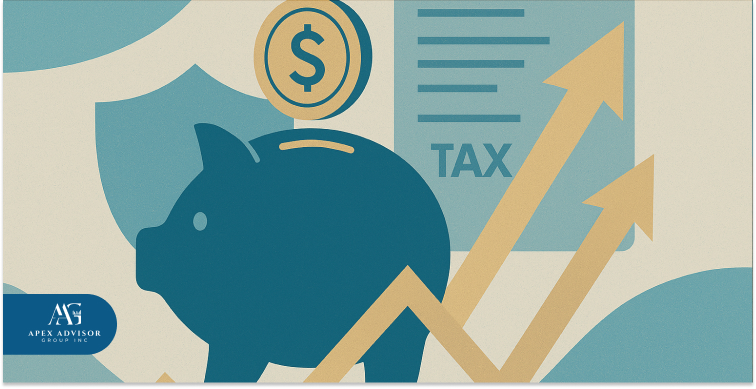
Tax-advantaged accounts Health Savings Accounts (HSAs), Roth IRAs, and 401(k)s offer unique benefits that can significantly enhance long-term financial growth. By strategically utilizing these accounts, investors can optimize their portfolios for tax efficiency.
Triple Tax Advantage with HSAs
Health Savings Accounts (HSAs) provide a rare combination of tax benefits:
Pre-tax contributions reduce taxable income in the year they are made.
Tax-free growth allows investments to appreciate without being taxed annually.
Tax-free withdrawals for qualified medical expenses make HSAs a powerful tool for healthcare savings.
Beyond medical expenses, HSAs can serve as a supplementary retirement account. Once individuals reach age 65, withdrawals for non-medical expenses are permitted without penalty, though they are subject to income tax.
Enhanced Growth with 401(k) Plans
Investing through a 401(k) plan can lead to substantial growth over time. A study by Charles Schwab demonstrated that investing via a 401(k) could result in a portfolio value approximately 23% higher over years compared to a taxable brokerage account, assuming an 8% annual return.
Tax-Free Growth with Roth IRAs
Roth IRAs allow contributions with after-tax dollars, providing tax-free growth and qualified withdrawals in retirement. This feature makes Roth IRAs particularly advantageous for those who anticipate being in a higher tax bracket during retirement.
Strategic Asset Placement
To maximize tax efficiency, it's essential to place assets in the appropriate accounts:
High-turnover or short-term assets should be held in tax-deferred accounts like 401(k)s to defer taxes on gains.
Long-term, low-turnover assets are best suited for taxable accounts, where long-term capital gains are taxed at a lower rate.
Let’s say you have $10,000 to invest. Growth stocks in a Roth IRA compound tax-free, bonds in a 401(k) defer taxes until withdrawal, and an HSA covers medical costs with tax-free dollars. This mix keeps taxes low while giving flexibility for retirement and healthcare.
5) Pillar Four: Proactive Planning That Anticipates Change
Proactive planning entails anticipating changes and seizing opportunities to improve tax outcomes. This approach includes structural decisions, the use of available credits, and ongoing adaptation to changing tax laws.
Strategic Structural Decisions
Entity structure plays a crucial role in tax efficiency, for instance, small-business owners often overlook the benefits of electing S-Corp status, leading to potential overpayment of self-employment taxes. Implementing entity-specific strategies can significantly reduce tax liabilities and enhance financial outcomes.
Leveraging Tax Credits and Incentives
Tax credits and incentives offer substantial opportunities for tax savings. Programs such as the Inflation Reduction Act provide credits for clean energy initiatives, including carbon capture and renewable energy investments. These incentives encourage sustainability and innovation while also lowering tax burdens and supporting larger strategic objectives.
Continuous Vigilance and Adaptation
Regularly reviewing and adjusting strategies ensures that businesses can capitalize on new opportunities and mitigate potential risks. This ongoing vigilance is critical for maintaining tax efficiency and achieving long-term financial objectives.
6) Why Apex Advisor Surpasses the Competition

Personalized, proactive strategies are essential today, and we combine advanced technology, continuous oversight, and tailored planning to maximize after-tax outcomes.
Tailored multi-account strategies: We design bespoke plans that reflect each client’s unique asset mix and goals, ensuring every investment choice supports long-term success rather than relying on generic models.
Real-time oversight: Through continuous monitoring and direct indexing across accounts, we make timely adjustments that keep portfolios tax-efficient and performance-optimized.
Year-round optimization: Our approach combines tax-loss harvesting, account coordination, and rebalancing to sustain after-tax advantages well beyond annual reviews.
Integrated retirement planning: HSAs, Roth conversions, and 401(k)s are strategically coordinated with taxable accounts, reducing tax drag while strengthening overall financial plans.
Ongoing vigilance: We actively review structures, regulatory changes, credits, and entity planning, adapting strategies as laws and personal circumstances evolve.
With this comprehensive approach, clients can preserve and grow wealth efficiently while reducing unnecessary tax burdens.
Turn Strategy into Lasting Advantage Today
Tax efficiency is not simply about compliance, it is about building a financial plan that adapts to change and consistently works in your favor. At Apex Advisor, we combine personalized planning, advanced technology, and vigilant oversight to ensure your wealth grows with purpose while minimizing unnecessary tax burdens.
By coordinating accounts, implementing proactive strategies, and anticipating shifts in law and markets, we help transform complex tax challenges into opportunities for long-term advantage. Our goal is simple, to keep more of your hard-earned money working for you.
If you are ready to take control of your financial future, schedule a consultation with Apex Advisor today. Together, we will design a tax-smart strategy that preserves your wealth, aligns with your goals, and delivers year-round confidence.

September 14, 2025
How Proper Accounting Can Simplify Tax Season
The receipts are everywhere, scattered like leaves after a storm, some crumpled at the bottom of drawers, others peeking out of envelopes long forgotten. Your inbox is clogged with tax reminders, each one a quiet nudge of impending deadlines, while the calendar insists it is already March, as if mocking your unpreparedness. The annual ritual begins, a frantic search for numbers, forms, and proof, digging through piles of statements and digital files, double-checking every entry for accuracy.
For many business owners, tax season feels less like a task and more like an endurance test, measured in sleepless nights, endless spreadsheets, and the gnawing worry that one overlooked receipt could trigger penalties or audits. Amid the chaos, the pressure to get everything right weighs heavily, transforming what should be a routine process into a trial of patience, precision, and resolve.
Yet it does not have to be this way. There is a reason some businesses glide through tax season while others struggle and it starts months before April ever arrives.
1) The Year-Round Advantage of Proper Accounting
Proper accounting is not merely an annual obligation; it constitutes a systematic and disciplined practice embedded within the operational framework of a business. It means tracking every dollar with precision, categorizing expenses with consistency, and reconciling accounts before discrepancies turn into headaches.
APEX Advisor builds this foundation with systems that keep records orderly, deductions documented, and errors to a minimum. When done year-round, the advantages are immediate:
A smoother tax season with no last-minute scramble for missing figures.
Proactive tax planning that seizes opportunities before deadlines pass.
Lower stress and more free time to focus on growth instead of paperwork.
Proper preparation is the difference between tuning a well-maintained engine for a long drive and repairing a breakdown on the shoulder, as those who wait until the last moment quickly face mounting costs.
2) The Cost of Waiting Until Tax Season

When accounting is deferred until tax season, the calendar assumes the role of an adversary. Approaching deadlines amplify pressure, and each missing receipt or unverified figure diminishes the time available for prudent and deliberate financial decision-making.
Penalties for late filing can add up quickly, yet the larger loss often comes in deductions that slip through the cracks when work is rushed. Catch-up accounting brings its own price, overtime pay, late-night hours, and the forfeiture of strategic tax moves that could have been set in motion months earlier.
For business owners and finance teams, the process can feel less like problem-solving and more like crisis management. Yet the most frustrating part is knowing that many of these costs are avoidable with the right preparation, and the benefits can be even greater.
3) How Proper Accounting Unlocks Bigger Tax Benefits
With proper accounting maintained throughout the year, tax season transforms from a mere compliance exercise into a strategic opportunity to capture value. Continuous monitoring and systematic recordkeeping enable APEX Advisor to identify tax-saving opportunities while they remain actionable, rather than after deadlines have passed.
This proactive approach ensures businesses maximize benefits, minimize risks, and make informed financial decisions with confidence and precision.The benefits are apparent:
Strategic timing of purchases: Acquiring equipment or other qualifying assets before year-end can trigger accelerated depreciation under current IRS rules, reducing taxable income and freeing up cash for growth.
Capturing every available credit: From energy-efficiency incentives to industry-specific credits, eligibility often hinges on timely documentation that only year-round records can provide.
Early adjustments to strategy: Mid-year insights allow for smarter decisions on income deferral, charitable contributions, or business structure changes.
The outcome is simple: less paid in taxes, more capital to invest back into the business. And with the right technology, this process becomes effortless. Next, we’ll see how technology makes this proactive strategy effortless, not burdensome.
4) Leveraging Technology for Effortless Tax Prep

When technology and human insight come together, tax preparation transforms from chore to craft. Cloud-based accounting platforms give APEX Advisor and its clients a shared window into real-time financial health, eliminating the need to wait for month-end reconciliations or chase missing figures. This immediate visibility allows for timely decision-making and proactive problem-solving.
Automation ferries expense data and invoices into the system, reducing manual entry and freeing teams to focus on strategic initiatives, rather than repetitive tasks. How APEX Advisor blends technology with human expertise for accuracy:
Automated data capture records transactions instantly, minimizing errors and accelerating workflow.
Expert review of records ensures accuracy, proper categorization, and adherence to tax laws.
Real-time monitoring identifies discrepancies before they escalate into costly problems.
Custom reporting is tailored to each client’s unique needs, combining software precision with professional judgment.
For example, a mid-sized services client was able to reconcile hundreds of transactions weekly, catching inconsistencies early and avoiding potential IRS penalties. The result is precision with simplicity, up-to-the-minute accuracy, and a workflow that reduces stress and increases confidence.
Next, we will explore how this approach integrates into the larger APEX method, turning chaos into clarity and setting the stage for long-term financial stability.
5) The APEX Advisor Method: Turning Chaos into Clarity
Every business encounters financial complexity; however, how that complexity is managed can make all the difference. At APEX Advisor, our approach is deliberate, methodical, and designed to transform confusion into clarity, providing businesses with not only compliance but strategic insight that drives growth.
Initial Audit
Our process begins with a comprehensive review of your existing financial records. This initial audit identifies inconsistencies, missing documentation, and overlooked opportunities, ensuring that nothing slips through the cracks. By addressing these gaps early, we lay a foundation of accuracy and transparency that supports every subsequent step.Streamlined Processes
Next, we implement tailored systems designed to streamline your accounting workflows. Income, expenses, and deductions are tracked systematically, reducing errors and improving efficiency. These processes are customized to your business’s size, complexity, and operational model, ensuring that financial data is organized, accessible, and actionable at all times.Regular Check-Ins and Adjustments
Accounting is not static, and neither is our approach. APEX Advisor schedules ongoing reviews to adjust your financial strategy in response to business growth, changing market conditions, or evolving tax laws. Regular monitoring allows us to proactively address potential risks, optimize opportunities, and keep your business on a stable financial trajectory.Seamless Tax Filing Support
When tax season arrives, the preparation conducted throughout the year makes filing straightforward and stress-free. APEX Advisor manages the complex details, ensures accuracy, and identifies all eligible benefits, minimizing liabilities and maximizing compliance.
By following this structured, year-round approach, what often feels like chaos becomes clarity. Businesses gain confidence, reduce risk, and position themselves for sustainable growth. This foundation not only simplifies tax season but also builds financial resilience that carries forward throughout the year and beyond.
6) Beyond Tax Season: Building a Financially Resilient Business

Proper accounting is not merely a tool for tax compliance; it is the backbone of strategic financial management. With accurate and timely financial records, businesses can move beyond reactive measures and engage in proactive planning.
Budgeting and forecasting become more than annual tasks, they transform into dynamic processes that inform daily decisions and long-term strategies.
The advantages are clear:
Informed Decision-Making: Detailed financial insights enable businesses to make data-driven decisions, optimizing resource allocation and identifying growth opportunities.
Enhanced Cash Flow Management: Accurate tracking of income and expenses helps in anticipating cash shortages or surpluses, allowing for timely adjustments.
Risk Mitigation: Regular financial reviews help in identifying potential financial pitfalls early, enabling businesses to implement corrective measures before issues escalate.
Tax season, then, becomes a checkpoint, a moment to assess the financial health of the business and adjust strategies accordingly. It is not the culmination of financial efforts yet a part of an ongoing process of financial stewardship.
APEX Advisor helps clients remain tax-ready year-round by cultivating disciplined practices in consistent record-keeping, periodic financial reviews, and strategic planning.
By embedding these habits into daily operations, businesses are not only prepared to meet tax obligations efficiently, however they are also positioned to seize opportunities for growth, optimize cash flow, and enhance overall financial resilience.
This proactive approach minimizes the risk of errors or penalties, ensures accurate reporting, and allows organizations to make informed decisions with confidence throughout the fiscal year.
7) Stress-Free April is Possible
Tax season no longer needs to be a source of dread or last-minute chaos. With disciplined, year-round accounting, the process becomes clear, manageable, and even empowering. This transformation is not accidental; it is the result of thoughtful systems, expert guidance, and continuous care.
APEX Advisor stands ready to be the partner who guides you through this journey, turning complexity into clarity and uncertainty into confidence. Their personalized approach ensures your business is prepared well before deadlines loom, maximizing savings and minimizing stress.
If you’re ready to reclaim your time and take control of your financial future, reach out to APEX Advisor today. Your stress-free April starts with a single call.

September 3, 2025
How to Use Financial Due Diligence to Avoid Tax Penalties
In March 2025, Maria Lopez, a small business owner in Florida, believed she was fully on top of her finances. She had an accountant, filed her taxes on time, and never imagined the IRS would come knocking. Then came the letter. A review of her recent tax returns uncovered a series of discrepancies, and within weeks, she was facing thousands of dollars in penalties she had no idea she owed.
Stories like hers are more common than most business owners realize. Tax penalties often result from small errors that slip through unnoticed, from misclassified expenses to overlooked income sources. Financial due diligence, the careful review of every line in the books, is one of the few strategies that can catch those mistakes before they become costly. However, how can you make sure your own business doesn’t become the next cautionary tale?
1) What Is Financial Due Diligence?
Financial due diligence is a deliberate and thorough examination of your financial records designed to uncover inconsistencies, potential risks, and opportunities for improvement. Rather than focusing only on tax season deadlines, it digs deeper, reviewing everything from income streams and expense categories to historical tax filings and supporting documents.
This level of scrutiny benefits everyone.
For individuals, it helps ensure that income is properly reported and deductions are fully supported.
For small businesses, it can reveal gaps in accounting practices that might lead to penalties or missed opportunities.
And for larger corporations with complex operations, it serves as an essential safeguard, verifying that every part of the organization is in line with regulatory requirements.
The process also plays a vital role in maintaining compliance with federal, state, and local tax laws. It is not simply about avoiding mistakes, it’s more about the confidence that your financial picture can withstand any level of scrutiny. That confidence can make the difference between a smooth audit and a costly penalty.
Yet understanding what financial due diligence is only the beginning. The real question is why tax penalties are so prevalent, and how even a single oversight can set off a chain of expensive consequences.
2) Why Tax Penalties Are a Real Threat

Tax penalties are not reserved for those who deliberately break the rules. In most cases, they arise from simple oversights. Missing a filing deadline by just one day can incur fines. Misclassifying expenses or underreporting income, accidental or not, may trigger an audit. These errors may seem minor, yet their consequences can accumulate quickly.
The IRS assessed over $14 billion in penalties against individuals and businesses in a recent year alone, much of it for avoidable mistakes. One small business in Texas learned this the hard way when a miscalculated payroll tax snowballed into a six-figure liability, forcing the company to cut jobs just to stay afloat. For larger organizations, even the appearance of noncompliance can weaken trust with investors, lenders, and partners, making it harder to secure future growth.
Penalties do not only affect your bottom line. They can damage your reputation with regulators and disrupt day-to-day operations. A surprise audit can pull teams away from running the business, and the stress of dealing with mounting fines often lingers long after the bills are paid. Even minor errors, like duplicated deductions or overlooked exemptions, can escalate quickly if left unchecked, creating cascading financial and operational challenges.
The good news is that these risks are rarely inevitable. By focusing on a handful of critical steps during financial due diligence, you can dramatically reduce the chances of facing penalties at all. However, what exactly does that process involve, and how can you be sure it is done right?
3) Key Steps in Financial Due Diligence to Avoid Penalties
Financial due diligence is only effective when it is intentional. Each step adds a layer of protection that can prevent errors from snowballing into penalties.
1. Thorough Recordkeeping
Clear, well-organized records are the foundation of any successful review. Every transaction, from routine payments to one-off purchases, should be documented with the appropriate receipts or statements. According to the National Small Business Association, 25% of small businesses have been penalized for improper recordkeeping, underscoring how important this step is.
2. Review of Tax Filings
Historical tax returns should be compared against current and prior financial statements to catch errors. This review can reveal patterns or errors that were overlooked in past filings. The IRS reports that over 20% of audits result from mismatches between reported income and third-party records.
3. Verification of Income and Expenses
Each income source and deduction must be supported by documentation. Unverified deductions are one of the most common triggers for audits, and individuals or businesses claiming unsupported expenses can face fines of 20% of the disallowed amount.
4. Risk Analysis and Red Flags
A comprehensive review includes identifying vulnerabilities. Gaps in documentation, irregular cash flow, and inconsistent reporting between departments or locations can all signal underlying issues. Nearly one-third of businesses fail to correct small red flags early, leaving themselves open to more serious penalties later.
5. Compliance Check
Lastly, it is essential to confirm that all filings and accounting practices adhere to federal, state, and local tax laws. Even minor oversights can lead to cascading fines. With state and local governments generating nearly $800 billion in tax revenue annually, their compliance enforcement is often just as aggressive as the IRS.
Following these steps can significantly reduce your exposure to penalties. However identifying the risks is only half the battle. It is equally important to implement a structured system that continuously monitors, documents, and verifies your financial activities.
Without such a system, even minor oversights can accumulate, creating vulnerabilities that may result in audits or fines. By establishing consistent processes and engaging experienced professionals, you not only protect your business from financial penalties but also create a framework for sustainable growth, accurate reporting, and long-term confidence in your financial management. What many businesses struggle with is creating a system to address those risks effectively. This is where you need professionals like Apex Advisor.
4) How Companies Can Maintain Compliance with Apex Advisor

Apex Advisor approaches financial due diligence as more than a once-a-year check. Our system is designed to easily integrate into a client’s financial operations, helping businesses stay ahead of potential issues before they become penalties.
A Systematic Review Process
Apex Advisor begins with a structured analysis of financial statements, tax filings, and underlying documentation. This step-by-step process helps uncover hidden discrepancies and ensures that nothing is left to chance.
One of our retail clients in Florida had recurring small misclassifications in expense reporting. Our team conducted a detailed review and corrected the records, preventing costly IRS notices and improving internal reporting accuracy.
Proactive Risk Identification
Instead of waiting for audits to expose mistakes, Apex Advisor uses predictive modeling and analytical tools to identify risks early. According to a recent survey by the Association of Certified Fraud Examiners, 47% of financial errors discovered during audits could have been prevented with better monitoring systems.
For instance, we helped a manufacturing client identify inconsistent payroll entries before filing, avoiding potential penalties exceeding $50,000.
Advanced Tools and Technology
The firm leverages automated reconciliation software, AI-powered reporting dashboards, and secure cloud-based record management. This technology allows them to analyze high volumes of data quickly and accurately, reducing the margin for error.
For example, a mid-sized accounting firm using these tools was able to identify and correct discrepancies across hundreds of client accounts within days, preventing potential IRS penalties. Businesses using similar systems have been shown to cut compliance-related costs by up to 30% each year.
Personalized Strategies for Every Client
Apex Advisor recognizes that no two businesses are alike. Whether it’s designing custom compliance checklists or training in-house staff on best practices, the firm tailors its strategies to fit the size, complexity, and goals of each client.
For instance, a healthcare client implemented a personalized financial strategy we recommended and experienced a measurable reduction in penalty exposure while streamlining internal workflows.
A recent internal review found that 92% of businesses implementing personalized financial strategies experienced a measurable reduction in penalty exposure.
Final Thoughts: Due Diligence Is Self-Defense

The tax code may be strict; however, financial preparation is still a form of control. Due diligence turns uncertainty into strategy. It allows business owners to grow without hesitation and individuals to make financial choices without second-guessing what might show up in an IRS notice months later. It also strengthens internal processes, reduces stress during audits, and creates a culture of accountability within the organization.
The goal is not just to spot problems, rather to prevent them from taking root, giving clients not only compliance but also clarity. The true value of due diligence lies in shifting from a defensive, reactive posture to a proactive, ready approach, empowering businesses and individuals to act with confidence and long-term financial security.

August 21, 2025
How to Develop an Effective Tax Planning Strategy
No one ever feels the weight of taxes all at once. They don’t hit like a crash, they build slowly across months and missteps. Most people don’t plan for taxes; they react to them.
But tax planning isn’t just about saving money. It’s about taking control—about choosing how much of your work you actually get to keep. And the difference between a tax bill and a tax strategy? That starts with one quiet, often-overlooked question:
What could you have done differently if you’d only planned ahead? Let’s answer that.
(1) Know What You’re Working With: Income, Deductions, and Credits
Tax planning starts with knowing what’s on the table. Before we start estimating or adjusting anything, we need to get clear on the categories that shape the final outcome.
Start with income
Most people think of wages first. For W-2 employees, that’s usually the bulk of it. Many also receive 1099 income from freelance work, contract gigs, or self-employment. Then there’s income from investments, rental properties, retirement accounts, and sometimes even digital assets. All of it counts, and each source is treated a bit differently on a return.
Next, above-the-line deductions
These deductions lower your adjusted gross income (AGI) before you even get to itemizing. Common examples include student loan interest, contributions to Health Savings Accounts (HSAs), and traditional IRA deposits. By reducing your AGI, they can improve your eligibility for certain tax credits and benefits—while also lowering your overall taxable income.
Then come the credits
Unlike deductions, which lower your taxable income, credits reduce the actual amount of tax you owe—dollar for dollar. Some of the most widely used include the Child Tax Credit, the Earned Income Tax Credit, and education-related credits like the American Opportunity and Lifetime Learning Credits. These benefits depend on factors like income, filing status, and specific qualifying expenses.
This breakdown helps us see what’s actually influencing the return. Planning begins with knowing what’s already in play.
(2) Understand Your Bracket and the Thresholds That Come With It

We hear a lot about tax brackets, though most people don’t get how they really work. Knowing your bracket isn’t about memorizing numbers. It’s about how income gets taxed in segments.
The U.S. tax system is marginal. That means as income increases, only the portion that crosses a bracket line gets taxed at the higher rate.
This matters when income shifts outside your regular paycheck. Bonuses, freelance payments, investment withdrawals, or cash flow from a side gig can all push parts of your income into a different zone.
Imagine income tax like a staircase. As you climb higher (earn more), the government doesn’t suddenly charge you a higher rate on everything you’ve earned. Instead, each step of your income is taxed at the rate assigned to that particular bracket.
For example (using simplified 2025 federal income tax brackets for single filers):
The first $11,600 you earn is taxed at 10%
Income from $11,601 to $47,150 is taxed at 12%
The next portion from $47,151 to $100,525 is taxed at 22%
And so on…
So if someone earns $60,000 in taxable income, only the portion above $47,150 (i.e., $12,850) gets taxed at 22%. The income below that is taxed at the lower rates of 10% and 12%. That’s what “marginal” means here, the rate increases only apply to the margin of your income that enters a new bracket.
A single filer earning $95,000 still pays only a portion at the 24 percent rate
The rest is taxed at 10, 12, and 22 percent before it reaches that point
Source: IRS Tax Brackets
Timing plays a role. A year-end bonus or payment from a client might sound great, though it could move part of your income into a new bracket or limit access to income-based credits. Knowing where those thresholds fall helps with pacing and planning.
(3) Put Your Money Where the Relief Is: Retirement and Health Accounts
Using retirement and health savings accounts strategically can lower taxable income while setting up financial security for the future. Contributions to these accounts often come with immediate tax advantages that are too valuable to ignore.
Consider a traditional IRA or 401(k)—contributions reduce your taxable income today, postponing taxes until you withdraw the funds. This tax deferral can significantly lower your current tax bill. Especially if you expect to be in a lower tax bracket during retirement.
Health Savings Accounts (HSAs) stand out for their unique triple tax benefit. Contributions reduce taxable income, growth inside the account isn’t taxed, and withdrawals for qualified medical expenses are tax-free. That combination is rare and worth maximizing whenever possible.
Despite these advantages, many don’t take full advantage.
Only 10.5 percent of eligible taxpayers claimed the Retirement Savers’ Credit in the most recent filing year
Source: IRS Saver’s Credit Statistics
Recognizing these tools and using them thoughtfully can help control your tax bill and strengthen your financial foundation at once.
(4) Invest Smarter, Not Just More

Tax planning extends beyond how much you invest. It also involves where and how you place those investments.
Tax-efficient fund placement helps reduce what you owe while growing your portfolio. For instance, growth-focused assets often work well inside Roth IRAs since qualified withdrawals aren’t taxed. On the other hand, income-generating funds may be better suited to tax-deferred accounts, depending on the type and frequency of distributions.
The timing of a sale matters. Spreading gains across tax years or pairing them with capital losses can significantly impact your tax outcome. Even slight shifts in timing may influence your final return once taxes are considered.
Tax-loss harvesting offers another layer of control. Selling underperforming assets to offset gains elsewhere can reduce taxable income and open room for portfolio rebalancing.
A 2022 Morningstar study showed that tax-aware investing improved after-tax returns by an average of 1.41 percent annually
Source: Morningstar Tax Cost Ratio Report
These techniques don’t require aggressive trading. They require intention, knowing how each investment decision fits into your larger tax plan.
(5) Time Your Moves: Income, Deductions, and Giving
The tax year isn't just a finish line. It’s a schedule that can work to your advantage if you plan around it.
When income shifts year to year, it helps to think about when money lands. Deferring income like a freelance payment or bonus into a lower-earning year can help keep it in a more favorable bracket.
Some deductions can be timed as well. Paying eligible medical expenses, property taxes, or tuition bills before December 31 may lift your itemized total beyond the standard deduction threshold.
Charitable giving follows the same logic. Rather than spacing donations evenly, some choose to group their contributions into one tax year. This approach can raise the chance of itemizing instead of defaulting to the standard deduction.
In 2025, the standard deduction will be $14,600 (single) and $29,200 (married filing jointly)
Source: IRS Tax Year 2025 Inflation Adjustments
Each of these steps is about pacing. You don’t have to change the amount you give or earn. Adjusting the calendar is sometimes enough to shift the outcome.
(6) Get Organized Before the Deadlines Start Breathing Down Your Neck

Tax planning doesn’t work without structure. Strong recordkeeping is what keeps the numbers reliable and the opportunities within reach.
Build a Routine, Not a Rush
Treat tax tracking like part of your monthly financial check-in. Set a reminder to log income changes, deductible expenses, and receipts regularly. This keeps things from piling up and removes the guesswork when it’s time to file.
Keep What Counts
Documents are easier to lose than most think. Hold on to receipts for medical expenses, charitable donations, job-related costs, and anything tied to credits or deductions. Digital folders or physical envelopes, what matters is having them when you need them.
Use Tools That Make Tracking Easier
Spreadsheets, apps, and cloud storage platforms can all simplify the process. If you freelance or run a side business, accounting software that tags deductible categories can save hours. For salaried income and basic deductions, a shared folder and spreadsheet may be enough.
Preparation Beats Pressure
When your records are current, filing becomes a formality. You’re not rushing to remember what happened nine months ago. You’re confirming what’s already clear. And that’s when real planning begins.
Explore the interplanetary strategy post to elevate your tax plan:
Why a Smart Tax Strategy Deserves Smarter Help with Apex Advisor Group in Your Corner
Tax planning involves more than forms and figures; it’s about understanding how tax laws intersect with your financial decisions across income sources, savings goals, and investment timing.
They work with clients who want more than just year-end preparation. Whether it’s structuring deductions, reviewing entity options, or building long-term tax efficiency, they tailor each approach to fit where you’re headed.
Filing is only one moment in the cycle. The real value comes from knowing which moves to make before deadlines approach.
Contact Apex Advisor Group to start building a smarter strategy with professionals who understand what real planning involves.
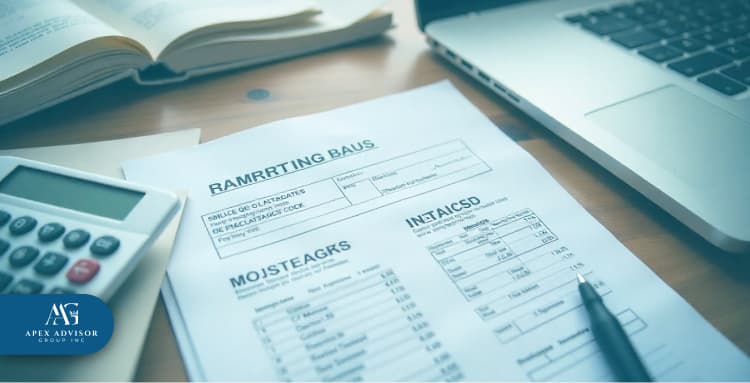
July 19, 2025
How to Prepare Real Estate Financial Statements for Tax Filing
Rental income looks simple at a glance. Tax season, however, tells a different story. Behind each payment is a stack of expenses, loan details, and repair records that all need to be accounted for. Without clear financial statements, tax filing can turn into a complex challenge.
Now, let's see how to prepare real estate financials that keep everything clean, compliant, and ready for filing.
1) Collect Your Property Records
Before you begin preparing your tax filings, it’s important to gather all the property-related records that will help you handle the process easily. Here's a look at what you need to have on hand:
Lease Agreements or Rental Contracts
Start by collecting your lease agreements or rental contracts. These documents lay out the terms of your rental arrangements and confirm the amount of income you're receiving from tenants. They also clarify any important conditions that could affect your financial reporting.
Proof of Rent Received
You'll need to gather proof of rent received, which can include bank statements showing deposits or receipts from tenants. This documentation ensures your rental income is properly tracked and helps you verify the amounts you're reporting on your tax return.
Utility Bills, Repair Invoices, and Maintenance Logs
Keep track of any utility bills, repair invoices, and maintenance logs related to your property. These records substantiate the operational expenses of running your property and could be used for deductions. They provide clear evidence of the ongoing costs required to maintain the property, which are necessary for accurate reporting.
Mortgage Statements
Don’t forget to collect your mortgage statements for the year. This includes details of both interest and principal payments made during the year. The mortgage interest paid can be deducted, which can be beneficial when it comes time to file your taxes.
Insurance and HOA Fees
If your property is covered by an insurance policy, make sure you have those records handy. Similarly, if you're subject to Homeowners Association (HOA) fees, keep track of those payments as well. Both of these can often be deducted, so it's important to stay organized and keep these records in a central location.
Property Tax Bills
Lastly, gather your property tax bills for the year. Local counties, such as Miami-Dade or Orange County, can issue these depending on your property’s location. These tax bills are another source of deductions, so it's important to have them readily available when filing.
2) Write Down All Income

Ensuring that every bit of income from your property is accurately recorded is an essential step in preparing for tax filing. Here’s how to break it down:
Rent Received
Begin by documenting the rent received throughout the year. This is the primary income source for most property owners, and it’s crucial to track all payments, even if they’re made in installments. Each payment, no matter how small, should be noted to ensure complete and accurate reporting.
Fees Paid by Tenants
Next, include any fees tenants have paid.. These might include late fees, parking fees, or other charges tenants are required to pay under the terms of their lease agreement. While these additional fees are often overlooked, they count as income and should be reported to avoid any discrepancies.
Refunds or Credits
Lastly, make sure to account for any refunds or credits you’ve issued to tenants. If, for example, you refunded part of the rent or gave a credit for maintenance issues, these transactions must be recorded. While they may reduce your total income, including them ensures that your financial records are precise.
3) List All Expenses
Now that you've captured your income, it's time to focus on the expenses that can be deducted from your rental property’s earnings. Here's a rundown of common expenses you may be able to deduct in Florida:
Mortgage Interest: One of the biggest deductions you can claim is mortgage interest. If you’re paying interest on a loan for the property, that portion of your mortgage is deductible.
Repairs (Not Improvements): Don’t confuse repairs with improvements. Repairs are the costs associated with fixing or maintaining your property (think plumbing or electrical work), and these can be deducted. On the other hand, improvements like remodeling or adding new features need to be capitalized and depreciated over time.
Lawn Care or Pool Maintenance: If you’re paying for lawn care or pool maintenance, those costs are considered part of your property’s operational expenses.
Property Management Company Fees: These fees cover the cost of managing the property, handling tenants, and overseeing maintenance.
Utilities (If Landlord-Paid): If you're paying for utilities like water, gas, or electricity, those costs are deductible.
Legal and Accounting Fees: Any legal or accounting fees incurred in relation to the property are deductible as well.
Property Insurance: Your property insurance premiums are another expense you can deduct. These cover the cost of insuring your property against damage, theft, or liability claims.
Property Taxes: Be sure to keep your tax bills handy, as they can lower your taxable income. These are often paid directly to the local county, like Miami-Dade or Orange County, and can be easily tracked through your bills.
State Business Registration or Local License Fees: If you're renting your property on a short-term basis, you might also need to pay state business registration or local license fees. These fees are deductible and should be recorded to ensure your filing is complete.
4) Depreciation
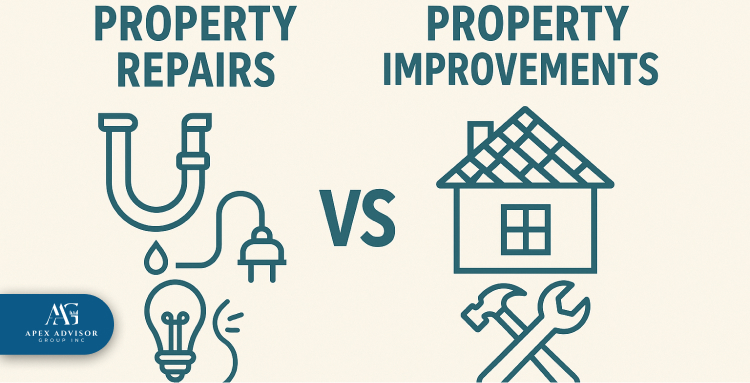
Depreciation is a powerful tool when it comes to reducing your taxable income. In Florida, as per IRS rules, depreciation is handled a bit differently depending on the type of property. Here's what you need to know:
Residential Buildings: For residential buildings, the IRS allows you to depreciate the property over 27.5 years. This means you can deduct a portion of the property’s value each year, which helps offset your income.
Commercial Properties: If your property is commercial, that depreciation schedule stretches to 39 years. This longer period reflects the expected lifespan of commercial buildings, so you’ll need to account for that when planning your taxes.
Land and Improvements: It’s important to note that land itself isn’t depreciable—only the structure on it. However, if you’ve made improvements (like installing a new roof or upgrading the A/C system), those costs are added to your depreciation schedule. These improvements can be depreciated over time, offering additional tax-saving opportunities.
5) Report on Property Value and Debts
Next, you'll need to report the value of your property and any outstanding debts associated with it.
Property Value: Start by noting the value of each property. This is typically either the original purchase price or the adjusted basis (if you’ve made remarkable improvements).
Mortgages and Loans: Record how much is still owed on any mortgages related to the property. If you have additional loans, such as home equity lines of credit used for the property, those need to be included as well. These debts can affect your overall financial picture and may impact deductions related to interest payments.
See also: How the Rich Use Debt to Avoid Taxes
Security Deposits: Finally, don’t forget to account for any security deposits collected from tenants. While these aren’t taxable income upfront, they should be noted as liabilities until they’re returned to tenants or used for property damages.
6) Show Actual Cash Activity
This section captures the flow of money in and out of your property. Understanding your actual cash activity gives you a clearer picture of how your property is performing financially:
Rent Received: Track every amount of rent received from tenants. This is typically your main source of income and must be reported accurately.
Bills Paid: Keep a record of any bills paid for the property, including maintenance, utilities, and other operational costs. These expenses can often be deducted, so tracking them carefully is important.
Loan Payments: If you’re making loan payments, be sure to distinguish between the principal and interest paid. The interest is generally deductible, while the principal isn’t.
Major Purchases: Record any major purchases you make for the property, such as appliances or renovations. These can be depreciated or written off depending on their nature and cost.
7) Keep a List of Big Purchases or Work Done

If you’ve made any large purchases or had major work done on the property, it’s important to keep thorough records. Here’s what to include:
Date, Cost, and Purpose: Document the date the work was completed or the purchase was made. Note the cost and describe the purpose—for example, replacing a roof or installing a new HVAC system.
Contractor Information: If the work was done by a contractor, keep the contractor’s details on file. Florida law may require licensed contractors to perform certain types of work, such as major repairs. So, it’s important to ensure that your contractor meets all the legal requirements.
8) Be Ready for State and Local Rules
In Florida, you’ll need to be aware of specific state and local regulations when renting property. Here’s a quick checklist to stay compliant:
Florida Annual Report: If you’re renting under a business entity like an LLC or Corporation, make sure you file your Florida Annual Report. This is required for all registered entities to remain in good standing with the state.
Sales Tax for Short-Term Rentals: If you rent out your property on a short-term basis (less than 6 months), you’ll need to collect and remit Florida sales tax. This applies to things like vacation rentals or Airbnb properties, so don’t forget this important tax obligation.
Local Business and Tourist Taxes: Finally, check with your county or city to see if you’re required to have a business tax receipt or tourist tax license. Many local governments have their own requirements for short-term rental properties. So, it’s important to remain aware of these rules to avoid penalties.
Consult with Apex Advisor Group to Handle Your Florida Real Estate Tax Filing
Handling both federal and Florida state tax requirements for real estate can take time and attention to detail. That's where Apex Advisor Group can help. We offer a range of services to make the process easier for you, including:
Federal Tax Forms: We’ll assist with completing federal tax forms like Schedule E (for rental income and expenses) and Form 4562 (for depreciation). These forms are essential for ensuring your deductions are correctly applied and your rental income is properly reported.
Florida Department of Revenue Filings: If you're renting in Florida, particularly through short-term rentals, we’ll handle your Florida Department of Revenue filings. We’ll ensure you're meeting all state tax obligations, from sales tax on short-term rentals to any other local requirements.
Depreciation Schedules: We’ll ensure that your property improvements are accurately added to your depreciation schedule, helping you maximize your deductions.
Organizing Income and Expenses: Whether you own multiple properties or are managing them through an LLC, we’ll help you organize income and expenses across all your properties.
So, get in touch. We’ll take care of the details, letting you focus on what matters most—your properties.
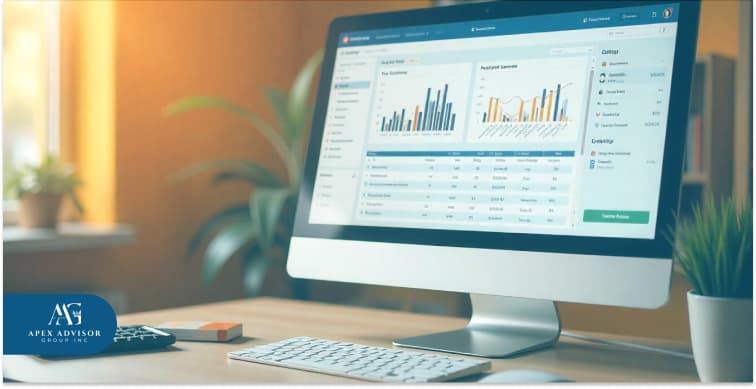
July 12, 2025
How to Use Real Estate Bookkeeping Software for Tax Preparation
A single missed expense or miscalculated deduction can cost you more than you think. Real estate taxes often rely on accurate records, and organized finances help prevent mistakes and avoid unnecessary costs.
Real estate bookkeeping software helps document every transaction, categorize expenses, and generate reports that make tax preparation easier. Simply having the software isn’t enough—you need to know how to use it effectively. This guide will show you how to manage your records, lower tax risks, and make sure you’re not overpaying.
1. Setting Up Real Estate Bookkeeping Software for Taxes
When it comes to using real estate bookkeeping software for taxes, the first step is ensuring your system is set up properly. Here’s how you can get started:
Entering Business and Property Details: Begin by inputting your business information, including your legal structure (LLC, partnership, etc.), and listing the properties you own or manage. This step helps organize your financial data and ensures that each property is accounted for when it comes to tax season.
Connecting Bank Accounts and Credit Cards: Link your business bank accounts and credit cards to the software. This integration allows transactions to be automatically imported, saving your time and reducing the risk of missing any financial activity.
Customizing Tax Categories for Real Estate Income and Expenses: Customize your categories to track specific types of income (like rental payments) and expenses (such as repairs, management fees, and property taxes). This will help you separate deductible costs from non-deductible ones, ensuring that your tax filings reflect all eligible deductions.
Access information on rental income, deductions, and recordkeeping for real estate professionals through the IRS Real Estate Tax Center.
2. Tracking Income and Expenses for Accurate Tax Reporting
![]()
Accurate tracking of income and expenses is crucial for tax reporting, and real estate bookkeeping software can make this process more efficient.
Automated Transaction Imports: The software can sync with your bank accounts to automatically import transactions. This feature helps ensure that all income and expenses related to your properties are captured without requiring manual input for every transaction.
Manual Entry for Cash Transactions: For cash-based transactions that don’t pass through your bank accounts, you’ll need to manually record them. By entering these transactions promptly, you ensure that nothing is overlooked when preparing your taxes.
Organizing Income and Expenses: The software allows you to categorize your rental income, property-related expenses, and maintenance costs. This organization helps you keep track of deductible expenses and ensures your tax records are comprehensive and accurate.
3. Organizing Receipts and Invoices for Tax Deductions
Accurate records of all business-related expenses are essential for tax season. Real estate bookkeeping software makes organizing receipts and invoices both easy and efficient.
Upload Receipts Digitally: Many platforms let you scan and upload receipts directly into the system. This reduces the risk of losing important documents and makes them easy to access.
Tagging Deductible Expenses: The software often allows you to tag expenses as deductible, helping ensure you don’t miss any opportunities to reduce your taxable income.
Maintain IRS Compliance: The IRS requires businesses to keep records for a specific number of years. Using digital tools makes it easier to comply and provide clear documentation if needed.
Find information on rental income, deductions, and recordkeeping for real estate professionals in IRS Publication 527 – Residential Rental Property.
4. Reconciling Accounts to Prevent Tax Filing Errors

Reconciling your accounts is one of the best ways to avoid mistakes when it’s time to file your taxes. By regularly checking your transactions against your bank statements, you can ensure everything is in order and up to date.
Here’s how to make this process work for you:
Match Transactions with Bank Statements: Go through your real estate bookkeeping software and compare each transaction with your bank statements. This step helps confirm that income and expenses are recorded correctly, reducing the chances of missing or duplicate entries.
Fix Any Discrepancies Early: If something doesn’t add up—whether it's a missing deposit, an extra charge, or an incorrect amount—address it right away. Small mistakes are much easier to fix when caught early rather than during the rush of tax preparation.
Run Monthly Reconciliation Reports: Setting up monthly reports helps bring potential issues to light before they become bigger problems. These reports act as a financial checkpoint, making it easier to correct mistakes as they happen rather than discovering them too late to make necessary adjustments.
5. Generating Tax Reports from Real Estate Bookkeeping Software
Accurate tax reporting is an important part of managing rental properties. Real estate bookkeeping software organizes financial data, helping property owners handle tax filings with fewer complications.
Profit and Loss Statement: A Profit and Loss Statement shows rental income and expenses over a period, calculating net income for taxes. It includes deductible costs like maintenance, management fees, and operations to reduce taxable income.
Balance Sheet: A Balance Sheet provides an overview of assets, liabilities, and equity. One of its most valuable functions is tracking property depreciation, which plays a significant role in reducing taxable income.
Modern bookkeeping tools use built-in depreciation schedules and formulas to automatically calculate asset depreciation, ensuring accuracy and compliance with tax laws. This automation reduces manual errors, improves financial reporting, and helps businesses plan for asset replacement costs more effectively.
Cash Flow Report: A Cash Flow Report organizes income and expenses to provide insight into financial patterns. Reviewing cash flow trends can help property owners prepare for tax obligations by adjusting budgets and setting aside necessary funds in advance.
Understand which records to maintain and how long to keep them in accordance with IRS Recordkeeping Guidelines for accurate tax reporting.
6. Maximizing Tax Deductions with Real Estate Bookkeeping Software
Tracking tax deductions manually can lead to missed opportunities and costly mistakes. Real estate bookkeeping software helps capture every eligible deduction while keeping your records organized and audit-ready.
Identifying Deductible Expenses: Real estate investors can deduct a range of expenses, including mortgage interest, property repairs, depreciation, insurance, and professional fees. A well-organized bookkeeping system categorizes these expenses automatically, making it easier to claim every dollar allowed under tax laws.
Using Software-Generated Reports for Tax Savings: Instead of sifting through receipts and spreadsheets, bookkeeping software generates detailed reports that summarize deductible expenses. These reports not only simplify tax preparation, they also help you make informed decisions about future investments and tax strategies.
Avoiding Deduction Mistakes That Trigger Audits: Errors in reporting deductions—such as misclassifying expenses, overstating depreciation, or failing to keep supporting documents—can raise red flags with the IRS. Automated tracking reduces these risks by maintaining accurate records and ensuring compliance with tax regulations.
With the right real estate bookkeeping software, tax season becomes less stressful, and you gain confidence knowing your deductions are properly documented.
7. Exporting Financial Data for Tax Filing or Accountant Review

Keeping your financial records organized makes tax season smoother, whether you’re filing on your own or working with an accountant. Here’s how you can securely export your data and ensure everything is accurate and ready for submission.
Download IRS-Compliant Reports
One of the best ways to ensure accuracy is by exporting your financial data in formats that meet IRS standards. Whether you use accounting software or manual records, make sure the reports you produce contain all the required information in the correct format.
Provide Accountant Access
If you work with a tax professional, giving them direct access to your financial data can save you both time and frustration. Instead of sending files back and forth through emails or risking missing documents, you can simply grant them the access they need. A tax professional can then review your financial information instantly, ensuring they have everything necessary for accurate tax filings. This streamlines the process and eliminates common issues like incomplete records or lost paperwork.
Stay on Schedule
Submitting your financial data on time is key to preventing penalties and ensuring your tax filing process runs smoothly. Waiting until the last minute to gather documents or submit records can lead to errors and rushed filings, which might result in missed deductions or delays.
Let Apex Advisor Group Maximize Your Tax Preparation with Real Estate Bookkeeping Software
Tracking real estate finances is making sure every expense is accounted for and every deduction is claimed. The right bookkeeping software, along with a team that knows the ins and outs of real estate taxes, can make a big difference when it’s time to file.
Apex Advisor Group is here to make that process easier. Whether you own a few rental properties or manage a growing portfolio, we’ll help you set up a system that works for you. If you’re ready to take the guesswork out of your bookkeeping and tax prep, get in touch with us.

June 18, 2025
How to Prepare Legal Financial Statements for Tax Filing
When small businesses make mistakes in their financial statements, it leads to tax penalties and audits. Something as simple as a miscalculated expense or an overlooked deduction can cost thousands of dollars and put a business under unnecessary scrutiny.
Financial statements are not just numbers on a page; they tell the story of your business’s financial health. When prepared correctly, they ensure compliance with tax laws, help secure loans, and even uncover opportunities for growth. Yet, many businesses struggle with organizing their records, categorizing transactions, and following the latest tax regulations.
However, you’re going to have a step-by-step breakdown. There will be no last-minute stress—only clear, structured financial records to make tax season easier.
Understanding Legal Financial Statements for Taxes
When it comes to tax filing, financial statements do more than just summarize numbers—they provide a clear and structured view of your business’s financial standing. Whether you're filing taxes for a small business or a corporation, three core financial statements play a crucial role:
1. Income Statement (Profit & Loss Statement)
The Income Statement details your revenue, expenses, and net profit over a specific period. This report is essential for tax filing because it shows taxable income—the amount your business earned after deducting allowable expenses. The IRS and other tax authorities use this figure to determine how much tax you owe.
2. Balance Sheet
The Balance Sheet provides a snapshot of your business’s financial health by listing assets, liabilities, and equity at a given moment. It helps tax authorities verify asset values, outstanding debts, and financial stability. Certain tax deductions, like depreciation on equipment or property, are calculated using figures from the balance sheet.
3. Cash Flow Statement
The Cash Flow Statement tracks how money moves in and out of your business. It is not always required for tax filing, however, it helps in audit situations and financial planning. Understanding cash flow ensures that you set aside enough funds for tax payments and avoid liquidity issues.
Legal Standards for Financial Statements

Financial statements must follow specific accounting standards based on your location and business type:
GAAP (Generally Accepted Accounting Principles) applies to U.S.-based companies and ensures financial accuracy and consistency.
IFRS (International Financial Reporting Standards) is followed in many other countries and focuses on transparency for global businesses.
IRS Reporting Rules dictate how financial data should be structured for tax purposes in the U.S., ensuring compliance with tax laws.
Step-by-Step Guide to Financial Statements Preparation
Preparing financial statements for tax filing doesn’t have to be overwhelming. By following a structured process, you can ensure accuracy, compliance, and a smoother tax season. Here’s a step-by-step guide to getting it right.
Gather Your Financial Data
Before you start preparing your financial statements, collect all the necessary financial records. These documents provide the foundation for accurate reporting and should cover all income, expenses, and financial transactions for the tax year.
Key Documents to Collect:
Bank statements – Shows cash inflows and outflows.
Invoices and receipts – Documents income and deductible expenses.
Payroll records – Tracks salaries, wages, and tax withholdings.
Loan and credit statements – Lists outstanding debts and interest payments.
Tax documents – Previous tax returns, IRS notices, and estimated tax payments.
Efficiency Tip:
Using accounting software like QuickBooks, Xero, or FreshBooks can automate transaction tracking, generate financial statements, and minimize human errors. Many of these tools integrate with your bank account to automatically categorize income and expenses.
Choose Your Accounting Method
Your accounting method determines how you recognize income and expenses in your financial statements. The IRS and other tax authorities require consistency, meaning you must stick with the same method each year unless you file for a change.
Cash Basis vs. Accrual Basis Accounting
Cash basis and accrual basis accounting are two fundamental methods used to manage and report financial data.
Cash basis accounting is typically best suited for freelancers and small businesses. This method is simple and makes it easy to track actual cash flow, as income is recorded when received and expenses are noted when paid. However, a major drawback is that it may not present the complete financial picture, particularly when payments or expenses are delayed or anticipated.
In contrast, accrual basis accounting is more appropriate for larger businesses and corporations. It offers a more accurate long-term view of a company’s financial health by recording income and expenses when they are earned or incurred, regardless of when cash is exchanged. The main disadvantage is that it requires more detailed record-keeping and can be more complex to manage.
Let’s have an example, a freelance writer using cash basis accounting records income only when payments are received and expenses when bills are paid. This makes tax reporting simple and helps manage cash flow.
On the other hand, a retail store using accrual accounting records revenue when a sale occurs—even if payment is received later. This method provides a more accurate financial picture however, requires tracking accounts receivable and payable.
Compile the Income Statement

The Income Statement (also called the Profit & Loss Statement) summarizes revenue, expenses, and net profit over a specific period. This statement is crucial for tax filing because it determines taxable income.
What’s the formula? It’s: Revenue – Expenses = Net Income (Taxable Profit)
Record Revenue – Include all income sources (product sales, services, interest earned).
List Expenses – Categorize business expenses such as rent, salaries, utilities, and marketing.
Calculate Net Income – Subtract total expenses from total revenue.
For instance, a small retail shop earned $50,000 in sales, had $20,000 in expenses (rent, inventory costs, payroll). So, $50,000 – $20,000 = $30,000 taxable income.
Build the Balance Sheet
The Balance Sheet provides a financial snapshot of your business at a specific date. It shows what your company owns (assets), lowes (liabilities), and its net worth (equity).
Balance Sheet Components:
A balance sheet provides a snapshot of a business’s financial position by breaking it down into three main components: assets, liabilities, and equity.
Assets represent everything the business owns. These can include cash, equipment, and accounts receivable. Essentially, assets are resources that provide future economic benefits to the company.
Liabilities refer to what the business owes. This includes obligations such as loans, unpaid invoices, and tax liabilities. These are claims that creditors have on the company’s assets.
Equity is the remaining value of the business after subtracting liabilities from assets. It reflects the owner's investment and retained earnings, representing the net worth or ownership interest in the company.
Common Mistake to Avoid:
Many businesses forget to update depreciation on assets like computers, vehicles, and machinery. This oversight can lead to inaccurate tax deductions and financial statements.
Prepare the Cash Flow Statement
The Cash Flow Statement tracks how money moves in and out of your business, ensuring you have enough liquidity to cover tax payments.
Three Main Sections:
Operating Activities – Revenue from sales, payments to suppliers.
Investing Activities – Purchase or sale of assets.
Financing Activities – Loans, repayments, dividends.
Here’s the process:
Identify Cash Inflows – Record sales, loans received, and investment returns.
List Cash Outflows – Include rent, payroll, loan payments, and tax expenses.
Calculate Net Cash Flow – Determine whether your business had a cash surplus or deficit.
Reconcile and Categorize
Reconciling ensures that your financial statements match real-world transactions. Proper categorization also makes tax filing easier, especially for deductions.
Checklist of Common Tax-Deductible Expenses:
Office rent and utilities.
Advertising and marketing expenses.
Business travel and meals.
Employee salaries and benefits.
Professional services (legal, accounting).
For U.S. tax filers, ensure alignment with the appropriate reporting framework based on business structure for maintaining accuracy and compliance.
Calculate Taxable Income
Now that your financial statements are complete, the final step is determining taxable income by adjusting for deductions and non-deductible expenses.
What’s the formula? It’s: Net Income – Deductions + Non-Deductible Expenses = Taxable Income
Let’s say a consulting firm has a $30,000 net income and deducts $5,000 in business expenses, however, has a $5,000 non-deductible IRS fine. So, $30,000 – $5,000 + $5,000 = $30,000 taxable income.
It’s Time to Ensure Legal Compliance

Financial statements serve as the foundation for accurate tax filings. Ensuring compliance with jurisdiction-specific rules is essential to avoid unnecessary complications. Every region has its own set of reporting standards, documentation requirements, and submission procedures. Following these guidelines helps maintain credibility and financial stability.
Filing deadlines are not just suggestions—they are firm dates that demand attention. Missing them can lead to unnecessary costs and legal consequences. Certain jurisdictions allow for extensions, but these only grant additional time for submission, not for settling outstanding obligations.
❝ The IRS levied $7 billion in tax penalties in 2023, nearly quadrupling the $1.8 billion from 2022. Most penalties were for underpaying estimated quarterly income taxes, affecting business owners, gig workers, and investors. ❞
Source— New York Post
Filing errors and late submissions come with financial consequences. In some cases, penalties accumulate over time, increasing the burden on businesses. A percentage-based fine applied monthly can quickly add up, impacting overall financial health. Ensuring accuracy from the start is far more cost-effective than dealing with corrective actions later.
Next Step Towards Financial Excellence with Apex Advisors
Navigating the complexities of financial statement preparation and tax compliance requires not only diligence but also expertise. While understanding the foundational steps is essential, partnering with seasoned professionals can transform this daunting task into a streamlined process.
Apex Advisor Group stands with excellence in the financial services industry, boasting over 40 years of combined experience. Our comprehensive suite of services encompasses:
Tax Preparation and Planning: Ensuring meticulous accuracy and strategic foresight to optimize your tax position.
Accounting and Bookkeeping: Maintaining precise records that reflect your business's financial health.
Payroll Services: Managing employee compensation with efficiency and compliance.
Credit Repair and Counseling: Guiding you towards improved financial standing and creditworthiness.
Financial Coaching and Business Consulting: Offering tailored strategies to foster growth and profitability.
Our holistic approach ensures that every facet of your financial landscape is managed with precision and care, making them the quintessential one-stop solution for individuals and businesses alike. Reach out to Apex Advisor Group today to experience unparalleled service tailored to your unique needs. Visit our website at www.apexadvisorgroup.com or contact out office directly to schedule a consultation.

June 4, 2025
How to Use Business Consulting for Better Tax Preparation
Did you know that 75% of small business owners say they feel overwhelmed by taxes, according to a 2024 Forbes Advisor survey. We like to think running a business is about passion, vision, and growth. And it is. But somewhere beneath all that, there’s the unglamorous reality of structure, of rules, of what the system expects from you.
It’s in that quiet space between what you built and what you're accountable for that a business consultant becomes relevant. Not as a savior, but as a mirror. A guide who helps you see the choices you didn’t know you had, the efficiencies you never noticed, and the patterns you’ve grown too familiar with to question.
So, how does this all tie into tax preparation? Let’s begin there.
1) Planning Beats Scrambling: Consultants Help You Get Ahead
Many business owners wait until the last minute to tackle their taxes, rushing to gather receipts, chase down numbers, and meet deadlines. However, this reactive approach often leads to missed deductions, unnecessary stress, and higher tax bills. That’s where proactive planning makes all the difference.
Business consultants help you take a year-round approach to tax strategy. Instead of reacting in March or April, they work with you throughout the year to track expenses, forecast liabilities, and adjust operations in real-time. This ongoing support ensures your business isn’t just compliant,it’s optimized.
A strategic tax plan also strengthens your cash flow. With the right guidance, you can time purchases, plan payroll, and reinvest with more clarity and confidence.
As one example, a midsized food company cut their tax bill by over 20% simply by shifting to quarterly assessments and categorizing expenses more effectively.
(Source: Forbes, 2025)
This kind of savings isn’t just for large companies, it’s accessible to small business owners who take initiative. A consultant helps you step back, see the full financial picture, and make smarter moves all year, not just when the IRS comes calling.
2) Are You in the Right Entity? Structure Matters More Than You Think
Your business structure isn’t just a legal formality,it directly impacts how much you pay in taxes and how you take money out of your business. Yet many small business owners stick with the structure they started with, without realizing there may be better options.
A business consultant can help you evaluate whether your current setup,like a sole proprietorship, LLC, or partnership,is still serving your financial goals. They’ll look at how your income flows, what your long-term plans are, and where you could be losing money to taxes.
One of the most common, and most overlooked, opportunities is electing S-Corporation (S-Corp) status. This move can significantly reduce self-employment taxes. With an S-Corp, you pay yourself a reasonable salary, which is subject to payroll taxes. However, profits beyond that can be taken as distriHowever, ions, which are not subject to self-employment tax.
Choosing the right entity isn’t just about today,it sets the tone for your business’s future. A consultant will guide you through the pros and cons, explain how each choice affects liability and tax treatment, and help you structure your business in a way that supports growth, compliance, and financial ease.
3) Receipts, Reports, and Peace of Mind: Organize Your Books the Smart Way

Messy books don’t just cause stress, they cost you money. Disorganized records make it harder to track deductible expenses, delay tax filings, and increase the risk of errors that could trigger audits or penalties. That’s why clean, consistent bookkeeping is one of the smartest investments a business can make.
A business consultant helps you implement systems that work for your specific operations. Whether you’re just getting started or managing a growing team, they’ll recommend the right tools and workflows, so everything from invoices to payroll gets tracked accurately and on time. More importantly, they’ll ensure your books stay aligned with IRS expectations all year, not just at tax time.
And while many businesses still rely on spreadsheets or paper receipts, modernizing your system matters.
25% of U.S. small businesses still manage their finances manually,leaving them more vulnerable to errors, overlooked deductions, and compliance issues.
(Source: Statista)
Working with a consultant gives you the structure and oversight to avoid those pitfalls. With reliable reporting in place, you can make faster decisions, plan more effectively, and head into tax season with everything exactly where it should be, no scrambling required.
4) Find Every Deduction: What You’re Likely Missing
Every dollar counts when you're running a business, and missing out on tax deductions is like leaving money on the table. However, many business owners don’t realize just how many deductions and credits they qualify for. That’s where a business consultant can make a big impact.
Consultants dig deep into your operations, asking the right questions and reviewing your expenses with a trained eye. They know how to spot deductions that often slip through the cracks, like home office costs, depreciation on equipment, qualified business meals, or even startup costs you might’ve long forgotten. They also help you document these properly, so you’re not just claiming more, you’re claiming smarter.
What’s more, they understand the niche opportunities that come with your industry. For example, a marketing firm may qualify for software and creative development write-offs. A construction company might miss Section 179 equipment deductions. And tech startups?
Many are eligible for the federal R&D tax credit, yet more than 60% of eligible small businesses never claim it.
(Source: National Taxpayer Advocate’s Report to Congress)
The truth is, you don’t need to be an expert in the tax code, However, you do need someone who is. With the right support, you won’t just reduce your taxable income, you’ll uncover opportunities to reinvest in your business, strengthen your margins, and plan for growth with confidence.
5) Stay Audit-Ready: Protect Your Business Before Trouble Hits
Facing an IRS audit can feel overwhelming, like your whole business is under a microscope. However, the truth is, audits aren’t as common as many fear. The bigger risk? Poor documentation can turn a routine review into costly penalties.
Small corporations faced an audit rate of just 0.9% last year.
Source: IRS Data Book 2022
A business consultant helps you build strong compliance systems that keep you prepared every step of the way. They establish clear processes for tracking income, expenses, and deductions, making sure everything aligns with current tax laws and regulations. This ongoing vigilance reduces errors and red flags that can invite unwanted attention.
Proper documentation is your best defense. Consultants show you how to organize receipts, contracts, and financial records so you can quickly verify any claim the IRS questions. With well-maintained records, you not only lower audit risks but also save time and stress if an audit does arise.
Partnering with a consultant not only helps you overcome audit anxiety, but it also teaches you how financial coaching can help you prepare for tax audits. Then, you just protect your business’s reputation and finances, knowing you’ve done everything possible to stay compliant long before any trouble hits.
6) Your CPA’s Secret Advantage: Why They Love When You Have a Consultant

Running a small business requires juggling numerous tasks, and your CPA is already handling your taxes. Adding a business consultant to the mix is like giving your CPA an extra edge. Business Consulting Can Help You Maximize Tax Deductions. Together, they create a powerful partnership focused on maximizing your tax benefits while minimizing headaches.
Consultants handle the day-to-day details: organizing records, identifying deductions, and keeping your financials in order. This means your CPA spends less time chasing paperwork and more time crafting smart tax strategies tailored to your business goals. This teamwork leads to faster, more accurate filings and often uncovers savings that might otherwise be missed.
After all, 99.9% of U.S. businesses are small businesses,
( Source: Forbes Advisor)
Plus, their survival hinges on organised, efficient operations. Having both a consultant and CPA working together ensures your tax process is as smooth and beneficial as possible,letting you focus on what you do best: growing your business.
Let Apex Advisor Group help you turn your financial decisions into a competitive advantage. Because long-term success doesn’t happen by accident—it’s built on strategy, step by step.
Build a Business That’s Tax-Smart Year-Round With Apex Advisor Group Inc
Taxes don’t have to be a yearly headache or a source of stress. With the right guidance, you can turn tax preparation into a smooth, strategic process that supports your business’s long-term success. That’s exactly what a business consultant offers: a trusted partner who helps you stay ahead, uncover savings, and keep your financials organized all year.
We understand the unique challenges Tampa businesses face. Our business consulting services are designed to give you clarity and confidence in your tax strategy, so you can focus on growing your business without worrying about surprises when tax season comes around.
Don’t wait until deadlines loom or questions arise. Take control today by partnering with Apex Advisor Group. Reach out to us to help you build a tax-smart business that’s ready for whatever comes next—steady, prepared, and positioned to thrive. Your future deserves nothing less.

May 24, 2025
How to Prepare E-Commerce Financial Statements for Tax Filing
In today’s rapidly growing e-commerce sector, businesses need to stay on top of their financial obligations, particularly when it comes to tax filing. With global e-commerce sales projected to surpass $6.86 trillion by 2025, (Source: SellersCommerce) the stakes are high for online retailers to maintain accurate financial records.
Whether you're running a boutique online store or a large-scale e-commerce platform, preparing your financial statements properly for tax filing is important.
In this article, we’ll walk you through how to prepare your e-commerce financials effectively. This will help ensure your business is compliant and positioned to maximize potential tax savings. So, let's get started.
1) Gather All Business Records
To prepare accurate financial statements for tax filing, you’ll need to collect the following records:
Sales Reports: Download detailed sales reports from all online platforms you use (Shopify, Amazon, Etsy, etc.). These reports reflect your total revenue and transaction history.
Payment Processor Reports: Collect reports from payment gateways like PayPal, Stripe, or credit card processors. These show how and when payments were received.
Bank Statements: Retrieve your business bank account statements. These help verify income deposits and expense payments.
Expense Receipts and Bills: Organize receipts for all business-related expenses, such as marketing costs, software fees, shipping, and operational expenses.
Inventory Records: Prepare records that track your inventory purchases, sales, and remaining stock. This is essential for calculating your cost of goods sold (COGS).
Loan Documents: If you have business loans, gather the loan agreements, payment history, and interest details. This will ensure all liabilities are correctly recorded.
2) List All Sales Income

After gathering your records, it’s time to break down your sales figures accurately for tax filing. You need to account for every aspect of your revenue. Here’s how to list your sales income step by step:
Total Sales Before Any Deductions
Start by calculating your total sales. This figure represents the full amount customers paid before any refunds, returns, or discounts. You can pull this from your online sales reports. It gives you a clear picture of your total revenue.
Refunds or Returns Given to Customers
Next, subtract any refunds or returns. If a customer returns an item and receives their money back, those amounts reduce your overall income. Carefully track these figures to ensure your sales totals reflect the actual income your business kept.
Discounts or Coupons Used
Include the total value of any discounts or coupon codes applied. These reduce the total sales income, whether you offered seasonal promotions or first-time purchase discounts. You’ll need to track these accurately to reflect the true revenue.
Final Sales After Removing Returns and Discounts
After adjusting for returns and discounts, calculate your net sales. This is the figure that shows your true business income. It reflects the actual amount your business earned after all deductions, and this is the number to use for tax filing.
3) Calculate Product Costs
To figure out your product costs, start with the value of the inventory you had at the beginning of the year. Then, add what you spent on new stock during the year, including any shipping and packaging costs.
After that, subtract the value of the inventory still left at the end of the year.
Use this formula:
Product Costs = Starting Inventory + Purchases - Ending Inventory
This gives you the total cost of goods sold, which helps you see how much you spent and how much you earned.
4) Record Business Expenses

Carefully tracking your business expenses helps reduce your taxable income and keeps your financial records accurate. Here’s what to include:
Advertising and Marketing Costs: Expenses for promoting your products, such as social media ads, influencer partnerships, or promotional campaigns.
Website and Software Fees: Monthly or annual fees for e-commerce platforms, website hosting, apps, or software tools used to run your store.
Payment Processing Fees: Charges from platforms like PayPal, Stripe, or credit card companies for handling customer transactions.
Shipping and Delivery Costs: Costs involved in sending products to customers, including packaging materials, courier charges, and postage.
Rent and Utility Bills: Expenses for maintaining a physical space like an office or storage unit, along with electricity, internet, and other utility services.
Employee or Contractor Payments: Salaries, wages, or payments made to staff, freelancers, or contractors working for your business.
Professional Services: Fees paid to lawyers, accountants, tax professionals, or consultants providing business-related services.
5) Prepare Financial Reports
After organizing your records and expenses, the next step is to create financial reports. These reports are not just paperwork; they provide a clear and structured view of your business performance. They help you meet tax requirements and support better financial decisions for your business.
Profit and Loss Report (Income Statement)
The Profit and Loss Report shows how your business performed over a specific period. It lists your total sales, product costs, and operating expenses. The report ends with your final profit, showing exactly how much your business earned after covering all necessary costs.
Business Balance Sheet
The Business Balance Sheet provides a summary of your company’s financial position at a particular point in time. It lists your assets, such as cash, inventory, or equipment. It also includes your liabilities, like loans or unpaid bills. What remains after subtracting liabilities from assets reflects your business equity, which is the value left for the owner.
Cash Flow Report (Optional)
A Cash Flow Report helps track how money moves in and out of your business. It records incoming payments from customers and outgoing expenses like bills and supplier payments. This report helps you manage your cash effectively and ensures that you can meet financial obligations without disruption.
6) Check and Match All Accounts
Before finalizing your financial statements, it’s important to verify that everything aligns correctly. This step ensures accuracy and protects your business from errors that could raise questions during tax filing.
Start by comparing your internal records with your bank statements. Every sale, expense, and payment should have a matching entry. Look closely for any missing transactions — even small amounts can affect your reports.
Be mindful of duplicate entries that can overstate your income or expenses. These often happen when the same transaction gets recorded from different sources, like payment processors and bank feeds.
Also, make sure all applicable fees have been included. Payment processing charges, bank fees, or subscription costs should not be overlooked. They directly affect your profit calculations and tax reporting. Reviewing your accounts thoroughly gives you confidence in your numbers and ensures your financial reports are both accurate and complete.
7) Look for Tax Deductions
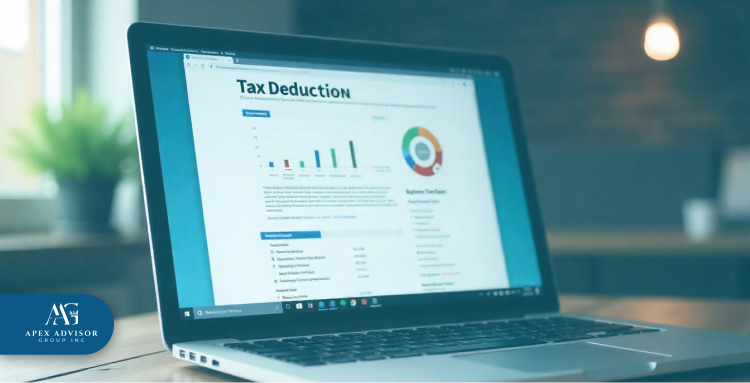
When preparing for tax season, don’t miss out on potential deductions that could lower your taxable income. Florida allows businesses to deduct several types of expenses, and identifying them can lead to significant savings. Here’s what to look for:
Home Office Use
If you use part of your home exclusively for business purposes, you may qualify for a home office deduction. This can include expenses such as rent, utilities, and even a portion of your internet costs, all tied to your home-based workspace.
Business Travel or Mileage
Any travel related to your business is typically deductible. This includes mileage driven for business purposes, as well as travel expenses like lodging, airfare, and meals when attending conferences, meetings, or client visits.
Depreciation of Business Equipment
If your business owns equipment like computers, office furniture, or machinery, you can deduct the depreciation over time. This helps offset the cost of these assets and reduces your overall tax liability.
Business-Related Subscriptions or Tools
Many of the subscriptions and tools you use to run your business are tax-deductible. This can include software subscriptions, industry-related publications, or marketing tools that are important for your operations.
Upgrade your understanding with the related resources:
Want Help with Tax Filing for Your Florida E-Commerce Business? Apex Advisor Group Is Here for You
Managing tax filing for your Florida e-commerce business can be a difficult task. However, with professional support, you can ensure that your deductions are maximized, your records are accurate, and your business meets all necessary requirements.
Apex Advisor Group specializes in assisting businesses like yours with tax preparation and financial management. Our team of professionals is ready to provide necessary support, helping your business stay on solid financial ground.
Whether you need assistance with tax strategy, deductions, or preparing your return, we offer the expertise to ease the process. Let us handle the details, so you can focus on growing your business properly. So, reach out today without hesitation and make tax filing one less task to worry about.

May 7, 2025
How Financial Coaching Can Prepare You for Tax Audits
A tax audit means your financial records will be thoroughly examined. Any mistakes or discrepancies could lead to serious consequences. Are your records in order? Did you report everything correctly?
Financial coaching helps you maintain organized, compliant records. Instead of scrambling for paperwork or worrying about past filings, you’ll have the confidence that your records are accurate and audit-ready.
Here’s how financial coaching helps you prepare for tax audits.
1) Ways a Financial Coach Helps You Avoid a Tax Audit
A financial coach helps you take the right steps to ensure the IRS doesn’t question your tax return. Here’s how a financial coach can help:
a) Keeping Accurate and Organized Tax Records
Many tax audits happen because of missing or incorrect information. If you don’t keep proper records, you might accidentally leave out income, claim a deduction you can’t prove, or misreport expenses. A financial coach helps you develop a system to organize receipts, invoices, bank statements, and tax forms throughout the year.
b) Reporting Income Correctly to Avoid an Audit
Whether you earn a salary, run a business, or have side income, every dollar you make must be reported properly. The IRS receives copies of tax forms like W-2s and 1099s, so if your reported income doesn’t match what they have on file, it could trigger an audit. A financial coach helps manage all income sources and guides proper handling of cash or untaxed earnings.
c) Claiming Only Legal Deductions to Prevent Audit Triggers
Tax deductions help reduce how much you owe.Claiming the wrong ones can cause problems. The IRS pays close attention to deductions that seem unusually high for a person’s income level. A financial coach helps you identify deductions you're legally allowed to claim, like business expenses, charitable donations, or home office costs. They also guide you in avoiding deductions that might be risky. They ensure you have proper documentation for every deduction in case you need to prove it later.
d) Filing Taxes Accurately and On Time to Avoid IRS Scrutiny
Even small mistakes—like entering the wrong Social Security number, misreporting amounts, or forgetting to sign your return—can catch the IRS’s attention. Missing the filing deadline can also cause problems, particularly if you owe taxes. A financial coach ensures accuracy, helps avoid errors, and may recommend a tax professional for complex returns.
Click here to learn how to reduce your risk of being audited and prepare your finances accordingly.
2. Support from a Financial Coach During an IRS Audit

Receiving an audit notice means the IRS needs more information about your tax return. A financial coach helps you understand the process, gather the necessary documents, and respond appropriately. Here’s how they can assist you:
a) Understanding Your IRS Audit Notice and What to Do Next
The audit notice from the IRS will explain what part of your tax return is being reviewed and what additional information is needed. A financial coach helps you carefully read the notice and breaks down the instructions, so you know exactly what to do next. They help you determine whether the audit is a simple review of specific details or a more in-depth examination of your financial records.
b) How to Gather the Right Documents for an IRS Audit
When the IRS requests more information, they typically ask for documents like income records, receipts, or bank statements. A financial coach helps you with this process. If you’re missing any documents, they guide you on how to find or reconstruct them. They also help you organize the documents in a way that makes it easier to submit everything the IRS needs without unnecessary delay.
c) How to Respond Professionally to an IRS Audit
A financial coach guides you in responding to the IRS by advising what to include, how to present it, and which documents to submit. They help you keep your reply professional and accurate, avoiding unnecessary details that could lead to more questions.
d) How to Negotiate and Reduce Penalties During an IRS Audit
If the IRS determines that you owe more taxes, you may also face additional penalties. A financial coach helps reduce penalties by setting up payment plans or explaining deductions to the IRS. If you disagree with the audit findings, they help you understand your options for challenging or appealing the IRS’s decision. They also guide you through each step of the process to ensure you know what to do next.
For more tips, check out Financial Planning for Taxes and IRS Guide to Tax Audits.
3. How Financial Coaching Prepares You for Future Tax Audits
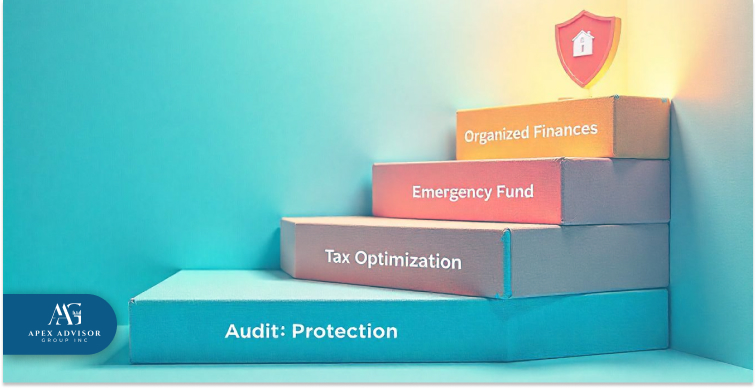
Learn how financial coaching can prevent future audits and help you plan for taxes effectively.
a) Preventing Future Audits with Healthy Financial Habits
One of the best ways to avoid triggering an audit is to establish solid financial practices. Financial coaching helps you create an organized, transparent financial record-keeping system that aligns with tax requirements. By regularly tracking expenses, income, and deductions, you reduce the chances of errors or inconsistencies that may draw attention from tax authorities.
b) Building an Emergency Fund for Tax Obligations
An often-overlooked aspect of financial planning is preparing for potential tax liabilities. A financial coach can guide you in building an emergency fund specifically for taxes. This helps you avoid scrambling for funds if you owe taxes or face unexpected penalties, ensuring you're financially equipped for any situation.
c) Improving Tax Planning to Legally Lower Your Tax Bill
Effective tax planning goes beyond basic filing. A financial coach can help you identify opportunities to minimize your tax liability through legal means. You can take full advantage of available options by focusing on strategies like retirement contributions, tax credits, and other deductions. This will help ensure you remain compliant with tax laws.
Here are some posts worth reading
Apex Advisor Group: Reliable Support for Tax Audit Preparation and Financial Coaching

Apex Advisor Group is here to guide you in preparing for tax audits and managing your finances through financial coaching. Here’s how we can help:
Preparing for Tax Audits: We carefully go over your financial records to find any areas that might cause concern during an audit. By addressing these issues early, you can be better prepared if an audit occurs.
Personalized Financial Advice: Our coaching helps you understand your finances and create a plan that works for you. We guide you on organizing your income, tax deductions, and saving, all of which can help reduce the risk of problems later.
Comprehensive Financial Guidance: We offer advice on all aspects of your finances, not just taxes. Our guidance helps improve your financial health, from budgeting to saving, while reducing audit risks.
Clear and Easy-to-Understand Advice: We make sure to explain things in a way that’s easy to follow, so you can understand your financial situation and know what steps to take next.
Addressing Issues Early: We review your finances regularly, helping you identify potential problems before they become bigger challenges. This approach helps you manage your finances and reduces the risk of complications during an audit.
For help with preparing for a tax audit or financial coaching, contact Apex Advisor Group today. Our team is ready to assist you in managing your finances.

April 20, 2025
How to Use Payroll Software for Tax Preparation
Taxes are a fact of life, but handling them doesn’t have to be a headache. Payroll software takes the stress out of tax prep by automatically calculating deductions, keeping up with tax laws, and making sure everything is filed on time.
So, how does it actually work? How do you set it up, and what features should you look for? Whether you’re running a small business or managing a growing team, the right payroll software can save you time, cut down on mistakes, and keep you in good standing with the IRS.
Let’s break it down in simple terms.
(1) How Payroll Software Calculates Taxes Automatically
Payroll software takes care of complex tax calculations by determining federal, state, and local tax amounts for each employee. It uses the latest tax rates and applies them to employee wages, ensuring accurate withholdings and preventing tax miscalculations.
✔ The software automatically deducts federal income tax, Social Security, and Medicare based on employee wages and tax brackets.
✔ State and local taxes are calculated based on the employee’s work location and residence.
✔ It considers exemptions, deductions, and tax credits to ensure employees are not over or undertaxed.
✔ Payroll software updates automatically when tax rates change, ensuring compliance with the latest tax laws.
✔ Automated calculations eliminate manual errors that could lead to IRS penalties or audits.
By handling these calculations automatically, payroll software saves businesses time and ensures employees' paychecks reflect the correct deductions.
(2) Setting Up Payroll Software for Correct Tax Filing
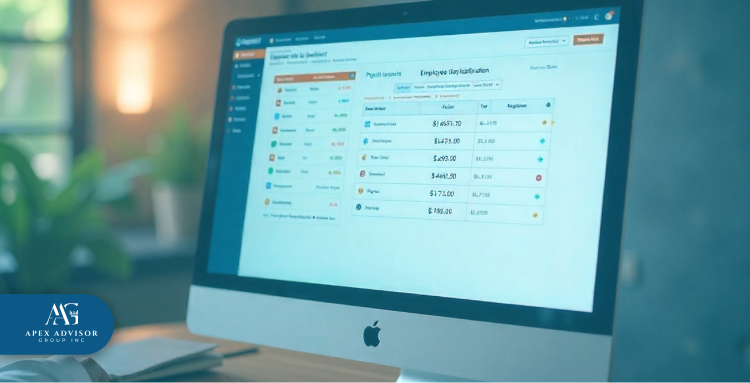
Proper setup ensures payroll software calculates and withholds the right tax amounts. Businesses must enter accurate employee tax details, verify tax rates, and set up payroll schedules to ensure timely tax payments.
Adding employee tax details
Employers must enter each worker’s Social Security number, filing status, and withholding allowances to determine tax amounts correctly.
Verifying tax rates
Payroll software needs to be configured with the correct federal, state, and local tax rates for compliance.
Automating tax deposits
Many payroll platforms allow businesses to set up automatic tax payments to the IRS and state tax agencies.
Setting up payroll schedules
Companies can schedule payroll runs to ensure wages and tax payments are processed on time, avoiding penalties for late filings.
Configuring additional deductions
Some employees may have extra withholdings for retirement plans, health insurance, or wage garnishments. Payroll software ensures these deductions are calculated correctly.
(3) Using Payroll Software to Fill Out and File Tax Forms

Tax filing becomes much easier with payroll software, as it automatically generates and fills out necessary tax forms based on payroll data. This feature significantly reduces manual paperwork and the chances of filing errors.
Automated W-2 and 1099 form generation:
Employees and independent contractors receive tax forms based on earnings recorded in the payroll system.
Quarterly and annual tax reporting
Payroll software helps businesses file forms like Form 941 (quarterly tax return) and Form 940 (annual unemployment tax return) on time.
Electronic tax filing
Many platforms offer e-filing capabilities, allowing businesses to submit payroll tax documents to the IRS and state agencies electronically, ensuring faster processing and reducing paperwork.
Integration with accounting software
Payroll software can sync with accounting programs, ensuring tax records match financial statements for easier tax reporting.
Recordkeeping for compliance
Payroll software stores all filed tax documents, helping businesses maintain accurate records for tax audits or employee requests.
(4) Keeping Up with Tax Law Changes Using Payroll Software
Tax laws frequently change at the federal, state, and local levels, and keeping up with these updates can be challenging. Payroll software ensures businesses remain compliant by automatically adjusting tax rates and notifying users about important regulatory changes.
Automatic tax rate updates
The software updates tax rates when new laws take effect, ensuring payroll deductions remain accurate.
Alerts for tax deadlines
Businesses receive reminders to file tax forms and make payments on time, reducing the risk of late penalties.
Compliance reports
Payroll systems generate reports that help businesses verify their tax compliance and prepare for audits.
State and local tax updates
Some states introduce new payroll tax requirements, such as paid leave programs or local employment taxes. Payroll software ensures businesses follow these changes.
Tax guidance features
Some payroll providers offer explanations of tax law changes, helping businesses understand how they impact payroll processing.
(5) Fixing Payroll Tax Mistakes Before They Become a Problem

Mistakes in payroll tax filings can lead to costly fines and penalties. Payroll software helps businesses detect and correct errors before they become significant issues.
Error detection
Payroll software flags inconsistencies in tax withholdings, payment amounts, and filing information.
Correction tools
Businesses can adjust tax filings directly within the software to fix underpayments or overpayments.
Amending tax returns
If an incorrect tax return has been filed, payroll software helps businesses generate and submit amendments.
Audit support
If a business is audited, payroll software provides a clear record of tax filings, payments, and adjustments, helping to resolve issues efficiently.
Preventing future mistakes
Some payroll systems offer training tools to educate users on common payroll tax mistakes and how to avoid them.
(6) Using Payroll Software for End-of-Year Tax Reports
The end of the year is a busy time for businesses preparing tax reports, but payroll software makes the process much smoother. It compiles payroll data to generate detailed tax summaries, making it easier for businesses to review and file year-end taxes.
Comprehensive payroll summaries
Payroll software provides a full breakdown of wages, tax withholdings, and employer contributions.
Year-end tax preparation checklists
Many platforms offer guides to help businesses complete required tax filings before deadlines.
Employee tax form distribution
Businesses can use payroll software to distribute W-2s and 1099s electronically or by mail.
Integration with tax professionals
Some payroll providers allow accountants to access tax records for easier tax return preparation.
Record retention for compliance
Payroll software stores tax records for several years, ensuring businesses have access to past filings when needed.
Check out the posts below for more insights.
Get Tax Preparation Help with Payroll Software from Apex Advisor Group
Apex Advisor Group provides expert guidance on using payroll software for tax preparation, ensuring businesses comply with tax regulations while maximizing efficiency. We assist businesses in the following ways:
Setting Up Payroll Software the Right Way
We make sure your payroll software is set up correctly to follow tax laws. Our team helps with tax withholdings, employee classifications, and reporting to prevent mistakes.
Making Tax Calculations Automatic
We help businesses set up payroll software to automatically calculate taxes like income tax, Social Security, and Medicare. This reduces errors and makes sure the right amounts are deducted. With automation, businesses avoid tax miscalculations and penalties.
Following Tax Rules
We keep track of tax law changes so businesses stay compliant. Our team updates payroll settings based on IRS guidelines and ensures tax reports are accurate.
Connecting Payroll to Tax Filing
We make payroll tax filing easier by linking payroll software to tax submission systems. Our team helps businesses process W-2s, 1099s, and quarterly tax returns automatically.
Giving Ongoing Help and Support
We provide continuous support to keep payroll tax reporting accurate. Our team helps solve payroll tax issues, handle audits, and improve tax processes.

April 10, 2025
How to Prepare Financial Statements Step-by-Step?
What if financial statements could tell a complete story—not just numbers on a page, a clear record of a business’s financial position? Every transaction, expense, and source of income plays a role in shaping that story. Without a structure, financial data can become unclear and unreliable.
Accurate financial statements ensure compliance, decision-making, and transparency, as each step aligns records with legal standards. A structured approach helps maintain accuracy, prevent errors, and provide a clear view of financial health.
Step 1: Gather Essential Financial Records Before You Start
Before you begin preparing financial statements, it's important to collect all necessary financial records.
(1) Important Documents to Collect
Bank Statements: These track all incoming and outgoing transactions, offering a comprehensive view of your business's cash flow. Reviewing them helps ensure that all financial activity is accounted for.
Invoices and Receipts: These serve as proof of business transactions, verifying both income and expenses. Keeping these organized allows for easier tracking and reconciliation of sales and purchases.
Payroll Records: If you have employees, payroll records ensure salaries, wages, benefits, and tax withholdings are correctly documented.
Tax Documents: These include previous tax filings, tax payment records, and any deductions claimed. Having these on hand helps maintain compliance with tax obligations and prepares you for tax season.
(2) Loan Agreements and Debt Records
If your business has any outstanding loans or financial liabilities, these agreements must be recorded to maintain transparency in financial reporting. Ensuring the accuracy of these records minimizes errors and discrepancies, providing a solid foundation for financial reporting. Proper documentation also helps in compliance with regulatory requirements, facilitates audits, and enhances credibility with investors and stakeholders.
Keeping detailed records of loan terms, repayment schedules, interest rates, and collateral obligations ensures better financial planning and risk management. Additionally, maintaining updated financial records enables businesses to assess their financial health, make informed strategic decisions, and avoid potential legal or financial complications.
Step 2: Record All Business Transactions Correctly

Accurate record-keeping is important for preparing financial statements. Every financial transaction should be properly categorized and documented to maintain clarity and consistency. This can be done using accounting software or a manual ledger.
(1) Categories of Transactions
Revenue: This includes all income earned through sales, services, investments, or other business activities.
Expenses: Operating costs such as rent, utilities, salaries, supplies, marketing, and maintenance expenses.
Assets: Items of value that your business owns, including cash, inventory, real estate, machinery, and equipment.
Liabilities: Financial obligations such as loans, accounts payable, and credit card debt.
Equity: Owner investments, retained earnings, and any distributions made to shareholders.
Recording transactions under the correct category ensures consistency and clarity in financial reports. Errors in this stage can lead to inaccurate statements and misinformed decision-making.
Step 3: Adjust Journal Entries for Accurate Reporting
Adjustments are necessary to reflect the true financial position of your business. Certain transactions might not be recorded immediately, requiring adjusting entries to ensure financial statements provide an accurate snapshot of the company’s financial health.
(1) Common Adjustments
Accrued Expenses & Revenue: Income and expenses should be recorded in the period they occur rather than when cash changes hands. For example, if a service was provided in December and paid for in January, it should be recorded in December’s financial statements.
Depreciation & Amortization: Assets lose value over time. Adjustments for depreciation (tangible assets like equipment) and amortization (intangible assets like patents) help reflect their decreasing value.
Prepaid Expenses & Outstanding Liabilities: If a business pays for expenses in advance, these must be recorded properly. Similarly, any outstanding liabilities, such as unpaid bills, should be documented to avoid misstatements.
Making these adjustments guarantees that financial statements provide a true and fair view of the company’s financial standing.
Step 4: Create an Accurate Income Statement
The Income Statement provides insight into the profitability of a business by outlining revenues, expenses, and net income over a specific period.
(1) Steps to Prepare an Income Statement
Calculate Total Revenue: Sum up earnings from all sources, including sales, service income, and other revenue streams.
Deduct Cost of Goods Sold (COGS): Identify direct costs associated with producing goods or services.
Subtract Operating Expenses: Account for rent, salaries, utilities, marketing, and other operational costs.
Account for Taxes and Interest: Deduct these from the remaining balance.
Determine Net Income: The final profit or loss after all expenses.
(2) Example format
Total Revenue: $100,000
COGS: $40,000
Gross Profit: $60,000
Operating Expenses: $30,000
Operating Income: $30,000
Taxes & Interest: $5,000
Net Income: $25,000
This structure helps visualize the company’s financial performance.
Step 5: Prepare a Balanced Balance Sheet
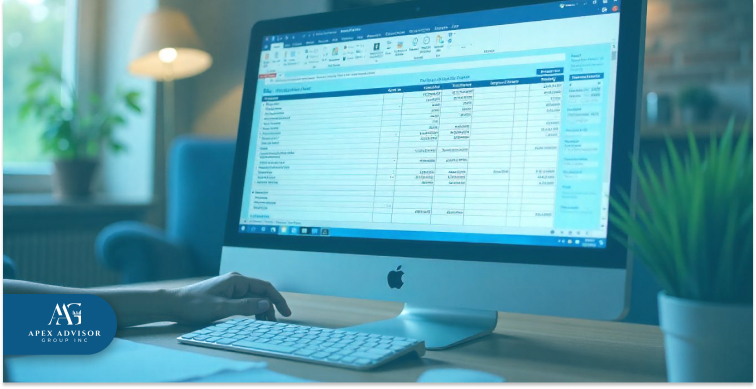
A Balance Sheet is a financial statement that provides a snapshot of a company's financial position at a specific point in time. It follows the fundamental accounting equation:
Assets=Liabilities+Equity
Main Components of a Balance Sheet:
Assets: What the company owns, including cash, accounts receivable, inventory, and property.
Liabilities: What the company owes, such as loans, accounts payable, and other obligations.
Equity: The owner's or shareholders' stake in the company, including retained earnings and capital investments.
A balance sheet helps businesses assess financial health, liquidity, and overall stability. It is commonly prepared at the end of an accounting period, such as quarterly or annually.
(1) Categories to Include
Current Assets: Cash, accounts receivable, and inventory.
Non-Current Assets: Machinery, real estate, and long-term investments.
Current Liabilities: Short-term loans, accounts payable, and accrued expenses.
Long-Term Liabilities: Mortgages and long-term business loans.
Owner’s Equity: Retained earnings and capital contributions.
Ensuring that total assets match total liabilities and equity verifies the accuracy of financial statements.
Step 6: Track Your Business Liquidity with a Cash Flow Statement
A Cash Flow Statement is like a financial pulse check for your business. It shows how much money is coming in, where it’s going, and whether you have enough to keep things running. Many businesses struggle not because they aren’t making a profit—because they don’t have enough cash on hand. This statement helps you avoid that situation.
(1) Why a Cash Flow Statement Matters
Cash flow is what keeps your business alive. Your sales numbers might look great. If you don’t have enough cash to cover expenses, your business could be at risk. This could lead to missed payroll, unpaid bills, or even shutting down operations.
A Cash Flow Statement helps you:
✓See if you have enough cash to handle expenses.
✓Spot potential cash shortages before they become a crisis.
✓Make smarter financial decisions about spending, investing, or borrowing
✓Breaking Down the Cash Flow Statement
A Cash Flow Statement is divided into three main sections:
Operating Activities: This is your day-to-day cash flow. It includes money coming in from customers and going out for things like rent, payroll, and utility bills.
Investing Activities: This covers cash spent or received from buying or selling assets, like new equipment or property.
Financing Activities: This tracks cash from loans, repayments, investor contributions, and dividend payments.
(2) How to Prepare a Cash Flow Statement
Businesses can calculate cash flow in two ways:
Direct Method: Lists actual cash transactions, like money received from customers and payments made to suppliers.
Indirect Method: Starts with net income and adjusts for non-cash expenses, such as depreciation or outstanding invoices.
(3) Example of a Cash Flow Statement
Imagine your business has the following cash movements in a month:
Cash from operating activities: $15,000 from sales and services.
Cash from investing activities: You spent $10,000 on new equipment.
Cash from financing activities: You received a $5,000 loan.
At the end of the month, your net cash flow is $10,000. This means your business has enough cash to cover expenses and plan for growth.
(4) Why This Matters for Your Business
Many businesses fail because they don’t manage their cash properly. A positive cash flow means you can pay your bills on time, invest in growth, and avoid financial stress. On the other hand, if your cash flow is negative, it’s a sign that you need to adjust your spending, increase revenue, or find additional funding.
Find out more legal solutions here:
Step 7: Review and Verify Financial Statements for Accuracy

Once the financial statements are prepared, they must be thoroughly reviewed to ensure accuracy, consistency, and compliance with accounting standards. A careful review can prevent financial misstatements, legal risks, and potential issues with regulatory authorities.
(1) Important Steps in the Review Process:
✔ Cross-check figures for Consistency
Compare numbers across all financial reports (income statement, balance sheet, and cash flow statement) to ensure they align.
Verify that revenue, expenses, and net income match across related reports.
✔ Identify and Correct Errors
Look for discrepancies in recorded transactions, missing entries, or misclassifications.
Recalculate key figures, such as total revenue, net income, and retained earnings, to confirm accuracy.
Ensure all adjusting journal entries (such as depreciation, accruals, and deferrals) have been properly recorded.
✔ Ensure Compliance with GAAP or IFRS
Confirm that all financial statements follow Generally Accepted Accounting Principles (GAAP) or International Financial Reporting Standards (IFRS), as required. Follow the Financial Accounting Standards Board (FASB) Accounting Standards to ensure your statements comply with GAAP.
Check disclosures and footnotes for completeness and transparency, ensuring they accurately explain financial data and any potential liabilities.
Review accounting policies applied to transactions, making sure they align with industry standards and legal requirements.
Apex Advisor Group: Your Trusted Partner in Financial Statement Preparation
Managing financial statements takes time and attention. However, we’re here to help.
Clear and Accurate Reports
We make sure your financial statements are organized, reliable, and meet all accounting standards.
Catching Mistakes Early
We go through your records carefully to spot and fix any errors before they cause trouble.
Solutions That Fit Your Business
Whether you’re running a small shop or a growing company, we adjust our approach to match what you need.
Staying Prepared for Taxes and Audits
We keep your financial records organized, so when tax season or audits come around, you don’t have to stress.
Practical Guidance
We explain your financials in a way that actually makes sense, so you know exactly where your business stands and what to do next.

March 13, 2025
How to Use Life Insurance for Estate Tax Planning
A life’s work can vanish too easily. You spend years building something—security, comfort, a legacy—only to realize that, without a plan, much of it may slip through your fingers. Estate taxes wait like an inevitability, taking their share before your loved ones ever see what you intended for them.
Life insurance is a way to push back against that loss, to make sure what you built stays with the people who matter. But how does it really work? And is it the right choice for you?
Let’s strip away the complexity and get to the heart of it…
(1) What Are Estate Taxes and Why Do They Matter?
When you pass away, your estate may owe taxes before your heirs receive anything. The federal estate tax applies if your assets exceed a certain threshold, which is adjusted annually. If your estate surpasses this limit, a significant portion could go to the government instead of your loved ones.
Additionally, some states impose their own estate or inheritance taxes, further reducing the amount your heirs receive. These taxes can create financial strain, especially if your assets are tied up in real estate or a business. This can make it difficult for your heirs to cover the costs without selling valuable property. For the latest estate tax thresholds and regulations, visit the IRS Estate Tax
(2) How Life Insurance Can Help Cover Estate Taxes
Life insurance provides an immediate source of cash to your heirs, bypassing probate. This ensures they have funds to cover estate taxes, legal fees, and other expenses. Without a life insurance policy, your beneficiaries may be forced to sell assets, take out loans, or use personal savings to settle estate-related costs. The right policy can prevent this financial burden and preserve your family’s wealth.
It also allows your heirs to maintain ownership of key assets such as homes, businesses, or investments. A properly structured life insurance plan ensures your legacy remains intact. It also provides peace of mind that your family won’t face unnecessary financial hardship.
(3) Choosing the Right Life Insurance for Estate Planning
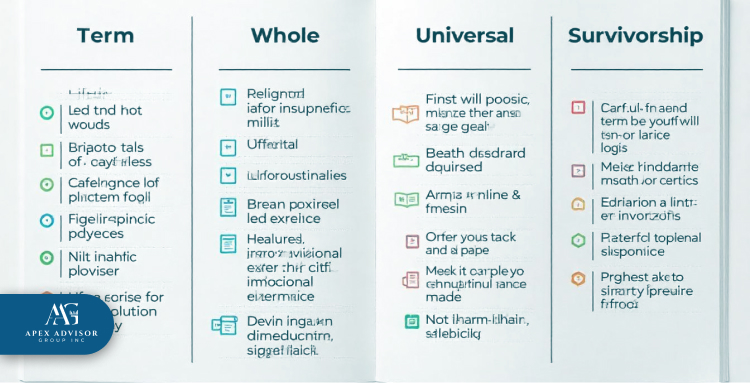
Selecting the right life insurance policy depends on your estate planning goals and financial situation. Here’s a breakdown of options to consider:
Term Life vs. Permanent Life: What’s the Difference?
Term life insurance offers coverage for a set period, typically 10 to 30 years. It’s more affordable than permanent life insurance but expires if you outlive the term. It can be useful for temporary needs. However, it’s not ideal for estate tax planning because estate taxes are due upon death, no matter when that happens.
Permanent life insurance, on the other hand, provides lifelong coverage and accumulates cash value over time. This ensures that a death benefit is available when needed to cover estate taxes and other obligations.
Whole Life Insurance: A Reliable Option for Estate Planning
Whole life insurance offers lifetime coverage and builds cash value that grows over time. Premiums remain consistent, and the policyholder can borrow against the accumulated cash value if needed. This makes it a stable and predictable option for estate planning, ensuring a guaranteed payout to heirs.
Universal Life Insurance: Flexible and Tax-Friendly
Universal life insurance offers more flexibility than whole life insurance. Policyholders can adjust premium payments and death benefits, making it a good choice for those with fluctuating financial circumstances. Additionally, the tax-deferred growth of the policy’s cash value can provide extra financial benefits.
Survivorship Life Insurance: A Smart Choice for Married Couples
Also known as second-to-die insurance, survivorship life insurance covers two people, typically spouses, and pays out after both have passed. Since estate taxes are usually due after the second spouse dies, this policy ensures funds are available when needed. It is often more affordable than individual permanent policies and is particularly beneficial for high-net-worth couples looking to reduce estate tax burdens.
(4) Why an Irrevocable Life Insurance Trust (ILIT) Can Save You Thousands
One of the most effective ways to keep life insurance proceeds tax-free is by using an Irrevocable Life Insurance Trust (ILIT). If your life insurance policy is owned by your estate, the payout may be subject to estate taxes. An ILIT prevents this by holding the policy outside your estate, ensuring that the death benefit remains tax-free for your heirs.
By transferring ownership of the policy to the ILIT, you remove it from your taxable estate while maintaining control over how the funds are distributed. However, to maximize its benefits, the ILIT must be set up correctly. Once the policy is placed in the trust, you cannot take it back or make changes. Proper structuring with the help of an estate planning attorney ensures compliance with tax laws and maximizes the advantages of an ILIT.
(5) Smart Ways to Pay Life Insurance Premiums Without Tax Issues

To avoid unnecessary taxes, consider these strategies for paying life insurance premiums:
Annual Gifting
You can gift money to the trust each year, up to the annual tax-free gift limit, to cover premium payments. This keeps funds out of your taxable estate while ensuring premiums are paid on time.
Joint Gifting Strategies
Married couples can take advantage of gift-splitting, effectively doubling the amount they can gift tax-free each year.
Structuring Payments Properly
Payments should be structured correctly to avoid triggering gift tax consequences or including the policy in your estate. Consulting with a financial professional ensures compliance with tax regulations.
(6) Mistakes People Make with Life Insurance and Estate Planning
Even with careful planning, common mistakes can lead to unnecessary taxes and complications. Avoid these pitfalls:
Naming the Wrong Owner or Beneficiary
If the policy is owned by the estate or the beneficiary designation is incorrect, the proceeds could be subject to estate taxes.
Forgetting to Update Policies
Life insurance policies should be reviewed regularly to reflect changes in estate value, family structure, and financial needs. Failing to adjust coverage could leave heirs with a shortfall.
Ignoring State Estate Taxes
Even if you don’t owe federal estate taxes, state-level estate or inheritance taxes could still apply. Understanding state tax laws helps prevent unexpected financial burdens.
Looking for more information? Read these related posts.
Secure Your Estate with Life Insurance Strategies from Apex Advisor Group

When planning your estate, life insurance can play a vital role in minimizing estate taxes and ensuring a smooth transfer of assets to your beneficiaries. Here’s how we can assist you in utilizing life insurance for effective estate tax planning:
Customized Life Insurance Strategies
We specialize in crafting life insurance solutions tailored to your estate planning needs. We help you determine the right type and amount of coverage to address estate taxes.
Minimize Estate Tax Liability
We provide guidance to ensure that your life insurance policy is structured to reduce your estate's tax burden. This helps provide financial relief to your heirs.
Estate Liquidity Solutions
Life insurance can provide immediate liquidity to your estate. This is essential to cover estate taxes and other expenses without having to sell off valuable assets. We help you choose the right policy to ensure your estate remains intact.
Trust Planning for Tax Efficiency
We can guide you through using an Irrevocable Life Insurance Trust (ILIT). This allows the death benefits to bypass estate taxes and pass directly to your beneficiaries.
Policy Review and Adjustments
We regularly review your life insurance policy to ensure it continues to meet your evolving estate planning goals. We make adjustments as needed to maintain tax efficiency.

March 8, 2025
How to Choose the Right Business Consulting Service for Tax Needs
They say, "In this world, nothing can be said to be certain, except death and taxes." Well, Benjamin Franklin sure hit the nail on the head, but that doesn’t mean we can’t be smart about how we handle the latter. When it comes to running a business, figuring out tax strategies is a bit like steering a ship through stormy seas. One wrong move, and you could be in deep water.
So, if you’ve been scratching your head, wondering how to find the perfect partner to tackle those tax headaches, don’t worry. You’re in the right place. Let’s talk about what really makes a good fit for your business when it comes to tackling tax issues.
(1) Define Your Business’s Tax Needs to Set Yourself Up for Success
The first step to finding the right consulting service is understanding your tax needs. Are you looking for basic compliance, strategic tax planning, or help with audits? For example, a small retail store might need help with quarterly tax filings.
On the other hand, a manufacturing company may require expertise in tax credits and deductions related to production. Take time to identify your specific requirements so you can focus your search on consultants who offer the right services. Learn more about business tax requirements from the IRS Small Business and Self-Employed Tax Center.
(2) Identify Your Tax Challenges and Goals
Tax consulting isn’t one-size-fits-all. Are you facing challenges like unfiled returns, penalties, or complex reporting requirements? Or perhaps you have goals such as reducing your tax liability or streamlining your compliance processes. A clear picture of your challenges and objectives will help you find a consultant who can provide tailored solutions that align with your business goals. For guidance, explore the Taxpayer Advocate Service, which provides useful insights on common tax issues.
(3) Choose Certified and Experienced Tax Professionals You Can Trust

Credentials matter when it comes to tax consulting. Look for professionals with recognized certifications such as Certified Public Accountant (CPA), Chartered Accountant (CA), or Enrolled Agent (EA). These certifications indicate that the consultant has undergone rigorous training and adheres to professional standards.
This expertise can make all the difference, especially if your business faces complex tax issues. The National Association of Enrolled Agents (NAEA) can help you verify a consultant’s credentials.
Essential Tax Consulting Services Your Business Should Consider
Tax consulting isn’t limited to filing returns. It encompasses a broad range of services, including:
Tax planning to minimize liabilities
Assistance with audits or disputes
Advice on tax credits and deductions
Help with payroll taxes
Understanding the full scope of services available will help you make a better choice. Explore the IRS Tax Planning and Recordkeeping Guide for additional information.
How Tax Planning and Compliance Save You Time and Money
Effective tax planning is a strategic tool to save money. A skilled consultant can help you identify deductions and credits you might have missed and structure your operations to maximize tax benefits. Additionally, staying compliant prevents penalties that can eat into your profits. Learn more about compliance from the IRS Compliance & Enforcement section.
(4) Explore the Full Range of Tax Services Available
When evaluating a tax consultant, ask about the range of services they offer. Do they provide help with international taxes? Can they assist with tax credits for green initiatives? A consultant with a wide array of services can adapt to your changing needs as your business grows.
How to Assess a Tax Consultant’s Communication Skills
Clear communication is important for a tax consultant. You need someone who can explain complex tax issues in simple terms and keep you informed about deadlines and updates. During your initial consultation, pay attention to how they answer your questions and whether they seem approachable and transparent.
Why Responsive and Accessible Tax Services Benefit Your Business
Taxes often involve tight deadlines, so you need a consultant who is available when you need them. A responsive consultant can address urgent questions and help you avoid costly delays. Accessibility ensures that you have the support you need, even during busy tax seasons.
(5) Check Reviews and Testimonials

Reviews and testimonials are invaluable when selecting a tax consultant. Look for feedback from businesses similar to yours to understand the consultant’s strengths. Pay attention to comments about their reliability, expertise, and customer service.
Must-Have Technology for Modern Tax Consultants
The right technology can make tax consulting more efficient and secure. Look for consultants who use tools like cloud-based accounting software, secure document portals, and analytics platforms. These tools streamline processes and give you real-time insights into your finances. The IRS E-Services platform is an example of how technology is transforming tax processes.
How Advanced Tools Ensure Secure and Efficient Tax Solutions
Technology is about security and accuracy. Advanced tools reduce the risk of errors and ensure that your sensitive financial data is protected. Ask potential consultants about the tools they use and how they stay up-to-date with the latest tech trends.
(6) Compare Pricing and the Value of Tax Consulting Services
Price is an important factor, but it’s not the only one. Focus on the value you’re getting for your money. A slightly more expensive consultant who saves you thousands in taxes is worth the investment. Be sure to ask for detailed pricing information to avoid surprises later.
Why Transparency in Pricing Builds Trust with Your Tax Consultant
Transparency in pricing is essential to avoid misunderstandings or hidden fees. A consultant who clearly communicates their rates and any additional costs is more likely to be trustworthy. Transparent pricing also promotes a better working relationship, as you can be confident that there are no surprises when the bill arrives.
How to Analyze Tax Consulting Costs Without Compromising Quality
When comparing costs, consider the services included in the price. A lower-cost option might lack the comprehensive support your business needs. Think long-term—investing in quality consulting now can save you money and stress down the line.
(7) Choose a Tax Consulting Service That Will Grow With Your Business

Your business needs will evolve, so choose a consultant who can grow with you. Look for someone who offers scalable services and has a track record of supporting businesses as they expand.
How to Build a Lasting Partnership with Your Tax Advisor
A strong relationship with your tax advisor is very important for your business. Regular check-ins, open communication, and proactive advice help build trust and ensure that your taxes are always in good shape. Think of your tax advisor as a partner in your success.
Why Ongoing Support and Proactive Tax Strategies Matter
Taxes aren’t something you deal with just once a year. Having ongoing support means you’re ready for any new rules and can make the most of opportunities as they come up. With a proactive approach, you’ll always stay one step ahead, instead of rushing to catch up when things get complicated.
Why Apex Advisor Group Is the Right Choice for Your Business Tax Consulting
When it comes to handling your business's taxes, we get that you want someone who truly understands your needs and can make your life easier. Here’s how we can help you:
Customized Tax Strategies
We take the time to get to know your business inside and out. We create tax strategies that match your business goals, helping you lower your tax bill, maximize deductions, and make your tax setup work better for you.
Industry-Specific Knowledge
Every business is different, and so are its tax needs. Whether you’re in healthcare, retail, or technology, we bring the specific expertise that applies to your industry. You won’t have to worry about generic advice—we focus on what matters most for your business.
Planning Ahead
We don’t just react when tax time rolls around. We help you plan ahead so that you can avoid surprises and take advantage of opportunities. Our team keeps an eye on changing tax laws to help you make the best choices for your business.
Full-Service Support
We handle everything from tax preparation to representing your business in case of an audit. No need to look for other consultants—when it comes to your business’s taxes. We’ve got it all covered, helping you with whatever you need, whenever you need it.
Clear and Honest Pricing
We believe in being upfront about costs. You’ll always know what to expect and won’t be hit with unexpected charges. We want you to feel confident in the decisions you make without worrying about hidden fees.
Dedicated to Your Success
Our job isn’t just about giving advice—it’s about helping you take action and see results. We’re here to guide you through every step of the process, and we focus on building a lasting relationship to support your business long-term.
Safe and Efficient Technology
We use secure and reliable technology to make sure your financial information is protected and that everything is handled quickly and accurately. You don’t have to worry about your data being at risk or spending extra time on complicated processes. So, whether you have questions or want to dive right in, reach out to us today.

February 26, 2025
The Importance of Early Tax Preparation
Taxes - they arrive every year, like the changing of the seasons, uninvited but inevitable. We often wait until the last moment, hoping the burden will somehow disappear. But the truth is, filing early isn’t just a matter of crossing something off a list; it’s about taking control of a process that can otherwise feel like a distant, unshakable weight.
In this simple act of addressing something uncomfortable before it forces our hand, there lies a kind of freedom. A freedom from stress, from uncertainty, and from the looming possibility of regret. Why not embrace it now?
I) Top Reasons to File Your Taxes Early
Filing taxes early gives you time to uncover deductions and credits, ensuring you keep more of what's yours. The sooner you file, the more you save.
➤ Maximum Tax Deductions and Credits
Claim All Eligible Deductions: Deductions can add up quickly whether you’ve worked from home or incurred medical expenses. You can deduct a portion of your rent or mortgage, utilities, and even office supplies if you have a dedicated home office.
Similarly, medical expenses—if they exceed a certain percentage of your adjusted gross income—are deductible, and early preparation ensures you don’t miss these opportunities.
Leverage Retirement Contributions: Early tax preparation also allows you to make strategic decisions about retirement contributions. For instance, contributing to a traditional IRA before the filing deadline can reduce your taxable income, which may lower your overall tax liability.
This is especially beneficial if you anticipate being in a higher tax bracket in the future. Additionally, if you're self-employed, contributing to a SEP IRA or Solo 401(k) can significantly impact your tax bill, offering both savings and long-term financial security.
Utilize Tax-Loss Harvesting: If you’re an investor, early preparation allows you to consider tax-loss harvesting, a strategy where you sell losing investments to offset the gains made by other assets. This can be particularly advantageous if you’ve experienced significant market fluctuations. However, it’s also time-sensitive—so acting early ensures you don’t miss the window to optimize your portfolio for Tax-Saving Strategies for Florida Tangible Property.
➤ Secures Early Tax Refunds

Faster Refunds:
When you file early, particularly if you opt for e-filing and choose direct deposit, you significantly increase your chances of receiving your refund in as little as 3 weeks. This is especially beneficial for those who rely on their refunds for major expenses or as an opportunity to get a jumpstart on their financial goals.
Early filing let’s you avoid the delays that typically occur as the April 15 deadline approaches each year. During this peak period, the IRS experiences a significant increase in returns, leading to longer processing times and potential delays in receiving refunds. By submitting your tax return early, you ensure a smoother, faster experience.
Smart Use of Refunds:
An early refund gives you the chance to boost your long-term financial health. Whether you invest in stocks, bonds, or retirement accounts; replenish savings; or pay down high-interest debt, receiving your refund sooner allows you to take action and strengthen your financial position for the year ahead.
➤ Reduces Filing Errors
Cross-Check Income Statements and Deductions:
Filing early gives you the luxury of thoroughly reviewing your income statements (W-2s, 1099s) and ensuring all deductions are accounted for. A simple oversight, like missing a 1099 form from a freelance client or neglecting to include your student loan interest deduction, can lead to a delay in your return or even trigger an audit.
Avoid IRS Rejections:
Filing late often leads to rushing through the process, increasing the likelihood of mistakes. These errors—such as incorrect Social Security numbers, improper filing statuses, or unreported income—can result in IRS rejections, which means you’ll have to resubmit your return and potentially face additional delays.
➤ Prevents Tax-Related Identity Theft
Tax identity thieves often wait until the filing season is in full swing, hoping to exploit the delay in tax filings. The earlier you submit your return, the less time criminals have to submit a fraudulent return using your Social Security number. This proactive approach greatly diminishes the likelihood of someone else filing a return in your name and claiming your refund.
The primary goal for most tax fraudsters is to file a return that results in a refund, which they can then intercept. If you’ve already filed, they won’t be able to access your refund. Filing early gives you the advantage of securing your refund before a scammer has the opportunity to claim it.
Pro Tip: If, despite your best efforts, your identity is stolen and a fraudulent return is filed, the IRS will flag it early in the process.
II) Avoiding Penalties and Financial Surprises

Filing early not only helps you avoid penalties but also gives you a clear financial advantage in managing your taxes.
Prevents Late Filing Penalties:
Filing on time avoids IRS penalties and interest charges, which can accumulate quickly if you miss the deadline. With the IRS charging 0.5% of the unpaid taxes per month for late filings, these penalties can add up significantly. Filing early ensures you’re not caught off guard by unexpected fees, giving you peace of mind and a smoother tax season.Helps Plan Payments:
Filing early lets you accurately calculate what you owe and gives you ample time to plan. If you owe a large amount, you can set up a payment plan with the IRS, spreading out the cost. The IRS offers installment agreements for taxpayers who can’t pay in full, which helps reduce financial strain.
III) Staying Informed and Taking Action
Staying ahead of tax law changes and taking proactive steps in your preparation can make all the difference in maximizing your savings and ensuring compliance. Take these measures to avoid future penalties:
Adapting to Tax Law Changes: Tax laws are constantly evolving, from updated tax rates to changes in deductions and credits. By staying informed, you can take full advantage of new opportunities for savings. For example, the IRS frequently updates income thresholds, standard deductions, and tax credits—knowing these changes early allows you to adjust your financial strategy accordingly.
Use Tax Software or Hire a Professional: You can use tools like TurboTax, H&R Block, or top-notch accounting tax softwares for easier your filing process. These tools are often equipped with up-to-date tax law information, making them ideal for tackling basic returns. For more complex situations—such as managing investments, owning a business, or handling significant deductions—consulting a tax professional can provide personalized advice.
Stay Updated on IRS Announcements: The IRS regularly releases updates on filing deadlines, changes to tax law, and specific filing procedures. Checking these announcements ensures you’re in the loop and can adjust your filing accordingly, avoiding any last-minute surprises.
Stay Organized and File with Confidence: Contact Apex Advisor
Getting a head start on your taxes means reducing stress and ensuring accuracy; the earlier you get organized, the less likely you are to miss out on deductions that could reduce your taxable income. Apex Advisor Group INC offers expert guidance on what records to keep and how to stay on top of them, ensuring you don’t overlook valuable savings opportunities. From gathering all the essential financial documents—W-2s, 1099s, and receipts for deductible expenses like medical bills, business costs, and charitable donations—we’ve got you covered.
We keep our clients informed of IRS updates, ensuring they stay ahead of any changes that could affect their tax filings. With our rdetail-oriented approach, you can trust that your taxes will be prepared accurately and submitted on time, regardless of evolving regulations.

February 22, 2025
Tax Preparation Checklist What Documents You Need
It’s strange, isn’t it? How something as inevitable as taxes still manages to surprise us every year. Like the steady rhythm of the seasons, tax time arrives, and yet we’re often unprepared. We scramble through drawers for receipts and hunt for forms we swore we’d kept safe. It’s a ritual, almost absurd in its repetition, but one we cannot escape.
So, here we’re faced with the challenge once more. But perhaps there’s a way to make this ordeal a little less problematic. With the right documents—a checklist to guide you through the frenzy—you might find a curious sense of order amidst the confusion. Now let’s begin…
1) Essential Personal Information for Tax Filing
Accurate personal information is the cornerstone of efficient tax preparation. The IRS relies on precise details to verify your identity, ensure your return is processed correctly, and apply any eligible credits or deductions. Here’s what you need:
Social Security Numbers (SSNs)
Ensure you have the correct SSNs for yourself, your spouse (if filing jointly), and any dependents you claim. This number is essential for verifying your tax return and qualifying for key benefits such as the Child Tax Credit or Earned Income Tax Credit. Double-check that the numbers match what’s on official documents to avoid processing delays.
Identity Protection PIN (IP PIN)
If the IRS has issued you an IP PIN, include it when filing your return. This unique 6-digit number helps protect your identity by preventing fraudulent tax filings in your name. You can retrieve your IP PIN through the IRS’s online account tool if you've misplaced it. Consider applying for one if identity theft has ever been a concern, as it adds an extra layer of security.
2) Income Documentation: What You Need to Report

Accurate income reporting is fundamental to a well-filed tax return. The IRS requires taxpayers to disclose all sources of income, whether from traditional employment, freelance work, or investments. Here’s a refined guide to essential income documents:
(i) W-2 Forms
Employers issue these forms and summarize your annual wages and withheld taxes. Ensure you receive a W-2 from every employer you worked for during the year. Compare the amounts with your final pay stubs to spot discrepancies early.
(ii) 1099 Forms
The freelance and investment world thrives on 1099 forms. Depending on your income source, you might receive:
1099-NEC: For non-employee compensation from contract or gig work.
1099-MISC: For miscellaneous income, such as rental earnings or awards.
1099-INT: Reporting interest earned from savings accounts or bonds.
1099-DIV: Detailing dividend income from stocks or mutual funds.
If you’re involved in multiple ventures, create a dedicated file to track these forms as they arrive.
(iii) Business Income Records
For entrepreneurs and self-employed individuals, comprehensive record-keeping is non-negotiable. Compile invoices, receipts, and bank statements reflecting income and deductible expenses. Digital accounting tools can simplify this process while ensuring audit-ready accuracy.
(iv) Unemployment Income
Form 1099-G reports unemployment benefits received during the tax year. Remember, these payments are taxable, and failing to report them can trigger IRS penalties. Consider opting for tax withholding when applying for benefits to minimize surprises at tax time.
(v) Rental Income
For rental property owners, maintaining precise records of rental income and related expenses is essential. Track payments received and document expenditures such as repairs, maintenance, and property management fees. Detailed record-keeping ensures you claim every eligible deduction, optimizing the accuracy and value of your tax return.
3) Top Tax Deductions and Credits You Should Claim

To get the most out of your tax return, it’s essential to have the right deduction and credit documents on hand. Here’s a curated list of essential documents for tax-saving opportunities:
(i) Childcare Expenses
If you’ve incurred childcare costs, you may be eligible for the Child and Dependent Care Credit. Ensure you have:
The provider’s full name, address, and tax ID (or Social Security number).
Receipts or statements showing payments made during the year.
Tip: Payments to eligible daycare centers, nannies, and after-school programs may qualify.
(ii) Education Expenses
Education-related deductions and credits can ease the financial burden of higher learning. Keep:
Form 1098-T: Issued by educational institutions for qualified tuition payments.
Form 1098-E: Reporting interest paid on student loans.
Insight: Consider claiming the American Opportunity Credit or the Lifetime Learning Credit, depending on your eligibility.
(iii) Medical Expenses
Medical costs can add up quickly, and certain out-of-pocket expenses may be deductible if they exceed 7.5% of your adjusted gross income (AGI). Gather:
Receipts for doctor visits, prescriptions, and medical equipment.
Insurance statements showing payments and reimbursements.
Mileage records if you traveled for medical care.
(iv) Charitable Contributions
Generosity comes with tax benefits. To claim the charitable contributions deduction, retain:
Receipts or acknowledgment letters from charitable organizations.
Details of non-cash donations, including fair market value and descriptions.
Tip: Donations above $250 require a written acknowledgment from the charity.
(v) Mortgage Interest Statement
Homeowners can deduct mortgage interest paid on a primary or secondary residence. Look for:
Form 1098: Issued by your mortgage lender, detailing interest paid throughout the year.
Suggestion: Review your escrow statements for additional deductible property-related costs.
(vi) Property Tax Bills
State and local property taxes are deductible, subject to certain IRS limits. Keep:
Official property tax bills showing payments made.
4) Investment and Retirement Forms You Need for Tax Reporting

Carefully managing your investment and retirement records is crucial for accurate tax reporting and optimizing savings. These documents help you track gains, losses, and tax-deferred contributions with precision. Here’s a refined guide to key forms and documents you’ll need:
(i) 1099-B or 1099-S
When you sell stocks, bonds, mutual funds, or real estate, these forms report your capital gains or losses:
Form 1099-B: Issued by brokerage firms, it summarizes sales of securities, including stocks, ETFs, and mutual funds. Pay close attention to the cost basis, as it determines taxable gains or losses.
Form 1099-S: If you sold real estate, this form records sale proceeds. Deductible costs such as closing fees or home improvements can reduce taxable gains.
Insight: Review your investment account statements for unreported transactions to ensure a complete and accurate return.
(ii) 1099-R
This form reports distributions from retirement accounts, including pensions, annuities, and IRAs. Expect to receive it if you:
Took a withdrawal from a 401(k), traditional IRA, or Roth IRA.
Received a lump-sum payout from a pension.
Tax Tip: Certain withdrawals may be subject to early withdrawal penalties if you’re under 59½, though exceptions may apply for hardships or first-time home purchases.
(iii) IRA Contributions
Keeping records of contributions to your Individual Retirement Accounts (IRAs) is crucial for claiming potential deductions:
Traditional IRA Contributions: These may be tax-deductible depending on your income and retirement plan participation.
Roth IRA Contributions: Though non-deductible, they offer tax-free growth and qualified withdrawals.
Pro Tip: Use IRS Form 5498 (issued by your financial institution) to verify contributions. Maintaining a multi-year record helps track your eligibility for tax-saving opportunities, especially for rollovers and conversions.
5) Other Crucial Forms to Ensure Accurate Tax Filing

Beyond income and deduction documents, several key forms ensure a thorough and accurate tax return. These records facilitate precise filings, accelerate refunds, and help prevent any issues with the IRS. Here’s a breakdown of key supplementary documents:
(i) Prior Year Tax Returns
Keeping copies of previous tax returns is invaluable for reference. They provide a roadmap for filing consistency, helping to:
Verify past income, deductions, and credits.
Carry forward unused tax credits or capital losses.
Respond swiftly to IRS notices, if needed.
Tip: Store returns securely for at least 3 to 7 years, depending on the complexity of your filings.
(ii) Bank Account Information
Direct deposit remains the fastest and most secure way to receive your tax refund. Ensure you have:
Bank Routing Number: Identifies your financial institution.
Account Number: Specifies where funds should be deposited.Double-check bank details to avoid refund delays or misdirected payments.
(iii) Health Insurance Information
Health insurance details are essential for compliance with IRS healthcare mandates. Depending on your coverage, you may receive:
Form 1095-A: For Marketplace insurance plans, detailing premiums and advance premium tax credits.
Form 1095-B: From insurers reporting minimum essential coverage.
Form 1095-C: From large employers offering health plans.
(iv) Alimony Payments
If you pay or receive alimony, proper documentation ensures tax compliance:
For Payers: Include the recipient’s Social Security Number (SSN) to claim the deduction (if the agreement was finalized before 2019).
For Recipients: Report alimony as taxable income if applicable.
Important Update: Under the Tax Cuts and Jobs Act, alimony payments for divorces finalized after December 31, 2018, are neither deductible for the payer nor taxable for the recipient.
Get Organized This Tax Season with Apex Advisor
Staying organized with the right documents is key to a smooth tax filing process. Whether it's personal income, deductions, or investments, having everything in order saves time and reduces errors, keeping your life at ease.
Apex Advisor Group INC is here to make your filing season hassle-free. With our expertise and personalized approach, we handle your finances with precision and care. Reach out to us, and trust Apex Advisor to simplify your tax season and help you reach your financial goals.

February 18, 2025
How to Avoid Tax Penalties with Efficient Accounts Receivable
AR management is your first line of defense against financial chaos and tax penalties. When payments are delayed or improperly documented, it can trigger missed tax deadlines and hefty fines. But with the right strategies in place, you can turn things around and stay compliant.
In fact, the financial burden of tax penalties is significant. In 2023, the IRS imposed $7 billion in tax penalties, highlighting the importance of maintaining accurate records and timely revenue recognition. So, here we are, exploring key tactics that not only improve AR efficiency but also protect your business from costly penalties.
I) Core Strategies for Avoiding Tax Penalties
The essential practices businesses, whether it’s small or big, should adopt to ensure compliance and minimize tax-related risks. Here’s a sneak peek of the details you could include:
1) Accurate Revenue Recognition
The Importance of Timely and Accurate Invoicing
Invoicing promptly and accurately is more than a good practice; it’s essential for ensuring smooth cash flow and accurate tax reporting. Each invoice should clearly reflect the transaction details to avoid discrepancies that could lead to financial missteps or tax mistakes.
The Significance of Proper Documentation
Proper documentation of all sales transactions is crucial. Every sale must be thoroughly recorded, capturing essential details like the transaction amount, payment terms, and customer information. This documentation provides a solid audit trail, crucial for both internal tracking, and in case, you need to make a tax preparation checklist with essential documents.
Revenue Recognition Methods and Their Tax Implications
The methods of revenue recognition are important for accurate financial reporting. The accrual basis recognizes revenue when it is earned, while the cash basis does so only when payment is received. Each method has distinct tax implications, and choosing the right one for your business ensures compliance with tax regulations and prevents potential penalties. Also, you can get insights about the Tax implications of business equipment purchase in detail.
2) Prompt Payment Collection

Prompt payment collection is essential for maintaining a steady cash flow, ensuring businesses can meet their financial obligations on time, and sometimes reducing overdue accounts. Here’s how it works:
The Importance of Clear Payment Terms
Establishing clear payment terms is essential for setting the right expectations with clients. These terms should define due dates, accepted payment methods, and penalties for late payments, leaving no room for misunderstandings and ensuring timely payments.
The Role of Consistent Communication
Proactive and open communication with clients about upcoming due dates and outstanding balances reinforces the importance of timely payment. It also provides an opportunity to address any potential issues before they cause delays.
Benefits of Automated Reminders and Follow-Up Procedures
Automated systems for reminders and follow-ups create an organized and easier payment collection process. By automating these tasks, businesses can ensure consistent reminders and escalate follow-ups as necessary, improving the likelihood of on-time payments.
When to Consider Collection Agencies
In cases where payments become significantly overdue, collection agencies can be a viable option. Although this should be a last resort, engaging a collection agency can help recover overdue accounts, allowing the business to focus on maintaining cash flow.
3) Regular AR Aging Analysis
An Accounts Receivable (AR) aging report is more than just a list of outstanding invoices; it’s a strategic tool that provides a snapshot of the health of your receivables. This breakdown helps you identify accounts needing immediate attention and those within the acceptable payment window.
Using AR aging reports effectively :
It involves more than simply reviewing numbers. It’s about prioritizing your collection efforts to ensure the most critical accounts are addressed first. For instance, accounts in the 60 to 90-day category should take precedence over those in the 30-day bracket, as the risk of non-payment increases with time. This strategic focus helps in allocating resources efficiently, minimizing the risk of write-offs, and maintaining healthy cash flow.
Analyzing trends in late payments :
By tracking patterns over time, businesses can identify recurring issues—whether it’s a particular customer consistently paying late or industry-wide shifts affecting payment behaviors. These insights enable businesses to adjust credit policies, refine payment terms, or even reconsider customer relationships, ultimately improving the overall efficiency of the AR process.
4) Strong Internal Controls
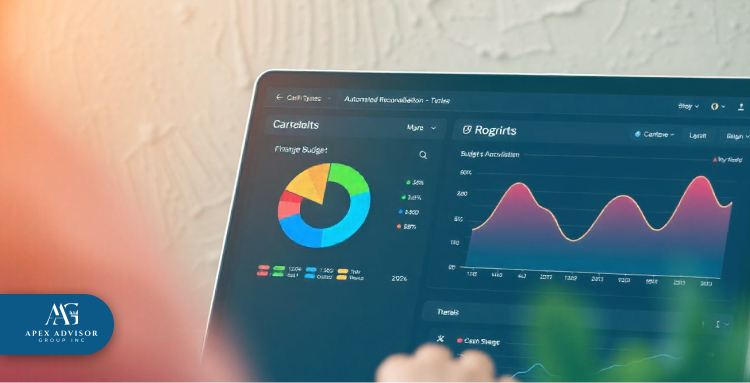
Implementing strong internal controls isn’t just about avoiding mistakes, it’s about building a resilient financial framework for long-term business success and compliance. Consider these aspects to create efficient, and secure internal control
Segregation of duties: By dividing responsibilities among different individuals, businesses can reduce the risk of errors and fraud. For instance, separating tasks such as authorizing payments, processing transactions, and reconciling accounts ensures that no single person has control over all aspects of a financial transaction, thereby creating a system of checks and balances.
Regular reconciliations and audits: Reconciliations involve comparing internal records with external statements (like bank statements) to ensure accuracy and consistency. Regular audits, whether internal or external, provide an additional layer of scrutiny, helping to identify discrepancies early and ensure compliance with accounting standards and tax regulations.
The role of technology: Modern financial management systems offer advanced features like automated reconciliations, real-time transaction tracking, and sophisticated reporting tools. These technological solutions enhance accuracy, reduce manual errors, and provide valuable insights that keep internal control stronger, and businesses stay on top of their financial operations.
5) Tax-Specific Considerations
Each of these considerations underscores the need for meticulous financial practices that not only enhance operational efficiency but also ensure your business stays on the right side of tax laws, avoiding unnecessary penalties.
Accurate Revenue Recognition for Tax Compliance
Complying with tax regulations in this area means recognizing revenue in the period it is earned, not necessarily when cash is received. This distinction ensures that your income is reported accurately for tax purposes, aligning with either the accrual or cash basis method, depending on business structure and jurisdictional requirements.
Managing Bad Debt Allowance
The bad debt allowance safeguards for receivables that might become uncollectible. For tax purposes, businesses can deduct bad debts only once they are deemed worthless and written off. Properly managing this allowance ensures that tax filings reflect a realistic view of accounts receivable, potentially reducing taxable income and lowering tax liability.
Tax Implications of Discounts and Debt Write-Offs
The tax implications of offering discounts and writing off debts are significant. Early payment discounts can encourage prompt payments but must be accurately reflected in revenue reporting. Similarly, written-off debts can often be claimed as deductions, but strict adherence to tax regulations is essential to ensure compliance.
Avoid Tax Penalties with Apex Advisor Group Inc
Efficient accounts receivable management is not just about keeping your books in order; it’s a strategic approach that safeguards your business from potential tax penalties. At Apex Advisor Group Inc., we provide comprehensive accounting and tax preparation services, including accurate revenue recognition and timely debt collection strategies.
Our approach ensures that your financial records are always up-to-date, reducing the risks that could trigger tax issues. We also offer credit repair and financial counseling, so that your businesses improve their cash flow and financial standing.
We use proven techniques and technology to manage AR processes, ensuring that every dollar is accounted for correctly. Contact us today to schedule your free consultation and discover how we can help you avoid tax penalties with efficient accounts receivable management.

February 5, 2025
The Role of Business Consulting in Tax Preparation
For the business owner, taxes are not just numbers on a spreadsheet. They’re a test, a reminder of obligations owed not only to their growth but to the broader community. Each deduction, every deadline—these are fragments of a larger, more intricate puzzle. And, as they face this maze, one can’t help but sense the tension between survival and responsibility, ambition and duty.
It’s here that business consultants find their purpose—not merely as number crunchers, but as navigators in this existential landscape. They guide businesses to more than compliance; they help them find clarity amidst the carnage. But how does one balance the books while keeping the soul intact? Let’s find out…
1) The Role of Business Consultants in Tax Strategy Development
Business consultants are well aware of tax legislation and incentive programs. Therefore, they help businesses elevate their financial advantages, leading to enhanced profitability and reinvestment opportunities. Here are the core aspects they follow :
Customized Tax Planning and Strategies
Every business in Tampa operates with its own unique set of circumstances—whether it’s a family-owned cafe in Hyde Park or a tech startup in the Channelside District. Business consultants specialize in understanding these individual dynamics to develop tax strategies that align with each company’s specific needs and goals. By assessing factors such as the business structure, revenue streams, and long-term objectives, consultants can craft personalized tax plans that minimize liabilities while staying compliant with federal, state, and local regulations.
For instance, a consultant might recommend a small business structured as a sole proprietorship consider transitioning to an S corporation to benefit from potential tax savings on self-employment taxes. By tailoring strategies to the unique needs of Tampa businesses, consultants ensure that each company is not only tax-efficient but also positioned for sustainable growth.
Maximizing Local Tax Incentives: State and Local Benefits
Tampa businesses have access to various state and local tax incentives designed to promote economic development and growth. Business consultants are well-versed in these programs and can help identify which credits and deductions a business qualifies for, ensuring that no opportunity is left untapped.
For example, Florida offers sales tax exemptions on manufacturing equipment and certain research and development activities, which can significantly reduce operating costs for eligible businesses. Additionally, Tampa-based companies that engage in job creation or capital investment may benefit from programs like the Qualified Target Industry Tax Refund (QTI), which rewards businesses for contributing to the local economy.
2) Ensuring Compliance with State and Local Tax Laws

Business consultants keep businesses up-to-date on changes, ensure accurate tax filings, and implement strategies to prevent common compliance errors, without the looming worry of tax penalties.
Staying Updated with Florida Tax Law Changes and Local Regulations
Florida's tax laws frequently evolve, impacting businesses across Tampa. Recent changes, like updates to sales tax regulations on remote sales, can catch businesses off guard. Business consultants track these shifts, ensuring companies stay ahead of the curve and avoid unexpected liabilities.
Accurate Filing to Meet Legal Requirements
Accurate tax filing is crucial to avoid audits and penalties. Business consultants ensure every detail is documented correctly, from income classifications to deductions. Their expertise in tax laws and regulations helps businesses file accurately and optimize their tax outcomes.
Avoiding Penalties with Strategic Compliance
Tax penalties from missed deadlines or errors can severely strain a business's finances. In Florida, penalties for tax non-compliance can vary depending on the specific tax type. For example, In the case of Sales Tax, Late filing penalties can include a 10% penalty of the tax owed (with a minimum of $50). Late payment penalties may also apply. These fines can quickly add up, especially for small businesses operating on tight margins. Florida tax laws and penalties are complex, you can explore the Florida Department of Revenue (DOR) to stay updated.
Business consultants help avoid these costly penalties by implementing strict tax schedules and conducting thorough compliance reviews. They ensure that all deadlines are met and potential issues, such as misclassified employees or overlooked income, are identified and addressed. early. Whether it's misclassified employees or overlooked income, their proactive approach prevents hefty fines.
3) Risk Management and Audit Preparedness
Effective risk management is crucial to avoid the costly consequences of tax audits. Business consultants assess potential vulnerabilities, provide strategic audit support, and navigate the audit process smoothly.
Identifying Potential Risks
Businesses in Tampa face various tax risks that could trigger audits, such as inconsistent income reporting, misclassified expenses, or non-compliance with local tax regulations. Business consultants conduct thorough assessments to pinpoint these vulnerabilities, focusing on areas that are prone to scrutiny by tax authorities. This proactive risk identification helps businesses address issues before they escalate into audits.
Audit Support
When an audit does occur, having a business consultant on board can make a significant difference. Consultants act as a buffer between the business and the tax authorities, ensuring all necessary documentation is in place and accurately presented. They guide businesses through each step of the audit, from responding to inquiries to negotiating settlements and minimizing disruptions and potential financial repercussions.
4) Financial Planning and Forecasting for Businesses

These strategies not only optimize the business’s tax position but also support the local economy. Here’s the critical aspect that you might miss, but a business consultant doesn’t.
Cash Flow Management
Maintaining healthy cash flow is critical for meeting tax obligations and avoiding penalties. Business consultants help businesses track income and expenses, ensuring sufficient liquidity to cover tax payments without straining operations. Effective cash flow management also allows businesses to plan for tax-related expenses, such as quarterly estimated taxes, and avoid unexpected shortfalls.
Strategic Investments
Investing wisely can reduce tax liabilities and boost growth. Consultants identify tax-efficient investment opportunities, such as local economic development projects or enterprise zones, which may offer tax credits or deductions.
These strategies not only optimize the business’s tax position but also support the local economy.
Growth Planning
Business expansion requires aligning tax strategies with growth objectives. Consultants forecast the tax impacts of scaling operations, whether through opening new locations or increasing workforce size. By planning ahead, businesses can leverage tax incentives and structure growth in a way that minimizes tax burdens while maximizing profitability.
Apex Advisor Inc: A Step Toward Smarter Tax Solutions
We know that each business is unique, with its own set of challenges and opportunities. At Apex Advisor Inc., we offer personalized services tailored to your specific needs. Whether you're a small startup looking to establish sound financial practices or a well-established company aiming to optimize your tax strategies, we have the expertise to help you achieve your goals.
Our services range from developing comprehensive tax strategies that align with your business objectives to ensuring compliance with the latest tax laws. If you're facing an audit, our team will stand by you, providing robust support and expert guidance to minimize stress and potential liabilities beyond just numbers and filings. We’re here to empower you with the knowledge and tools to make informed financial decisions, turning your tax challenges into opportunities for growth and stability. Reach out to us today or visit our office to schedule a consultation, ensuring you’re well-prepared for whatever the future holds.

January 26, 2025
Understanding Financial Due Diligence in Mergers and Acquisitions For Tax Efficiency
Mergers and Acquisitions (M&A) are like a game of chess. Each move must be calculated. One wrong step can cost a fortune, while the right strategy leads to victory. In this high-stakes game, financial due diligence for tax efficiency is the kingpin. It protects your position and strengthens your case for a winning deal.
Tax issues can make or break an M&A transaction. Around 70% - 90% of mergers and acquisitions (M&A) fail to achieve their expected financial benefits due to inadequate due diligence. Proper due diligence uncovers risks, ensures compliance, and finds ways to reduce tax burdens. Let’s give you a clear and complete insight into financial due diligence in M&A.
What Is Financial Due Diligence?
Financial due diligence is a detailed review of financial records to confirm facts and assess risks before a transaction. It helps parties make informed decisions and avoid potential issues.
This process is common in business acquisitions, investments, and other financial dealings. It involves examining financial statements, balance sheets, cash flows, assets, liabilities, and projections. Comparing these figures over time and against competitors ensures accuracy and transparency. The term became widely used after the Securities Act of 1933, which required brokers and dealers to disclose all material information about securities. If they performed due diligence and disclosed their findings, they were protected from liability for unknown facts.
Today, financial due diligence is crucial for investors, brokers, and businesses to identify risks, evaluate opportunities, and ensure compliance with legal obligations.
Financial Due Diligence vs. Audits: What’s the Difference?
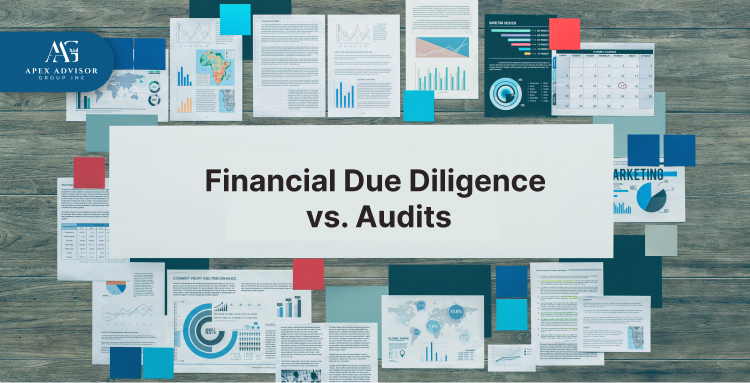
While audits and financial due diligence both involve reviewing a company’s financials, their purpose and scope are distinct. Here’s how:
An audit ensures that a company’s financial statements present a fair and accurate picture of its performance. It’s like getting a roadworthiness certificate for a car. It confirms the basics but doesn’t cover deeper concerns.
In contrast, financial due diligence digs deeper. It evaluates sustainability, future earnings potential, and risks. Like hiring your own trusted mechanic to inspect a used car, financial due diligence ensures there are no hidden issues that could derail the deal.
However, there are more benefits of financial due diligence-
Quality of Earnings: Financial due diligence adjusts historical earnings to reflect sustainable performance. It identifies unusual or one-time expenses and ensures accounting practices align with industry standards. For example, if a company reports a one-time gain from selling assets, this would be excluded to calculate realistic earnings.
Trend Analysis: Due diligence reviews sales trends, customer retention, and market drivers. This provides insights into whether past performance is likely to continue. For instance, an M&A analyst might assess customer churn rates to determine the company’s long-term revenue potential.
Working Capital Evaluation: Unlike audits, which only confirm past balances, due diligence analyzes working capital trends to negotiate fair transaction terms. Buyers may look at seasonal fluctuations or industry benchmarks to avoid overpaying for insufficient working capital.
Forecast Evaluation: Investors are more interested in future potential than historical performance. Financial due diligence reviews the assumptions behind management’s forecasts to ensure they’re realistic. For example, it might question revenue projections if they rely on overly optimistic growth rates. (Also read: Wealth growth with tax-efficient financial planning)
Qualitative Observations: Beyond numbers, financial due diligence evaluates management capabilities, internal controls, and accounting systems. These qualitative factors often influence post-transaction success. In particular, weak internal controls could signal potential risks for fraud or mismanagement.
Why Audits Alone Aren’t Enough
Audits provide a foundation, but they lack the depth and flexibility of financial due diligence.
An audit confirms a company’s total liabilities, but due diligence assesses whether those liabilities are manageable based on cash flow trends. While audits focus on compliance, due diligence evaluates customer relationships, cost structures, and vendor agreements to find operational synergies.
The Role of Financial Due Diligence in Mergers and Acquisitions

Financial due diligence plays a key role in mergers and acquisitions (M&A). It helps the acquiring company evaluate the target’s financial health, identify risks, and structure the deal effectively. Both buyers and sellers rely on due diligence to ensure a smooth transaction and avoid costly mistakes.
Hard Due Diligence: Numbers and Legal Compliance
Hard due diligence focuses on the financial and operational aspects of the target company. It involves reviewing earnings, cash flow, assets, liabilities, and projections. For example:
Financial Statements: Review audited reports to confirm the company’s profitability and stability.
Litigation Risks: Identifying ongoing or potential lawsuits that could affect future operations.
Operational Efficiencies: Analyzing redundancies to reduce costs after the merger.
In industries like technology or manufacturing, hard due diligence also includes assessing intellectual property and physical assets. This legal and financial scrutiny ensures the buyer knows exactly what they are acquiring.
Soft Due Diligence: People and Culture
Soft due diligence examines the human elements of a business. It looks at whether the target company’s culture, management style, and workforce align with the buyer’s. For instance:
Workforce Integration: Evaluating how well employees from both companies might work together post-merger.
Customer Relations: Reviewing client feedback to predict how customers will respond to changes in service or products.
Incentive Programs: Analyzing compensation packages to maintain employee motivation during the transition.
This step is essential to avoid disruptions caused by cultural clashes or employee dissatisfaction.
Buy-Side and Sell-Side Due Diligence
Both parties in an M&A deal benefit from conducting due diligence:
Buy-Side Due Diligence: The buyer assesses the target’s financial records, forecasts, and market data. This ensures the deal aligns with their goals and reduces the risk of making a poor investment.
For example, a buyer might use a secure data room to review sensitive documents like financial reports and supplier agreements before finalizing the deal.
Sell-Side Due Diligence: The seller examines their own financials and operations before negotiations. This helps address potential issues in advance, reducing delays and improving the transaction’s outcome.
For instance, a seller might identify outdated financial records or unresolved legal disputes and resolve them before presenting to a buyer. Financial due diligence is the backbone of any successful M&A deal. Hard due diligence ensures the numbers and legal compliance check out, while soft due diligence addresses the people and cultural aspects. Both buyers and sellers must approach this process with care to avoid surprises and achieve a seamless transaction.
How Does Financial Due Diligence In M&A Enhance Tax Efficiency?
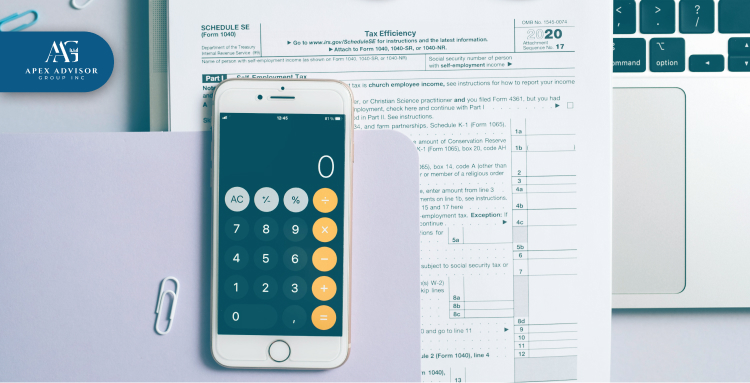
Financial due diligence in mergers and acquisitions (M&A) helps companies uncover tax risks and optimize opportunities. It ensures smoother transactions while minimizing future liabilities. Here's how:
Identifying Tax Liabilities and Opportunities
During due diligence, the acquiring company reviews the target's tax records. This helps identify any existing tax liabilities and potential tax-saving opportunities. For example, the buyer might find unused tax losses that can be utilized to offset future taxable income.
Structuring the Deal for Tax Benefits
Due diligence helps in structuring the acquisition to maximize tax benefits. This might involve choosing the right type of transaction, such as an asset purchase versus a stock purchase, to take advantage of favorable tax treatments. For instance, an asset purchase might allow the buyer to step up the basis of the acquired assets, leading to higher depreciation deductions.
Ensuring Compliance and Avoiding Penalties
A thorough review of the target's tax compliance history ensures that the acquiring company is aware of any potential tax risks. This helps avoid future penalties and interest charges. For example, if the target has unresolved tax disputes, the buyer can negotiate indemnities to protect against these liabilities. (Also read: 7 biggest tax mistakes business owners make)
Integrating Tax Strategies
Post-acquisition, integrating the target company into the buyer's existing tax structure can lead to significant tax savings. This might include consolidating tax filings or optimizing the use of tax credits and deductions across the combined entity.
Stay Tuned With Apex Advisor
We are committed to guiding you through complex financial and legal challenges with clarity and precision. Whether you're navigating mergers and acquisitions or optimizing your tax strategies, our expertise ensures informed decision-making every step of the way. Stay connected with us for actionable insights, professional advice, and solutions tailored to your needs. Together, we’ll turn challenges into opportunities. Stay tuned for more updates, and let Apex Advisor be your trusted partner in success.

January 21, 2025
How to Prepare Your Books for a Tax Audit
Facing a tax audit can feel like stepping into the unknown. Questions race through your mind: Are my records accurate? Did I miss anything important? The truth is, audits don’t have to be stressful if you are prepared. With the right steps, you can approach the process confidently and show the auditor that your books are in order.
Think of it as taking control of your financial story. Every receipt, invoice, and report has a purpose, and when they are organized, they tell a clear, honest tale of your business. Preparing your books isn’t just about compliance, it’s about proving the effort you have put into keeping things right. Let’s talk about how to get everything in top shape before the audit begins.
I) Who Needs to Prepare for a Tax Audit?
A tax audit can affect various taxpayers differently, depending on their financial situation. Understanding who is most likely to face an audit helps ensure you're prepared with the right documentation.
Small Business Owners
Proper bookkeeping is essential for small business owners. Auditors will examine your income, expenses, and deductions. Without clear, organized records, it’s easy for discrepancies to arise, leading to more questions and delays.
Freelancers or Contractors
Freelancers and contractors often face challenges with tracking income and expenses. Inconsistent records, missing receipts, or personal expenses mixed with business ones can raise red flags. Keeping accurate, up-to-date documentation will help avoid complications.
Corporations or Limited Liability Companies ( LLCs)
Corporations and LLCs deal with more complex audits. Detailed financial records are necessary to demonstrate compliance with tax laws and ensure you can justify every deduction. Inaccurate records can lead to costly penalties and further investigation.
Individuals with Unusual Tax Situations
Be extra diligent if large deductions, investments, or past errors have flagged you with the IRS. Auditors will scrutinize these areas closely. Maintaining organized records will help you explain any unusual items quickly and accurately.
II) Challenges You May Face During a Tax Audit

Facing a tax audit means being prepared for potential hurdles. Knowing these challenges in advance helps you address them with confidence.
Missing or Incomplete Financial Records
Auditors need complete, organized records to verify your tax filings. Missing documents or incomplete records will only complicate the process and delay the audit.
Discrepancies Between Tax Returns and Bank Statements
Any inconsistency between what’s reported on your tax return and your bank statements will raise questions. It is important to reconcile both before facing an audit.
Misclassified Expenses or Income
Improperly categorizing business expenses or income can lead to red flags. Auditors will closely review these entries, and errors could result in penalties or adjustments.
Lack of Understanding of the Tax Code or Audit Process
The complexity of the tax code and audit process is so stressful and challenging. Without a clear understanding, you risk making mistakes or missing key opportunities to defend your filings.
III) Steps to Prepare Your Books for a Tax Audit
Preparing your books thoroughly can make a tax audit far less stressful. Follow these steps to stay organized and in control.
Step 1: Organize Your Financial Records
Keep all receipts, invoices, and bank statements in one place. Ensure every document is accurate and matches your financial records. Separate personal expenses from business transactions to avoid confusion.
Step 2: Review Your Tax Return
Go through your tax return carefully. Check for errors or unusual entries that could raise questions. Make sure your reported income, deductions, and credits match the supporting documents.
Step 3: Gather Supporting Documentation
Collect all relevant income records, such as sales invoices and contracts. Compile receipts for deductible expenses and bills for business-related costs. Include payroll records and employee-related documentation, if applicable.
Step 4: Reconcile Bank Statements
Match your bank statements with your accounting records. Resolve any discrepancies and prepare clear explanations for any unusual transactions.
Step 5: Seek Professional Help
Consult a CPA or tax professional who knows audit procedures. They can guide you in addressing red flags and provide valuable insights during the process.Use the IRS’s Interactive Tax Assistant to get personalized answers to common tax questions related to audits and recordkeeping.
Step 6: Prepare for Questions
Be ready to explain significant deductions, unusual entries, or changes from prior years. Practice giving clear, professional responses to potential auditor inquiries.
IV) Pro Tips to Secure Your Financial Future

Staying proactive in your financial management can prevent future audit challenges. Implementing these strategies today ensures a smoother, stress-free process down the road.
Maintain Organized Financial Records Throughout the Year
Consistent record-keeping is your best defense against future audit headaches. Keep receipts, invoices, and statements organized and updated monthly. Regular maintenance reduces the risk of missing or inaccurate documents.
Invest in Reliable Accounting Software
Using accounting software simplifies tracking income and expenses. These tools can automate calculations, categorize transactions, and generate reports, minimizing errors and saving time. Choose software that fits your business needs and integrates with your tax filing process.
Conduct Regular Internal Audits to Catch Errors Early
Review your financial records periodically to identify mistakes before they escalate. Spotting and fixing discrepancies early ensures your books stay accurate and audit-ready. Regular internal checks also build confidence in your financial practices.
IV) Frequently Asked Questions
What Triggers a Tax Audit?
A tax audit can be triggered by several factors, including discrepancies between your tax return and other financial records, large deductions that seem out of the ordinary, or random selection. The IRS also audits returns that show significant changes from previous years or high-income levels.
How Long Does a Tax Audit Take?
The duration of a tax audit varies depending on its complexity. A simple audit may take a few months, while more detailed audits can last a year or longer. Timely response and thorough documentation can speed up the process.
What Happens if I Can’t Provide the Requested Documents?
If you fail to provide the requested documents, the IRS may disallow deductions or expenses, leading to additional taxes, penalties, and interest. In some cases, the audit could be closed without resolution, potentially resulting in further scrutiny.
Can I Dispute an Auditor’s Findings?
Yes, you can dispute an auditor’s findings. If you disagree with the conclusions, you can appeal the decision to the IRS or take the matter to court if necessary. It’s important to have strong documentation and legal advice when pursuing a dispute.
How Apex Advisor Group Inc. Can Help Prepare Your Books for a Tax Audit

A tax audit doesn’t have to be a battle when you have the right team on your side. Apex Advisor Group will equip you with the tools and expertise to conquer the audit process confidently.
Expert Assistance for Accurate Record-Keeping
Accurate record-keeping is the foundation of audit preparation. Apex Advisor Group helps you organize your financial documents, ensuring every detail is properly recorded. From income statements to receipts, we provide clear guidance to make your records reliable and compliant with tax laws.
Customized Tax Audit Preparation
Every audit situation is unique, and a one-size-fits-all approach doesn’t work. Apex Advisor Group evaluates your specific financial circumstances and customizes strategies to make your books audit-ready. This personalized approach reduces risks and addresses areas of concern effectively.
Thorough Review of Tax Returns
Errors or discrepancies in your tax returns can raise red flags during an audit. Our experts carefully review your past filings to identify potential issues. This proactive step ensures your tax returns are accurate and minimizes the chances of penalties or further scrutiny.
Comprehensive Documentation Support
Gathering the right documentation is critical for audit success. Apex Advisor Group assists you in collecting essential documents like income reports, expense logs, and payroll records. This ensures you are fully prepared to substantiate your tax filings.
Professional Audit Representation
Facing auditors can be stressful, but you don’t have to do it alone. Apex Advisor Group offers professional representation, handling all communications with auditors on your behalf. This ensures that your interests are protected and the process remains as smooth as possible.
Ongoing Tax Support and Advice
Preparation doesn’t end after the audit. Apex Advisor Group provides ongoing support to help you improve your financial processes and avoid future audit risks. Our team offers advice to ensure long-term compliance and stability for your financial records.
Trust Apex Advisor Group to lead you through the audit process with unmatched expertise and unwavering support. Reach out today at Apex Advisor Group and take control of your financial future.

January 14, 2025
How to Develop a Tax Efficient Business Succession Plan
A tax-efficient business succession plan is more than just a strategy; it’s about securing the future of what you’ve worked so hard to build. How your business is passed on can directly affect your family’s financial future and your legacy. But many business owners don’t realize the complexities involved in making sure it all works seamlessly.
With the right plan, you can minimize taxes, protect assets, and ensure the business continues to thrive long after you step away. The challenge isn’t just about creating a plan; it’s about crafting one that works for your specific needs. Are you ready to explore how to make it happen?
Step 1: Understand Your Succession Goals and Options
When planning for the future of your business, the first step is to clearly define your goals. What do you want your succession plan to achieve? Are you focused on preserving wealth for your family, ensuring a legacy for the next generation, or creating a clear exit strategy for yourself? The direction you choose will heavily influence the structure of your plan and the tax implications involved.
Define Your Succession Goals
Start by asking yourself key questions:
Wealth preservation: Do you want to maintain control of the business within your family? If so, you may want a strategy that minimizes taxes while transferring ownership to your heirs.
Family legacy: Are you aiming to keep the business within the family for generations to come? This will influence your choice of successors and the method of transferring the business.
Exit strategy: Perhaps you're looking to retire and sell the business to fund your lifestyle or to pass the torch to others. If so, an external sale or employee buyout might be the right fit for you.
Once you have a clear idea of your goals, you can better determine which succession option best aligns with your vision and financial needs.
Explore the Types of Succession Plans

There are several options available, each with its own set of benefits and challenges. Let’s take a closer look at the most common types of business succession plans:
Family transfers:
If you plan to pass the business down to your children or other relatives, this is typically the most personal route. Family transfers can help preserve the family legacy and maintain continuity. However, it’s essential to consider whether the next generation has the skills and interest to successfully run the business. Trusts and gifting strategies can reduce estate taxes, preserving the business's full value for the family without heavy tax burdens.Employee buyouts:
Selling a business to key employees rewards loyalty and helps maintain the company's culture. An employee buyout allows you to transition ownership gradually, often providing the business with the stability it needs. This option may require employees to secure financing, posing risks based on the business’s cash flow and financial stability.Third-party sale:
A third-party sale is an attractive option if you’re looking to exit the business entirely. Selling to an external buyer provides a lump sum of cash that you can use for retirement or other personal investments. The downside? Selling the company may result in loss of control and significant tax implications, including capital gains taxes. If maximizing the sale price is a priority, a third-party sale may be the right choice.
How to Align Your Goals with Your Chosen Strategy
Once you’ve decided on your primary goals, aligning them with your chosen succession plan is important. For instance:
Consider a family transfer strategy with trusts or gifting exemptions to preserve wealth and reduce tax liabilities.
Select the employee buyout option to achieve a smooth transition and fair price for both employees and the business.
If your primary goal is to receive maximum financial return, plan strategically for tax impact with a third-party.
Step 2: Explore Tax-Saving Strategies

To develop a tax-efficient business succession plan, consider strategies that reduce tax liabilities for you and your heirs. The right approach can minimize estate taxes, preserve wealth, and ensure more of your business’s value is passed on. Here are some effective tax-saving strategies:
Gifting and Trusts: Minimizing Estate Taxes
Gifting business ownership during your lifetime is a simple way to reduce estate taxes. The IRS allows annual gifts up to $17,000 per person without incurring gift taxes. Additionally, transferring business interests into a family trust can shield assets from estate taxes. This allows you retain some control while reducing the taxable estate, enabling your heirs to inherit more of the business’s value.
Installment Sales: Spreading Out Capital Gains Taxes
If selling the business, consider an installment sale. Instead of a lump sum, you receive payments over time, which can spread out capital gains taxes. This keeps you in a lower tax bracket and allows heirs or employees to gradually take ownership for a smoother transition.
Grantor Retained Annuity Trusts (GRATs): Transferring Wealth Tax-Efficiently
A Grantor Retained Annuity Trust (GRAT) helps transfer assets like business shares while minimizing taxes. You retain annuity payments for a set period, with the remaining value passing to your heirs. Annuity payments lower the gift's value, enabling greater wealth transfer with minimal gift taxes, particularly if the business appreciates.
Charitable Giving: Using Charitable Remainder Trusts (CRTs)
Incorporating charitable giving can provide tax benefits and support causes important to you. A Charitable Remainder Trust (CRT) lets you donate business assets to charity while retaining income from those assets during your lifetime. You receive a charitable deduction and reduce your estate taxes, as the donated assets are removed from your estate. After your passing, the remaining assets benefit the charity, leaving a lasting legacy.
Step 3: Prepare for Liquidity Needs and Tax Liabilities

When planning for a business succession, ensuring liquidity is essential. Liquidity is the ability to quickly access cash or assets to cover immediate needs without selling the business. Without liquidity, your heirs may need to sell parts of the business, potentially disrupting operations or diminishing the business’s value.
Why Liquidity is Important
When the business owner passes away, the estate must pay taxes and other liabilities, often within a short time frame. Without liquidity, the estate may face pressure to sell assets or even the business itself to cover these costs. Planning ahead allows for a smooth transfer of the business without forcing the sale of valuable assets. By preparing for liquidity needs in advance, you can protect both the business and your family’s financial interests.
Role of Life Insurance and Financial Instruments
Life insurance is one of the most effective ways to ensure liquidity. A life insurance policy can cover estate taxes, debt, or other expenses when the business owner passes away. Naming the business or heirs as beneficiaries ensures immediate access to funds, avoiding asset liquidation. In addition to life insurance, maintaining business cash reserves can help bridge the gap between liabilities and assets. A well-managed reserve ensures smooth business operations during transitions without selling property or shares.
Other financial instruments, such as loans or lines of credit, can also provide liquidity during the succession process. You can use these tools strategically to keep cash flow stable, especially if the business is facing seasonal or other cash flow fluctuations.
Planning for Unexpected Events
It’s also essential to prepare for unforeseen events that may arise during the transition period. A liquidity plan ensures your business can stay operational and meet obligations during economic downturns or unexpected expenses. A flexible financial plan ensures swift adaptation to changes, keeping the succession process on track and the business viable.
Step 4: Work with Professionals to Optimize Your Plan

Creating a tax-efficient business succession plan requires expert guidance to ensure it aligns with your financial goals and minimizes taxes. Consulting with professionals like tax advisors, estate planners, and legal experts is key to crafting a well-rounded, effective plan.
Why Consulting with Professionals is Essential
Tax advisors, estate planners, and attorneys bring valuable expertise that helps customize a succession plan to your specific needs. Tax advisors can identify strategies to reduce estate and capital gains taxes, while estate planners ensure that your assets are transferred efficiently. Legal experts help structure the plan to comply with laws and regulations, preventing costly mistakes.
How Professionals Maximize Your Financial Goals
These professionals work together to optimize your succession plan. They consider your financial goals—whether it's wealth preservation, minimizing tax liabilities, or securing your family's future—and design a plan that meets those objectives. Their combined expertise ensures your plan is comprehensive and effective in achieving long-term success.
Ensuring Flexibility and Adaptability
Business and tax laws can change, so it’s essential that your succession plan remains flexible. Working with professionals ensures your plan can adapt to evolving regulations and market conditions, keeping it relevant and effective as time goes on.
Take the Next Step: Schedule Your Consultation with Apex Advisor Group Inc.
Planning for the future of your business is a crucial step in ensuring its continued success and securing your legacy. At Apex Advisor Group Inc., we specialize in helping business owners like you create tax-efficient succession plans tailored to your unique needs.
To get started, schedule a consultation with one of our experts today. We’ll walk you through the process, address your questions, and create a plan to protect your business and family. Contact us for personalized guidance and start building a plan that aligns with your goals.

January 5, 2025
Tax Strategies for Uncollectible Accounts Receivable
Money owed but not paid is a simple thing. It sits there, unpaid, and stares back at you. You can send letters, make calls, even knock on doors, but sometimes it doesn’t change. The debt stays. And then you have to decide what to do about it.
You could write it off, let it go, but that’s not the whole story. There are ways to turn that loss into something useful, ways to make it count. It’s not glamorous. It’s not exciting. But it’s practical, and in the end, it helps. So, let’s talk about it. Let’s figure out how to make sense of what’s owed but never comes back.
1) What Exactly Are Uncollectible Accounts Receivable?
Accounts receivable become uncollectible when a debtor, for one reason or another, fails to fulfill their financial obligation. It’s a circumstance no business welcomes, yet one that inevitably arises in the course of commerce.
The reasons behind such uncollectible accounts often trace back to financial hardships on the part of the debtor, the unfortunate declaration of bankruptcy, or unresolved disputes surrounding the invoice itself.
Such accounts, often deemed bad debts, have the potential to disrupt your cash flow and complicate your tax obligations if left unaddressed.
2) Powerful Tax Strategies for Managing Uncollectible Accounts Receivable

When dealing with uncollectible accounts receivable, businesses must follow specific tax strategies to minimize financial losses and stay compliant with IRS regulations.
Write Off Bad Debts
If you use the accrual method, you can deduct bad debts that you’ve proven are worthless. To do this, you need to show your work—document every call, letter, and attempt to collect. Prove the debt is gone for good. When you’re ready, check IRS Publication 535. It’s all there, plain and simple, telling you how to claim what’s yours when the money doesn’t come back.
Apply the Specific Charge-Off Method
You can only deduct a debt after you’ve confirmed it’s truly worthless. Keep detailed records of everything you’ve done to try to collect—like invoices, demand letters, and payment histories. Having this documentation will keep you covered if the IRS decides to audit you.
Use IRS Guidelines to Prove Worthlessness
To prove a debt is worthless, you’ll usually need evidence like the debtor declaring bankruptcy or showing they can’t pay. Make sure to check out IRS Publication 550 to be sure your deductions follow the rules. Don’t claim a deduction unless you’ve got solid proof—it could get denied if the IRS audits you.
4) Special Rules for Accrual and Cash Basis Taxpayers
Both accrual and cash-based taxpayers face unique rules that can impact when and how they address these debts.
Accrual-Based Taxpayers
If your business uses the accrual method, you report income when it’s earned, not when it’s received. The same goes for bad debts—you can deduct them as soon as they’re written off. Once you know a debt isn’t going to be paid, you can claim it as a deduction right away. This lowers your taxable income for the year, helping you manage your cash flow and reduce your tax bill at the same time.
The timing of the deduction is very important. So, the business must ensure proper documentation that the debt is truly uncollectible before making the write-off.
Cash Basis Taxpayers
If you’re a cash basis taxpayer, you only report income when you actually get paid, not when you earn it. That sounds straightforward, but here’s the catch—you can’t write off bad debts. If someone doesn’t pay you, it’s like the income never existed in the first place.This means it’s very important to prevent bad debts altogether. How? By being proactive.
Check out your customers before giving them credit, set clear payment rules, and keep things tight when it comes to who owes you money. Staying proactive prevents financial headaches and protects cash flow, as unpaid invoices hurt more when you can't deduct them.
5) When to Use Debt Collection Agencies

Sometimes, no matter how much effort you put into chasing down unpaid debts, it just doesn’t work. When that happens, it might be time to let a debt collection agency handle it.
The Upside of Hiring a Pro for Debt Recovery
Debt collection agencies know the ins and outs of recovering unpaid bills. By hiring them, you can focus on running your business while the experts handle chasing down payments. Plus, most agencies only charge you if they actually recover the debt—so there’s little to no financial risk. With their tools, resources, and experience, they’re often able to recover more money than you could on your own, especially in tricky situations.
How Recovered Debt Affects Your Taxes
If you’ve written off a debt as uncollectible but later recover it, the IRS considers that money as taxable income. You’ll need to report it for the year you get it back, which can impact your tax filings. To stay on the IRS’s good side, make sure you use Form 1099-C for any canceled or forgiven debts—even if they’re eventually paid. Proper reporting helps you avoid penalties and keeps everything above board with the IRS.
6) Staying IRS Compliant: Tips for Businesses
By following some straightforward steps and getting the right advice, you can avoid penalties and audits while keeping your business running smoothly.
Understand Federal Rules on Bad Debt Deductions
The IRS has specific rules about claiming bad debt deductions, and it's important to know them. A good place to start is IRS Publication 535, which explains how to handle bad debts the right way. If you don’t follow the rules, you could face penalties or lose out on deductions that could save your business money. Take the time to learn the basics so you can deduct bad debts properly and avoid trouble with the IRS.
Keep Accurate Financial Records
Keeping accurate financial records isn’t just good business—it’s your best defense during an audit. Track unpaid invoices, collection efforts, and anything else tied to your bad debts. Using accounting software can make this easier by organizing all your transactions, payments, and collections in one place. Plus, having everything well-documented makes your life a lot easier if the IRS comes knocking.
Consult a Tax Professional

Taxes can get messy, especially when bad debts are involved. A tax professional can help you figure out how to handle things correctly and take advantage of any deductions you’re entitled to. They’ll also make sure your documentation is airtight and offer strategies to minimize the tax impact on your business. When in doubt, having an expert on your side is always a smart move.
How Apex Advisor Group Can Support You with Uncollectible Accounts Receivable
Handling uncollectible accounts receivable requires careful planning and attention, and we’re here to guide you through it. We understand the challenges businesses face with bad debts. Our team of tax experts will work with you to develop strategies that maximize deductions while ensuring compliance with IRS regulations.
From assisting with deduction claims to offering personalized financial guidance, we’re dedicated to helping you make the most of your opportunities. Reach out to us today to protect your business and reduce tax burdens. Contact us here.

December 28, 2024
How Business Consulting Can Help You Maximize Tax Deductions
Every dollar counts. Watching a large portion of your hard-earned revenue go toward taxes can be frustrating, especially when you’re striving to expand your small business. It’s normal to feel entangled in the complexities of running a business while dealing with the stress of a hefty tax bill. How about keeping more of your earnings in your business? A business consultant can assist you uncover and leverage a myriad of any type of business tax deductions. These deductions aim to alleviate your financial burden and retain a larger portion of your funds, thereby fostering the growth of your business.
So, how business consulting can make the most of your business's potential while keeping your tax bills in check? Continue reading to save thousands on your taxes.
5 Ways a Business Consultant Can Help Tax Reduction For your Business
Running a business is no small feat. Navigating the complexities of tax laws can add another layer of stress. Yet, effective tax management can be the key to unlocking more financial resources for your business's growth. Reducing your tax burden while staying fully compliant can be possible with expert guidance and strategic support. Here are 5 ways a business consultant can make a significant difference in minimizing taxes for your business.
Identifying Deductible Expenses
A business consultant can help you identify all possible deductible expenses, ensuring you don't miss out on any opportunities to reduce your taxable income. Common deductible expenses include:
Office Supplies: Items like paper, pens, printer ink, and software subscriptions.
Professional Services: Fees for accountants, consultants, and legal advisors.
Insurance Premiums: There are several types of business insurance premiums that can be deducted. These include.
Commercial Property Insurance: Protects your business property from losses due to fire, theft, or other covered events.
General Liability Insurance: Covers claims of bodily injury or property damage that occur during normal business operations.
Professional Liability Insurance: Also known as errors and omissions insurance, this covers claims of negligence or mistakes in professional services.
Workers' Compensation Insurance: Provides benefits to employees who suffer work-related injuries or illnesses.
Business Interruption Insurance: Replaces lost income if your business is unable to operate due to a covered event.
Travel Costs: Expenses for business-related trips, such as flights, hotel stays, and meals (typically 50% deductible).
Marketing Expenses: Advertising campaigns, promotional materials, and website design fees.
For example, if you spend $1,500 on marketing and $2,000 on travel costs, these expenses reduce your taxable income, lowering the tax you owe. The IRS calculates vehicle usage for business purposes using the standard mileage rate, which is 67 cents per mile for 2024 and 65.5 cents per mile for 2023. Conversely, actual expenses (gas, oil, tires, repairs, etc.) for the vehicle's commercial usage can provide significant deductions.
Strategic Tax Planning

Strategic tax planning involves developing a comprehensive plan to minimize your tax liabilities. Here are some key strategies:
Salary Optimization: Structuring salaries to take advantage of lower tax brackets and maximize deductions. For instance, paying yourself a reasonable salary and taking the rest as dividends can sometimes result in lower overall taxes.
Accelerated Depreciation: Using methods like Section 179 to write off the cost of assets more quickly. For tax years beginning in 2024, the maximum Section 179 expense deduction is $1,220,000, with a phase-out threshold of $3,050,000.
Retirement Contributions: Maximizing contributions to retirement plans such as a SEP IRA or Solo 401(k) can reduce taxable income while preparing for the future. For example, contributing $10,000 to a retirement plan can reduce your taxable income by the same amount.
Self-Employed Health Insurance: Deducting health insurance premiums if you're self-employed. This can include premiums for medical, dental, and long-term care insurance for yourself, your spouse, and your dependents.
Employing Family Members: Hiring family members can provide tax benefits, such as shifting income to lower tax brackets. For instance, taxing your child's income at a reasonable salary may result in a lower rate than your own.
More for you: How Financial Coaching Can Help You with Tax Preparation
Proper Record Keeping
Maintaining accurate and detailed records is crucial for maximizing tax deductions. A business consultant can assist in establishing effective record-keeping systems that guarantee the documentation and accessibility of all deductible expenses.
Receipts and Invoices: Keeping all receipts and invoices for business expenses.
Mileage Logs: Maintaining a log of business-related travel.
Accounting Software: Using software like QuickBooks to track income and expenses.
Did you know that even small mistakes on your tax return can lead to big problems? Errors in tax preparation can result in penalties, missed deductions, and even audits. To help you avoid these pitfalls, check out our article on: Common Tax Preparation Mistakes and How to Avoid.
Home Office Deductions

If you use part of your home for business, you may be eligible for home office deductions. This can include a portion of your rent or mortgage, utilities, and home maintenance costs. A consultant can help you calculate and claim these deductions accurately. For example:
Square Footage Method: If your home office is 200 square feet and your home is 2,000 square feet, you can deduct 10% of your home-related expenses.
Simplified Method: The IRS allows a simplified deduction of $5 per square foot of home office space, up to 300 square feet.
Education and Training
Investing in education and training for yourself and your employees can also be tax-deductible. This includes costs for courses, seminars, and certifications that improve skills relevant to your business. Proper documentation and understanding of what qualifies can help you take full advantage of these deductions. For example:
Professional Development: You can deduct a $500 seminar on new industry regulations as a business expense However, attending conferences for personal, business, or political reasons is considered nondeductible.
Certifications: Costs for obtaining certifications that enhance your business skills can also be deducted.
By leveraging the expertise of a business consultant, you can ensure you're taking full advantage of all available tax deductions, ultimately reducing your taxable income and saving money.
Why Every Business Needs a Tax Advisor?

Running a business comes with countless responsibilities. One of the most challenging aspects is adhering to ever-changing tax laws. A professional tax advisor not only just prepares your taxes, but also strategically aligns your financial decisions with your business goals. They ensure that you stay ahead of tax obligations while maximizing your savings. Here’s why you should consider consulting a tax advisor for your business:
1. Staying Updated with Tax Laws: Tax laws are constantly changing, and keeping up with these changes can be challenging. A tax advisor ensures that your business remains compliant with the latest regulations, helping you avoid penalties and take advantage of new opportunities for tax savings.
2. Making Informed Financial Decisions: Tax advisors provide expert guidance on various financial matters, including retirement planning, estate planning, and investments. By aligning your financial decisions with long-term goals, they help you build a solid financial foundation for your business.
3. Identifying Eligible Tax Credits and Deductions: One of the primary roles of a tax advisor is to identify all eligible tax credits and deductions that can reduce your taxable income. This includes deductions for business expenses, employee benefits, and more. By maximizing these deductions, a tax advisor can significantly lower your tax liability.
4. Professional Representation During IRS Audits: Facing an IRS audit can be stressful. During audits, a tax advisor offers professional support and representation, safeguarding your interests and ensuring a smooth process. This peace of mind is invaluable for any business owner.
5. Saving Time and Reducing Stress: Hiring a professional tax preparer saves you time and reduces the stress associated with tax filing. They ensure that your tax returns are accurate and complete, minimizing the risk of errors and maximizing your tax benefits. With their expertise in tax software, they can efficiently handle your taxes, allowing you to focus on running your business.
6. Comprehensive Planning and Advisory Services: Tax advisors offer a wide range of services beyond tax preparation. They assist with business formation, compliance, and long-term planning, ensuring your business's financial health. They also specialize in identifying tax credits and deductions, optimizing your tax situation.
7. Year-Round Support: Unlike seasonal tax preparers, tax advisors provide year-round support. They assist you in continuous tax planning and financial management, guaranteeing your readiness for tax season and potential financial obstacles.
The Bottom Line
Maximizing tax deductions is a crucial aspect of managing your business's finances effectively. Business consulting provides the insights and strategies needed to navigate the complexities of tax laws. However, a professional tax advisor can simplify these complexities, ensuring you stay compliant and optimize your tax situation. Contact Apex Advisor today to schedule a consultation and discover how our tax advisory services can help you save more while achieving your goals.

December 19, 2024
How Business Consulting Can Improve Your Tax Strategy
If you’re a business owner, I bet you know how overwhelming it can be to manage tax. Especially when you have substantial tax obligations with a lot of different rules and regulations. Additionally you’re focusing on growth and staying compliant at the same time. When you first start handling your own business taxes, you might feel you could manage it all. But when tax season comes, the real struggle starts – complex rules, missed opportunities, and worries about compliance.
Partnering with an experienced business consultant can make a real transform in your tax planning strategy. They not only help you streamline your tax planning but also show you new ways to save and keep everything in order. So, what’s the process of business consulting and how a simple consultation can improve your tax strategy? Let’s find out.
What Is Business Tax Strategy
Business tax strategy is an approach to managing a company's taxes in a way that reduces its tax obligations within the law. This strategy involves a continuous review of the company's financial status to find legal ways to minimize taxes.
Business tax strategy includes income distribution techniques, taking advantage of deductions, credits, exemptions, and any incentives offered by tax regulations. The primary goal is to optimize a company's tax situation while maintaining compliance with tax regulations. This proactive approach is not limited to tax season—it’s a year-round effort.
For example, a small manufacturing business might work with a tax consultant to plan major equipment purchases or R&D investments. By timing these investments during specific quarters, they can maximize available deductions and credits. This approach enhances cash flow and reduces taxable income for the year. This helps the company retain more earnings for reinvestment, driving sustainable growth while ensuring every tax-saving option is used correctly.
How Can a Business Consultant Improve Your Tax Strategy

Florida businesses can still face complex tax challenges despite a competitive tax environment. A skilled business consultant can tailor a tax strategy that fits Florida’s tax laws and optimizes your financial outcomes. Here’s how a consultant can enhance your tax approach across various areas:
Maximizing Deductions and Credits
A business consultant can identify and utilize all eligible deductions and credits to reduce your taxable income. In Florida, this includes taking advantage of the state’s corporate income tax deductions and credits, such as the Job Creation Credit and Investment Project Credit. Consultants ensure you claim all possible deductions, like those for wages and salaries paid in Florida, which are deductible even when federal deductions are not allowed.
Strategic Financial Planning
Strategic financial planning involves aligning your financial activities with tax optimization goals. This means planning for tax liabilities related to retirement accounts, investments, and estate planning. Consultants can help you diversify your retirement contributions among pre-tax, after-tax, and Roth accounts to manage future tax liabilities effectively. They also assist in structuring investments to minimize tax impacts and ensure compliance with Florida’s tax regulations.
Choosing the Right Business Structure
Selecting the appropriate business structure is crucial for tax efficiency. Florida businesses can choose from structures like LLCs, corporations, and partnerships, each with different tax implications. For instance, LLCs offer flexibility in taxation. It allows profits to pass through to members’ personal tax returns, while corporations face double taxation but provide stronger liability protection. A consultant can guide you in choosing the structure that best aligns with your business goals and tax strategy.
State and Local Tax (SALT) Planning
Many businesses focus on federal taxes but overlook state and local tax obligations. However, businesses have to deal with these taxes, such as sales tax and property tax. Consultants help manage these obligations by ensuring compliance and optimizing deductions. For example, businesses can deduct property taxes and choose between deducting state income taxes or sales taxes, whichever is more beneficial. Proper SALT planning can prevent unexpected liabilities and optimize overall tax efficiency.
International Tax Compliance
It is crucial for companies doing business internationally to adhere to both foreign and U.S. tax regulations. Business consultants can assist with managing transfer pricing, foreign tax credits, and navigating double taxation agreements. They ensure that your international operations comply with all relevant tax regulations, minimizing the risk of penalties and optimizing your global tax position.
Employee Benefits and Compensation

Structuring employee benefits and compensation packages in a tax-efficient manner can provide significant savings. In Florida, employers can offer tax-deductible benefits such as medical, retirement, and commuter benefits. Consultants help design these packages to maximize tax advantages for both the business and its employees, ensuring compliance with state and federal tax laws.
Tax Implications of Business Decisions
Major business decisions, such as mergers, acquisitions, or expansions, have significant tax implications. Consultants analyze these impacts to help you make informed choices. For example, understanding the tax consequences of acquiring a new business or expanding operations can prevent costly mistakes and optimize tax outcomes. Consultants ensure that all business decisions are made with a clear understanding of their tax implications.
Leverage Technology and Automation
Leveraging technology for tax compliance and planning can improve accuracy and efficiency. Automated systems can help track expenses, manage deductions, and ensure timely filings, reducing the risk of errors and penalties. Consultants can implement these technologies, such as AI and machine learning tools. These tech tools help streamline your tax processes and provide real-time insights into your tax position.
Audit Preparedness
Being prepared for potential audits is crucial for maintaining compliance and avoiding penalties. In Florida, the Department of Revenue conducts audits to ensure correct tax reporting and payment. Consultants help maintain thorough and organized records, conduct regular internal audits, and prepare for external audits. This proactive approach can save time and reduce stress during an audit.
Environmental and Sustainability Tax Incentives
Many governments, especially in Florida, offer tax incentives for businesses that invest in environmentally friendly practices. These incentives can reduce tax liabilities and operational costs while promoting sustainability. For example, Florida provides incentives for energy-efficient upgrades and renewable energy investments. Consultants can help identify and take advantage of these incentives, aligning your business practices with sustainability goals.
Why Business Consultancy Is Important In Tax Planning Strategy
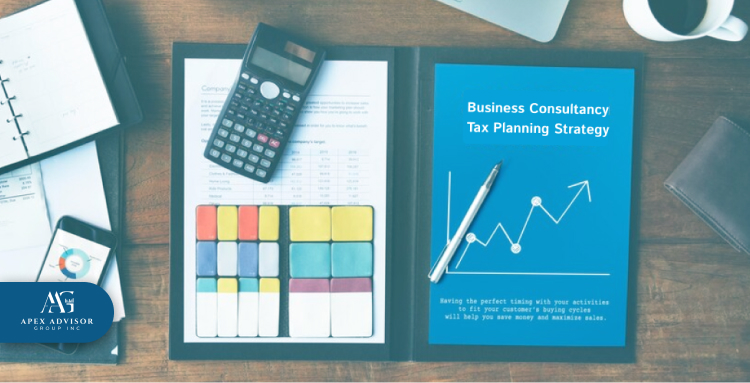
Business consultancy in the tax field is crucial for helping businesses navigate tax regulations and gain financial benefits. In Florida, where businesses face local and state tax requirements, consultants provide expertise to ensure companies stay compliant, avoid penalties, and manage tax obligations effectively. They keep up with tax law changes and adjust strategies to fit each business’s goals, maximizing deductions, credits, and exemptions.
Consultants also strengthen financial planning by aligning tax strategy with a company’s broader objectives. This approach not only improves cash flow but also helps businesses prepare for audits by keeping accurate records and meeting compliance standards. Overall, business consultancy offers owners peace of mind, equipping them to manage both current tax needs and long-term financial success.
How a Tax Advisor Makes a Difference From a Business Consultant
Tax advisors provide in-depth, strategic guidance on tax-related matters. They help businesses minimize liabilities and optimize tax efficiency. They stay updated on the latest tax laws and regulations, ensuring compliance and identifying opportunities for tax savings. Their role often includes preparing and filing tax returns and representing clients in audits. Also, they offer long-term tax planning strategies tailored to the client’s unique financial situation.
In contrast, business consultants offer project-based solutions. They aimed at improving overall business performance. They might focus on areas such as operational efficiency, market expansion, or financial management. They can provide valuable insights into various aspects of running a business. However, their expertise in tax matters is typically not as specialized as that of a tax advisor.
Businesses ensure compliance with tax laws with tax advisors' expertise. Additionally, tax advisors help companies strategically identify and take advantage of tax-saving opportunities. This approach ultimately leads to better financial outcomes and improved cash flow.
Now you know how a tax advisor can make a significant difference compared to a business consultant. If anyone you know is looking to optimize their tax strategies, share this with them. Contact Apex Advisor today if you have any questions about tax advisory services.
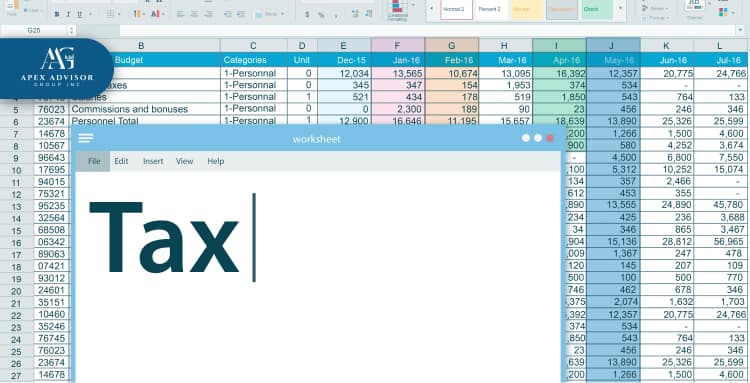
December 14, 2024
How Tax Resolution Services Can Help with IRS Issues
Facing IRS (Internal Revenue Service) issues can feel frustrating, especially if you’re unsure where to start. Maybe you missed a tax payment deadline, forgot to file a return, or simply aren’t clear on your tax responsibilities. Whatever the reason, receiving a notice from the IRS often brings a wave of frustration and worry. And it only gets tougher if you start getting hit with penalties and more letters from the IRS.
But there's good news—tax resolution services are designed to step in and help you tackle these problems before they spiral. Skilled tax professionals, well-versed in IRS rules and regulations, are ready to work on your behalf. But what do they actually do to help you manage these IRS challenges?
1) Common IRS issues that require resolution services
When it comes to dealing with the IRS, a few issues pop up more frequently than others and often require a professional touch to handle properly.
Ignoring unfiled tax returns
One of the most common issues people face is simply not filing their tax returns on time. Whether due to life getting busy or confusion about the process, this can quickly turn into a bigger problem. Unfiled tax returns mean mounting penalties and interest, which the IRS won’t ignore for long. In fact, they may take legal action to collect what’s owed, and if this goes unaddressed, it can become a major financial burden that only grows over time.
Back taxes and penalties
A lot of people find themselves dealing with back taxes—outstanding taxes from previous years that have yet to be paid. The IRS has the power to add penalties and interest to these overdue amounts, making it even harder to clear the debt. Tackling back taxes without a plan can feel overwhelming, but tax resolution services can help by creating a tailored plan to tackle these obligations step-by-step.
IRS collections and liens
If unpaid taxes sit around long enough, the IRS can take some serious actions to collect, from placing liens on your property to garnishing wages. These steps can drastically affect your financial stability and make it challenging to get back on track. Here, tax resolution services can work with the IRS on your behalf to ease or even avoid these actions, helping you regain financial control.
2) Tax resolution options for individuals and businesses

When you're facing tax issues, a tax resolution expert acts as your advocate, speaking directly with the IRS to reduce penalties and set up alternative payment plans. Let’s take a closer look at some common tax resolution strategies they use.
Installment agreements
One of the most common ways to resolve tax debt is by setting up an installment agreement. This allows you to pay off your tax debt over time with manageable monthly payments. The IRS requires full financial disclosure to determine what you can afford, and a tax professional can guide you in gathering the necessary information to make this process easier.
Offer in compromise (OIC)
If you owe more than you can pay, an Offer in Compromise (OIC) might be the solution. It allows qualified taxpayers to settle their tax debt for less than what they owe, offering significant relief for those facing financial hardship. A skilled tax professional will assess your situation, determine eligibility, and craft a strong proposal to present to the IRS.
Currently not collectible status
For those struggling financially, there’s the Currently Not Collectible (CNC) status, which temporarily halts the IRS from pursuing debt collection. While the interest continues to accumulate, this status gives taxpayers a breather, as collection efforts such as wage garnishments or bank levies stop. A tax resolution expert can help you apply for this status and manage the application process.
Penalty abatement: Reducing penalties for late payments
If you're facing penalties for late tax payments, penalty abatement could be your way out. The IRS may reduce or eliminate penalties if you can show a valid reason, like an unexpected illness or a financial crisis. An experienced tax pro can help you present a compelling case, increasing your chances of success.
Bankruptcy as a tax relief option
In some cases, bankruptcy may be the key to eliminating the exhausting tax debt. While not all taxes can be discharged through bankruptcy, certain types might qualify. A tax resolution specialist can evaluate your financial situation and determine whether this is a viable option for you.
IRS tax appeals process
If you disagree with the IRS’s decisions about your taxes, you have the right to appeal. The IRS tax appeals process can be complex, but with the help of a tax expert, you can overcome this challenge confidently. They’ll help ensure your appeal is well-documented, making your case stronger.
3) Why timely tax resolution matters

Ignoring IRS notices only makes things worse. If you don’t take action quickly, your tax situation could spiral out of control. Here’s why it’s critical to address it promptly:
Minimizing escalation
The IRS has a series of escalating actions it can take when taxes go unpaid, from sending warnings to issuing wage garnishments, liens, or even bank levies. These actions can turn a manageable debt into a financial nightmare. By seeking tax resolution early, you can stop things from escalating to the point of no return.
Avoiding financial burden
Interest and penalties on unpaid taxes can add up quickly, making your debt feel heavier even if you haven’t added anything new to it. Taking action early helps to minimize these extra costs. A tax resolution expert may also help negotiate reductions, making the debt easier to handle.
4) How can Apex Advisor provide tax resolution assistance?
Apex Advisor offers tailored tax resolution services, guiding you step-by-step through the process to help you achieve financial peace of mind. Here’s how we can assist you in resolving your IRS issues.
Comprehensive assessment
We start by conducting a thorough review of your financial and tax situation. Our goal is to identify exactly where the issues lie, explain your options in clear terms, and create a personalized action plan that puts you on track for a resolution.
Completing forms and helping collect necessary documents
Dealing with the IRS’s paperwork can be stressful. Let us take care of the details. We’ll help you gather the necessary documents, complete all forms accurately, and ensure everything is in order, so you don’t have to worry about making costly mistakes.
Negotiating with the IRS
As your representatives, we’ll handle all communication with the IRS on your behalf. Whether it’s negotiating an installment agreement, requesting an Offer in Compromise, or suspending collections due to hardship, we’ll work hard to find a solution that lightens your load.
Setting up manageable payment plans
If you need more time to pay off your tax debt, we can work with the IRS to establish a payment plan that fits your budget. Our team will ensure that the terms are fair, making it possible for you to pay off the debt without putting undue strain on your finances.
Relief for spouses who are unfairly responsible for tax debts
If your tax debt is the result of actions taken by your spouse or ex-spouse, you may qualify for Innocent Spouse Relief. We’ll guide you through the eligibility process and handle the necessary paperwork to relieve you of this unfair burden.
Apply for payment deferrals
Facing financial hardship? We can help you request a temporary deferral of your tax payments, giving you time to get back on your feet without the pressure of IRS collections.
End-to-end support
Tax issues can be daunting, but you don’t have to go through it alone. From your first consultation to the final resolution, Apex Advisor is here for you, providing ongoing support and updates every step of the way.
Representing the IRS in the case of audits and disputes
If you’re dealing with an IRS audit or dispute, we’ll represent you with professionalism and expertise. We’ll prepare all necessary documents, respond to IRS inquiries, and manage all proceedings, reducing your stress and working toward the best possible outcome.

December 5, 2024
Top Accounting Software for Tax Preparation
Tax season can undoubtedly be a stressful time. In the United States, the tax season mainly starts from January 1st to April 15th. During this period, you need vast preparation for your tax filing and payment—filling out forms and handling complex calculations. But what if an advanced tech tool could help with all of your tax processes? Yes, the right accounting software can make filing taxes easier, faster, and more accurate. With so many options available, choosing the best software can make a huge difference between an exhausting tax season and a smooth one.
We have the top accounting software for tax preparation, whether you are a tax professional, business owner, or individual. Additionally, a few professional advice on how you can choose the right one.
Top 7 Professional Tax Preparation Software
Let’s explore our top-picked tax preparation software for tax preparers.
1. TurboTax
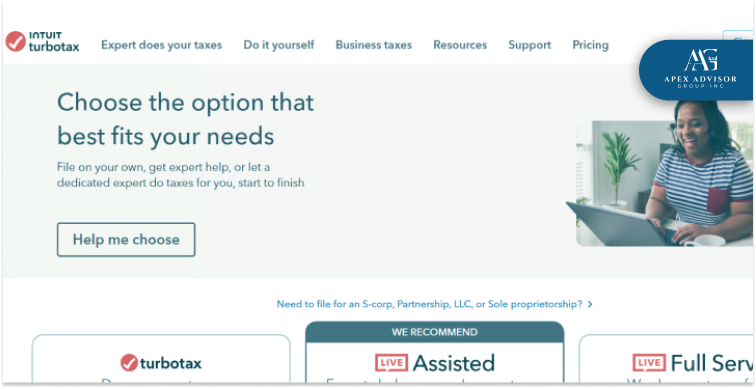
Both small companies and personal business users make TurboTax their first priority. According to experts and professional opinions, 3 factors make this tool the best choice in the business, reviewers.
How it helps pro-self-employed and sole business owners.
Amazing features of virtual help.
The way it integrates data between external and third-party apps.
TurboTax has a useful expense calculator feature. It allows self-employed individuals to find tax deductions unique to their industry. If you're self-employed, this tool helps you improve support for standard schedules and forms. These consist of Form 1065 and Schedules C and K-1.
If you own a business you can either use a standard TurboTax, starting from $129, or Turbo live assisted, which can cost you $89 to $219. However, it's highly recommended to use TurboTax Live. It has a tax return review with an Intuit self-employment tax consultant.
2. QuickBooks Online
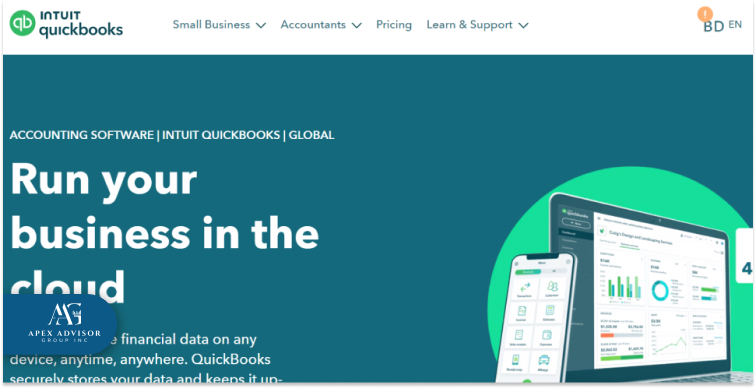
QuickBooks Online is a versatile and widely-used accounting software for small to medium-sized businesses. It offers a range of features that help businesses manage their finances efficiently and stay organized throughout the year.
QuickBooks Online tools’ scalability allows businesses to start with a basic plan and upgrade as their needs grow. The software is particularly beneficial for businesses that require robust financial reporting, tax preparation, and payroll integration.
QuickBooks Online offers four subscription plans to cater to different business needs:
Simple Start plan costs $35 per month.
Essentials plan costs $65 per month.
Plus plan costs $99 per month.
Advanced plan costs $235 per month.
3. TaxSlayer

TaxSlayer is a popular tax preparation software designed to cater to the needs of individuals, small businesses, and tax professionals. It offers a range of features to simplify the tax filing process, ensuring accuracy and efficiency. The key features of this tool are:
User-friendly interface that guides users through the tax preparation process step-by-step.
Supports federal and state tax returns, including multiple state filings.
W-2 and 1099 support which is ideal for freelancers and small business owners.
Affordable pricing.
Live chat and phone support.
TaxSlayer offers several plans to accommodate different needs:
Simply Free: $0 for federal, $39.95 per state.
Classic: $37.95 for federal, $44.95 per state.
Premium: $57.95 for federal, $44.95 per state.
Self-Employed: $67.95 for federal, $44.95 per state.
4. H&R Block Tax Software

H&R Block is a well-known software in the tax preparation sector. Individuals who need extra guidance make great choices for them. However, its overall performance, usability, and variety made H&R Block the best-rated tax software.
Business owners may benefit from a wide range of capabilities in H&R Block software. For instance, recognizing and asserting deductions, compliance perfectly aligns with different requirements for business structures, automatic monitoring, and submitting payroll taxes.
Additionally, H&R Block offers some assurances to support their small business tax software. Up to $10,000 in fines and interest will be reimbursed to you if the H&R Block tax preparation software makes a mistake on your return.
H&R Block offers a range of service plans:
Basic: Free.
Deluxe + State: $55 with $49 per state filed.
Premium: $89 for federal and additional state returns.
5. Drake Tax
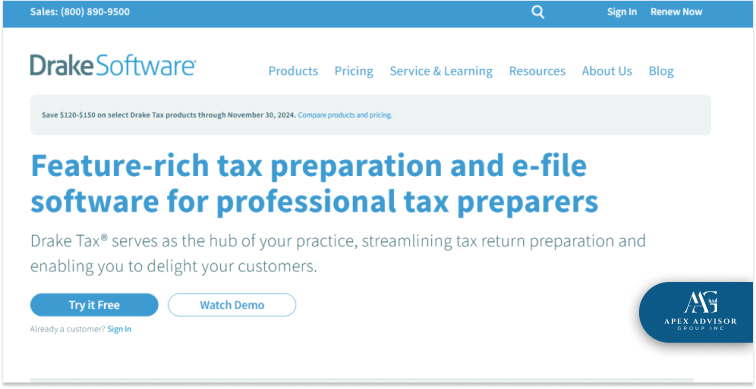
Drake Tax is the most popular choice for accountants who deal with small and medium businesses. Insiders especially like the platform's ability to blend cost with sophisticated capabilities for customers with moderately complicated tax situations.
The major reason why it’s the popular choice for accountants is because of its 4 crucial areas of operation. The preparation process, planning and analysis process, review process, and electronic filing process.
Drake Tax is made to be quick and effective. A number of features that update prior tax returns for the current filing period are part of this. This tool offers sophisticated planning and analysis features, including amortization schedules, archiving, and year-to-year comparisons.
By providing users with quick access to information, this application helps them prevent mistakes and rejections. Custom collation features for hard copy printing can save accountants time. With PINs, consent prompts, electronic signatures, and auto-file settings, clients may automatically authorize documents for submission.
Based on whether you’re a single user or multi-user, there are 3 pricing categories available, along with a pay-per-return option. For multi-user, this tool can cost from $1800 to $2400, and for single users $1700 to $2000. Click here for more details on the pricing plan.
6. TaxAct Business
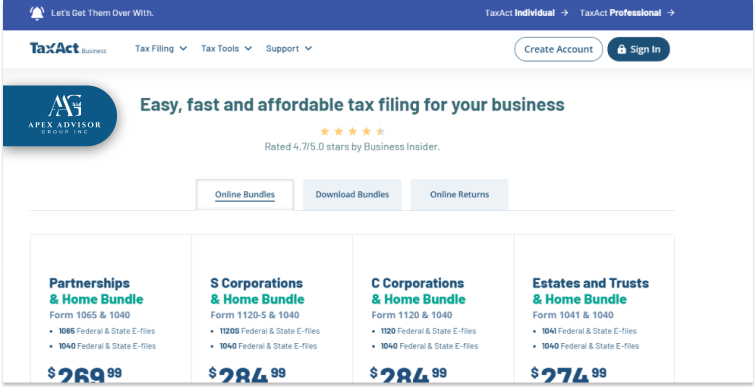
Budget-conscious small businesses that work as corporations or partnerships are a good fit for the TaxAct tool. The web platform offers two options:
Business packages for large companies
Bundles that combine help with both business and personal taxes.
TaxAct software provides certain services for Collaborations, C corporations, S companies, and Organizations that are free from taxes. Additionally, this tool offers a package for sole businesses that submit Schedule C (Form 1040) for company tax payments.
In the TaxAct business tool, while some plans can start around $250, others are priced lower or may have additional costs per return. Visit the website to buy specific plans that suit your needs and budget.
7. FreshBooks
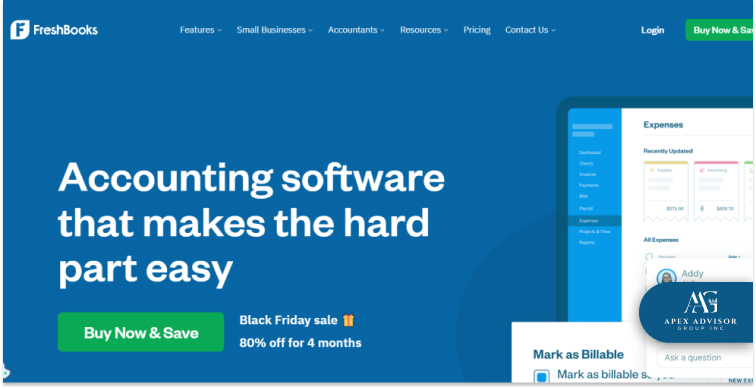
FreshBooks is a cloud-based accounting software. This tool is a great choice for freelancers, small businesses, and service-based businesses. It offers a range of features that help users manage their finances, track expenses, and streamline their invoicing processes.
FreshBooks makes managing business tasks easy and efficient. You can create and send professional invoices in minutes, set up recurring billing, and even automate payment reminders.
Tracking expenses is simple—just snap receipts and categorize transactions, with the option to sync with your bank for automatic imports. Log billable hours with built-in time tracking to ensure accurate invoicing.
Manage projects effortlessly with tools to track progress, work with your team, and stay on budget. FreshBooks also offers clear financial reports and mobile apps for iOS and Android, so you can stay on top of your finances wherever you are.
FreshBooks offers several pricing plans to accommodate different business needs. The most popular plan is Plus, which can cost around $17. Click here to explore other pricing plans.
How to Choose the Right Accounting Software for Your Tax Needs
When it comes to buying the right tax accounting software, you need to consider some factors. Particularly your business size, budget, data security, and important features that you shouldn’t compromise on:
Business Size and Type:
Different businesses have different tax needs. What freelancers and small businesses may need is completely different from what larger firms require. For instance, small firms might need simple tools for invoicing and expense tracking. On the other hand, big firms often require advanced features like multi-user access and complex reporting. Choose software designed for the scale and type of your business.
Budget and Features:
Make sure the software fits your budget without skimping on essential features. Look for key functions like invoicing, expense tracking, and tax reporting, and avoid paying extra for features you won’t use.
Customer Support:
Reliable support is crucial, especially during tax season when questions can arise. Opt for software with a reliable customer service team. For example, providing 24/7 live chat and phone support, can answer questions, troubleshoot issues, and offer guidance on tax filing when you need it most.
Security Considerations:
Protecting your financial data is critical. Choose software that prioritizes security, offers data encryption, and complies with regulatory standards to keep sensitive information safe.
Apex Advisor – Transform Your Tax Season
Finding the right tax accounting software is a great start. But when you have an expert advisor by your side, your financial strategy can transform to a whole new level. With Apex Advisor Group, you gain more than just software support—you get a team of financial experts who understand the complexities of tax planning, accounting, and business growth. We help you make smart financial choices, navigate tax regulations, and optimize your finances year-round, not just during tax season. Contact us today to schedule a consultation or go to apexadvisorgroup.com to see how we can support your goals with our other services.
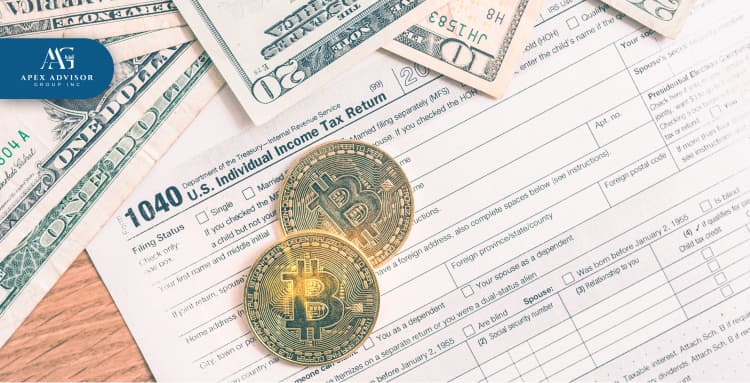
November 26, 2024
Filing Taxes For Cryptocurrency What You Need to Know
Have you been buying Bitcoin, Dogecoin, or any of those meme coins? Awesome! But every time you sell, trade or convert your cryptocurrencies, it triggers a taxable event. Because the IRS considers this cryptocurrency as a virtual “asset” or “ property”. If you don’t report your income while making money through transitioning crypto, you can be in real trouble. Whether you profit or lose it still affects your taxes. Transactions of cryptocurrency are indeed virtual activity but it has serious consequences on real-life tax. A lot of folks are caught off guard by this, but don’t worry—we’ll break 'cryptocurrency taxes' down for you.
What Is a Taxable Event in Crypto?
First, let’s talk about ‘what a taxable event is’. Well, it is an event where any kind of action or transaction triggers taxes owed or tax obligations to the government. A taxable event in crypto means you made transactional activity like trade, sell, or convert with your virtual currencies. As it is an asset according to the IRS, any change in that is considered a taxable event.
You can buy as much Bitcoin or Dogecoin as you want, and as long as you hold it, the IRS doesn’t care. Buying crypto isn’t a taxable event. But the minute you sell—or even swap one crypto for another—that’s a whole different story. You’ve created a taxable event. Because of that, the IRS wants you to report every one of those transactions.
For example, you buy 1 Bitcoin for $10,000 in 2019. But today the worth of that Bitcoin is let’s say $30,000. If you sell that Bitcoin, you’ll make a $20,000 profit. This profit is considered as capital gains tax. As a result, you have to report it on your tax return.
Now you can ask – If I don’t withdraw that money but use it to buy another cryptocurrency, will it still count as a taxable event? Yes, it will still count as a taxable event. Every time you convert one crypto for another, it seems like you are selling actual crypto to buy a new crypto. That means it is taxable according to the IRS.
Misconceptions About Cryptocurrency Taxes

Many people think that just because their crypto is chilling on Coinbase or Binance and they didn’t withdraw the cash, it’s not taxable. Guess what? That’s 100% wrong. It doesn’t matter if you never touched the cash—if you sold or traded, the IRS wants it on your tax return. They include a question about your virtual currency, “Did you ever receive, sell, transmit, swap, or otherwise gain any financial stake in any virtual currency during 2023?”, on Form 1040.
Even if you get Form 1099, still you are bound to report all crypto transactions to the IRS. Form 1099 is a group of tax forms for all payment documentation. A non-employer broker normally made this report. However, if you just buy cryptocurrency but didn’t make any transactions you don't have to worry about reporting it.
Apart from that, there are some more misconceptions.
The blockchain is anonymous which is not true. It’s completely secure and decentralized. The IRS tracks your crypto wallet through Blockchain (public ledger) and KYC (know your customer) protocols.
If you don't receive Form 1099-B that doesn’t mean you don't owe any taxes. You still need to report all of your income from virtual currencies.
If you think private wallets don’t require reporting then it’s 100% wrong. Whether you use a private wallet or a public exchange, you’ll face the same tax rules.
Can You Claim Crypto Losses? Yes, but with Limits
Had a rough year with crypto investments? You can claim up to $3,000 in losses on your tax return. This means US taxpayers can deduct up to $3,000 from their regular income and balance them against capital gains. All cryptocurrency sales must be reported on Form 8949 in order to qualify for these tax breaks. If your losses are higher, don’t worry—they’ll carry over to the next tax season. Just keep in mind: gains aren’t capped. So if you made $20K or even $100K, the IRS will be expecting their cut.
What if you have no capital gains, then what? In that case, you can lower your crypto tax bill by using strategies like tax-loss harvesting. IRS compliance may be guaranteed and the reporting process made simpler with the use of tools like TokenTax's.
How to Minimize Your Cryptocurrency Taxes

The good news is, crypto isn’t exactly treated like stocks, so there are some ways to reduce your capital gains. That’s where keeping track of all your transactions comes in handy. We’ll need to dig into your history of buys and sells to figure out the best strategy for minimizing your taxable income. However, there are 4 strategies you can follow to minimize your crypto tax-
Hold your crypto for over a year before selling. This will help lower long-term capital gains tax rates.
Use crypto tax-loss harvesting. Offsetting losses against gains can reduce taxable income and overall tax bill.
Donate or give away your crypto. This will help lower your tax liability. Also, gifting cryptocurrency is tax-free unless its value at the time of the gift exceeds the current year's gift tax exclusion level. For example, the annual gift tax exclusion is $15,000 in 2023. If your gift value is lower than $15,000, you won't trigger gift tax.
Claim self-employment deductions. For example, you earn crypto through self-employment. To minimize tax, you can deduct your valid business expenses such as rent, utilities, and travel.
Remember one thing, cryptocurrency is volatile and lacks protections. Because the Federal Deposit Insurance Corporation (FDIC) or the Securities Investor Protection Corporation (SIPC) do not insure crypto. Therefore be careful before you invest or consult a tax advisor before you trade. “Buy crypto with an amount you can afford to lose”.
Stay With Apex Advisor For All Tax Updates and Solutions
Cryptocurrency taxes might be complicated. But with the right strategy and detailed record keeping it doesn’t have to be overwhelming. The most important step you can take is keeping a clear record of all your transactions. Whether you buy, sell, trade, or even use crypto for purchases. Know how to take advantage of every opportunity to cut your tax bill.
Want more tips on managing your crypto investments and paying less in taxes? Like, follow, and stay tuned—we’ve got more insights coming your way.

November 19, 2024
Essential reporting and record keeping in payroll
Running payroll might seem straightforward, but keeping up with today’s business demands and legal requirements makes it tricky. Payroll reporting and record-keeping aren’t just compliance roadblocks—they’re essential to keeping a company running smoothly and legally. Plus, when your team sees their paychecks handled accurately, it builds trust and boosts morale.
Between employee record management and navigating federal and state tax obligations, there’s plenty of room for complexity and mistakes. But here’s the thing: setting up a solid payroll system just solves it all. Here, we’ll walk you through the essential payroll strategies, help you avoid legal headaches, and keep a positive workplace culture.
I. Key Elements of Payroll Reporting Every Business Needs
A. Employee Records
Employee records are the backbone of a well-managed payroll system. Each piece of information in these records plays a role in ensuring employees are paid accurately, the business complies with tax regulations, avoids tax preparation mistakes, and legal obligations are met. Keeping precise and up-to-date employee records is particularly important due to Florida’s specific tax laws and regulations.
To start, W-4 forms are crucial as they detail each employee’s tax withholding preferences, directly influencing federal income tax deductions. These forms should be reviewed and updated regularly, especially if an employee’s personal or financial situation changes.
I-9 forms are another essential component, verifying employees’ eligibility to work in the U.S. This is not only a legal requirement but a step toward establishing a compliant workforce.
Additionally, employment contracts help clarify job responsibilities, pay rates, and employment terms. This paperwork serves as a valuable reference if any questions arise. Include paid and unpaid leave records. Such as paid leave, and sick leave by the state, the Family Medical Leave Act (FMLA), and other paid time off (PTO).
B. Payroll Registers
Payroll registers are the “ledger” of payroll—a detailed summary of earnings, deductions, and net pay for each employee. These records allow businesses to see at a glance how much was paid, withheld and contributed for taxes or benefits in any given pay period. Maintaining accurate payroll registers is essential for operational efficiency and fulfilling tax filing and financial reporting obligations.
Payroll registers play a significant role in tax filings, especially when preparing quarterly and annual forms like the 941 or W-2s. When tax season rolls around, having an organized payroll register ensures that the numbers align, reducing any risk or audit triggers. These registers also feed into financial statements, helping the business manage labor costs and plan budgets more effectively.
II. Compliance with Florida Payroll Laws
A. Understanding Florida’s Employment Regulations

Steering Florida’s employment regulations is essential for any business aiming to maintain a fair and compliant workplace. While Florida offers employers some flexibility, there are foundational rules to follow, especially regarding minimum wage and overtime pay.
Florida’s minimum wage is higher than the federal minimum and is updated annually to reflect inflation. In 2024, the minimum wage is $12 per hour for non-tipped employees, with plans to increase incrementally until reaching $15 in 2026. This commitment to raising the wage aims to help employees keep up with living costs. For tipped employees, Florida requires a minimum cash wage of $8.98 per hour as of 2024, with the remaining balance made up through tips to reach the $12 minimum.
When it comes to overtime, Florida follows federal Fair Labor Standards Act (FLSA) guidelines, requiring overtime pay for non-exempt employees who work over 40 hours in a week. Overtime must be compensated at 1.5 times the regular hourly rate.
B. Tax Obligations
At the federal level, employers are responsible for withholding federal income tax, Social Security, and Medicare from employees’ wages, submitting these funds to the IRS regularly. They also need to complete quarterly filings, such as Form 941, to report withheld federal income tax, Social Security, and Medicare contributions. At year-end, Form 940 is required to report Federal Unemployment Tax Act (FUTA) contributions. These forms keep payroll taxes transparent and compliant.
State tax obligations include Florida’s Reemployment Tax, a state-specific payroll tax to support the unemployment system. Tampa businesses need to file this tax timely to avoid penalties and ensure that employees are covered by Florida’s unemployment insurance if required.
III. Best Practices for Efficient Payroll Record-Keeping
➢ Digital Record Management
Unlike traditional methods that rely on stacks of paper and manual calculations, payroll software automates tasks, ensuring each paycheck reflects accurate hours, deductions, and taxes—minimizing the risk of human error.
Popular payroll systems like QuickBooks Payroll, Gusto, and ADP provide tools specifically designed to help small and mid-sized businesses keep track of payroll data in real-time. These platforms can automate tax calculations, generate pay stubs, and even handle direct deposits.
Choosing a payroll system tailored to your business’s size and needs can transform payroll from a time-consuming chore into a smooth, automated process. Beyond streamlining operations, these tools make it easier to retrieve records if ever needed for audits or employee inquiries, offering peace of mind to both employers and employees.
➢ Retention Guidelines
Keeping payroll records isn’t just about organization; it’s about compliance. Both federal and Florida state laws specify how long payroll records must be retained. Generally, businesses should hold onto payroll records for at least three years under the Fair Labor Standards Act (FLSA) and up to four years for tax purposes, according to IRS guidelines. Specific documents, like I-9 forms, have additional retention requirements based on an employee’s termination date.
Proper record retention practices ensure that your business can provide documentation if questions arise about wages, overtime, or tax withholdings. This is especially important in the case of audits, disputes, or legal inquiries. Plus, regular backups are essential to protect against data loss due to technical failures or cyber threats.
IV. How To Optimize Payroll Processes
A. On-Demand Payroll Solutions

On-demand payroll solutions are transforming the way employees access their earnings, allowing them to tap into their pay as they earn it instead of waiting for the traditional payday. For employees, this option provides greater flexibility and financial security, especially when unexpected expenses arise between pay periods.
With on-demand payroll, companies partner with payroll providers that offer mobile-friendly platforms, giving employees real-time access to a portion of their earnings. Providers like DailyPay, Earnin, and PayActiv have become popular in this space, as they make it easy for employees to withdraw part of their wages with just a few clicks, often at no cost to the employer. Likewise, companies are using tax software solutions to reduce compliance errors to avoid additional tax penalties.
B. Integration with HR and Time Tracking
Integrating payroll systems with HR and time-tracking platforms is one of the most effective ways to improve accuracy, reduce administrative workload, and maintain compliance. When payroll systems connect seamlessly with HR and time-tracking software, they automatically pull in crucial data, like employee hours, attendance, and benefit deductions, ensuring paychecks are accurate down to the last detail.
Popular HR and payroll platforms, like Gusto, BambooHR, and ADP, offer integrated solutions that combine payroll, HR, and time tracking under one system. This integration simplifies processes and makes it easy for managers to review hours, approve time off, and oversee benefits—all from one place.
V. Prioritizing Data Security and Privacy in Payroll
✔ Protecting Sensitive Information
With payroll data containing some of the most sensitive information a company holds—employee Social Security numbers, bank account details, and addresses—it’s no surprise that payroll systems are a prime target for cyber threats. Cybercriminals often use sophisticated tactics, like phishing emails disguised as internal communications, to trick employees into giving up login credentials or other sensitive information. Ransomware attacks, where attackers lock data and demand payment for its release, can also wreak havoc on payroll data.
To counter these threats, businesses should adopt a multi-layered security approach. Encryption is essential, as it scrambles data so that only authorized users can read it, protecting it during transmission and storage. Multi-factor authentication (MFA) adds an extra layer of security by requiring users to verify their identity in multiple ways—typically through a password and a one-time code sent to a mobile device. Implementing MFA significantly reduces the risk of unauthorized access, even if a password is compromised.
✔ Employee Training
While technology is crucial, people are often the first line of defense against cyber threats. Employees should be educated about phishing schemes and other common threats, learn how to spot suspicious emails, avoid clicking unknown links, and report anything that seems out of the ordinary.
Regular security training sessions can help reinforce these skills, keeping cybersecurity top of mind. Simulated phishing exercises, where employees receive fake phishing emails as practice, can be particularly effective for teaching them to detect and respond to suspicious messages.
✔ Using Government Resources for Compliance
For businesses seeking reliable, up-to-date compliance information, the Florida Department of Revenue (DOR) is an essential resource. The DOR guides state payroll tax obligations, including the Florida Reemployment Tax, which funds unemployment benefits for state workers. Additionally, the U.S. Department of Labor (DOL) offers resources on federal wage laws, overtime regulations, and employee classification.
Partner with Apex Advisors for Expert Payroll Services

When the Department of Labor (DOL) and the IRS come knocking to check if your business is following labor laws and tax rules, having solid payroll records is crucial. These records serve as a clear paper trail, showing that you're compliant with all the regulations. Partnering with Apex Advisors can make payroll management smoother, as we’ll have direct knowledge of Florida’s labor laws, tax requirements, and nuances that affect local businesses.
We offer comprehensive services that cover payroll processing, tax filings, compliance assistance, and employee benefits management. By choosing us, your businesses can receive personalized support and quick response times when you need help, contributing to a seamless payroll experience. Contact us today for a consultation and discover how we can help your business thrive.

November 14, 2024
Common Tax Preparation Mistakes to Avoid
Filing taxes—two words that can send a shiver down anyone’s spine. Between hunting down paperwork, double checking deductions, and trying to make sense of tax jargon, it's no wonder people often make costly mistakes. However, the good news is that avoiding these blunders isn’t as hard as it seems.
Whether you’re filing solo or leaning on a pro, sidestepping common tax prep mistakes could save you a headache (and a chunk of change). From missed income to math slip-ups, we’re breaking down the usual suspects in tax errors and showing you how to dodge them with ease.
1) Missing income reports can lead to audits and potential penalties.
The IRS receives all your income information from various sources, so when something’s missing—like a side gig or freelance project payment—it raises a red flag. Even a small amount left unreported can lead to discrepancies that might trigger an IRS audit or, at the very least, delays in your return. Plus, if adjustments are needed, you may end up owing more tax than anticipated.
How to Avoid It:
Keep track of every income source, even if it’s not a traditional 9-to-5 paycheck. Go through your W-2s, any 1099 forms for freelance or contract work, and other income records like rental or investment earnings. Before filing, make a quick checklist to confirm you’ve included it all. For an extra safeguard, tax prep software can help spot missing entries and ensure nothing falls through the cracks.
2) Wrong filing status can increase your tax rate or reduce credits
Filing status might seem straightforward, but picking the wrong one can mean paying more in taxes or missing out on valuable credits and deductions. For instance, filing as "Single" when you qualify as "Head of Household" could cost you a lower tax rate and credits designed to ease the burden for families. The IRS uses your filing status to calculate your tax bracket, eligibility for tax breaks, and even refund amounts, so getting it wrong can throw your whole return off balance.
How to Avoid It:
Take a few moments to review the specifics for each filing status: single, married filing jointly or separately, head of household, and qualifying widow(er). If you’re unsure which category fits you best, especially if you have a unique situation like shared custody or recent changes in marital status, consider checking in with Apex Advisors. We can make sure you’re maximizing benefits and keeping your tax bill as low as possible.
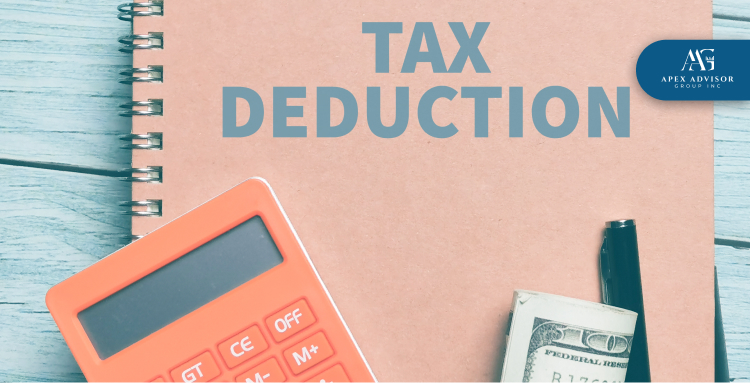
3) Missed deductions or credits can cost you in taxes or a lower refund
Leaving deductions or credits on the table is like waving goodbye to money you could’ve kept in your pocket. Tax credits directly reduce what you owe, and deductions lower your taxable income—both can make a significant difference in your final tax bill. Overlook education credits like the American Opportunity Credit, healthcare deductions, or even credits for energy-efficient home improvements, and you could miss out on substantial savings.
How to Avoid It:
Take a little time to explore what deductions and credits you’re eligible for, especially if you had big expenses in areas like healthcare, education, or home ownership. Look into credits like the Earned Income Tax Credit (EITC) if you qualify, or deductions for student loan interest. To make it easier, tax software often has built-in prompts for these items, or we can guide you through any credits specific to your situation. The more you know, the more you can keep from slipping through the cracks.
4) Filing with Incorrect Social Security Numbers
A simple typo in a Social Security number can bring your tax filing to a screeching halt. Since the IRS uses these numbers to match tax records, even a minor mistake—like flipping a digit or missing one altogether—can lead to a rejected return, delays in processing, and potentially lost deductions or credits tied to dependents. If you're counting on a quick refund, an error here can be a frustrating roadblock.
How to Avoid It:
Before you hit “submit” or mail in your return, do a quick verification of each Social Security number on your forms. This includes double-checking for yourself, your spouse, and any dependents. Take a few extra seconds to make sure every digit is in the right place. If you’re using tax software, take advantage of the prompts for review—they’re there to help you catch issues like this before they cause delays.

5) Miscalculations can result in overpayments, underpayments, or IRS corrections
It’s easy to think a small miscalculation won’t cause too much trouble, but in tax filings, even a minor math slip can throw off your entire return. An error might mean overpaying, underpaying, or even raising red flags for further IRS review. Plus, if the IRS catches the mistake, they’ll correct it—often delaying any refund you were expecting or potentially increasing the amount you owe.
How to Avoid It:
Skip the manual math and use tax software, which does the heavy lifting for you. Many programs automatically calculate figures based on the information you input, making it less likely for a simple error to slip through. If you’re handling a complex return, we can also double-check everything, ensuring your calculations are spot-on.
6) Incorrect Bank Information for Direct Deposit
Imagine waiting weeks for your refund, only to discover it’s been delayed—or worse, sent to the wrong account—because of a tiny error in your bank details. Mistakes with routing or account numbers can lead to lengthy delays or, in rare cases, funds being deposited into someone else’s account. Fixing these issues with the IRS or your bank can be time-consuming and frustrating.
How to Avoid It:
Before you submit your return, take a moment to verify that your routing and account numbers are exactly right. Check each digit, or better yet, grab a bank statement to cross-reference. Many tax software platforms prompt you to confirm this information, so use that extra nudge as a final safeguard. A few seconds of rechecking can save you from weeks of refund delays.
7) Missing the Filing Deadline
Letting the tax deadline slip by without filing or requesting an extension can be more costly than you might think. The IRS charges penalties and interest on late payments, which can stack up quickly if you’re not prepared. Worse, if you’re expecting a refund, filing late could delay it significantly, leaving you waiting longer than necessary for your own money.
How to Avoid It:
Set yourself up for success by marking the tax deadline on your calendar or setting a reminder a few weeks ahead of time. If life gets in the way and you realize you need more time, file for an extension—it’s simple, and it gives you an extra 6 months to get your return in without penalties. A little planning goes a long way toward keeping those deadlines stress-free.
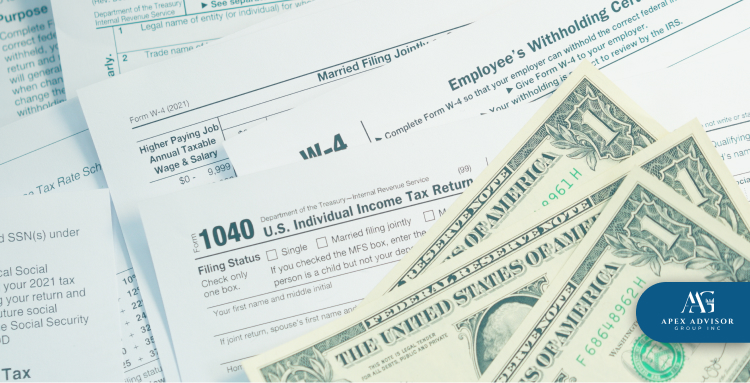
8) Not Keeping Copies of Past Returns
Think of your past tax returns as your backup plan. If the IRS ever comes knocking with questions or you need to reference something for a future filing, having easy access to those records is a lifesaver. Without them, you might find yourself scrambling for details or losing out on valuable information that could simplify this year’s return.
How to Avoid It:
Set up a secure system for storing both digital and physical copies of your tax returns. The IRS generally recommends keeping these records for at least 3 to 7 years, so scan them and back them up digitally for safekeeping. Keeping past returns organized not only provides peace of mind but also makes filing future returns easier and more accurate.
9. Improperly Claiming Dependents
Claiming a dependent on your taxes can bring valuable credits and deductions, but if you don’t meet IRS guidelines, it can backfire. Mistakenly claiming a dependent can lead to penalties, and if the IRS spots an error, you could miss out on benefits you were counting on. This is especially tricky in cases of shared custody or when dependents are older, like college students.
How to Avoid It:
Before adding anyone as a dependent, review the IRS rules carefully, particularly if you share custody or if the dependent is 18 or older. Situations involving children of divorced parents or multi-generational households can be complex, so make sure you’re on solid ground with the guidelines. When in doubt, a quick consult with Apex Advisors can ensure you’re claiming dependents accurately—and keeping those benefits intact.
Apex Advisor Makes Tax Season Easy and Error-Free
If you’re ready to take the guesswork out of tax preparation, let Apex Advisor handle it all. Our team of tax experts is dedicated to making sure your return is complete, accurate, and filed with maximum benefits in mind. Whether it’s managing complex filings, optimizing deductions, or catching the smallest details, we have the knowledge and tools to make your tax season seamless. Reach out today and experience stress-free tax handling from the professionals who put your peace of mind first.

November 9, 2024
How Financial Coaching Can Help You with Tax Preparation
Dealing with taxes every year is challenging, especially when you do not have any preparation before tax season comes around. When I started managing my finances for the first time, I thought I could manage everything properly. But when tax season was knocking at the door, I became confused thinking how to move forward. I was concerned about overlooking deductions, making sure everything was filled correctly, and the overall anxiety that comes with organizing money.
However, things took a different direction when I started working with financial coaching. They made tax preparation easier and also showed me the best way to manage my finances. It has really transformed everything that I never expected. And I can't wait to share how financial coaching can help you with tax preparation too.
What to expect from a financial coaching
Most individuals do not understand what services they are supposed to get from financial coaching. Rather, they are confused about the job responsibilities of a financial advisor and financial coach. This is exactly why you should know about the process of financial coaching and what services they usually offer to their clients.
Coaching process
The process of financial coaching always focuses on the money management approach of the clients, in a step-by-step manner. The steps that financial coaching follows to serve their clients are given below:
Understanding the clients: In the initial phase, the coach uses some resources like forms or visuals to understand the client's financial situation.
Determining client’s objective: Coaches determine the personal and financial goals of the clients by asking them various questions and using some activities.
Identifying financial complications: They investigate the client’s overall financial situation using reports and ratings to find out what financial challenges the client is facing.
Setting target: The client and financial coach together set goals and discuss how to stay organized before the tax season.
Figuring out clients’ priorities: The coach helps clients understand which goal is most important and how to focus on the goal.
Providing knowledge: Financial coaches provide access to various helpful resources like study materials and online learning opportunities to the clients. These are important to help improve their financial knowledge.
Providing assistance: The coach provides all kinds of support to encourage the clients and make sure that they are staying on track.
Assessing progress: The coach keeps progress reports of the clients and talks with them to evaluate their progress over time.

Types of services offered by the coaching
Financial coaching offers a variety of services intending to assist people to manage their financial resources properly. Personalized assistance is the service that financial coaches commonly offer to their clients. This type of support involves the coach working directly with the clients, typically via the use of phone calls or emails.
Coaches help to establish their financial goals, develop a budget plan, or improve credit ratings. Moreover, some coaches offer educational resources like written materials or courses to their clients. And a few of them even provide individualized financial plans that are suited to clients’ requirements. On top of that, certain services include follow-up sessions to bring some changes to the initial plan as needed.
Financial coaching fees and packages
A lot of coaches plan to talk with their clients every month or three months. There are some financial coaching services available that charge based on hours. Similarly, others charge according to their specific particular targets such as making a budget plan or developing clients’ credit scores. In the beginning, new clients usually get three coaching calls each month at a fee of $1,750. This involves providing clients with email support and helping them establish a strong financial basis.
After that, clients have the option of limiting their monthly call count to two calls for a cost of $1,200. This is a cheaper alternative that still offers the necessary support. Financial coaching services do not maintain any long-term contracts. That means clients can withdraw their subscription anytime without extra fees.
Note: Financial coaches do not provide any investment advice unless they have authorization to do so.
How can a financial coach help you with tax preparation?
Financial coaches assess and evaluate all parts of a client's financial life and provide guidance on his/her spending habits and targets. They help their clients in the following ways to prepare for taxes.
Reducing tax-associated stress: Financial coaches understand your financial situation and guide you on what to do during tax season. This will make you stress-free and confident about the process.
Getting recommendations for free services: According to the referrals of financial coaches, you can connect with no-cost tax preparation services. IRS-certified tax preparers will provide you with such services and help you save more money.
Developing financial knowledge: They can educate you about taxes and better management of your finances. Then, you can make smart financial decisions throughout the year, not even during the tax season.
Understanding your options: They will help you find the best free tax filing options, ensuring you select one that is truly free and trustworthy. As a result, you don't have to pay any hidden fees. They can also inform you about additional tax preparation sites like cash rewards and saving products. These can help you make the best use of your tax refund.
Encouraging to focus on the long-term goal: Most people only focus on their current needs without saving money for the upcoming needs. Financial coaches always encourage clients to plan for the future to improve their financial stability.
Organizing documents: A financial coach can help you collect and organize financial documents, so that you can prepare for upcoming taxes easily.
Bypassing expensive tax errors: Making errors in your tax returns can lead to penalties or charge more money. A financial coach can examine your documents and assist you in ensuring that all the tax records are accurate and reliable.
Getting prepared for future tax obligations: A financial coach can guide you about how to organize your money, property, and business to reduce tax liabilities, showing saving strategies and investment options.
Staying updated: Financial coaches can help you stay informed about the latest tax rules including free online tax filing options.

Importance of financial coaching
People involved in employment or business, feel devastated most of the time while handling all the financial decisions for different situations. Enrolling in financial coaching can help them make better decisions from saving for the future to managing debt.
Preparing a budget plan: You will learn certain skills through financial coaching. This involves creating a budget, keeping track of your expenses, and better managing your income.
Getting support with taxes: Coaches provide free services on tax related matters like organizing the documents and better utilization of tax benefits.
Minimizing debt: They can show you the pathways of reducing debt and improving your credit scores.
Improving personalized plans: If you are starting your financial journey or dealing with any specific issues, financial coaching services are always there to help you. It is important for people who are struggling to manage disability benefits, ensuring individualized support.
Ensuring employee benefits: Consulting with financial coaches leads to a supportive work environment for employees, ensuring security about their finances.
Interpreting complex financial data: Financial coaches observe the overall situation of their clients’ financial health and figure out where they might lose money. They also help the clients understand the importance of planning for taxes early to avoid unforeseen circumstances.

Wrapping up: How are financial coaches different from financial advisors?
Financial coaches mainly help people set and reach their financial targets, but they do not provide any specific product related advice. They help anyone who needs financial advice including tax preparation or anything related to it. On the other hand, financial advisors only work with individuals who have notable assets. So, if you are struggling with tax preparation, you should enroll in a financial coaching program to enhance your knowledge on taxes.
Throughout this conversation, I have discussed how a financial coach can help you with tax preparation. You can share this discussion with anyone who wants to get prepared for taxes earlier. And if you have any queries about financial coaching, comment below. I will respond as soon as possible.

October 27, 2024
What are the biggest tax mistakes business owners make
Imagine you’re running your own super cool business. You’re the boss, the creative genius, and the problem-solver all rolled into one. But there’s one thing you might not be an expert in: taxes. And let me tell you, messing up your taxes can be a total bummer. It’s like trying to skateboard without a helmet – risky and kinda dumb.
So, let’s talk about some of the most common tax mistakes that business owners make. I’m not gonna bore you with a bunch of boring tax lingo. Trust me, you’ll be glad you took the time to learn about this stuff. After all, no one in their right mind wants to deal with the IRS?
1. Incorrect Business Structure
There are a few main types of business structures like Sole Proprietorship, Partnership, LLC (Limited Liability Company): It's a hybrid between a corporation and a partnership. You get the limited liability of a corporation (meaning your personal assets are protected) with the pass-through taxation of a partnership. and Corporation.
Each of these structures has different tax implications. For example, sole proprietors and partnerships report their business income on their personal tax returns. LLCs and corporations file separate tax returns.
If you choose the wrong business structure, you could end up paying more taxes than you need to. For instance, if you're a sole proprietor and your business starts to make a lot of money, you might be hit with higher self-employment taxes. Or, if you're a corporation and your business isn't doing well, you might have to pay corporate taxes even if you're not making a profit.

2. Poor Record Keeping
If you try to build a sandcastle without any buckets or shovels, you'd have a pretty tough time, right? Well, the same goes for your business. Without good records, it's like trying to build a financial sandcastle – it's just not going to hold up.
But what kind of records should you keep? Here are a few examples:
Income records: This includes sales receipts, invoices, and bank statements.
Expense records: This includes receipts for purchases, bills, and payments.
Mileage logs: If you use your car for business purposes.
Inventory records: If you sell products.
If you're not careful, your records can get messy and disorganized. To avoid this, it's important to be organized and keep your records in one place. You can use a filing system, a spreadsheet, or cloud-based accounting software.
3. Failing to File or Pay Taxes on Time
It's important to know your tax deadlines. These vary depending on the type of business you have and your filing status. If you're not sure, you can check the IRS website or consult with a tax professional.
Failing to file or pay your taxes on time can have serious consequences. You could face penalties, interest, and even legal action. In some cases, the IRS may even file a tax lien against your property.
To avoid these problems, it's important to set up a tax calendar. This will help you keep track of your deadlines and ensure that you file and pay your taxes on time. You can also use tax software or a tax professional to help you with this.

4. Misclassifying Employees
When you hire someone to work for your business, you have to decide whether they're an employee or an independent contractor. This is important because the tax rules are different for each.
If you misclassify an employee as an independent contractor, you could end up paying penalties and interest. You might also have to pay back the taxes you should have withheld from their wages.
So, how do you know if someone is an employee or an independent contractor? The IRS has a set of criteria that you can use to make this determination. These criteria include things like the level of control you have over the worker's work, whether the worker provides their own tools and equipment, and whether the worker is paid by the hour or by the job.
[More Informations You Should Check-Out:
5. Not Taking Advantage of Available Deductions
When you're playing a video game and you don't know about all the hidden power-ups. You're missing out on a lot of fun, right? Well, the same goes for taxes. If you don't know about all the available deductions, you're missing out on potential savings.
There are many deductions that businesses can claim. Some common examples include:
Office expenses: This includes rent, utilities, and office supplies.
Travel expenses: This includes transportation, lodging, and meals.
Charitable contributions: This includes donations to qualified charities.
Education expenses: This includes tuition and fees for continuing education.
Depreciation: This is a deduction for the wear and tear on your business assets.
To claim a deduction, you need to be able to prove that the expense was related to your business. This means keeping good records, such as receipts and invoices.

6. Not Understanding the Self-Employment Tax
If you're a sole proprietor or a partner in a partnership, you're considered self-employed. This means you have to pay self-employment tax. Self-employment tax is a combination of Social Security and Medicare taxes.
The rate of self-employment tax changes each year. For example, in 2023, the rate was 15.3%. This means that for every dollar you earn as a self-employed individual, you have to pay 15.3 cents in self-employment tax. However, you can deduct half of your self-employment tax as a business expense, which effectively reduces your tax burden to 7.65%. Please look into the IRS website to check if there are any updates for tax changes.
If you don't pay your self-employment tax, you could face penalties and interest. You might also have to pay back the taxes you owe.
7. Failing to Pay Estimated Taxes
When you're saving up for a big purchase, if you don't set aside a little bit each week, you might not have enough money when it comes time to buy it. Well, the same goes for taxes. If you don't pay estimated taxes throughout the year, you might end up owing a big tax bill when it's time to file your return.
Estimated taxes are payments that you make throughout the year to cover your tax liability. They're especially important if your business income is not subject to withholding taxes.
For example, let's say you're a freelance writer and you earn $50,000 per year. If you don't pay estimated taxes, you might end up owing a penalty of 25% of the unpaid tax, plus interest. This could cost you hundreds or even thousands of dollars.
Finally…
So, there you have it. Those are some of the most common tax mistakes that business owners make. It's important to understand these mistakes and take steps to avoid them. If you stay organized, keep good records, and seek professional help when needed, you can make sure that your business is compliant with the tax laws.
If you have any questions about taxes or need help with your tax return, don't hesitate to contact our team of experts. We're here to help you navigate the world of taxes and make sure you're paying the right amount.

October 20, 2024
How to Handle Accounts Receivable Write-Offs on Your Taxes
Ever had a friend who promises to pay you back a loan but never does? It's kind of like when a customer owes your business money and just...doesn't pay. That's called an accounts receivable write-off. It's like a debt that's gone bad, and it can be a real bummer for your business.
But here's the twist: it can also be a tax break! Yep, you read that right. In some cases, writing off a bad debt can help your business save on taxes. So, it's important to understand how to handle these write-offs without getting into tax trouble.
Why Do Write-offs Happen ?
Okay, so you know what an accounts receivable write-off is, right? It's when a business basically gives up on getting back money that a customer owes. But why does this happen?
Well, it's like when you lend your friend money and they keep making excuses about why they can't pay you back. Maybe they lost their job, or their car broke down, or they just forgot. Whatever the reason, after a while, you realize they're probably not going to pay you back.
In business, it's the same thing. Customers might owe money because they went bankrupt, moved away without leaving a forwarding address, or just plain don't want to pay. When a business tries everything they can to collect the debt but still can't, they might write it off.

Tax Implications of Write-Offs
So, you might be thinking, "If I write off a bad debt, does that mean I don't have to pay taxes on the money I never got?" Well, not exactly. But the good news is writing off a bad debt can actually help you save money on taxes.
Think of it like this: When you make money, you have to pay taxes on it. But if you have expenses, you can deduct them from your income, which means you'll pay less in taxes. Writing off a bad debt is basically like deducting an expense.
However, there are some rules and regulations you need to follow. For example, imagine you run a small bakery. You sell a cake to a customer who promises to pay next week. A month goes by, and they still haven't paid. You call them, text them, and even send them a friendly reminder letter, but they still don't pay up. Before you can write off the debt, you need to prove that you tried your best to get your money back.
This might mean keeping records of your phone calls, texts, and letters, as well as any other attempts to collect the payment. And depending on how your business is set up, there might be other things you need to do.
Best Ways to Handle AR Write-Offs on Taxes
Just like flailing your arms and legs in water won't save you if you can't swim, taking haphazard steps won’t help you avoid issues with Accounts Receivable (AR). In fact, it can make things even more complicated. So, let’s take a look at some well-thought-out steps to tackle these problems effectively.
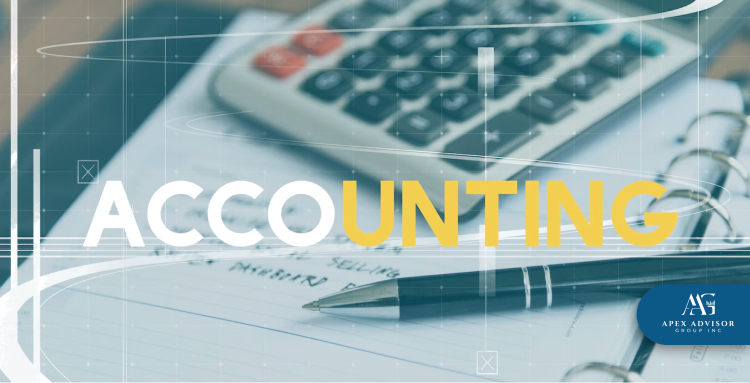
(1) Method of Accounting
There are two main ways businesses keep track of their income and expenses: the accrual method and the cash method.
Accrual Method:
This is like a diary where you write down everything you earn and spend, even if you don't actually get or pay the money right away. For example, if you sell a cake on credit, you'd record the income even though the customer hasn't paid yet. If you buy supplies on credit, you'd record the expense even though you haven't paid the bill yet.
Cash Method:
This is like a piggy bank where you only count the money you actually have. You record income when you get paid and expenses when you pay a bill. So, if you sell a cake on credit, you wouldn't record the income until the customer pays. And if you buy supplies on credit, you wouldn't record the expense until you pay the bill.
The best option ?
The method you use can affect how you handle bad debt write-offs. If you're using the accrual method, you might need to set aside some money in a reserve to cover potential bad debts. If you're using the cash method, you can usually write off bad debts in the year they become uncollectible.
(2) Documentation
When you write off a bad debt, you'll need to provide proof that you tried your best to collect the money. This is called documentation.
Evidence of Collection Efforts: This could include:
Copies of letters you sent to the customer
Records of phone calls you made
Emails or text messages you sent
Any legal actions you took, such as filing a lawsuit
Reason for Write-Off: You'll also need to explain why you think the debt is uncollectible. This could be because:
The customer declared bankruptcy
The customer has moved and left no forwarding address
The customer has passed away
You've been unable to contact the customer despite repeated attempts
Having this documentation will help you support your claim for a tax deduction.

(3) Timeliness
Generally, you need to write off a bad debt within a reasonable time after it becomes clear that the debt is uncollectible. This means you can't wait years before writing off a debt. If you do, the IRS might not allow you to claim the deduction.
The exact timeframe can vary depending on the circumstances, but it's usually a matter of months or a few years. If you're unsure about the specific time limit, it's a good idea to consult with a tax professional.
(4) Bad Debt Reserve: Accrual Method
The idea behind a bad debt reserve is that it helps you match your expenses with your income. If you expect a certain percentage of your customers to not pay their bills, you can set aside a reserve to cover those losses. This way, you're not showing a profit on your tax return if you actually have losses due to bad debts.
To calculate your bad debt reserve, you'll need to estimate the percentage of your accounts receivable that you expect to become uncollectible. This can be based on your past experience, industry averages, or other factors. Once you've determined the percentage, you can multiply it by your total accounts receivable to get the amount you need to set aside for your reserve.
For example, if you estimate that 2% of your accounts receivable will become uncollectible, and your total accounts receivable is $100,000, you would need to set aside $2,000 for your bad debt reserve.
It's important to note that you can't deduct the entire amount of your bad debt reserve in the year you set it up. Instead, you can deduct the actual bad debts you write off against the reserve. So, if you write off $1,500 in bad debts during the year, you can deduct $1,500 from your reserve. The remaining balance can be carried over to the next year.
[ You May Also Want to Know
2. Can You Write Off Credit Card Debt on Taxes ]

(5) Reporting
Once you've determined the amount of your bad debt write-off, you'll need to report it on your tax return. This is typically done on Schedule D of Form 1040 (or its equivalent for businesses).
On Schedule D, you'll need to provide information about the amount of the write-off, the date the debt becomes uncollectible, and any documentation you have to support your claim.
In addition to Schedule D, you might need to file other forms depending on your specific circumstances. For example, if you're a sole proprietor, you might need to report the write-off on your Schedule C. If you're a corporation, you might need to report it on your Form 1120.
Be Positive…
And remember, patience is a virtue, especially when it comes to dealing with bad debts. It might take some time to collect the money, but don't give up hope. And if things get really tough, don't be afraid to ask for help. A tax professional can guide you through the process and make sure you're doing everything right.
So, next time you're dealing with a customer who's not paying up, don't stress out. Follow the steps we've discussed here. Contact us today to schedule a consultation to help you handle your accounts receivable write-offs efficiently and effectively.

October 14, 2024
Self-Employment Tax Deductions And Calculations -Want to Improve Your Tax Savings Like a Pro?
Have you ever taken the responsibility of managing your own taxes, as a self-employed person? When I first entered the world of freelance business, I was so overwhelmed thinking that my dream finally came true. From now on, I am going to conduct my own business according to my own time and convenience.
But a few days later, I realized that managing my own taxes individually was more complicated than I expected. And I was stuck with a lot of paperwork and complex calculations. At that moment, I was looking for a simpler or less stressful way to manage the taxes. However, when I learned more about the taxation process, I found that managing self-employment tax deductions and calculations is not an easy task. It's not just doing calculations with complex formulas. It's more about figuring out the exact expenses that you can deduct to get relief from tax obligations.
After receiving consultation from popular tax advisors, I discovered some effective strategies to navigate self-employed taxes. After determining the particular deduction that I need to claim, I was able to save a significant portion of money. And now I'm going to share my experience as a self-employed person to help reduce your tax burden.

What exactly is self-employment tax?
Self-employment taxes are a special type of tax approach, applicable to self-employed people. If you are a self-employed individual, you must pay both employee and employer portions of these taxes. Here only social security and healthcare-based taxes are included. If you earn more than 400 dollars, you are liable to pay this tax.
Who is responsible for paying such taxes?
People who work on different projects and handle their clients individually are mainly responsible for paying self-employment taxes. So, what kinds of employment are subject to these taxes?
Those who earn more than 400 dollars by selling online products or by freelancing
Gig workers, who use Uber
Those who are independent contractors and work with a limited number of clients
Business owners
People who earn more than 108.28 dollars from church activities.
Just remember: Those who are unable to pay their self-employment taxes, will receive a CP 2000 Notice.
How are self-employment taxes different from income tax?
Income taxes are paid according to your overall income from all sources. But self-employment taxes are not paid like that. Individuals who are self-employed can manage their own taxes by themselves. They pay such taxes on behalf of their employees as well. That means, self-employed individuals have to pay both employer and employee portions of taxes individually by themselves. To pay the self-employment tax, you have to combine all your earnings from various sources. Then you can calculate the required percentage of taxes from different businesses accordingly. If you manage your self-employment taxes properly, it will have a great impact on your financial plan.
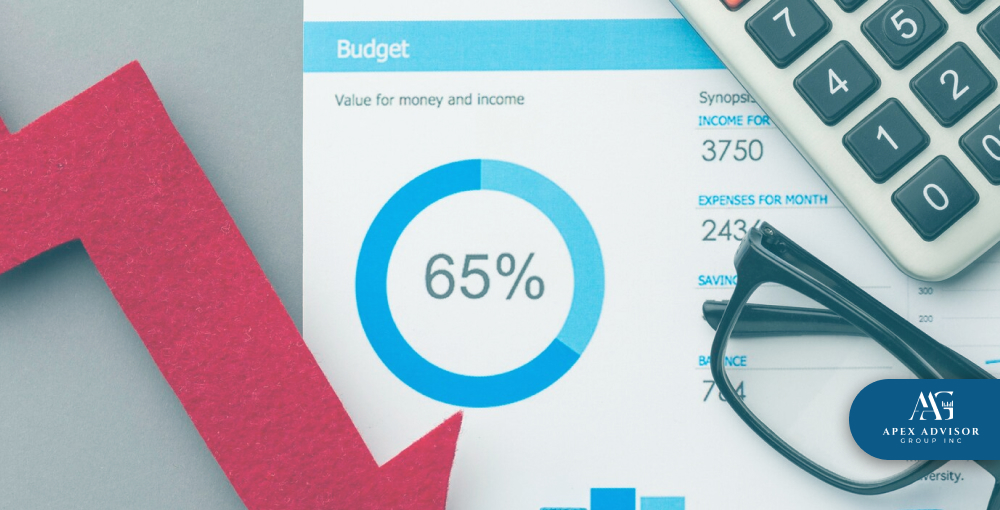
What deductions can you use as a self-employed individual?
Individuals can deduct 50% of their self-employment taxes from their income. They can also deduct some additional expenses to save money. These deductions can help increase your profit.
If you use your home to conduct your business-related activities, you can deduct the cost of your home used. So, you can easily deduct the percentage of cost that is used as your home office. Moreover, you can set the per square foot cost of your home as 5 dollars to 1500 dollars. Then you can calculate the deductible amount accordingly.
As you are using the internet and phone for the purpose of your business, you can deduct tax from them. Don't deduct the “personal use” portion of phone bills and internet. Deduct only the “business use” portion.
Most often, self-employed people need to travel overnight somewhere for business purposes. In that case, they can deduct the cost of transportation, meals and lodging. You are allowed to deduct 50% from the overall meal cost of your travel.
People who are self-employed, but don't qualify for a “spouse plan” can take advantage of health insurance deductions.
Individuals who are allowed to fulfill the income threshold can deduct up to 20% of qualified business income. They can also deduct business equipment and supply costs within the tax year.
If you use advertisements for the purpose of business growth, you can deduct the advertisement cost as well.
You can deduct a significant portion from your self-employed retirement plans.
If you take loans for business purposes, you can deduct the interest from it. Similarly, if you use a credit card for business purchases, you can deduct the credit card interest also.
If you launch any business by yourself, you can deduct the startup cost. In the first year of launching the business, you can deduct up to 5000 dollars.
Self-employed people need some training or education to improve their skills for the particular business. So, they can use the deduction from the education expenses.
If you have any professional membership or publications related to your business, you can use the deduction from their costs.

How can you calculate your self-employment taxes?
Before filing the self-employment tax form, learn to calculate your taxes accurately.
First, find your net earnings by subtracting the deductions from the gross income.
Multiply the net earnings by 92.35% to adjust the earnings.
Introduce a tax rate of 15.3% to your adjusted earnings.
You have to add an extra 0.9% of medicare surtax if your earning crosses certain limits.
For instance: If your net earnings are $60,000, your adjusted earnings are $55410. Here, we have multiplied the net earnings by 92.35%. Now, add 15.3% of the tax to the adjusted earnings to get about $8477. If you don't go beyond the earning limit, no additional surtax is needed.
How can you file self-employment taxes?
You have to file your self-employment taxes properly.
When you need to make payment for people who are not your employees, fill out form 1099 NEC. Use this form for people who provide one-time service to your business, independent contractors, or freelancers. And their payment should be more than 600 dollars. Then you can provide them with such non-employee condensation.
Use Schedule C to show the profit and loss of your business as a single member. However, if you are conducting business with a partner, fill out form 1065.
Fill out form 1044 to assure the government of your earnings, paid taxes, and the deductions you have claimed.

What factors are important to manage your self-employment taxes properly?
Before starting any kind of self-employment activities, you must focus on certain factors.
Take advantage of things that you can claim to deduct based on your eligibility and needs. This will help you decrease your taxable income.
Stay compliant with updated tax laws and try to track all your earnings and expenses in an organized way. This will help you prepare your taxes easily. So, you can use tax software or get professional assistance with the current taxation policy.
If you want to manage your cash flow properly to avoid legal actions, you can plan for quarterly payments. That means you should try to pay your taxes four times a year, not just at the end of the year.
Enclosure
If you understand the strategies of self-employment tax deductions and calculations, you can focus more on growing your business. Moreover, you will get more money to secure your future by investing in other projects.
Most freelancers or small business individuals can not understand which expenses they should deduct to receive tax relief. If you are going through such a complicated process, we can help you by providing professional guidance. Let's simplify the tax situations together. So, don't forget to share this conversation with people who need professional help to manage their taxes by themselves.

October 6, 2024
Wealth Growth with Tax-Efficient Financial Planning- Want More Wealth, But Worried About Taxes?
Many people say that building wealth is easier than keeping it. This is often because high taxes can discourage people from earning more money. The more you earn, the more taxes you usually pay.
When I first started working, I was both excited and nervous. I was happy to earn money but worried about saving and paying taxes. I wanted financial security but wasn't sure how to balance saving with paying less in taxes.
After researching and talking to financial experts, I found some helpful solutions. Smart financial planning can help you save money and reduce your taxes. I'll share what I experienced to help you manage your money better.
How can making financial plans help you?
Financial planning is important in achieving your financial objectives by making the best use of your money. A proper financial plan can help you fulfill your long-term goal. You can send your children to school and enjoy a comfortable retirement. Moreover, you can purchase a bigger house or launch a new business to secure your life.
What are the essential elements of a financial plan?
Financial planning is not similar for everyone. Before setting out your financial goal, you have to figure out certain things. These are considered the essential elements of your financial plan. You have to think about your income, budgeting, saving, and investing money every month according to your requirements. If you want to live comfortably without any financial stress, you have to focus on things like emergency savings and retirement plans. Moreover, strategies for long-term investment ways to reduce taxes and risk management are also some important components for making a financial plan.

How do tax efficient investment is connected with financial planning?
Investing your money tax efficiently can impact a lot in your financial planning. You may receive a better return on your investment. If you invest your money without proper planning, your investment profits will be reduced due to taxes. Then, what is needed to get more investment returns?
Well, the solution to this problem is easy but the procedure is somewhat tricky. However, if you save more money from the beginning, you will definitely see a better outcome over time. And it will increase your total returns. Your investment will grow continuously, no matter whether you pay your taxes properly or not. So, what other advantages will you get from tax-efficient investment?
You can pay less taxes on your investment.
You can easily grow your wealth as small tax savings can help you get more money in the future.
Using smart tax strategies can help you donate more to charity. As a consequence, you will get tax relief.

How can you identify tax-efficient investment opportunities?
You can follow some key steps to identify the investment opportunities that are tax efficient.
There are certain tax-free and tax-deferred accounts available. You can create such savings accounts, in which you don't need to pay tax bills. For instance, 401(k) plans are applicable for retirement savings. Similarly, Health Savings Accounts (HSAs), and Individual Retirement Accounts (IRAs) are such savings that can offer different kinds of tax benefits.
You can easily reduce your taxable distribution by using some tax-efficient mutual funds or Exchange Traded Funds (ETFs).
Investing in municipal bonds can help you remain free from tax liabilities. Municipal bonds are public projects of the local government that help general people in various ways. Investing here might be a good option to reduce investment risks.
If you help needy people or are involved in charitable donations, you will get a significant portion of tax relief.
What factors should you consider for tax-efficient financial planning?
In terms of managing your finances, tax efficiency plays a great role. Before making tax-efficient financial planning, you have to consider certain things like your income source and associated tax implications. Besides that, you must consider some more factors as well.
Tax-smart withdrawal approaches
These approaches can help you withdraw money from your retirement savings in a tax-efficient way. In the beginning of this approach, first, you have to take money from your regular investment account. Then, you have to move into the tax-free accounts for withdrawing money. If you follow this strategy, you can easily increase your retirement savings.
Direct Indexing
Direct indexing means investing in individual stocks and getting benefits This opportunity provides more tax-saving opportunities compared to mutual funds or other options. This is one of the popular tax-saving options among investors because it requires a larger investment. According to this approach, you can get ownership of each stock easily in your account. “Tax-Loss Harvesting” is the main advantage of direct indexing. According to this strategy, you can reduce your tax amounts using the advantage of investment losses.
Getting benefits from education expenses
You can use the 529 plan which offers tax advantages and investment opportunities to support your family. So, it can help you save for education expenses.

How can you focus on your wealth growth?
You can focus on your wealth growth by following some steps.
Assessing your financial situation is very important before making a financial plan. Based on your spending habits and net worth, set your financial goals and plan how to reach them.
Proper planning can help you go closer to your goal. In different stages of your life you can follow different tax planning strategies according to your career goal.
You can minimize tax liability by looking at other options that are beneficial in providing tax advantages.
Staying compliant with updated tax laws is necessary.
How can you achieve your financial goal in a tax-efficient way?
If you want to achieve your financial goal in a tax-efficient way, you need to follow a bigger strategy. Combine tax planning with the overall financial planning. Based on this strategy you should focus on other things that would be highly effective to achieve your financial goal.
Life insurance: The primary earner of a family can apply for life insurance. This can provide protection to your family if something unexpected happens to you. If you apply for a premium account of term life insurance, you will get tax deduction benefits.
Health insurance: You can receive health insurance for all of your family members. If you use the premium account, you will get a significant amount of tax advantages.
Emergency funds: These funds can cover up to six months of emergency expenses needed for any unexpected events. Those who are in medical emergencies or lost their job can take advantage of such emergency funds. The interest you will receive from such funds in your savings account. But you have to pay taxes on those interests. However, you can claim a significant portion of the deduction, which might be really beneficial for you.
Investment: You can invest in education, purchasing a home, or something else when your insurance and emergency funds are ready. You will get tax benefits by using your investment.
Debt management: You can improve your savings by eliminating your debt. To manage the debt, you can reduce other expenses. This will ultimately reduce your tax obligations.

In the end: Step into a secured future without tax liabilities
People who stay committed to their financial goals should seriously follow some strategies that help build their wealth tax efficiently. The right financial planning that is compliant with current tax laws is really important for them. So, start reviewing your financial situation right now and follow the steps that I have explained today.
If you find trouble reviewing your financial condition, leave a comment to reach out for our expert advice. Remember, don't let the fear of higher tax obligations crush your dream of building more wealth.

September 29, 2024
Tax-Free Savings Strategies for Families: Tips to save taxes and maximize profit
What if, free from the burden of taxes, your funds could increase more quickly, make better financial decisions, and help your family achieve their goals? You may increase your financial success in Florida, where there are many financial perks, by taking full use of tax-free savings accounts and smart planning.
Your kids' education can be covered effortlessly, healthcare costs managed easily, and a retirement fund growing steadily all without the tax headaches. With smart planning, you can keep more of what you earn and build a future where your money truly works for you.
Essential Strategies to save taxes and maximize profit in Florida
Florida offers unique advantages, such as no state income tax, which can significantly enhance tax-saving opportunities. Tax planning has a crucial impact on your finances. Here are some key strategies to reduce the tax burden:
1. Tax-Advantaged Accounts
529 College Savings Plans: These accounts allow families to save for education expenses. Contributions grow tax-free, and withdrawals for qualified education expenses are also tax-free.
Coverdell Education Savings Accounts: Similar to 529 plans, these accounts can be used for K-12 and higher education expenses. Distributions for qualified expenses are tax-free, although funds must be distributed by the time the beneficiary turns 30.
Health Savings Accounts (HSAs): If you have a high-deductible health plan, you can contribute to an HSA. Contributions are tax-deductible, and withdrawals for qualified medical expenses are tax-free. This can be a powerful tool for managing healthcare costs while reducing taxable income.
What is the maximum contribution limit for the Florida 529 Savings Plan?
The maximum contribution limit for the Florida 529 Savings Plan is $418,000 per beneficiary. This limit represents the total amount that can be contributed over the life of the account, not an annual limit.
There are no annual contribution limits, but contributions exceeding the annual gift tax exclusion may be subject to gift taxes unless the contributor opts for 5-year gift-tax averaging
2. Capital Gains Strategies
Primary Residence Exclusion: Under the "2 Out of 5 Year Rule," homeowners can exclude up to $250,000 ($500,000 for married couples) of capital gains from the sale of their primary residence if they have lived there for at least two of the last five years. If you are planning to sell some wealth for example a home, then you can save up some tax here.
1031 Exchange: This strategy lets real estate investors delay paying capital gains taxes by using the money from selling one property to buy another similar property. It’s especially helpful for families who want to upgrade or switch their investment properties without having to pay taxes right away.
3. Charitable Contributions
Charitable Remainder Trusts (CRUTs): Families can transfer appreciated assets ( The increased value of assets over time) into a CRUT, which allows them to receive a charitable income tax deduction while deferring capital gains taxes. This strategy not only aids in tax savings but also supports charitable causes.
Conservation Easements: If you agree to restrict the use of land for conservation purposes, families can receive significant tax deductions. This can be smart move for those with large land holdings looking to minimize tax liabilities while contributing to environmental preservation.

Some Queries to Understand the Tax-Saving Landscape:
Why is maximizing retirement contributions particularly beneficial for families in Florida?
Contributing to retirement accounts like a 401(k) or IRA can lower taxable income. In Florida, this can be particularly effective since there is no state tax on retirement withdrawals.
How can using a Flexible Spending Account (FSA) reduce your taxable income?
If there is an offer by an employer, families can use FSAs to set aside pre-tax dollars for medical and dependent care expenses, reducing their taxable income;
What are the tax advantages of investing in municipal bonds issued in Florida?
Interest earned on municipal bonds is typically exempt from federal taxes, and if you invest in bonds issued in Florida, they may also be exempt from state taxes. This can provide a steady income stream without increasing tax liabilities

How does a tax-free savings account help to save tax?
Tax-free accounts have huge advantages, by this families in Florida can get a handle on their finances and make the most out of their savings. These accounts are designed to help you save for key expenses like education, healthcare, and other important needs without the added burden of taxes eating into your savings.
Whether you’re planning for your child’s college tuition, managing healthcare costs, or setting aside money for future needs, these accounts offer a smart and effective way to ensure your money works harder for you and your family. Many people use debts to lower their tax liabilities.
Best tax-free savings accounts for families
If you utilize these tax-free savings accounts, your family can effectively manage finances and maximize savings for education, healthcare, and other essential expenses. Here are some of the best options:
1. Florida 529 College Savings Plan
The Florida 529 College Savings Plan is a flexible and tax-free way to save for education expenses. Contributions grow tax-free, and withdrawals for qualified education expenses, including K-12 tuition and higher education costs, are also tax-free.
Although contributions are not deductible on Florida state taxes, the overall tax benefits make it a strong option for families planning for education costs.
2. Coverdell Education Savings Account (ESA)
The Coverdell ESA allows families to save for education expenses, including K-12 and college costs. While contributions are not tax-deductible, the earnings grow tax-free, and withdrawals for qualified expenses are also tax-free. This account is beneficial for families wanting to save for primary and higher education.
3. Health Savings Account (HSA)
For families with high-deductible health plans, an HSA provides a way to save for medical expenses tax-free. Contributions are tax-deductible, and withdrawals for qualified medical expenses are not taxed. This account can help families manage healthcare costs while also reducing their taxable income.
4. Flexible Spending Accounts (FSA)
If offered by an employer, an FSA allows families to set aside pre-tax dollars for medical and dependent care expenses. This can significantly reduce taxable income. Contributions to an FSA are not subject to federal taxes, which can lead to substantial savings for families with ongoing medical or childcare expenses.
5. Youth Savings Accounts
Many credit unions and banks in Florida offer youth savings accounts designed to teach children about saving and financial responsibility. While these accounts may not provide significant tax benefits, they can help families instill good saving habits in their children from a young age.

How hiring a tax attorney can provide ongoing legal support?
Tax laws are constantly evolving, and tax attorneys stay updated on the latest changes. They provide ongoing support and guidance, helping clients adapt their tax strategies to reflect new regulations and opportunities for savings. When you are not updated with the latest tax evolution or find yourself in a blur of confusion you can reach out to us to be your reliable tax advisor.
We analyze clients' financial situations to create personalized tax strategies and consider factors such as income, investments, and business operations to identify opportunities for minimizing tax liabilities and maximizing financial benefits.

September 23, 2024
Solar Panel Incentives in Florida Can Turn Your Sunshine into Savings Because Sunburns are So 2023
Look, I love the sun. I love basking in its rays, pretending I'm a beachside iguana with a cocktail. But lately, the sun's been giving me a bit of the old "friends with benefits" bait-and-switch. It invites me to enjoy its Vitamin D, but the moment I use the AC, my bank account drains faster than a sandcastle destroyed in a hurricane.
So, I started thinking. Like any self-respecting Floridian, I knew there had to be a way to tame this solar beast, harness its power, and turn it into something...profitable. Yep, I’m talking about the solar panels, those shiny rectangles on our neighbor's roof that whisper sweet nothings of energy independence and environmental heroism.
And guess what, Florida? We're sitting on a freakin' goldmine of sunshine. We could be powering our entire state with those little sun-guzzlers, ditching the fossil fuels, and maybe even launching a rocket to Mars fueled by margaritas and solar energy (patent pending).
But before I get carried away with visions of solar-powered Mojito fountains in every backyard, let's talk about the incentives. Because in Florida, the only thing hotter than the sun is the hunt for a good deal.
Understanding Solar Incentives in Florida
Alright, so you've said goodbye to the inflatable flamingo pool float and you're ready to dive into some serious savings with solar power. Welcome to the exciting world of Florida's solar incentives! Get ready for a ride through a galaxy of tax breaks, rebates, and awesome money perks that'll have your wallet dancing the Macarena.
Federal Solar Tax Credit: First up, the granddaddy of them all: the 30% federal solar tax credit. This beauty knocks a whopping 30% off the total cost of your solar panel system. So, if that sparkling new rooftop setup cost you $20,000, Uncle Sam throws you back a cool $6,000! That's like finding a $20 bill in your swimsuit after a dip in the ocean (minus the sand and jellyfish, hopefully).
This credit applies to the entire cost of your system, including the equipment, installation, and even permitting fees. So, the bigger your solar investment, the bigger your potential tax deduction.
Florida Sales Tax Exemption: In Florida, those shiny rectangles on your roof get a free pass on the 6% state sales tax. That's like getting a free scoop of Ben & Jerry's on top of your tax credit sundae! On a $20,000 system, that's another $1,200 saved on your sales tax– enough for a fancy new inverter to turn those sunbeams into sweet, sweet electricity.
Property Tax Exemption: Installing solar panels can bump up your home's worth, but guess what? Florida says the increased value from those panels is exempt from property taxes! That's like finding a buried treasure chest in your backyard (without the pirate ghost, hopefully). Let's say your home value rises by $5,000 thanks to the solar panels. You could save around $150 every year on property taxes – cha-ching.
Net Metering: Remember that excess energy your panels generate? In Florida, you can sell it back to the grid at the retail rate of electricity with a little something called net metering. Let me explain: Your solar panels make power. You take what you need for your place. Anything extra goes back to the grid. The utility company gives you credits for that extra juice, at the same rate you pay for power. These credits chop off some bucks from your monthly bill or might even give you a surplus credit.
Local Incentives: Check out your city or county government website. Look for sections like "sustainability" or "renewable energy" – that's where they stash the good stuff. Give your local utility company a call. They might have neat offers on solar or team up with installers. And don't overlook your neighbors! Have a chat with the folks who've already gone solar. They might have the inside scoop on where to find the best local deals.
With all these incentives in your arsenal, going solar in Florida is like winning the lottery, except you actually have to put in a little effort (but hey, basking in the sun counts as exercise, right?). So, ditch the fossil fuels, embrace the sunshine, and get ready to watch your electric bill do the limbo under the bar (because let's be honest, it's been stuck up there for way too long)

Sunshine Does More Than Fill Your Wallet
Sure, we've talked about fattening your wallet with sunshine savings, but let's face it, money isn't everything. Going solar isn't just about making bank, it's about making a difference. Here's how you become an eco-warrior with a rooftop:
Clean Air, Not Smog Hair: Remember that unsettling feeling when you check your electric bill and see numbers that rival the GDP of a small island nation? Well, with solar, you can finally hit the "pause" button on the fossil fuel orchestra. Using the sun's free power means saying goodbye to the old, dirty energy and saying hello to a better, cleaner tomorrow. Imagine fresh, clean air instead of noisy engines and smoky chimneys everywhere.
Cool Down the Planet, Not Your Temper: Remember those heatwaves that make you want to melt into your couch? Solar helps fight climate change, turning down the Earth's thermostat and giving you a planet less likely to resemble Venus.
Water Woes? Solar Says No: Regular energy sources drink up water like athletes after a marathon, leaving rivers dry, underground water tanks empty, and nature dying for a drink. But solar panels? They're like water-wise rockstars, singing a tune all about saving water. When you choose solar, you're not just taking charge of your own energy; you're part of a team that's looking out for our water. Every bit saved is like a line in a song about a future that's good for the planet.
Numbers That Count, Not Just Greenbacks: Going solar can:
Save you a ton of CO2: Think planting 100 trees, but cooler!
Keep you healthy and wealthy: Cleaner air means fewer lung problems, saving you money on healthcare.
Be a water hero: Conserve thousands of gallons compared to traditional energy.

Making the Switch
So, you've heard the siren song of sunshine, the sweet whispers of savings, and the thunderous applause for environmental heroes. You're ready to ditch the fossil fuel tango and embrace the solar samba! But where do you start? Fear not, fellow sun-worshipper, for this section is your roadmap to solar success.
Gather Your Resources:
Websites are your allies: Dive into the treasure trove of information offered by websites like the Florida Solar Energy Center, the Department of Energy's Office of Energy Efficiency & Renewable Energy, and Solar Energy Industries Association (SEIA). They're your solar guidebooks, packed with tips, incentives, and resources to navigate your journey.
Local knowledge is power: Don't underestimate the wisdom of your local community. Chat with neighbors who've gone solar, ask questions, and learn from their experiences. They've been there, done that, and got the (solar-powered) t-shirt.
Comparison is key: Don't just jump on the first solar panel bandwagon that comes along. Get quotes from multiple installers, compare prices and services, and choose the one that strikes the perfect chord with your needs and budget. Remember, you're the conductor of your solar symphony, so choose your instruments wisely!
Ready to Rumble? Next Steps:
Get Your Sunshine Score: Request a solar assessment from a qualified installer. They'll analyze your roof, energy usage, and local solar potential to create a customized system just for you.
Money Matters: Explore financing options like solar loans, leases, and power purchase agreements. Choose the plan that fits your budget and long-term goals.
Permits and Paperwork: Don't let paperwork dim your solar shine! Your installer will guide you through the permitting process, ensuring your system meets all local regulations.
Once everything's in order, sit back and relax as your solar installer works their magic. Soon, your rooftop will be humming with the sweet melody of clean energy!

So Long, Sunburn Nation, Hello, Solar Serenade
Going solar isn't just about saving money or saving the planet (although those are pretty darn good reasons). It's about proving that even us Floridians, with our questionable tans and love for Publix parking lot puddles, can be eco-warriors in flip-flops. It's about showing the world that sunshine can power more than just our annual sunburn competition.
And remember, if you can't convince your neighbor to go solar, just blast some Barry Manilow on repeat – eventually, they'll beg you to switch to anything else for some peace and quiet. Just kidding (maybe).
Comment below and share your own solar adventures. Maybe you found a hidden incentive in your grandma's attic, or your cat accidentally installed a panel on your roof (hey, stranger things have happened in Florida).

September 14, 2024
Can I add My Girlfriend to My Health insurance? Possible, But There’s a Catch (As Always)
My stomach lurched as I saw the bill: $10,000. My girlfriend had been battling a nasty case of infected lungs, and the hospital fees were enough to make my head spin. We were young, in love, and just starting our lives together. The last thing we needed was a financial crisis looming over our heads.
But her health was more important than anything. I knew I had to find a way to get her the care she needed without falling into a financial abyss. So, I started researching, and what I discovered was shocking. Many couples in our situation, especially those with domestic partners, faced significant challenges when it came to health insurance.
So, I took a deep breath, gathered my courage, and went for it. The next few hours were a whirlwind of phone calls, paperwork, and tense anticipation. Would they accept our documentation? Would they recognize our domestic partnership? Would they finally allow me to add the woman I loved to my health insurance? (Spoiler Alert: I Succeeded!) and Here's How You Can Do It Too!
What Exactly is a Domestic Partner When it Comes to Health Insurance?
A domestic partner for health insurance is someone you're seriously committed to, but not married to. It's like being in a relationship where you share money, your lives are connected, and you both rely on each other, even though you're not officially married.
Why is domestic partner status important?
Lots of employers and some private health plans treat domestic partners just like married couples. So, your girlfriend could get the same health coverage as a spouse. That means she can also use the insurance for things like doctor visits, prescriptions, and other important health services.
What do you need to qualify as a domestic partner?
While the definition of a domestic partner is generally understood, the specific criteria for qualifying vary across different states and insurance providers. Here are some common requirements:
Living together: You and your girlfriend must reside in the same household for a specified period (often 12 months).
Financial interdependence: You must demonstrate financial responsibility for each other, such as shared finances, joint bills, or other forms of economic dependence.
Relationship commitment: It's not just about living together; you've gotta show you're in a serious, long-term relationship.
Proof of relationship: You may need to provide documentation to prove your domestic partnership, such as joint tax returns, shared property ownership, or affidavits from witnesses.
Domestic Partner Registries:
Some states offer a formal registration process for domestic partners. This can simplify the process of proving your relationship and may be required by certain insurance providers.
Remember, the rules for domestic partnerships can be really different depending on where you are and what insurance company you're dealing with. It's smart to talk to your company's HR or your insurance provider to get the right info about what they need for you to qualify.

Does Your Employer Offer Domestic Partner Coverage?
First, find out if your job's health insurance covers domestic partners. You can check your benefits booklet at work or just ask your HR team. They'll know if they include coverage for partners like yours.
What do you need to do to qualify?
If your job does cover domestic partners, you'll have to check if both you and your girlfriend meet their rules. Here are the usual things they might ask for:
Proof of domestic partnership: You'll likely need to provide documents demonstrating your relationship, such as:
Joint tax returns
Shared lease agreement or property ownership documents
Affidavits from witnesses
Domestic partnership registration certificate (if applicable in your state)
Length of relationship: Many plans require a minimum cohabitation period, often 12 months, to qualify for domestic partner coverage.
Sharing money responsibilities: like having a joint bank account or paying bills together. They might want proof of this, like bills in both your names or other documents.
How can you add your girlfriend to your workplace health plan?
After you make sure you qualify, you gotta start the process by talking to HR or your insurance people. They'll give you forms to fill out and tell you what to do. Here's what it usually involves:
Filling out the forms they give you.
Giving them the papers they need, like proof of your relationship.
Picking how much coverage you want.
Scheduling a meeting with a benefits counselor (if you want).
Will it cost you extra?
Remember, if you add your girlfriend to the insurance, your monthly payment will go up. How much more you pay depends on how much coverage you want and how healthy your girlfriend is and how old she is. So, when you decide, make sure you think about these extra costs.

Do Individual Plans Offer Domestic Partner Coverage?
Not every private health plan for individuals covers domestic partners. So, you gotta look around and compare different plans. Find one that understands your relationship and gives you what you need.
What are the requirements to get your girlfriend on your individual plan?
What you might need to get your girlfriend on your individual plan is kind of like what's needed for work plans:
Show you're together, like shared tax papers, bills in both names, or a partnership certificate if your state has it.
Usually, you've gotta live together for at least a year or two.
Prove you both handle money together.
Some plans might not cover health issues your girlfriend had before joining the plan.
How much might it cost?
Here's an example of how much it might cost to add your girlfriend to your individual health insurance plan:
Your monthly premium: $200
Girlfriend's age: 28
Girlfriend's health status: Healthy, no pre-existing conditions
Plan: Silver PPO
Location: California
Based on these factors, you might expect to see an increase of $250-$350 per month to your premium when you add your girlfriend to your plan. This would bring your total monthly cost to $450-$550.
Where can you find these individual plans?
You can find individual health insurance plans through:
Health insurance marketplaces: These state-run marketplaces offer a variety of plans from different insurers, allowing you to easily compare and choose the best option.
Directly from insurance companies: You can visit the websites of individual insurance companies and explore their plans and qualifications.
Health insurance brokers: These licensed professionals can help you compare plans and find the best coverage for your needs.

Are There Any Other Options Besides Adding Her to Your Plan?
Wanting to put your girlfriend on your health insurance is a great idea, but sometimes it might not work out. Maybe it's too expensive, or there are rules that make it hard to do. But don't worry! There are other ways for your girlfriend to get the healthcare she needs.
1. Medicaid:
Medicaid, a government-sponsored health insurance program for low-income individuals and families. If your girlfriend falls within the income eligibility criteria, this could be a viable option to obtain comprehensive health coverage.
2. COBRA:
The Consolidated Omnibus Budget Reconciliation Act (COBRA) allows individuals who lose their employer-sponsored health insurance to continue their coverage for a limited period. If your girlfriend recently lost her job and her previous employer offered domestic partner coverage, COBRA might be a temporary solution.
4. Healthcare Sharing Ministries:
These faith-based organizations offer a cost-sharing alternative to traditional health insurance. Members contribute monthly to a shared fund used to cover medical expenses for other members.
5. Free Clinics and Community Health Centers:
Lots of neighborhoods have clinics where people without insurance can go for little or no money. These places are great for basic healthcare and stopping problems before they get worse.
6. Public Health Programs:
Several public health programs offer vaccines, screenings, and other essential healthcare services at no cost or reduced costs. These programs vary by location and may require income verification.
Choosing the Right Alternative:
The right choice for your girlfriend depends on things like how much money she makes, how old she is, if she's healthy, and what she really needs. Take your time to look into each choice, see what they cost, what they give you, and if you're unsure, talk to someone who knows a lot about healthcare or money.
Together in Health & Disease
So, can you add your girlfriend to your health insurance? Now you have the tools to answer that question yourself. But no matter what you decide, keep in mind that it's a decision driven by love and a commitment to taking care of each other.
Don't be afraid to compare options, ask questions (comment below), and remember, if you ever feel lost in the maze, Apex Advisors is just a phone call away (especially if you're in Florida!).

September 7, 2024
Does bookkeeping include payroll?
Just like a perfectly balanced dish relies on all the right ingredients, your finances need smooth teamwork between bookkeeping and payroll. Bookkeeping tracks every penny coming in and going out, while payroll makes sure your amazing team gets paid on time and accurately. But if these two aren't working together perfectly, things can get messy. Even a missing ingredient or a wrong measurement is enough for your financial reports to be inaccurate, leading to fines, frustrated employees, and major headaches.
Today we’ll trip over how bookkeeping and payroll work together. It’s not just about adding up numbers, it’s about connecting all the financial details into a clear, accurate, and legally compliant picture that reflects your business’s financial health.
Is bookkeeping the same as payroll?
Payroll and bookkeeping may first appear to be two distinct industries, each with its own set of duties and difficulties. Bookkeeping, which keeps track of every transaction coming into and going out of your company, is the constant heartbeat of your financial operations.
On the other hand, payroll is the complex play of numbers that guarantees your workers receive just compensation, have their taxes appropriately deducted, and have their benefits monitored closely.
How do bookkeeping and payroll meet?
Though these two terms are different, they intersect each other on some points. Payroll is an important part of the whole bookkeeping process. The payroll expenditures, which include wages, taxes, and benefits, must be reported in the company's accounts. This guarantees that the financial accounts accurately represent labor costs.
Tracking payroll records:
Payroll expenditures are categorized in the general ledger as "Wages Expense," "Payroll Taxes," "Employee Benefits," and so on.
Payroll obligations, such as taxes deducted from employee paychecks, are recorded as liabilities until paid to the appropriate authorities.
Payroll entries can have an impact on the company's cash flow, which is monitored through the accounting process.

Decoding the relationship between Bookkeeping and Payroll
Integration of Functions: Bookkeepers are often responsible for recording all financial transactions, which include payroll expenses. This means they manage the flow of funds related to employee wages and benefits, ensuring that all payroll-related transactions are accurately reflected in the business's financial records.
Compliance and Reporting: Payroll processing requires adherence to various tax regulations. Bookkeepers must ensure that all payroll reports are timely and accurate, which includes withholding the correct amounts for taxes and other deductions. This compliance is crucial for avoiding penalties and ensuring proper reporting to the IRS and state agencies.
Separation of Services: While many bookkeepers offer payroll services, some may recommend that businesses use specialized payroll services. This is often due to the complexities involved in payroll management, such as changing tax rates and the need for precise calculations.
How frequently should payroll be done and documented in bookkeeping?
Payroll should be handled and documented regularly to guarantee accuracy and legal compliance. The following are the suggested rates for payroll processing and bookkeeping.
Weekly: payroll processing is common in many firms, particularly in the hospitality and retail industries. This enables regular payments to employees while still maintaining cash flow.
Biweekly: Many employers handle payroll every two weeks. This timetable strikes a compromise between the necessity for frequent payments and administrative efficiency.
Monthly: Some organizations choose monthly payroll processing, which can simplify bookkeeping but may not be as responsive to employee requests for timely payments.
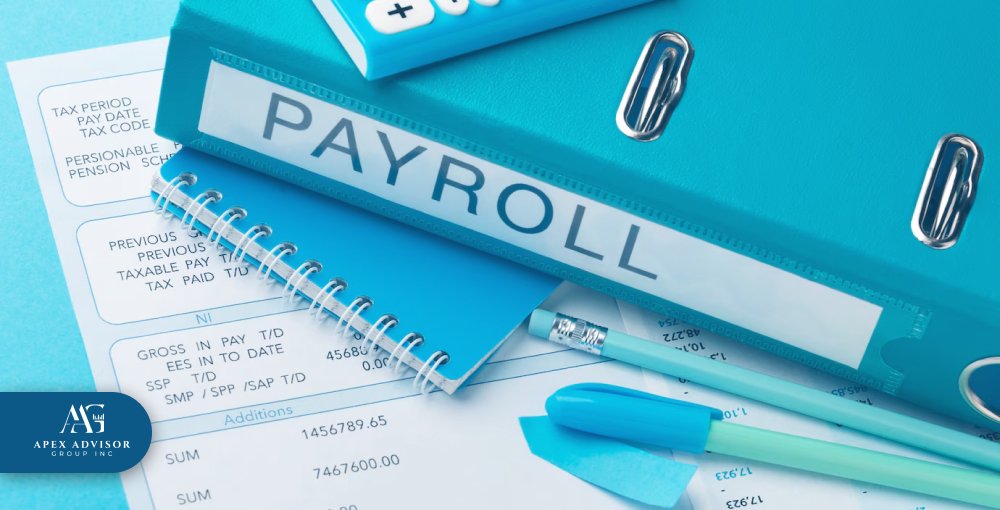
What payroll regulations in Florida do you need to be aware of?
In Florida, bookkeepers must be aware of several specific payroll regulations to ensure compliance and effective payroll management. Here are the key regulations and considerations:
What is minimum wage and overtime?
Minimum Wage: As of now, Florida's minimum wage is $12.00 per hour, set to increase to $13.00 on September 30, 2024. Tipped employees have a minimum wage of $8.98, which will rise to $9.98 on the same date.
Overtime Pay: Florida adheres to federal overtime rules, requiring employers to pay non-exempt employees 1.5 times their regular rate for hours worked over 40 in a workweek. Correct classification of employees as exempt or non-exempt is critical to avoid compliance violations under the Fair Labor Standards Act (FLSA) .
What about payroll Taxes?
State Unemployment Tax: Employers are required to pay state unemployment insurance tax (SUTA) on the first $7,000 of each employee's wages. New employers start at a rate of 2.7%, which can vary based on the employer's experience rating after operating for more than 10 quarters.
Federal Payroll Taxes: In addition to state taxes, employers must withhold federal payroll taxes, including Social Security and Medicare taxes, from employees' wages.
What are recordkeeping requirements?
Employee Records: Employers must maintain accurate records of employee information, including names, addresses, Social Security numbers, hours worked, and wages paid. These records must be kept for at least three years as per the FLSA.
New Hire Reporting: Florida law mandates that employers report newly hired, re-hired, and temporary employees to the state’s New Hire Reporting Center within 20 days of their start date. This is essential for child support enforcement and fraud prevention.
Pay Frequency and Pay Stubs
Pay Frequency: Florida does not have specific laws governing how often employees must be paid, but employers should establish a consistent pay schedule to comply with federal regulations.
Pay Stubs: While Florida does not require employers to provide pay stubs, maintaining detailed records of hours worked and wages paid is essential for compliance with federal law.
Final words
Bookkeeping in Florida often includes handling payroll. Bookkeepers help make sure payroll is part of the business’s overall financial management. However, some businesses choose to outsource payroll to experts because it can be complicated to manage.
That’s why many business owners choose to outsource their accounting to third-party bookkeepers. It’s usually more affordable than the expense of keeping a full accounting team in-house, especially for small businesses.
If you are seeking a third-party service that specializes in accounting, taxation, bookkeeping, and payroll, contact us. Over the years, Apex Advisor helped hundreds of clients operate their businesses more efficiently.

September 1, 2024
Accelerated Income Strategies for Tax Relief-Are They Comply with Tax Laws?
Suppose, you have been working hard and paying your taxes regularly. But you can not save any extra cash to pay off your debts or have a dream vacation. It sounds so frustrating, isn't it? And I am sure you have never thought about keeping more money each year. That could fulfill your dream of starting a big business. But trust me it's possible, even if you are a paid worker or doing any limited earned job.
In most cases, accelerated income may lead to a higher tax burden. However, if you manage your expenses by using some strategy, you can increase your earnings without doing any extra job. And with that extra money, you can purchase your dream house. Or you can pay off your debts in the fastest way. These options for reducing tax burden can improve your accelerated income.
You can improve your finances, whether you are a small business owner, freelancer, paid worker, or someone else. So, we are going to introduce you to certain steps to improve your accelerated income and get relief from taxes.
Are there any risks associated with accelerated income?
Although accelerated income can improve your finances, it may lead to higher taxes on the saved amount. Due to saving more money, your expenses may get higher in the early working periods. You can take loans or debts from any banks or financial support centers. But you must pay the money as expected to avoid getting a risk of debt. If you invest to accelerate your income, there is always a chance of loss. You can not surely say that, you will get expected profits from your return on investment.

What is the impact of accelerated income strategies on retirement?
You can reduce your taxable income by making a retirement plan. If you follow an accelerated income strategy, it may boost your retirement savings. As a consequence, you can save more money in your working days by paying less taxes. It will also lead to earlier retirement than the actual period. However, after getting retired, your tax rates might increase due to getting more savings. So, you have to manage your expenses after retirement with proper planning to avoid loss of finances.
How does accelerating income impact tax relief?
Accelerating income plays a huge role in reducing tax liabilities if you maintain careful planning. It basically means to reduce taxable income. It can help maximize your savings by giving the opportunity to pay your taxes at favorable rates. It's important to keep track of your tax brackets. This will help to know how much money you have to pay taxes on each earned dollar. Tax laws may change any time. If you do not make a long-term plan about your taxes, it might not give any benefit to you. You may suffer in the future with this high amount of taxes. On top of that, you may need to take debts from any financial organization. So, it's better to make a strategic decision from the beginning of your earnings about accelerating income.

What are some common strategies for accelerating income?
You can follow some methods to reduce your tax burden that are recommended by our financial advisors. These strategies might be beneficial for income acceleration and won't violate the tax laws.
Increasing deductions: You can deduct expenses of certain objects such as healthcare and medical bills and interests of mortgage. Contribution to charities can also help reduce your taxes.
Using tax credits: You can utilize certain types of credits like energy efficiency credits, vehicle cleaning, child tax, or education credit to reduce the taxation amount.
Using the loss harvesting approach: You can sell your investments to show that your taxable income is low.
Exercising stock options: After purchasing a stock you can sell the share at the current market price. This will reduce your taxable income.
Using the advantage of deferring: You can take the advantage of time value of money by delaying tax payments as much as possible. You can reinvestment on certain new funds and pay the taxes late showing your investment evidence.
Shifting income to others: You can shift the income to your family members.
Lawfully avoiding taxes: You can manage your finances in such a way that you can legally pay less taxes. So, you can change the structure of your business to reduce the taxable income.
Reducing taxes on capital gains: You can keep a certain amount of money on charitable trusts or other funds. This will help reduce your taxes on capital gains.
Using a disguising approach: According to this approach, you have to convert your income into such forms that can reduce the tax rates.
While using these strategies you have to submit certain records to the government to implement these methods. You must gather some authentic documents of your earnings, expenses, investment records, and taxation forms.
How can you accelerate the income from installment sales?
If you sell your property or anything with installment, you can follow a trick to pay less taxes. Property taxes are not similar in every state. Suppose, you agreed to get your payment multiple times after selling your property. So, you have to pay your taxes each time you receive your payment. However, you can choose to “opt-out” from this rule. In this method, you can report the complete profit from the sale in the year you have sold the property. You must report the whole profit even if you have not received the full payments yet. This way, your income will be accelerated and you won't have to pay taxes multiple times for these sales.

What strategies do high-income earners follow to reduce tax?
High-income earners have various ways to reduce their taxes. They must stay updated about the current taxation laws. This will help them avoid any financial loss. They must increase their standard deduction opportunities and reduce their tax rates.
If you have a large business, you can bring some of your family members to contribute to significant operations. This may reduce your tax liabilities.
If you are an individual taxpayer, you must understand which tax breaks and credits are suitable for you.
If you are a small to medium business owner, you can take the advantage of “Qualified Business Income Deduction” (QBI) strategy. In this way, your amount of taxation will be reduced up to twenty percent. Whether you own a business by yourself or with partners, you will get this opportunity. If your taxable income falls below 1 lac and 82 thousand dollars, you will be eligible for QBI. However, in the case of a collaborative business, the eligibility criteria are different. In that case, your taxable income must be below 3 lac and 64 thousand dollars.
From the beginning of your business, you can use any tax planning tools to calculate your tax rates carefully. There are certain mobile apps like AgileLaw, Tax2win, and Corvee Tax Planning. These tools are used in professional tax preparation and increasing tax savings.
Concluding thoughts
Most of us might have a dream of investing our hard-earned money to get a profitable income. But we can not think of anything about it, due to paying a lot in taxes. Using accelerated income strategies to get tax breaks might be complicated, but it can change your financial future. Taxes are a fact of life. But it can not control the whole adventure. You can choose your own way to handle the money.
If you ever felt burdened by taxes on your investment, share your thoughts and queries with us. Our expert financial advisors are always available to guide you based on your needs. Let's make a platform where everyone can learn and grow.

August 28, 2024
Tax Implications of Business Equipment Purchase- Are you paying Too Much for Business Equipment?
Investing in tools is easy, justifying the cost is the challenge. And then there's taxes on top of it all, which nobody really looks forward to paying. When I launched my business last year, acquiring the necessary equipment was my top priority. I was convinced that high quality tools were essential for the company's success, so I allocated a portion of my startup funds to purchase essential equipment.
As my business grew, I realized the need for advanced equipment and automation to boost productivity. The idea of upgrading my production facility with advanced machinery was appealing, but the potential tax implications were a major concern. The additional financial burden essentially gave me a pause.
To gain a clearer understanding of the situation, I consulted with my friend who is a reputable financial advisor in my city. Our discussions provided valuable insights into the tax ramifications of purchasing business equipment. And I can't wait to tell you all about it.

How does using business equipment for personal use impact taxes?
The Internal Revenue Service of the US (IRS) requires proof to ensure the purchases are only for business purposes. If you use the purchased items for personal use, you are not allowed to pay taxes from business income.
How are business equipment different from business supplies?
Business equipment is not similar to business supply, but most people are confused about these two terms. Business supplies are objects that are used very quickly, usually within a year. These items do not last longer. Certain office supplies like A4 size papers, printer ink, notebooks, envelopes, etc are considered business supplies.
On the flip side, long-lasting objects like typewriters, computers, machinery, and furniture are examples of business equipment. The cost of short-term assets or business supplies is deducted from the business income and tax return over the year. However, the taxation policy for business equipment is different from business supplies. Here, the expenses are divided over the years the equipment is used. You don't need to count the cost all at once.
So, how can you define “depreciation” and “expensing” for equipment and supply?
The term “expensing” is basically related to business supply. You have to subtract the cost of these expenses from the same year you purchase them because you may use them up within a year.
Similarly, the term “depreciation” is related to business equipment. Since you have purchased something expensive for your business, you need to divide the expenses over several years. As you can use the business equipment for many years, you don't have to pay the entire purchasing tax at once.

What is the impact of the de minimis safe harbor rule on business equipment taxes?
In the case of business equipment taxation, the “de minimis safe harbor” rule is used to calculate actual deductions. The business is allowed to deduct the entire equipment cost when the price of each business equipment is not more than 5000 dollars. To receive such benefits, you must have an applicable financial statement. But if you do not have any authentic financial statement, you will get a deduction of up to 2500 dollars on each item. This deduction is taken on the year you purchase the items. The businesses have to inform the IRS about their tax return as they want to deduct some money.
Why is timing important for tax calculation on equipment purchases?
Timing is very important in calculating taxes for equipment purchases. You can claim taxes any time during the tax year but you can follow a trick to save more money on taxes. If you purchase the equipment at the end of the year, you have to pay less taxes. Because the taxes on business equipment depend on the use of the particular object. Purchasing equipment at the end of the year indicates that you have used it relatively little.
What tax benefits can you get from business equipment purchasing?
You can save a good percentage of money while paying taxes on business equipment if you follow some strategy.
Impact of depreciation on equipment
If you purchase any equipment, each year you can claim a certain portion of the cost as a business expense. As a consequence, your taxable income will be reduced.
Bonus on depreciation
When you purchase any equipment that has more than a year of lifespan, this will be considered a capital asset. The tax deduction from this type of equipment is considered “depreciation”. According to the rule of section 179, you will get special benefits on your equipment purchase. If you purchase equipment, you will get a bonus on depreciation in the first year of purchasing this equipment.
Enhancement of cash flow
Cash flow is increased when tax liability is reduced through depreciation.
Capital gains and loses
Taxes on capital gains and losses are treated differently than the regular business Income taxes. If you sell your business equipment and can make a profit, it is considered a capital gain. The rate of taxes on capital gains is calculated based on the duration of your ownership before selling the equipment. And the rate of capital gain taxes is not more than 15%. But if you can not make enough profit, then you don't have to pay any tax on your capital losses.
Special Tip: You can use your capital loss to reduce your other capital gain taxes that you need to pay. Ultimately, your overall tax bill will be reduced.
Operations improvement
Due to purchasing new equipment, the operation will be easier and more effective. As a result, you will get more revenue.
Enjoining technological advancement
You can use the latest equipment, which can help you stay updated with technological advancement. It can also help you keep the tax-related documentation and records properly to receive tax benefits.

How can you decide whether to lease or purchase the equipment?
The decision is mainly dependent on the long-term objective of the business and the cash flow or lifespan of the equipment. If you can not decide whether to lease or purchase the equipment, you have to consider certain things carefully.
If you want to purchase equipment for the purpose of long-term use, then you will get a significant deduction on taxes. But if you don't bother about the lifespan of the equipment, rather you want to keep the object up to date, it's better to lease the equipment.
If you purchase the equipment, you have to allocate some money to accomplish the maintenance cost of the particular equipment. However, leasing the equipment will provide you with this maintenance facility. So, if you want to bypass this additional maintenance cost, you can lease the equipment instead of purchasing it. However, you will get enough tax deductions if you bear the maintenance cost through purchasing the equipment.
Those who can not make this decision due to being unsure about their tax situation can consult with a tax professional. Moreover, they can receive updated information about tax laws from the National Association of Tax Professionals.
If you do not purchase the equipment, you can use the latest versions of this particular equipment one by one. As a consequence, you will get variation in the operation. After trying multiple versions of a particular equipment, you can purchase the perfect one later, according to your needs.
Enclosure
Before investing money in starting a business and purchasing the equipment, it's crucial to understand the tax implications clearly. This will help you save more money and maximize your investment by keeping your business on the correct track. Today, we have broken down the tax implications on equipment purchases to avoid the complexities of deduction and depreciation.
So, share this conversation with people who are planning to start a business. If you already experienced the tax implications without having proper planning before making investments, share your story with us. Let's continue the conversation in the comments section.

August 22, 2024
Tax Implications of Co Signing a Mortgage Has A Trap You Won't See Coming
Remember the nervous flutter in your stomach before lending your car to a teenager? Imagine multiplying that anxiety tenfold. That's what co-signing a mortgage felt like for me. Sure, I wanted to help my only nephew, but the weight of potential tax consequences loomed large. Was I unknowingly stepping into a financial landmine?
Turns out, co-signing a mortgage isn't straightforward. There are hidden tax implications everywhere. Did you know you might get hit with gift taxes on the down payment or suddenly face capital gains? It's mind-boggling. If you're thinking about doing this generous thing, trust me, you're in a big club.
The tax landscape for co-signers is riddled with twists and turns, and getting lost can be costly. Because, co-signing might be a noble gesture, but facing the taxman's wrath should never be part of the package. So settle in, and let's explore the tax implications of co-signing a mortgage together.
Direct Tax Impact
So, you've decided to step in as a co-signer, ready to cheer on the primary borrower as they waltz towards their dream home. Fantastic! But before you clink champagne glasses, let's talk taxes. Unlike the borrower, your co-signing status throws a bit of a wrench in the usual tax deductions game. here's where things get interesting:
No Tax Breaks for the Generous Soul
Unlike borrowers who reap the sweet rewards of mortgage interest and property tax deductions, co-signers are left empty-handed at the tax party. This means you won't get to deduct any portion of the loan payments or property taxes on your own return, even though you're on the hook if the primary borrower stumbles. Think of it as the "co-signer consolation prize" – emotional satisfaction, but no tax relief.
The Gift Tax Tightrope
Remember that down payment helping to secure the deal? If you're contributing more than the IRS's annual gift exclusion limit (currently $17,000 per person in 2024), brace yourself for the "gift tax." That means Uncle Sam might want a slice of your generosity. So, unless you're planning a bona fide loan with a signed agreement and repayment terms, keep those contributions within the limit to avoid unwelcome tax surprises.
Capital Gains Conundrum
Now, let's fast forward to the happy day the property gets sold. As a co-signer, you might be considered a co-owner (especially if you have legal title), which means the property's appreciation could land you in the capital gains zone. Ouch! But wait, there's a glimmer of hope: the principal residence exemption. If the primary borrower lives there as their primary residence for at least two of the past five years, you might be exempt from this tax bite. Whew!

Indirect Tax Impact
Co-signing might be a selfless act, but its ripples can extend far beyond the initial mortgage agreement. Let's peek into the realm of indirect tax impacts, where your generous gesture could influence your own financial standing:
Credit Score Shuffle
Remember that pristine credit score you've worked so hard for? Co-signing can introduce a little shuffle in its rhythm. The loan amount gets added to your debt-to-income ratio, which can ding your credit score. Think of it as adding another weight to your financial backpack – the heavier it gets, the lower your score might dip. This can impact your ability to secure loans for yourself in the future, so proceed with caution!
Debt-to-Income Dilemma
Speaking of backpacks, let's talk about the one filled with your existing debts. Adding the co-signed mortgage to the mix inflates your debt-to-income ratio even further. This ratio is like a financial gatekeeper, determining your eligibility for future loans like car loans or credit cards. Lenders generally prefer ratios below 43%, so exceeding that threshold might make them hesitant to open their doors to you. Remember, financial stability is key, and co-signing should never jeopardize your own financial well-being.
Estate Planning Puzzle
If you end up being considered a co-owner due to legal title, the property becomes part of your estate planning equation. This can get complex, impacting how assets are distributed after your passing. Consulting a a financial advisor to ensure your estate plan reflects your wishes is crucial in this scenario.
Legal Liabilities Lurk
Let's be realistic, sometimes things don't go as planned. If the primary borrower defaults on the mortgage, guess who becomes potentially liable? Yep, you, the co-signer. This could lead to legal action against you, including foreclosure proceedings on your own assets. Weighing this potential burden before co-signing is essential.

When to Hit the Brakes on Co signing
Before putting your name on the dotted line, be mindful of the potential risks. Here are some red flags that might signal it's time to pump the brakes and explore alternative options:
Shaky Credit History: If the borrower has a history of missed payments or defaults, consider it a flashing caution sign. Their financial instability puts your own credit score and financial future at risk.
Debt Overload: Is the borrower already buried in debt? Adding another large loan to their plate could be a recipe for disaster, increasing their chances of default and dragging you down financially.
Unrealistic Finances: Does the borrower's income barely cover their existing expenses? Stretching for a mortgage they can't comfortably afford sets them up for trouble, and ultimately, you could be left holding the bag.
Unclear Communication: Does the borrower dodge your questions or avoid discussing finances openly? Communication is key to any loan agreement, and lack of transparency is a major red flag suggesting potential trouble ahead.
Lack of Commitment: Does the borrower seem nonchalant about the responsibility of a mortgage? Co-signing requires both parties to be fully committed to managing the loan responsibly. Be wary of anyone who appears lax or uninvested.

Creative Solutions for Lending a Hand
Co-signing isn't the only way to show support for someone's homeownership dream. Let's explore alternative avenues that offer a helping hand without tying your finances to their mortgage mast:
The Power of the Gift: Instead of co-signing the loan, consider offering a direct financial gift towards the down payment. This allows you to contribute meaningfully while limiting your own financial risk.
Guarantor's Guardian Role: Act as a guarantor, meaning you'll only be responsible for the debt if the borrower defaults after all other avenues have been exhausted. This provides a safety net for the lender, potentially securing better loan terms for the borrower, but still offers you a degree of separation from the primary financial obligation.
Family Lending Circle: Gather other family members to create an internal lending circle, offering a collective loan with flexible terms and repayment structures tailored to the borrower's situation. This fosters shared responsibility and strengthens family bonds while keeping everyone's finances secure.
Rent-to-Own Arrangement: If the borrower is struggling to qualify for a traditional mortgage, consider offering a rent-to-own arrangement. This allows them to build equity while paying rent, and the potential for future ownership creates a mutually beneficial incentive.
Financial Coaching & Support: Sometimes, the best support is non-financial. Encourage the borrower to seek financial counseling to improve their credit score, budgeting skills, and overall financial literacy. This empowers them to make informed decisions and navigate the mortgage journey independently.

Co signing Is A Balancing Act of Generosity and Caution
Co-signing isn't just about signing a document; it's about weighing risks, exploring alternatives, and prioritizing responsible financial choices. If you're still unsure, seek guidance from professionals. There's no shame in asking for help, and it can save you from financial headaches down the road.
Now, the conversation doesn't end here. Share your experiences, ask questions, and let's keep the discussion flowing in the comments below.

August 8, 2024
Joint Investment Tax Benefits for Couples- Does It Help in Reducing The Separate Taxes?
When you want to save money on taxes, it becomes difficult to keep track of your money. As a team of financial experts, we understand it very well. Because many of our clients come with such problems and ask for necessary support. But do you know that couples can get tax benefits by making investments together?
Many couples are already using this tax-saving approach. And it can make a big difference. Researchers have shown that joint investments are really beneficial in reducing the tax burden for couples. Together, you can save more money and make your tax returns easier while making a joint investment. It's more like a partnership. You have to be aware of some facts before making such an investment decision with your spouse.
So, how joint investment can help you feel less stressed and provide you with some extra benefits?
How can a couple qualify for joint investment tax benefits?
If you file a joint return with your spouse, your combined filing may change the tax bracket into higher or lower. To qualify for joint investment a couple must fulfill certain eligibility criteria.
They must be legally married and need to show evidence of their marriage.
After marriage, couples must change their tax filing status to “married filing jointly”. This will provide them with a higher tax deduction compared to a single filer.
Both spouses must sign the income tax return to change their tax filing status. In the entire process, you have to follow the rules of the Internal Revenue Service (IRS). They have special rules for spouses who can not sign the paper due to absence, illness, or death,
When a couple has an Individual Retirement Account (IRA), they can delay withdrawing the money from it. This way, they can pay less taxes.
So, what changes are needed in your profile after getting married?
If you change your name after your marriage, let the Social Security Administration know about this before you file the tax.
You have to update your W-4 form with your current marital status.

How does combining two investment accounts affect your taxes?
Those who are married, can file their taxes jointly and receive various advantages like childcare benefits, deductions from education loan interest, tax credits for study, etc. So, combining two investment accounts impacts taxation by increasing deductions and reducing tax rates. And when you combine these two investment accounts, you won't need to pay any taxes for it.
Spouses need to combine their accounts with a single name, whether it might be the husband or wife's name. This way they can use a joint account. If any of the couples dies, it will not affect the ownership of the account. The partner who is alive can receive investment benefits or tax reduction opportunities alone.
However, changes in marital status affect joint investment tax benefits. If you get divorced, your previous investment account will not work anymore for you. But if you get married again, you can combine a new account with your current spouse.
What additional tax credits do married couples get?
Since you have to merge your financial accounts, it will impact your eligibility for other tax credits and deductions. So, you will get some additional taxation advantages from the government.
Spouses can transfer their personal assets to each other. As a consequence, they don't have to pay taxes in time and their assets will grow with time.
After marriage, couples can provide unlimited gifts to their partners without paying any taxes. They can provide up to twenty-five million dollars as gifts during their entire lifetime.
The standard tax deduction is increased by almost $2000 dollars for married couples who file jointly.
Spouses who have less income, get more benefits due to combining their accounts. This will lead to a reduction in the tax bracket.
In the case of property ownership, there is a different rule for tax exemption. If you own a house individually, you can avoid paying taxes up to 2 million and a half dollars from the profit. On the other hand, those who have joint ownership of a house can avoid taxes up to 5 million dollars. If you own a property with your spouse, you will get extra discounts on your purchase. You just need to show correct documentation while applying for property ownership jointly with your spouse.
If you share ownership with your spouse, you will get certain special benefits like mortgage payments and property maintenance fees. This will help you to keep track of your investment goal.
Rental income is divided equally after marriage, which can help reduce tax liability.
If you apply for a home loan, your loan approval chances are higher, since your spouse is a co-owner. Lenders consider your joint assets and income thoroughly and do a favorable evaluation. As a result, they start processing your home loan first.

What common errors couples must avoid while making joint investments?
Due to certain mistakes, couples can not benefit from the joint investment. So, before starting a joint investment, they must be aware of some factors.
Creating a combined financial account is very important to conduct joint investments. As a result, spouses can access the account anytime when needed. But problems arise when there is a difference of opinion between the two partners in managing money. So, you must discuss everything about money management and using a combined financial account. Due to merging your account, your investment tax will not increase. It will remain the same as before.
Sometimes your partner might not give you permission to merge the accounts. Since he or she might have a tendency to control the finances individually. So, discuss openly with your partner how you will handle the finances after combining the accounts.
Married couples can not combine their individual retirement accounts to receive tax benefits. They need to keep the retirement accounts with individual names and apply for tax advantages. However, you can plan together and use contribution limits in your separate retirement account. This will help you to enjoy tax breaks.
You need to set some rules. For instance, before spending a big amount both of you may check the account.
Make a long-term plan like who will get the ownership of the account if any of you die.
Check and update your life insurance and retirement account regularly. This will ensure your money will go to the right people if something unexpected happens.
To avoid any kind of misunderstanding, both of you must communicate regularly about money management. This is helpful for making any adjustments, understanding the progress, or sticking to a collaborative financial objective.
Taking technological help is very important to secure the account. So, you can use a banking app by setting alerts. This will help to keep track of spending money from this account.

Ultimately,
Not all couples prefer to make joint investments if they might want to keep things straightforward. But these days, the joint investment tax benefits approach has become so popular. More couples are interested in this to fulfill their financial goal and long-term plans. Knowing the details of this joint investment approach can help you make better decisions about your money. And will definitely help you improve your savings in the future.
If you already have experience with joint investment, feel free to share your stories, lessons, and tips with us. We want to continue our discussion in the comments as well. And don't forget to share our conversation with others who want to make a joint investment for the first time.

July 31, 2024
Home Insurance Can Protect Your Home from Natural Disasters Before It's Too Late
I had this amazing beach house on stilts, my little getaway from the busy city life. But then, things took a turn.
A huge storm showed up out of nowhere. The sky went dark gray, crazy winds shook everything, and rain poured down like it was trying to wash the world away. Those playful waves turned into scary, powerful monsters, slamming into my dream home again and again.
And you know what hit me harder than the storm? The realization that my safety net, my home insurance, might not actually protect me in this mess. The day after the storm, the news confirmed my worries: my lovely coastal spot was now seen as a "high-risk zone" thanks to climate change. Plus, the insurance company said they wouldn't cover natural disasters here anymore.
This blog post isn't just about my personal story. It's about the thousands, the millions of homeowners facing a similar fate. It's about the growing gap between the homes we cherish and the protection we deserve. It's about the fight for a future where climate change doesn't dictate our sense of security.
Why are Insurers Cutting Coverage?
Remember that idyllic beach? It wasn't just the waves that battered my sense of security. It was the cold, hard reality of numbers. For insurance companies, offering coverage in high-risk areas is no longer a sweet beach cocktail, but a bitter financial storm. Here's why:
Climate Change - The Wild Card in the Deck:
Rising costs: Extreme weather events like hurricanes, floods, and wildfires are becoming more frequent and intense. This translates to skyrocketing claims for insurance companies, making covering these areas unsustainable. Imagine a deck stacked with increasingly stormy weather events – each claim another card pulling them closer to bankruptcy.
Unpredictability: Climate change throws a wrench into the carefully calculated risk models insurers rely on. The once-in-a-century flood is now a once-a-decade threat, making it impossible to accurately predict costs and set premiums. It's like playing poker with a shuffled deck, unable to anticipate the next draw.
Shrinking bottom line: With soaring claims and unpredictable risks, offering coverage in high-risk areas becomes a financial tightrope walk. To prevent losses, companies choose to pull out, leaving some homeowners hanging on the edge of a coverage cliff.
Beyond the Headlines - The Numbers Don't Lie:
Hurricane Harvey, a chilling example: Just one storm in 2017 caused $125 billion in insured losses – the costliest hurricane in U.S. history. Multiply that by the increasing frequency of such events, and the picture becomes clear – offering blanket coverage becomes a perilous gamble.
California wildfires: Wildfire losses have quadrupled in the past decade, with 2020 alone witnessing claims exceeding $13 billion. These numbers are a stark reminder of the financial burden on insurance companies and the reason for their retreat.
Flood zones expanding: Rising sea levels and extreme precipitation are expanding flood zones, adding more areas to the "not covered" list. It's like a tidal wave of risk washing over coastal communities, leaving them adrift in a sea of uncertainty.
The Ripple Effect - Beyond Numbers, Human Cost:
These insurance cuts might be mainly about money, but they're hitting people hard. Think about going through a disaster, trying to get back on your feet, and then finding out your insurance won't help you anymore. It's like being left totally exposed, and lots of families are in danger of going broke because of it.

3. What Does This Mean for Homeowners?
When insurance companies stop covering natural disasters, it's like a big wave of not knowing what's going to happen hitting homeowners. But don't worry, we're not alone in feeling this uncertainty. Let's figure this out together and see what it means for you as a homeowner.
Increased Vulnerability:
Exposed to financial ruin: Without coverage for natural disasters, a single storm can wipe out your savings and leave you on the hook for potentially life-altering repair costs. Imagine your dream home, once a symbol of security, transformed into a financial nightmare.
Limited options: Finding alternative insurance in high-risk areas can be a near-impossible feat. Often, the only options come with exorbitant premiums, putting adequate protection out of reach for many homeowners. It's like being stuck on a sinking ship, with the only lifeboats costing a fortune.
Psychological stress: The constant worry about potential disasters and the lack of safety net can take a toll on your mental well-being. Imagine living in constant fear of the next storm, with the security of your home hanging by a thread.
Discrimination and Inequality:
Unequal access to protection: This trend disproportionately affects low-income communities and minorities who are often concentrated in disaster-prone areas. It's like a storm of inequality, leaving vulnerable populations even more exposed to the harsh realities of climate change.
Market failures: The withdrawal of insurers from high-risk zones can lead to market failures, leaving entire communities without adequate coverage.
The need for advocacy: This situation calls for collective action. We need to raise awareness, advocate for fair access to insurance, and demand solutions that protect all homeowners, regardless of their zip code or social standing.
Navigating the Stormy Sea
While the situation is challenging, there are steps you can take to stay afloat:
Review your existing policy: Understand your current coverage and the specific exclusions for natural disasters. Knowledge is your anchor in this storm.
Explore alternative options: Research state-backed insurance programs or private companies specializing in high-risk areas. Every lifeboat counts, even if it's a little rough around the edges.
Mitigation strategies: Invest in preventative measures like storm shutters, flood barriers, and fire-resistant materials. Every sandbag helps reinforce your defenses against the storm.
Remember, you're not alone in this. There are resources and support available to help you weather this storm. By understanding the risks, exploring options, and advocating for change, we can build a more resilient future for our homes and communities.

How Can You Protect Your Home and Finances? Building a Fortress Against the Wind
The winds of change may be howling, but that doesn't mean you have to hunker down in fear. Let's turn the tide and explore practical ways to protect your home and finances from the storm of natural disasters and insurance cuts:
Mitigation - Your First Line of Defense:
Fortify your home: Invest in mitigation strategies like storm shutters, wind-resistant roofing, and flood-proofing measures. These proactive steps can significantly reduce the risk of damage and potentially qualify you for lower insurance premiums.
Embrace fire-smart landscaping: Clear brush, trim overhanging branches, and create firebreaks around your property. Every precaution cuts the fire's path and protects your precious walls from accidental and natural wildfires.
Elevate vulnerable structures: If you live in a flood-prone area, consider raising your electrical panel, appliances, and living quarters above the potential flood level. Every inch higher is a victory over the rising tide.
Prepare an emergency kit: Stock up on non-perishable food, water, first-aid supplies, and essentials like batteries and a radio. Be your own lighthouse in the darkness of power outages.
Insurance - Your Safety Net:
Shop around: Don't settle for the first insurance you find. Compare rates and coverage options from different providers, including state-backed programs and specialized high-risk insurers. Think of it as exploring different routes to safety, ensuring you find the sturdiest bridge to cross the stormy waters.
Understand your policy: Take the time to thoroughly read and understand your insurance policy. Know what's covered, what's excluded, and your deductible amounts. This knowledge is your shield, protecting you from unexpected surprises when the storm hits.
Raise your voice: Advocate for fair and affordable insurance options in your community. Join local groups, contact your elected officials, and raise awareness about the challenges faced by homeowners in high-risk areas. Remember, a united front is a powerful storm against injustice.
Community and Advocacy - Collective Strength:
Connect with your local government: Stay informed about mitigation programs, evacuation plans, and disaster preparedness resources. Together, you're a united front against the storm.
Join community groups: Collaborate with neighbors to share resources, develop evacuation plans, and advocate for fair access to insurance in your area. Every voice adds strength to the wind, pushing for change.
Support policies promoting climate resilience: Lobby for legislation that incentivizes mitigation efforts, strengthens building codes, and expands affordable insurance options. Be the wind of change, shaping a more secure future for all.
Keeping your home and money safe isn't something you do once and forget about. It's a constant thing. If you stay updated, take action before things get bad, and team up with your neighbors, you can make your home stronger against the crazy storms caused by our changing world.
More Insurance Guidance for You:
She's the One (But Will Your Insurance Agree?) The Dos & Don'ts of Adding Your GF to Your Plan

The Future of Home Insurance and Natural Disasters
While the current landscape of home insurance and natural disasters might seem bleak, it's not a story without hope. We need to change how we do things, find new ways to deal with these big problems. Here's a peek at some possible ways to fix things in the future.
Shifting Paradigms:
Rethinking risk models: Insurance companies are exploring ways to adapt their risk models to the realities of climate change. This could involve incorporating real-time data, predictive analytics, and location-specific factors to build more accurate and equitable pricing models.
Parametric insurance: This innovative approach pays claims based on pre-determined triggers like wind speed, rainfall, or earthquake intensity, eliminating the need for traditional claim adjusters. Think of it as an automatic lighthouse, guiding you towards compensation without navigating the fog of bureaucracy.
Public-private partnerships: Collaboration between governments, insurers, and communities can lead to proactive mitigation strategies, early warning systems, and affordable insurance options in high-risk areas. Imagine a united fleet of ships, working together to weather the storm.
Resiliency, the Building Block of the Future:
Community-based solutions: Local initiatives like neighborhood disaster preparedness plans, shared resources, and mutual aid networks can build social resilience and support vulnerable communities.
Sustainable rebuilding: Prioritizing green building materials, renewable energy sources, and flood-resistant infrastructure can create more resilient homes and communities in the long run.
Individual responsibility: As homeowners, we can all play a part by choosing sustainable practices, reducing our environmental footprint, and advocating for climate-friendly policies. Every drop makes a difference in calming the stormy seas.
Weathering the Storm Together
The waves of climate change may be crashing against our shores, but we don't have to surrender to the tide. By understanding the challenges of home insurance cuts, taking proactive steps to protect our homes and finances, and advocating for a more resilient future, we can weather any storm.
This journey isn't just about securing individual homes; it's about building a future where every community, regardless of location or income, can thrive in the face of natural disasters. We need to raise awareness, demand innovative solutions, and hold our leaders accountable for creating a world where homeownership isn't a gamble against the elements.
So, what are you waiting for? Join the conversation! Let's share our experiences, ideas, and resources in the comments below. Share this post with your friends, family, and neighbors. Let's make the winds of change blow in the direction of a more secure and sustainable future for all.

July 28, 2024
Quarterly estimated tax payments for entrepreneurs to Accurately Calculate and Pay Your Estimated Taxes (Even Without a CPA)
Y'all, ever heard that sinking feeling in your gut when tax season rolls around? Like you're knee-deep in spreadsheets, drowning in receipts, and about as clear on the whole "estimated payments" thing as a possum at a polka party? Yeah, me too. But listen, I'm here to tell you this ain't no rodeo we can't wrangle. Especially not for us go-getters, dream chasers, and boot-strappin' entrepreneurs out there. We built our businesses from the ground up, right? So, tackling those quarterly estimated taxes? Piece of cake. Or, at least, it can be.
Think 'bout it like this: Payin' quarterly estimated taxes is puttin' money in your own pocket before anything else. Instead of havin' to fork over one huge chunk in April, you break it down and pay it bit by bit throughout the year. No more rushin' to gather cash on tax day, no more pleadin' with Uncle Sam for a break.
I spent a good while in the business world feeling pretty lost about taxes. But you know what? I'm not too proud to say I needed some help. So, I rolled up my sleeves, learned the ins and outs, and found out how to handle those tax headaches. Now, I'm here to pass on what I've learned to all you hardworking folks. No fancy words, no legal mumbo jumbo—just straight talk (well, maybe with a little Southern drawl thrown in, because that's just who I am).

Who Needs to Pay Quarterly Estimated Taxes ?
Now, before we dive into calculating those payments, let's cut to the chase: who actually needs to be tangoing with these quarterly taxes? It ain't something everyone needs to bother with, so imagine you're at a fair where only specific folks are allowed in to play the estimated tax gig.
First up, the headliners:
Self-employed folks: Yep, if you're your own boss, hustling solo or leading a crew, estimated taxes are likely part of your financial rodeo. This includes freelancers, consultants, independent contractors, gig workers, and the like.
Side hustlers extraordinaire: Got a sweet little passion project on the side that's bringing in some extra green? If you expect to owe $1,000 or more in taxes from your side hustle alone, you're also in the estimated tax club.
Investors with taxable income: Whether you're playing the stock market like a maestro or just dipping your toes into real estate, if you're an Investor with taxable income that isn't subject to automatic withholding, guess what? Estimated taxes are coming to call.
Now, some folks get to skip the carnival altogether:
W-2 wage earners: If you have a trusty old W-2 job with all those nice taxes being taken out paycheck by paycheck, you're generally off the hook for estimated payments. That's because your employer is already playing nice with Uncle Sam on your behalf.
Low-income folks: If you're expecting to owe less than $1,000 in taxes for the year, even after accounting for any withholding, you can breathe a sigh of relief. No estimated taxes for you!

Why Do I, an Entrepreneur, Need to Pay Estimated Taxes?
Lets say you're cruisin' through the year, hustlin' on your business, smashin' those goals, and then... BAM! April 15th rolls around, and suddenly, you realize you owe Uncle Sam a huge pile of cash you didn't expect. That awesome feeling of being your own boss turns into a nerve-wracking tax-time tightrope walk.
That's the tough reality for us entrepreneurs who skip out on quarterly estimated taxes. Unlike folks with regular jobs where taxes get taken out of their paychecks, we gotta cough up our own money throughout the year. It might seem scary but think of it as dodging a financial disaster when tax season hits.
Here's why paying estimated taxes is like wearing a financial parachute:
No April Surprise Party: Remember that last-minute rush for receipts and crazy math in April? Paying estimated taxes lets you spread out what you owe across the year, making payments easier to handle and foresee. It's like putting money aside in advance for future tax bills, so you're never caught off guard by a big surprise in April.
Interest-Free Freedom: Being late with tax payments brings in unwanted guests—interest charges. These pesky fees can grow fast, eating into your hard-earned profits. Estimated taxes keep those interest fees away, letting you keep your money instead of handing it over to the IRS.
Penalty-Proof Peace: Skipping estimated tax payments isn't just about interest; it can also mean penalties. These penalties are a financial slap on the wrist, making tax season even more of a headache. Paying estimated taxes helps you dodge these penalties, staying on the good side of the IRS and keeping your bank account happy.
Budget Bliss: Estimated taxes make budgeting a breeze. Knowing exactly how much you owe each quarter helps you plan your finances better, ensuring you've got enough cash ready for when Uncle Sam comes knockin'. No more juggling bills or diving into emergency funds just because tax time caught you off guard.

How in the World Do I Figure Out How Much to Pay?
Okay, we're diving into the heart of the beast: calculating your estimated tax payments. Don't worry, you don't need a PhD in rocket science (unless you're an entrepreneur making millions selling space tours, in which case, kudos to you!). We'll navigate this together, armed with the mighty Form 1040-ES and a few friendly tips.
Let's break it down step-by-step:
Get your info together: Before you even start fillin' out forms, gather all your financial stuff. That means income statements, expense reports, what you plan to claim as deductions, and any tax credits you might qualify for.
Guess your income: Now, try to predict how much money you'll make for the year. Think about all the ways cash comes in—like business profits, side gigs, investments, and anything else that pads your wallet.
Use those deductions: Remember those cool deductions you collected? Time to make 'em work for you! Take away your business costs, retirement savings, and other deductions from what you think you'll make. This makes your taxable income smaller, getting you closer to your final payment amount.
Look at tax brackets: Here's where it gets a bit tricky. Based on how much money you'll be taxed on, figure out which tax bracket you're in. Keep in mind, the more you make, the higher the bracket, and the more you'll owe in estimated payments.
Calculate your tax liability: Use your tax bracket and the IRS tax tables to calculate your estimated tax liability for the year.
Split it up: Take the total tax you owe for the year and divide it by four. That's the amount you'll be sendin' to Uncle Sam every quarter!

What Are My Options For Paying Up?
Alright, y'all, we've cracked the code on calculations. Now, let's head for the last frontier: sending those estimated payments to Uncle Sam. Let's check out your payment choices and set you on the road to a stress-free tax season.
Electronic Express: Forget paper checks and postal delays! Embrace the 21st century with online payment options like EFTPS (Electronic Federal Tax Payment System) or IRS Direct Pay. They're fast, secure, and save you the hassle of envelopes and stamps. Plus, you can schedule future payments and track your history, making you a tax-paying powerhouse.
Paper Power: Prefer the traditional route? No worries! You can still write a good old-fashioned check and mail it in with a voucher from Form 1040-ES. Just remember to factor in mailing time and avoid last-minute deadlines to dodge those pesky late fees.
Debit/Credit Delight: Feeling fancy? Some banks and tax websites allow you to pay your estimated taxes using debit or credit cards. While it might incur small processing fees, it's a quick and convenient option if you're short on cash or just plain like the digital life.
Payment Plan Possibilities: Life throws curveballs, and sometimes, estimating your income perfectly isn't feasible. If you unexpectedly owe more than your estimated payments, don't panic! The IRS offers various payment plan options to help you spread out your tax burden over time. Just be sure to apply before the deadline to avoid penalties and interest charges.
Payment Reminders for Peace of Mind: Forgetfulness can haunt even the most organized entrepreneurs. To avoid missed deadlines and late fees, set up email or text reminders for your estimated payment due dates. This ensures you're always in the loop and keeps Uncle Sam at bay.
You got this, entrepreneur
Folks, let me tell you, nailing those quarterly estimated taxes ain't a piece of cake. It takes some serious effort, a few tears, and maybe even some late nights wrestling with spreadsheets on a caffeine high. But let me tell you, when you finally figure out those numbers and send off that last payment, it's like a weight lifted off your shoulders.
Remember, fellow entrepreneurs, we're not just building businesses; we're building financial freedom. And a big part of that freedom is handling and understanding our taxes like the savvy money managers we are. So, don't let those estimated payments intimidate you! Take this blog post as your guide, embrace the tips, and go out there and own that tax season like the pro you are.
Now, I ain't no tax guru, but I sure do know a thing or two about hustlin' and making ends meet. So, if you got any questions about these estimated taxes, drop 'em in the comments below! I'm always happy to chat shop with my fellow entrepreneurs, share some war stories, and maybe even learn a thing or two myself.

July 11, 2024
Do Higher Taxes Increase or Reduce Investment? The Love Hate Relationship That Could Make You Rich (or Broke)
Confession time: I have a love-hate relationship with taxes. Like, on one hand, I get it. Roads gotta get paved, schools gotta stay open, and firefighters gotta get paid (heroes, the lot of them). But on the other hand, every time that little notification pops up in my banking app after payday, a tiny part of me shrivels up and dies.
But here's the thing: the whole "taxes vs. investment" debate is way more nuanced than just that tantrum I throw every month. Because the truth is, higher taxes can be like that frenemy with the killer eyeliner: sometimes they make you wanna tear your hair out, but other times, they actually help you glow up.
Think about it. You work hard, you hustle, you build that nest egg, and then Uncle Sam swoops in and takes a big ol' chunk out of it. Ouch. But wait, what if that chunk actually went towards building better infrastructure, attracting top talent to your city, or even funding groundbreaking research that could boost your portfolio tenfold? Suddenly, that tax bill doesn't look so bad anymore, right?
So, the question isn't just "do higher taxes kill our investment?" It's more like, "is this actually helping me put on some financial war paint?" And that is exactly what we're gonna unpack here.
What Exactly Counts as an Investment?
Think of your money's future like a maze full of different ways to invest. Some are safe like wide fields, some are risky like tall mountains, and some are long-term but uncertain. To find your way, think about a few important things:
First, there's risk tolerance; how comfortable you are with the ups and downs of investing. Are you okay with a bumpy ride for potentially higher rewards, or do you prefer slow and steady growth?
Second, there's the potential for return on investment; basically, how much your money can grow. Some investments offer steady but small returns, while others might grow a lot but also come with more risk.
Third, market conditions play a big role. Things like world events, interest rates, and politics can affect how well your investments do. It's hard to predict these changes, but knowing they can happen helps you plan.
Lastly, don't forget about taxes. They can impact how much money you make from your investments. Understanding tax rules can help you make smarter investment choices and keep more of your earnings.

How Taxes and Investments Mix in the Money Pot
Taxes can feel like a hassle, bringing to mind lots of paperwork and the frustration of losing some of your money. But when you're investing, taxes aren't just about taking your cash. They can actually work in two ways, sometimes helping and sometimes making things harder for your finances.
1) Reasons Taxes Might Boost Investments
When taxes are lower, it can feel like a little push, motivating you to invest that money and see it grow
Increased disposable income: With lower taxes, more money stays in your pocket. This can translate to more funds to invest, giving your portfolio a potential boost.
Tax-advantaged investments: Certain investments offer tax breaks or shelters, making them even more attractive. Lower overall tax rates can make these options even more enticing, leading to increased investment in these areas.
Business investment: Lower corporate tax rates can incentivize businesses to reinvest profits, potentially leading to increased hiring, expansion, and ultimately, economic growth.
2) Why Higher Taxes Can Be a Downer
Higher taxes can feel like a heavy boot stomping on your investment dreams, making you hesitant to take that leap.
Reduced returns: Higher taxes, especially on capital gains, can eat into your investment returns, making some ventures less appealing. This can lead to a shift towards safer, lower-risk investments.
Uncertainty and future hikes: The fear of future tax increases can create uncertainty, discouraging investors from committing to long-term plans and potentially leading to a slowdown in investment activity.
Competition for resources: Increased government spending financed by higher taxes can compete with private investment for resources, potentially hindering economic growth and limiting investment opportunities.
The Takeaway is A Complex Melody
So, do higher taxes increase or reduce investment? The answer unfortunately isn't a simple yes or no. It's a complex melody with both upbeat and downbeat notes, influenced by a range of factors beyond just tax rates. What matters most is understanding the different rhythms, recognizing your own risk tolerance and investment goals, and making informed decisions that fit your financial dance.

Thinking Deeper About Taxes and Investments
The argument between those who support taxes for investments and those who oppose them can feel like a lively debate in a cozy, intense setting. People have their strong opinions, but what does the actual evidence say?
The Scholarly Shuffle
Economists have waltzed with this topic for decades, their research echoing a cacophony of findings. Some studies suggest a negative correlation between taxes and investment, highlighting how higher tax rates can reduce disposable income and dampen investor confidence. Others argue that specific tax incentives like IRAs and 401(k)s can stimulate certain types of investment. Still, others claim the impact is ambiguous, influenced by a constellation of factors beyond just tax rates.
Case Studies: Dancing on Different Floors
Let's take a trip around the world, observing how real-world tax tangibles play out. Countries like Hong Kong, with its low corporate tax, boast vibrant entrepreneurial ecosystems. On the other hand, economies like Denmark, known for its high taxes, also enjoy robust growth and high levels of social investment. This suggests that other factors like fiscal stability, regulatory frameworks, and government spending might influence investment as much as tax rates alone.
The Numbers Don't Lie, But They Never Tell the Whole Story
Even the best studies have their challenges. Economic info can be messy, and figuring out how much taxes really affect things compared to everything else is like trying to separate a bunch of tangled spaghetti. Plus, how taxes influence stuff can change based on what you're investing in, who's doing the investing, and how the economy is doing overall.
So, Did We Find the Answer?
The facts show it's not a simple dance; taxes can be helpful or hold things back when it comes to investing. It all depends on a bunch of stuff. The important thing? Don't just think about taxes when you're deciding where to put your money. Think about what you want, how much risk you're okay with, and how the economy's doing before making big investment moves.

Thinking Deeper About Taxes and Investments
We've talked about the theories, looked at the studies, and checked out actual situations. But the relationship between taxes and investing isn't just about "higher taxes = less investment" or "lower taxes = more investment." Let's look beyond the binary and explore some crucial nuances and considerations:
1. Tax Structure Matters
It's not just about the overall tax rate, but how different types of income and investment are taxed. A progressive tax system that burdens wealthier individuals more might not significantly deter their investment decisions, while higher capital gains taxes might discourage long-term investment in the stock market. Similarly, policies that incentivize specific investments, like clean energy or infrastructure, can steer capital towards desired sectors.
2. Fairness and Certainty Play a Role
Perception matters. A fair and predictable tax system, even with higher rates, can instill confidence and encourage long-term investment. Conversely, frequent tax changes or perceived unfairness can create uncertainty, leading investors to adopt "wait-and-see" approaches or prioritize short-term gains.
3. It's Not Just About Taxes
Investment decisions are influenced by a whole orchestra of factors. Economic stability, infrastructure quality, regulatory environment, access to capital, and even political climate all play significant roles. To truly understand investment trends, we need to consider the entire economic and political ecosystem, not just the tax melody.
4. Policy Alternatives Exist
Instead of solely focusing on tax rates, governments can leverage other policy tools to promote desired investment patterns. Grants, subsidies, loan guarantees, and targeted infrastructure spending can all direct capital towards specific sectors or encourage long-term investment without solely relying on tax adjustments.
5. Context Matters
Taxes affect investment differently based on where you are. A place that's still growing and has lots of informal businesses might respond to tax changes in a different way than a well-developed country with lots of investment options. Making tax rules that fit each place's needs and issues is super important for them to actually work.
No Easy Answers, Just a Lot to Consider
Alright, we've gone through the tricky moves of the tax-investment dance. We've talked about how lower tax rates can be tempting while higher ones are a bit of a downer. We've looked at studies and real-life stuff, realizing this isn't a simple dance routine.
But here's the deal: among all the numbers and arguments, one thing is super clear: you're in charge of your financial future. Taxes are there, sure, but they don't control everything. You get to decide how you want to manage your money, the pace you go at, and even the style you do it in (not literally dressing up, unless you're feeling fancy).
Tell me your story! Have you ever felt the taxman step on your investment dreams? Or maybe you've seen how the right tax break can fuel your financial fire? Share your experiences, your doubts, your aha moments! Let's build a community where knowledge flows like champagne at a Gatsby party.

July 4, 2024
Consolidating Child Related Benefits in Taxes, Is Your Child Missing Out on FREE Money?
My brain practically melted last year trying to decipher the difference between the EITC and the dependent care credit. Seriously, who invented these acronyms? I just want to buy my kid dinosaur slippers and not feel like I'm solving the Pythagorean theorem! That's when it hit me: wouldn't it be amazing if all these child-related benefits were, you know, in one place? No more hunting through forms, deciphering fine print, or missing out on benefits because of confusing rules.
Consolidating child-related benefits in taxes is all about a single, streamlined system that makes supporting your family easier, not harder. A monthly boost for diapers and dance classes (or whatever your little chaos agents need!). A tax break that feels like a high-five for surviving another day of tantrums and bedtime battles. Sounds too good to be true, right ?
So, are you ready to simplify your tax life and support your family more effectively? Then let's do this!
What's Going on with Benefits for Kids Right Now?
Think about digging into a super messy toy box filled with all kinds of different building blocks. That's a bit like how our system looks right now. Here's what we've got:
The Dependent Care Credit: A deduction for childcare expenses, helping working parents stay afloat.
The Child Tax Credit: A direct credit per child, intended to reduce child poverty.
The Earned Income Tax Credit (EITC): A refundable credit for low- and moderate-income earners, with an additional boost for families with children.
Dependent Exemptions: A reduction in taxable income for each dependent, slightly lowering tax bills.
A maze of education-related deductions and credits: 529 plans, student loan interest deductions, and more, each with its own set of rules and eligibility requirements.
Phew, that's just a sampling! Each program has its own eligibility criteria, income limits, and claiming procedures. It's enough to make you long for the simplicity of alphabet blocks.
This tangled web of benefits creates several headaches:
Complexity: Deciphering which credit applies to you, calculating deductions, and ensuring you claim everything can be a monumental task.
Overlaps and Gaps: Some benefits overlap, while others leave crucial gaps in family support.
Missed Opportunities: Many families, especially low-income households, miss out on benefits due to lack of awareness, complex paperwork, or eligibility restrictions.

Why Should We Mix All These Benefits Together?
Picture a world where getting help for your kids through taxes isn't this big mess you have to figure out. Instead, it's straightforward and easy to understand, helping your family without all the headaches. That's what consolidation could do. Let's check out why it's such a good idea to simplify this whole system:
Accessibility and Utilization:
If everything's put together in one system with simple rules on who can get help and how to ask for it, families can get what they deserve without all the confusion. No more trying to figure out weird short forms or drowning in piles of boring paperwork. This could mean more kids getting the help they should be getting, which is really important.
Reduced Administrative Burden:
Think about how both taxpayers and government officials would feel — big sighs of relief! If we make things simpler, there'd be way less paperwork, fewer mistakes, and we'd spend less money on boring administrative stuff. That means we could use all that saved time and money to actually make the help we give work way better for everyone.
Targeting Resources Effectively:
With a consolidated system, policymakers could design benefits with better targeting mechanisms. This basically means making sure the help goes to families who really need it the most. It's about being fair and smart with how we use the government's money to help people out.
Promoting Equity and Fairness:
The current patchwork system can disadvantage certain families based on income, family structure, or employment status. Consolidation offers the opportunity to create a fairer system where all children, regardless of their circumstances, have equal access to essential support.
Increased Transparency and Accountability:
A unified system would make it easier for taxpayers and policymakers to understand how child-related benefits are being used and what impact they have. This transparency can lead to better informed policy decisions and greater public trust in the system.
Sure, some might say combining things could make it less flexible or cost the government more money. But if we plan it out carefully and do it right, we can handle those worries. Making it simple, working smart, and aiming help where it's needed most can actually make things better for families and for what taxpayers pay.

What Are Our Options for Making This Happen?
Making child benefits simpler isn't just a far-off dream. There are actually some ways we can do it for real:
Universal Child Allowance: Imagine all families, regardless of income, receiving a regular, non-taxable cash payment for each child. This model, popular in countries like Finland and Canada, promotes equity and simplicity, providing a basic level of support for all children.
Simplified Credit System: This approach combines tax credits we already have, like the Child Tax Credit (CTC) and dependent exemption, into one credit based on how much money you make. It makes things simpler for families and gives more support to those who really need it.
Negative Income Tax (NIT): This model mixes money support with your income taxes, giving extra money to people who don't earn much and have kids. It makes things less complicated by putting everything together and guarantees that everyone gets at least some help, no matter what.
Family-Focused Credits: This model expands existing family-related credits (e.g., childcare credit) and potentially introduces new ones like a "family allowance" based on household size and income. This caters to diverse family structures and offers broader support beyond just child costs.
Is There Proof That This Could Really Work?
You know, some other countries have combined all these benefits, and it's been a win-win. More families are using the help, there's less poverty, and the kids are doing better. Maybe it's our turn to think about doing something like that to make a better future for our own kids.

Who Gets Helped (and How) if We Put Things Together?
Bringing together all the benefits for kids in taxes isn't just about crunching numbers. It's actually a big deal that could shake things up socially and economically. We're aiming to make life better for kids and families, but how it plays out might be different for different groups. Let's dive into all the possible outcomes and how they might weave together:
Low-Income Families: For families having a tough time with money, bringing all these benefits together (consolidation) could really turn things around. It might mean easier access to help, like more food, better healthcare, and chances for kids to have better education. Making the system simpler could also mean less worry and less hassle with paperwork, giving families more energy for their jobs and spending time together.
Middle-Income Families: This might not make as big of a difference for this particular group, but there are still some good things that could happen. By making things simpler and aiming to help where it's needed most, it might mean that families get more out of the support available. Also, if the system becomes clearer and more responsible, people might start trusting it more.
High-Income Families: While some might argue that consolidation could benefit low-income families at the expense of high-income ones, this is not necessarily true. Well-designed models can maintain or even enhance support for higher income families through targeted tax credits or deductions for specific needs like childcare or higher education.
Single Parents: Combining these benefits could really help single parents out, you know? They usually have a tough time dealing with all the complicated benefit stuff. If things were simpler, it could take away some stress and confusion, giving them more time and energy to concentrate on raising their kids. And if the help is aimed specifically at single parents, it could make a big difference for their families.
Working Parents: Bringing all these benefits together could really help out parents who work. It might mean they spend less time and energy dealing with all the paperwork for their kids' benefits. That could free them up to get more work done, and who knows, maybe even earn more money. Plus, if there's better help with childcare, more parents might be able to work, which could make the economy stronger.
Of course, there are some obvious downsides to consider:
Loss of Flexibility: Some people say that combining benefits might limit how families use them. But we could find ways around that by creating plans that still let families have some say in how they use the benefits, even if we're making the system simpler overall.
Increased Government Spending: It's possible that consolidation might make the government spend more on kids' benefits, depending on how they do it. But, here's the thing: it could also save money by cutting down on paperwork and making sure the help goes where it's needed most. So, it might balance out in the end.
Unintended Consequences: Whenever big policy changes happen, there's a chance things could go unexpectedly wrong. That's why it's super important to plan things out carefully, do some research, and try out programs on a small scale first. This way, we can figure out if there might be any bad stuff happening and stop it before it gets out of hand.
Deciding to put all the kid-related benefits together is a big deal that could affect a lot of stuff. We've got to really think about all the good things it could do and all the not-so-great stuff it might bring too. And if we go for it, we need to make sure the system is fair, works well, and helps every child and family out there.

Planting Seeds of Change
we've reached the end of this wild ride through the wacky world of child-related tax benefits. Hopefully, your brain isn't too fried from all the acronyms and deductions (mine sure is!).
Here's the bottom line: the current system is a mess. It's confusing, unfair, and leaves many families struggling to access the support they need for their kids. But there's good news! Consolidating these benefits into one streamlined system could be the change we've all been waiting for.
Sound off in the comments below! Tell us what you think about the current system, what your hopes are for consolidation, and any questions you might have.

July 1, 2024
Can a Landlord Make You Pay Property Taxes? Know Your Rights Before Your Landlord Pulls a Fast One
My jaw dropped harder than a dropped biscuit when I saw it. Not the rent increase (those sting enough), but the new line item: "Property Tax Surcharge." My heart pounded a frantic rhythm against my ribs. Rent was already stretching my budget thin, and the thought of forking over even more felt like a punch to the gut. Was this even legal? Could my landlord really make me pay for his property taxes?
It turns out, the answer isn't as straightforward as I'd hoped. The good news is, in most cases, it's a big ol' "nope." Property taxes are the landlord's responsibility, not yours. But like any rule, there are a few sneaky exceptions.
Don't worry, I'm not here to leave you hanging in landlord limbo. So if you ever find yourself in a situation like mine, let's clear up once and for all how to escape from it.
The Big Question: Can Your Landlord Really Make You Pay Property Taxes?
Phew, okay, we've established that surprise "Property Tax Surcharge" wasn't exactly a warm and fuzzy greeting from your landlord. But before you reach for the pitchforks, let's figure out what your deal is when it comes to property taxes and what you owe as a tenant.
The Golden Rule: In most situations, your landlord is the one legally responsible for paying property taxes. They own the property, they enjoy the benefits of its value, and therefore, they shoulder the burden of property taxes. This, my friends, is the default rule in the vast majority of rental agreements across the land.
When You Might End Up Paying (Rare Situations)
But as in any good legal drama, some exceptions lurk in the shadows, just waiting to pounce. So, before you celebrate victory, let's explore these sneaky scenarios:
Triple Net Leases
Ever heard of the "triple net" lease? It's not a fancy type of fishing net, but a specific lease agreement where the tenant takes on additional expenses beyond rent, including property taxes, insurance, and sometimes even maintenance. These are more common in commercial spaces like offices and warehouses, but you might encounter them in some residential situations as well. If you suspect your lease falls under this category, grab a magnifying glass and scrutinize those clauses!
Lease Agreement Clauses
Remember that lease agreement we mentioned? It's your legal bible, your tenant's handbook, so treat it with reverence. Specifically, keep an eagle eye out for any clauses mentioning "property taxes" or "additional charges." While rare, some landlords might try to sneak in sneaky clauses shifting this responsibility onto your shoulders. If you find anything fishy, don't hesitate to raise your eyebrows (and maybe consult a legal expert).
Local Variations
Laws change like the wind, and property tax regulations are no exception. While the general rule holds true in most places, some states or cities might have their own quirks and exceptions. For instance, in New York City, landlords can pass on a portion of property tax increases to tenants under certain circumstances. So, to avoid nasty surprises, always check your local laws and regulations. A quick Google search with your city or state name and "tenant property tax responsibility" should do the trick.

Dodging Tricky Landlord Moves
Alright, we've cleared up the confusing legal stuff and found out that usually, landlords handle the property taxes. But hold off on the celebration just yet. Let's get ready to spot any warning signs and make sure we don't get tricked by any sneaky landlord moves that could cost you money.
Red Flag 1: Unclear Lease Wording
If your lease agreement reads like a cryptic message from a sphinx, it's time to raise an eyebrow. Watch out for ambiguous language around "additional costs" or "tenant responsibilities." If anything regarding property taxes seems unclear, don't hesitate to seek clarification from your landlord or, better yet, a legal professional. Remember, ambiguity often benefits the party with the pen in hand, and that's rarely you, the tenant.
Red Flag 2: Hidden Fees in Plain Sight
Landlords, bless their creative hearts, can be masters of disguise. They might try to sneak in property taxes under the guise of "surcharges," "maintenance fees," or even "property use fees." Remember, if it smells fishy and feels suspiciously high, it probably is. Keep an eye out for any unusual charges that seem to coincide with property tax season.
Red Flag 3: Lack of Documentation & Communication
Surprise rent increases with no prior explanation or lease amendments? Huge red flag! A responsible landlord should be upfront about any changes, especially those impacting your finances. If your landlord springs a property tax charge on you without proper communication and documentation, it's a clear violation of your tenant rights. Don't be afraid to calmly but firmly remind them of their legal obligations.
How to Dodge Drama and Stay Tax free in Your Rental
Let's face it, nobody enjoys landlord-tenant clashes. They're the emotional equivalent of stepping on a Lego brick in bare feet – painful and unnecessary. But don't worry! Stick to these tips, and you'll keep things smooth with your landlord, dodging those nasty dispute scenes.
Ask Questions Before You Sign: Before setting off, ask your landlord about potential rent increases due to property taxes, repair policies, and guest rules. The more informed you are upfront, the fewer surprises (and disputes) will pop up down the road.
Be a Communication expert: Open and honest communication is the only secret to a harmonious landlord-tenant relationship. Don't bottle up concerns or wait for issues to snowball. If something's bothering you, whether it's a leaky faucet or a noisy neighbor, address it promptly and respectfully. Remember, clear and timely communication can often nip potential disputes in the bud.
Document Like a Detective: Keep copies of your lease agreement, rent receipts, and any communication with your landlord, be it emails, text messages, or handwritten notes. This documentation can be invaluable if a dispute arises, protecting your rights and providing a clear timeline of events.
Respect the Rules of the Jungle (aka, your Lease): Your lease agreement is the law of the land. Familiarize yourself with its terms and conditions, including your responsibilities as a tenant and your landlord's obligations. By following the rules, you'll avoid misunderstandings and create a foundation for a smooth and respectful relationship.

Rent, Taxes, and Peace of Mind
Phew, dealing with property taxes and rental rules can be like tackling a maze, right? But hey, you're doing great! Just remember, landlords usually handle those taxes, but it's smart to watch out for sneaky stuff in your lease.
Your peaceful renting matters. Stay informed, read those leases closely, and don't hesitate to ask questions or seek advice if things seem fishy.
Got a rental tale to tell? Any landlord surprises or tips to share? Drop a comment below and let's keep chatting! And hey, if this helped you out, why not pass it along to pals who might need some renting wisdom?
Uncovered FAQs for Your Property Tax and Rent
1. My lease doesn't explicitly mention property taxes, does that mean I'm off the hook?
Not necessarily. Even without a specific clause, the general rule in most regions still places the property tax burden on the landlord. However, it's always best to confirm this with your landlord or review your local tenant laws if unsure.
2. Can my landlord raise my rent to cover an increase in property taxes?
Yes, landlords can legally raise rent based on various factors, including property taxes. However, they must follow specific procedures and provide proper notice.
3. I live in a shared house or rent a room, am I responsible for part of the property taxes?
This depends on your specific lease agreement and living arrangements. If you share the living space with other tenants and share common areas, your landlord might allocate a portion of the property tax responsibility based on agreed-upon factors.
4. What happens if I refuse to pay rent because of unfair property tax charges?
Refusing to pay rent is typically not advisable and can lead to eviction. If you have concerns about property taxes affecting your rent, communicate with your landlord and seek legal advice first.
5. Can I deduct property taxes from my income taxes if I'm responsible for part of them?
No, typically tenants cannot deduct property taxes from their income taxes. This deduction is usually reserved for property owners.
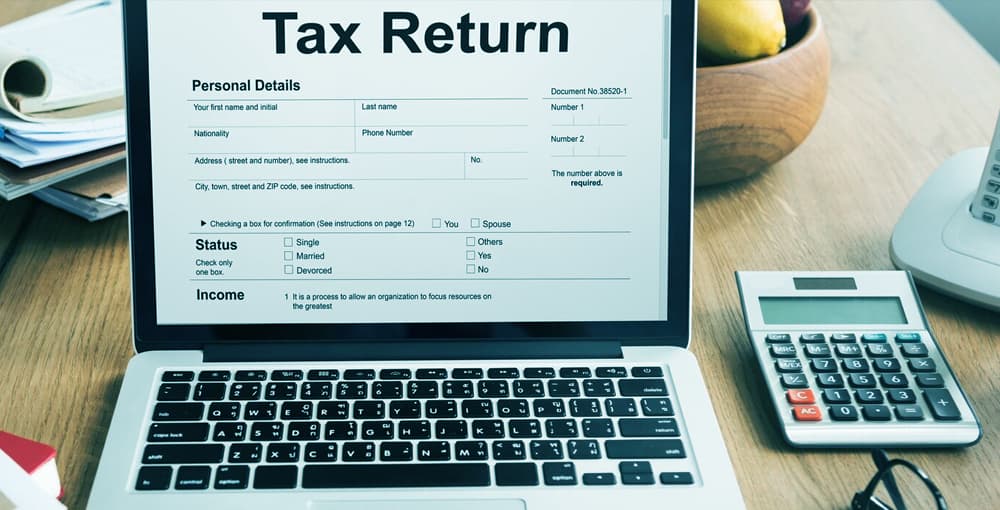
June 27, 2024
Can I Put My Parents' Address on My Tax Return? Avoid the Mom, Dad, & IRS Drama
Remember that childhood dream of living in a ramen-fueled apartment, blasting tunes with reckless abandon? Yeah, me too. But reality, as it often does, threw a curveball. My apartment complex is currently called "Mom and Dad's House," the rent is measured in shared meals and folded laundry, and my soundtrack involves the symphony of the vacuum cleaner.
But hey, independence isn't just about square footage and Spotify playlists, right? This year, I'm taking the plunge into the brave world of filing my own taxes. But here's the thing – the address monster rears its ugly head. Can I use my parents' haven of clean sheets and endless snacks on my return? Or is it some tax code taboo?
This year, let's break free from the tax-time fog and unravel the mystery of the "parental address loophole." We'll decipher filing statuses, bust address myths, and emerge victorious, Form-1040 in hand, ready to conquer adulthood.
What's Your Tax Filing Status Anyway?
"Filing status" is basically asking if you're filing your taxes all by yourself or if you're someone who's still being claimed as a dependent on your parents' tax return.
Independent Filers:
If you're under 21 at the end of the year (exceptions for full-time students), earning above a certain threshold ex-4,300 in 2023 (check with the IRS for the current year!), paying your own bills (shoutout to ramen noodles!), and rocking the adulting badge with pride, then congratulations – you're an independent filer!
This means your own beautiful, solo address gets top billing on your tax return. No parental address shenanigans are needed (unless you want to send them a thank-you gift for all the laundry folding, of course!).
Dependent Filers:
But hold on, don't despair if you're still snuggled in the comfort of your childhood room, you might still be a dependent filer, which means your parents' address can be your tax haven. This usually applies if you're under 24, haven't met the above mentioned income requirements, or rely on your parents for most of your support.
The Gray Area:
Now, life isn't always black and white, and neither is filing status. Sometimes, you might be in that "gray area" where you're earning some income but still getting financial help from your parents. Here's where things get a bit trickier. You might be able to claim yourself as a dependent on your parents' return (yay for shared deductions!), but you'll still need to use your own address for any income you report on your own return.

Living at Home: Can I Use Mom and Dad's Address for Taxes?
Being a dependent when filing taxes has its perks! You get to enjoy the comforts of your parents' care while still being listed on their tax papers. But before you send in that form with their address slapped on, let's unpack the "mailing address vs. residential address" conundrum.
Mailing Address:
Think of your mailing address as your tax-season PO box. It's where all the official IRS correspondence lands, from sweet notifications about your refund to slightly less exciting audit notices (let's hope not!). In most cases, as a dependent, you can happily use your parents' address as your mailing address on your tax return. It makes life easier for everyone involved, especially the mail carrier who doesn't have to navigate two different houses on the same block.
Residential Address:
Now, things get a tad more interesting when it comes to your residential address. This is where you put your pajamas on, eat your instant ramen, and generally adult like a champ (even if it involves a lot of Netflix and laundry pile meditation).
Here's the deal: your residential address might matter for claiming certain deductions or credits. Think back to all those college textbooks you bought (and maybe never actually cracked open). when it comes to claiming certain deductions and credits, the IRS wants to know where you actually live, not just where your mail goes. This is your residential address, and it might be different from your parents' if you're paying rent or have other housing expenses not covered by them.
So, when does the residential address matter?
Education Credits: Claiming education credits for tuition or student loan interest? Use your residential address if you're paying those expenses yourself, even if it's different from your parents'.
Earned Income Credit: Living rent-free with the folks but paying for other living expenses like groceries or utilities? You might be eligible for the Earned Income Credit, and your residential address comes into play here.
Itemized Deductions: If you're itemizing your deductions (think medical bills, charitable donations), your residential address becomes relevant for any deductions related to your living situation.
Independent Filers
Calling all independent tax filers! You've crossed the threshold of adulthood, conquered the ramen-noodle budget, and proudly claimed your own apartment (or at least a designated corner of the living room). Now, it's time to embrace another badge of independence: your own address on your tax return.
Unlike your dependent friends, you no longer get the cozy comfort of borrowing your parents' mailing address. It's time to shine a spotlight on your own digs, whether it's a studio apartment with a view of the fire escape or a shared flat teeming with life (and pizza boxes).

Your Own Address, Your Responsibility
Think of your address as your tax-time fortress. It's where all official IRS correspondence and, hopefully, that glorious refund check will land. This is the address you'll proudly write (or type) on every form, the one that signifies your solo journey into the world of adulting.
Claiming Your Deductions with Pride:
But your address isn't just a label; it's a gateway to claiming deductions and credits that celebrate your independent lifestyle. Remember those late-night study sessions fueled by questionable coffee? You might be eligible for the education credit. Did you finally escape the basement and rent a rooftop studio with a breathtaking view (of the water tower)? Those rent payments could translate into juicy deductions.
Remember: Every deduction claim comes with its own set of rules and requirements. Always consult the IRS website or a tax professional to ensure you're following the guidelines and maximizing your deductions based on your specific address and living situation.
The Shared Address Conundrum:
Now, things can get a little tricky if you share a living space with other independent filers. In this case, it's crucial to avoid claiming the same deductions twice. Communicate with your roommates and ensure each person claims their fair share based on their individual expenses and occupancy details.
Pro Tip: Keep clear records of your rent payments, utility bills, and other housing-related expenses throughout the year. This will make claiming your rightful deductions a breeze come tax time.
Other Stuff to Think About
Tax time is a journey through forms, receipts, and maybe a healthy dose of confusion. Especially when it comes to that tricky question of addresses. But fear not, intrepid filers! We've explored the mailing vs. residential conundrum, the independent vs. dependent divide, and now, it's time to address some lingering concerns.
Verification Delays: Using your own address, especially if it's new, might trigger verification checks from the IRS. This could delay your refund slightly, but don't panic! Just be prepared to provide any additional documents they request, like proof of address or bank statements.
Parental Implications: If you're claiming yourself as a dependent on your parents' return while using your own address, things get a bit trickier. IRS might flag this discrepancy, so it's crucial to clarify your situation with a tax professional to avoid any unnecessary scrutiny.
State Tax Considerations: Some states have different address requirements for their tax returns. Make sure you understand the rules in your state to avoid any filing snafus.
Moving Mid-Year: Did you change apartments or dorms mid-year? You might need to file separate state tax returns for each address. Again, consulting a tax professional can help you navigate this complexity.
Future Changes: Remember, your address can change over time. Update your mailing address with the IRS promptly to avoid missing important documents or refund checks.
Long story short
If you are independent own your address, own your return! Your solo pad's address unlocks student loan and education credit treasures. Just make sure those bills land there, not at Mom and Dad's laundry basket.
And if you’re dependent then chill with your parents' address for mail, but remember, your actual living situation matters for some deductions. That home office in your childhood room? Use your own address for that sweet deduction.
So, share your address triumphs and filing fails in the comments! Together, we can conquer this tax season, one deduction (and maybe a meme or two) at a time. And remember, even if you're drowning in W-2s, you've got this!

June 19, 2024
Do Cemeteries Pay Property Taxes in Florida? Resting in Peace from Taxes
Have you ever wondered if those peaceful, moss-draped cemeteries hidden among hectic Florida cities pay property taxes?
I know I did. After all, everything from charming bungalows to sprawling theme parks seems to cough up a slice of the Sunshine State's property tax pie. But cemeteries felt different. They held spaces for quiet reflection, whispered stories of lives past, and offered solace to grieving families. Could these hallowed grounds, dedicated to eternal rest, truly be subject to the same fiscal pressures as any other piece of real estate?
Turns out, there's more to this story than meets the eye. It's a tale of public service, community values, and a historical quirk that ensures these sacred spaces remain accessible to all. I'm about to take you on a journey through the quiet corners of Florida law, where serenity meets tax codes, and where the answer to our initial question might surprise you.

What is the Property Tax Exemption for Cemeteries?
Let's dissect this cemetery tax exemption and understand its fine print. Imagine it as a map leading to peaceful fiscal tranquility for these hallowed grounds.
The Exemption in a Nutshell
Florida Statutes grant a property tax exemption specifically for:
Land and improvements: This covers the entirety of the cemetery grounds, from rolling hills and serene gardens to chapels and administrative buildings.
Tangible personal property: Tangible properties such as tools for groundskeeping, equipment for maintenance, and perhaps even the hearse used for dignified interments.
But Here's the Catch
The exemption isn't a free pass for all cemetery property. To qualify, the primary purpose of the land and structures must be:
Permanent deposit of human dead: This is the core purpose, ensuring that the exemption truly serves its intended purpose – providing a final resting place for our loved ones.
Care and maintenance of the property of the dead: This includes upkeep of the grounds, headstones, and buildings, ensuring a dignified and well-maintained environment for remembrance.
Mind the Exclusions
Remember, not all cemetery property enjoys this tax-exempt status. Here's what doesn't fall under the umbrella:
Profit-driven activities: Mausoleums or columbariums for sale, souvenir shops, or even restaurants operated within the cemetery grounds are subject to taxes.
Non-exempt entities: For-profit corporations owning the cemetery without a dedicated non-profit purpose don't qualify for the exemption.
The Takeaway
Cemeteries in Florida are generally exempt from paying property taxes under certain conditions. This exemption is outlined in Section 196.19(1)(c) of the Florida Statutes. Taxes on the land where cemeteries are located, along with buildings like chapels and offices, don't need to be paid. But things like tools and equipment used there aren't exempt from taxes. However, not all parts of a cemetery are tax-free. To avoid taxes, the main reason for the cemetery should be to permanently bury people and take care of their belongings. If a company is making money or doing things that aren't related to the cemetery's main purpose, they might still have to pay taxes on that part of the property (an unexpected tax dent on your financial plan).

Why Do Cemeteries Have a Property Tax Exemption?
Let's go deeper into the "why" of this exemption now that we've cracked into the legal code and discovered every nuance of it. Why are these peaceful landscapes, dotted with headstones and memories, exempt from property taxes?
1. Public Service and Community Impact
Cemeteries aren't just for the deceased; they're for the living too. They offer a place for reflection, remembrance, and even historical exploration. Think of them as open-air museums of local history, preserving stories and legacies etched in stone.
2. Affordable Final Resting Places
Death shouldn't come with a hefty property tax bill. This exemption helps ensure dignified and affordable burial options for everyone regardless of income. It's a crucial part of ensuring equal access to a proper final resting place.
3. Environmental Guardians
Cemeteries often act as green spaces within urban areas, providing essential ecosystem services like stormwater management, carbon sequestration, and habitat for wildlife. Their exemption recognizes their contribution to environmental well-being.
4. Historical and Cultural Importance
Cemeteries are repositories of history and culture, reflecting the evolution of communities and societies. The exemption helps preserve these invaluable spaces, ensuring they continue to tell their stories for generations to come.
5. A Balancing Act
Of course, the exemption doesn't exist in a vacuum. It's part of a delicate balance between supporting public services and maintaining fair taxation. It's important to remember that not all cemetery activities are exempt, and responsible financial management remains crucial for these sacred spaces.
This isn't just a plot of land. It's a sacred space, a community's heart for remembering, grieving, and honoring those who have passed. Cemeteries offer solace, history, and a connection to something bigger than ourselves.

How to Claim the Property Tax Exemption
If you're involved with a cemetery in Florida, you might be wondering, "How do we claim this tax in the hustle and bustle of property assessments?" Don’t worry, my dear watcher of eternal rest! Here's a step-by-step guide to navigate the process:
1. Gather Your Essential Documents
Before you begin your voyage, ensure you have the following documents at hand:
Proof of ownership: Deeds or other legal documents establishing ownership of the cemetery property.
Incorporation documents: If applicable, provide articles of incorporation or charter for non-profit cemeteries.
Financial statements: Recent financial records demonstrating the cemetery's non-profit status and primary purpose of burial and maintenance.
Maps and surveys: Clear depictions of the cemetery's boundaries and layout, showcasing the areas intended for tax exemption.
2. Contact Your Local Property Appraiser
This is your key figure in the process, the gatekeeper to tax-exempt status. Reach out to the property appraiser's office in the county where the cemetery is located. They'll provide specific instructions and forms tailored to your jurisdiction.
3. Complete and Submit the Exemption Application
The application will typically request details about the cemetery's ownership, operations, and property usage. Fill it out with accuracy and care, ensuring transparency and adherence to the exemption criteria. Attach the documents you gathered in step one to the application, fortifying your claim with evidence of eligibility.
5. Await Review and Approval
Once submitted, the property appraiser will review your application, assess its merits, and determine whether the cemetery meets the exemption criteria. Patience is a virtue, both in life and in tax matters!
6. Renewal and Reassessment
Remember, this exemption isn't a perpetual pass. It may require periodic renewal or reassessment to ensure continued compliance with the eligibility requirements. Stay vigilant and adhere to the renewal guidelines set forth by the property appraiser's office.
More for my dear Sunshine State people
Are You Eligible for Florida Homestead Exemption Tax Benefits
How to Reduce Capital Gains Tax on Commercial Property in Florida

Resting Assured, Knowing Cemeteries Find Peace from Taxes
As you go about your day, know that beneath the headstones lies not just dust, but stories, memories, and the quiet assurance that even amongst the hustle and bustle of life, there are spaces of stillness and respect for the departed.
Remember, death is inevitable, but taxes? Well, those are a bit more negotiable, especially when it comes to ensuring the tranquil existence of our final resting places.
If you're involved with a cemetery, let us know in the comments and share this knowledge with others who may benefit - fellow cemetery staff, funeral professionals, or even those planning for the future.
FAQs and Additional Resources: Clearing up the confusion and offering more help.
Q: What happens if a cemetery changes ownership?
A: When someone new takes over owning the cemetery, they have to apply for the tax exemption. They need to show they qualify by meeting the criteria set in the Florida Statutes. If the main goal of the cemetery is still all about burial and looking after the place, they might still get that exemption from taxes.
Q: What happens if a cemetery expands its services?
A: If a cemetery decides to do extra things like selling mausoleums or getting into business activities that aren't exempt, those specific parts of the property might have to pay property taxes. But the exemption from taxes could still stick around for the land and buildings meant for burial and taking care of the place.
Q: Does the exemption apply to crematoria?
A: If a cemetery runs a crematorium and qualifies for the tax exemption, that crematorium might not have to pay property taxes. But if the crematorium is run separately, like its own business, it wouldn't get that tax exemption.
Q: Where can I find more information about the exemption?
A: Here are some valuable resources:
Florida Department of Revenue: [https://floridarevenue.com/]
Florida Cemetery Association: [https://www.thefccfa.com/]
National Funeral Directors Association: [https://nfda.org/]

June 6, 2024
Florida Tax Deductions and Credits, What's New for 2024?
Tax season, ugh. Just the mention of it sends shivers down my spine and conjures up visions of endless paperwork, confusing forms, and the ever-present fear of Uncle Sam's judgmental gaze. But hey, here in Florida, sunshine ain't the only thing brightening our days. We've got some pretty sweet tax breaks to spice up that annual ritual of financial self-flagellation.
But wait, what's new for 2024? Did they sneak in some hidden deductions while I was busy perfecting my sandcastle-building skills? Did they sprinkle some extra tax credits like beachside confetti onto our forms? Well, fellow Sunshine Staters, Your friendly neighborhood tax sleuth is here to spill the tea (and the tax code) on all the new and exciting things waiting for us in the next tax season.
What are tax deductions and credits?
Tax deductions and credits are two ways to reduce your tax bill. But what do they mean, exactly? And how do they work?
What are tax deductions?
Tax deductions are like discounts for your income. They lower the amount of your earnings that get taxed, which means you end up paying less income tax. Think of it like this: You've got a $100 grocery bill, but you have a slick $10 coupon. That coupon acts just like a tax deduction. It shaves $10 off your bill, so you only need to cough up $90. Pretty sweet, right?
What are tax credits?
Tax credits are even better; they're like getting free money. When you have a tax credit, it cuts your tax bill dollar for dollar. Imagine you have a $10 gift card, and you use it to pay for your groceries. That's exactly how a tax credit works. It takes $10 straight off your tax bill, so you don't have to pay an extra cent. It's like finding free money in your wallet!
What are some common federal income tax deductions?
let's talk about some everyday federal income tax deductions. These are the ones that can put a little extra cash back in your moneybag:
Medical and dental expenses: If your medical bills add up to more than 7.5% of your income, you can kick them out of your taxable income. Things like doctor's visits, prescriptions, and hospital stays, they're out of the tax equation.
Charitable donations: When you open your heart and your wallet to qualified organizations like churches, schools and other non-profit organizations, you can wave bye-bye to some of your taxes.
State and local taxes: Those state and local taxes you hand over, be it income, sales, or property taxes – they're not as heavy on your wallet as you might think. Deduct 'em from your taxes!
Home mortgage interest: If you're living the homeowner dream and have a mortgage, you're in luck. The interest you pay on that mortgage? Yep, you can subtract it from your taxable income.
Student loan interest: Student loans can weigh you down, but here's a bright side. The interest you pay on those loans can be your tax-saving buddy. Deduct it, and it'll ease the load!
Business expenses: If you're the boss in your own business world, good news. Those expenses for rent, utilities, and equipment? You can subtract them from what you owe in taxes. It's a discount for being a business owner!

What are some common federal income tax credits?
let's chat about some common federal income tax credits keeping in mind that eligibility and rules can vary:
Earned Income Tax Credit (EITC): This serves as a tax credit aimed at supporting individuals with moderate to low incomes. The actual credit you receive hinges on your income and the number of children you're responsible for..
Child Tax Credit: When it comes to the Child Tax Credit, this is a tax benefit designed for parents who have children under 17 years old. The credit amount stands at $2,000 per child.
Child and Dependent Care Credit: The Child and Dependent Care Credit, on the other hand, provides a tax credit to parents who incur expenses for child care or dependent care. You can receive up to $3,000 per child or dependent.
Education tax credits: For those pursuing higher education, there are education tax credits available. One such credit is the American Opportunity Tax Credit, which supports students handling college expenses. It can provide up to $2,500 per student.
Retirement savings contributions credits: Additionally, there's the Retirement Savings Contributions Credit. The Lifetime Learning Credit is a tax benefit tailored to students grappling with college costs, offering up to $2,000 per student.
What's the deal with Florida taxes?
In Florida, there's a unique tax scenario. The state doesn't impose a state income tax, granting residents relief from state income tax burdens. However, it's important to note that federal income taxes remain applicable, and there might still be obligations for other state and local taxes, like property and sales taxes.
Can I still claim federal income tax breaks in Florida?
Now, when it comes to federal income tax breaks, residing in Florida doesn't hinder your eligibility. You can still claim all the federal income tax benefits you qualify for, such as the Earned Income Tax Credit, the Child Tax Credit, and the Student Loan Interest Deduction.
So, what’s new in 2024?
Here is a summary of what's new for Florida tax deductions and credits in 2024:
New Clean Vehicle Tax Credit: A new credit now offers up to $7,500 when you invest in a brand-new, eligible plug-in electric vehicle or a fuel cell electric vehicle.
Expanded Earned Income Tax Credit (EITC): The EITC, tailored for individuals with modest incomes, has seen an expansion in 2024. The maximum EITC amount has been boosted for taxpayers with children. Below is a breakdown of the new maximum EITC amounts:
No qualifying children: $560
1 qualifying child: $3,733
2 qualifying children: $6,164
3 or more qualifying children: $6,935
Expanded Child and Dependent Care Credit: This credit assists those who cover eligible child care expenses. In 2024, the maximum credit amount has increased to $2,100 per child under 13 years old and $1,050 per dependent adult. Plus, the income eligibility threshold has been broadened.
Floridians rejoice! Here's more good tax news for you, just a click away:
Florida Tangible Property Tax: Avoid Penalties and Save Money
Florida Property Tax Exemptions and Discounts: Who Qualifies and How to Apply

How do I claim tax deductions and credits?
To claim those tax deductions and credits, you'll want to start by filling out your federal income tax return (Form 1040). Depending on where you reside, there might also be a state income tax return in the mix.
What forms do I need to file to claim tax deductions and credits?
When it comes to the paperwork, it's not just Form 1040 you'll be dealing with. Certain deductions and credits call for extra forms. Let's say you've got medical expenses in the mix; that's when you'll need to bring in Schedule A of Form 1040. And if you're feeling charitable, Schedule C of Form 1040 is the one to consider.
What's the deadline to file my taxes?
Now, as for the timing, circle April 15th on your calendar. That's the deadline for your federal income tax return. But don't sweat it if you need more time – you can file for an extension.
What documentation do I need to support my tax deductions and credits?
To back up those claims for tax deductions and credits, the name of the game is documentation. Keep solid records of all your expenses and receipts. Medical bills and receipts are your go-tos if you're claiming medical expenses. And if you've been generous with charitable donations, hold onto those donation receipts too.
What happens if I don't claim tax deductions and credits?
Skipping out on those tax deductions and credits means you're handing over more of your hard-earned cash to the taxman.
Imagine you've got $10,000 in medical expenses. You can actually slash that amount from your taxable income. But, here's the twist – if you skip claiming that deduction, your taxable income jumps up by $10,000.
Now, let's break it down. If you're hanging out in the 24% tax bracket, that translates to an extra $2,400 flying out of your wallet just because you didn't seize that deduction.
Not sure if you're in the clear for any tax perks? No worries. Tax preparation software or a chat with a tax pro can be your lifeline. They'll help spot the deductions and credits you're entitled to and make sure your tax filing is spot on.
Where can I learn more about Florida tax deductions and credits?
To expand your Florida's tax deductions and credits knowledge, you've got some handy resources at your fingertips. Check out the Florida Department of Revenue website and the IRS website for all the details you need.
Tax Time: It's Not That Bad
I trust this article has been a valuable source of insight into Florida's tax deductions and credits. By seizing all the deductions and credits you qualify for, you're not just saving on taxes; you're holding onto more of your hard-earned cash.
If you've got any queries regarding Florida tax deductions and credits, don't hesitate to drop a comment below. I'm here to assist!
And do spread the word by sharing this article with your pals and kin, so they can also keep some extra dollars in their pockets come tax time.
Remember, sharing is caring, and caring can be tax-deductible!Hope you found this article enjoyable.
Here's to a tax-tacular day ahead!

May 20, 2024
How Bad is A Repo on Your Credit - A Guide By Apex Advisors for Florida Residents
Life's journey isn't always smooth sailing, and we occasionally encounter unexpected detours. One such detour is the difficult road of repossession, which occurs when valuable assets slip from our grasp due to a variety of circumstances. But here's the twist: the consequences go beyond mere money loss, casting a long shadow over your credit score - that three-digit number that wields enormous power over your financial landscape.
So, buckle up, because we're about to delve into the layers of how repossession can impact your credit score and, more importantly, how you can navigate this terrain to safeguard your financial future.
What Exactly is Repossession?
Defining Repossession: When Your Property Gets Seized
Let's think that, You've obtained a loan to purchase a vehicle or another valuable asset, and life's unpredictable currents lead you to a situation where you're unable to meet your payment obligations.
In such cases, lenders, lessors, or creditors have the legal right to take back the property that served as collateral for the loan. This process, my friend, is known as repossession.
Repossession isn't just about the physical retrieval of the asset; it's a legal process wherein the lender or creditor reclaims ownership due to non-payment.
Whether it's a car, a piece of equipment, or even a property, repossession is a direct consequence of breaching the terms of your loan or lease agreement. The objective isn't to punish but to safeguard the lender's interests.
Repossession's Ripple Effect: Beyond Physical Loss
The ripples of repossession extend far beyond the immediate loss of the asset. While the physical separation can be disheartening, the impact on your credit score often becomes the focal point of concern. When an asset is repossessed, the lender reports this action to credit bureaus, which then becomes a stain on your credit history.
The financial stain left by repossession can translate into a lower credit score, and that, my friend, has far-reaching consequences. A lower credit score can affect your ability to secure loans, obtain favorable interest rates, and even impact your chances of renting an apartment or securing certain jobs. Repossession, in essence, alters the financial narrative you've been building over time.

How Immediate is the Blow to Credit Scores
Swift Consequences: Repossession's Instant Impact on Credit
As we explore further into the world of repossessions and credit scores, we come across an important question: How quickly does repossession cast its shadow on your credit score? The answer, my friend, is with remarkable swiftness. The moment your asset is repossessed, the effects on your credit score become palpable.
When a repossession occurs, it's like a sudden jolt to your credit history. The lender swiftly reports the event to the credit bureaus, resulting in a negative entry on your credit report. This swift reporting can lead to an immediate drop in your credit score, which can catch many individuals off guard. It's as though the financial fabric you've woven is momentarily shaken, and the threads that signify your creditworthiness are put under stress.
From Possession to Points: Credit Score Vulnerability
The vulnerability of your credit score to repossession's impact is a testament to the interconnectedness of financial matters. This vulnerability, however, doesn't imply helplessness. Instead, it highlights the importance of staying vigilant and informed about your credit health.
The mechanics behind the credit score drop post-repossession stem from various factors. Firstly, the missed payments that often lead to repossession already impact your payment history, a significant component of your credit score.
Additionally, the repossession itself adds a negative mark that influences factors like your credit utilization and the diversity of your credit portfolio.
The result? A substantial hit to your credit score. This drop isn't merely a numerical shift; it's a reflection of your current financial situation, and it can have repercussions on future financial opportunities.
Whether you're eyeing a mortgage, an auto loan, or even seeking favorable credit card terms, your credit score's sudden dip can be a roadblock.
Are the Consequences of Repossession Long Term
Staying Power: Repossession's Enduring Effect on Credit
Once a repossession is reported to the credit bureaus, it takes up residence on your credit report. This record of the event isn't fleeting; it remains visible to potential lenders, creditors, and financial institutions for a significant period. As a result, the shadow cast by repossession continues to influence your creditworthiness and financial opportunities.
The enduring impact of repossession can be felt across various aspects of your credit profile. From the calculation of your credit score to the assessment of your creditworthiness, this negative mark serves as a reminder of past financial challenges. It affects not only your ability to secure loans but also the terms and conditions under which you can access credit.
Timelines of Impact: Navigating the Seven-Year Rule
Understanding the longevity of the impact is crucial, and this leads us to the concept of the "seven-year rule." Repossession, like other negative entries on your credit report, generally remains visible for up to seven years from the date of the initial delinquency that led to the repossession. During this time, the entry can influence potential lenders' decisions regarding your creditworthiness.
However, it's important to note that while the entry itself may disappear from your credit report after seven years, its effects might gradually wane as time goes on. Lenders may place less emphasis on older negative entries when evaluating your creditworthiness. Nonetheless, the timeline underscores the long-term nature of repossession's impact and emphasizes the importance of proactive credit management.

How Do Credit Scores Work Anyway
The Science of Credit Scoring: Key Factors Unveiled
Embarking on our exploration of the intricate world of credit scores, we're met with a question that's at the heart of financial decision-making: How exactly do credit scores work? Think of credit scores as a numerical reflection of your financial behavior, a snapshot that lenders and creditors use to assess your creditworthiness.
The science behind credit scoring involves evaluating multiple factors that provide insight into your financial responsibility. These factors include:
Payment History: Your track record of making timely payments on loans and credit accounts.
Amounts Owed: The total amount you owe on various credit accounts.
Length of Credit History: The duration of your credit accounts and your overall credit history.
New Credit: The recent opening of new credit accounts or loans.
Types of Credit Used: The diversity of your credit accounts, such as credit cards, mortgages, and installment loans.
Each factor contributes to the overall credit score, with varying degrees of importance. Your credit score acts as a financial report card, communicating your financial habits to potential lenders. It's important to note that while all these factors play a role, their significance might differ depending on individual circumstances.
Dissecting the Impact: Repossession's Role in Credit Metrics.
First and foremost, repossession's immediate impact is evident in your payment history. The missed payments leading up to repossession create a negative trail that affects this critical aspect of your credit profile.
Furthermore, the actual repossession event contributes to the "amounts owed" factor, as the lender takes back the collateral but might not cover the entire outstanding debt.
The effects of repossession can be seen in your credit utilization ratio, which measures how much of your available credit you're using. This ratio is important in credit scoring, and repossession can tip the scales unfavorably.
Can You Rebuild Your Credit Post-Repossession
Rising from the Ashes: Strategies for Credit Repair
As we continue to navigate the complexities of repossession and credit scores, a new horizon emerges, one focused on rebuilding and recovery. The question we address in this section is one of hope and determination: Can you truly rebuild your credit after dealing with the consequences of repossession? The answer is a resounding yes.
Credit repair isn't just a possibility; it's a proactive step towards regaining financial stability. It involves a series of strategic actions aimed at gradually improving your credit score over time. Think of it as a journey of transformation, one that involves consistent effort and a commitment to financial well being.
Strategies for credit repair encompass a range of activities, from negotiating with creditors to settling outstanding debts. One common approach is to work with creditors to establish repayment plans that align with your financial capabilities. Additionally, examining your credit report for errors and discrepancies can also contribute to credit improvement.
Charting Progress: Practical Steps to Credit Recovery
As we navigate the path of credit recovery, practical steps become our guideposts. These steps not only empower you to take control of your credit health but also enable you to see tangible progress over time.
Timely Payments: Ensuring on-time payments for existing credit accounts demonstrates your commitment to responsible financial behavior.
Secured Credit Cards: Obtaining a secured credit card allows you to build positive credit history by using and repaying a small credit limit responsibly.
Credit Building Loans: Exploring credit builder loans enables you to establish a positive credit history while gradually building savings.
Debt Management: Strategically managing existing debts and reducing outstanding balances contributes to a healthier credit profile.
While the journey of credit recovery post-repossession might seem daunting, remember that every step you take contributes to the bigger picture. It's not about immediate perfection, but about gradual progress that leads to enhanced creditworthiness.
Rebuilding your credit after repossession requires patience, dedication, and a willingness to learn from past financial experiences.

What Are the Legal Aspects of Repossession in Florida
Legal Insights: Understanding Your Rights During Repossession
When it comes to repossession in Florida, it's important to know your rights. The law is on your side! Before your things are taken away, the people who gave you the loan have to tell you first. They have to explain what went wrong and give you some time to fix it.
You also have a chance to get your things back. If they take your stuff, you can get it back by paying what you owe, along with some extra costs.
Florida's Rules: How Repossession Works Here
Florida has rules for how repossession can happen. If you're behind on payments, the lenders can take your things back without going to court. But here's the deal – they can't be mean or aggressive while doing it. They have to be respectful.
Knowing these rules gives you power. You can talk to the lenders and make sure they're doing things the right way.
Remember, understanding your rights and how repossession works in Florida means you can stand up for yourself in tough situations.
How Can You Avoid Repossession in Florida?
Think of this part as a guide to help you avoid problems with money that could lead to repossession in Florida. We're going to talk about things you can do to stay on track and keep your financial situation stable.
Keep Paying on Time: When you pay your loans or leases on time, it's like dropping an anchor to keep you steady. Paying regularly helps you stay away from the danger zone of missed payments that can lead to repossession.
Talk to Your Lender: If you see money problems coming up, don't hide. Talk to the people you owe money to – they might have ways to help you temporarily so you don't lose your things.
Make a Smart Budget: Always plan your route before a trip. Creating a budget helps you manage your money. Focus on paying what you owe and spend less on things you don't really need.
Why Consult Apex Advisors on Repossession
Remember, money problems can be tough, but with the right help, you can get through them and become stronger.
How We Help:
We know a lot about repossession and credit problems.
We can give you advice that fits your situation.
If things seem confusing, apex advisors can explain them in an easy way.
We help you with plans to fix your credit after repossession.
Apex advisors talk to lenders to help you settle debts and improve your credit.
With better credit, you can do more things with money in the future.
By talking to Apex Advisors, you're getting help from people who understand repossession and credit. Take the Chance to Improve Your Money Situation – Contact Apex Advisors Now!
Conclusion: Navigating Troubles with Confidence
As we come to the end of our journey through tough money situations and credit challenges, remember that every hard time is also a chance to learn and become stronger. Having money problems might feel like being in a rough sea, but with knowledge, help, and determination, you can handle it.
By understanding how repossession affects your money, learning how to avoid it, and getting help from Apex Advisors, you've learned how to protect your money in the future. It doesn't matter if you live in Florida or somewhere else – the main idea is the same: knowing things helps you, and having experts to guide you is a big help.

May 9, 2024
How to Use Debt to Buy Assets
Taking on debt to purchase assets is probably one of the best decisions you can make in recent years. But, as with everything in heaven and on earth, there are a few conditions. But here, you and I will dissect it so that you do not fall victim to its darker side and can benefit from the light it offers.
When using debt to buy assets, you need to know a lot about the things you're buying, how they'll make money, and what's happening in the market. It's a bit like being an expert in a game. The goal is to make sure that the things you buy become more valuable or make more money than what you borrowed. This way, you can make the most of your money and get more back than you borrowed.
Now, let's take a deep dive to get the most out of it and find what you're looking for
How Does Debt Help You Build Wealth?
Imagine debt as a tool, like a ladder that helps you reach higher financial levels. When used strategically, debt can allow you to access opportunities that might have been out of reach otherwise. Let's break it down: borrowing money to invest in assets that appreciate in value over time, such as real estate or stocks, can lead to your net worth increasing. It's like making your money work for you, amplifying the potential returns on your investments.
Consider the real estate market. You get a mortgage to purchase a home. As the property's value increases over the years, you not only gain a place to live or rent out but also benefit from the growth in its value. This creates a situation where the asset's appreciation outweighs the cost of the borrowed money, putting you in a position to build wealth.
Can Debt Be a Useful Tool for Your Financial Goals?
Just like a hammer is useful for building, debt can serve as a tool to construct your financial future. Think about your goals: whether it's retiring comfortably, sending your kids to college, or simply achieving a certain level of financial security. Debt, when handled smartly, can help you get there faster. If you don’t handle it wisely, it can become a bad debt, but don’t worry, we also know the way to a bad debt tax deduction.
Consider starting a business. Taking a business loan to fund your venture might seem like a risk, but it's also an opportunity. With proper planning and execution, you could generate profits that exceed the loan payments, giving you not only a thriving business but also a stepping stone toward achieving your financial aspirations.
Remember, while debt can be a powerful ally, it's essential to manage it responsibly. Just as you wouldn't build a house without a solid foundation, you wouldn't want to accumulate debt without a well-thought-out plan.

Types of Assets to Consider
What Kinds of Things Can You Buy to Grow Your Wealth?
Alright, let's talk about the treasure trove of assets you can dive into to grow your wealth. From real estate to stocks and even businesses, the options are as diverse as they are exciting.
Real estate: Houses, apartments, commercial properties—these can not only provide a place to live or work but also appreciate in value over time. Florida's booming real estate market offers ample opportunities for homeowners and investors alike.
Stocks: Owning a part of a company through stocks can be like owning a slice of the pie. As companies grow and profit, so can your investment. The key here is diversification—spreading your investments across different industries to minimize risk.
Businesses: Running your own show can be incredibly rewarding. Whether you're starting a business from scratch or buying an existing one, it's a chance to create income streams that can add to your wealth.
How Can These Things Help You Make More Money in the Future?
Let’s imagine you invest in a property in Florida's vibrant real estate market. Over time, the demand for properties increases, and your investment appreciates. You can choose to rent it out, earning a steady stream of income while the value of the property rises. Or you can sell it later, reaping the rewards of its appreciation.
Stocks work in a similar way. As the companies you invest in thrive, their stock prices can rise. Plus, some stocks pay dividends—essentially, a portion of the company's profits returned to you as a shareholder. Dividends may turn into a significant source of income over time.
And then there's the entrepreneurial path. Say you acquire a small business in a promising niche. By nurturing and growing it, you not only contribute to the local economy but also create a source of income that can significantly impact your financial well-being.
The beauty of these assets lies in their potential to generate income and appreciate over time. They're like seeds you plant today, and with care and time, they can grow into robust trees of wealth.
Doing Your Homework:
Why Should You Research Before Borrowing Money?
Think of researching before borrowing money as laying the foundation for a sturdy house. Just as you wouldn't build without a blueprint, you shouldn't borrow without a clear plan. Research is your compass—it helps you understand the risks, rewards, and whether the path you're choosing aligns with your goals.
Before signing on the dotted line, consider factors like interest rates, repayment terms, and potential risks. It's essential to make sure that the cost of borrowing doesn't outweigh the benefits you expect to gain from the asset. Taking the time to research and compare different loan options can save you from potential financial headaches down the road.
How Can You Figure Out if What You Buy Will Make You More Money?
You want to ensure that what you're buying has the potential to boost your wealth, not drain it. For instance, if you're eyeing a property, take into account its location, potential rental income, and its historical appreciation. Analyzing the local real estate market trends can give you a good sense of whether the property's value is likely to grow.
When it comes to stocks, delve into the company's financials, growth prospects, and industry trends. Are they positioned to thrive in the long run? Are they innovating and adapting to changes? Similar due diligence applies to businesses you might consider buying.
Remember, it's not about making predictions with absolute certainty; it's about making informed decisions based on available information. The more you know, the better equipped you are to make choices that align with your wealth building goals.

Factors to Consider Before Using Debt
What Factors Should You Evaluate Regarding Your Creditworthiness?
Before diving into the world of debt, it's important to gauge your creditworthiness—the measure of how reliable you are as a borrower. Lenders use your credit history, credit score, and income to assess this.
A strong credit history and a higher credit score open doors to better borrowing terms and lower interest rates. It's like having a good reputation in the financial world.
Checking your credit report regularly can help you identify any inaccuracies and take steps to improve your credit standing. Remember, a healthier creditworthiness means more favorable terms when you're ready to borrow.
How Do Interest Rates, Repayment Terms, and Risks Impact Your Decision?
Let's go into some numbers. The cost of borrowing is heavily influenced by interest rates. A lower interest rate means you'll pay less in interest during the loan's term.
Repayment conditions (the time period during which you repay the loan) are also important. Longer durations may result in lower monthly payments but greater interest expenses overall.
Then there's risk. Borrowing isn't risk free. Assessing the risks associated with the asset you're acquiring and the terms of the loan is crucial. What if the value of the asset drops? Can you handle the loan payments if things don't go as planned? Understanding the potential risks empowers you to make an informed decision.
Remember, the goal is to strike a balance between borrowing for an asset that can potentially appreciate in value and managing the risks associated with borrowing.

Making Money with Real Estate
How Can You Make Money from Houses and Buildings in Florida?
Florida's real estate scene is like a goldmine of opportunities waiting to be explored. Owning property here can be more than just having a place to call home—it's a chance to ride the wave of appreciation and generate income.
When you own a property, its value can increase over time due to factors like demand, location, and improvements. This appreciation can add to your wealth. Additionally, you can generate income by renting out the property to tenants. Whether it's long-term rentals or vacation properties, the rent you receive becomes a steady stream of revenue.
What Are Some Ways to Make Houses Work for You?
Alright, let's unpack how houses can be more than just structures—they can be assets that work for you.
One popular strategy is the "fix-and-flip." You purchase a property, give it a makeover, and then sell it at a higher price.
Another avenue is vacation rentals. With Florida being a hotspot for tourists, investing in a property for short term rentals can lead to handsome returns. The demand for vacation rentals is strong, especially in popular tourist destinations like Orlando and Miami.
Long term rentals, on the other hand, provide consistent income, and as the property appreciates, your net worth grows. You can also consider becoming a landlord by investing in multi-unit properties and collecting rent from multiple tenants.
Investing in Stocks
Can You Make Money by Owning a Part of a company?
Investing in stocks means becoming a part-owner of companies. When a company grows and succeeds, so does your investment. It's like having a stake in their success story. As companies expand their operations, increase profits, and innovate, the value of their stocks can rise, potentially leading to substantial returns for you.
Stocks provide an opportunity to tap into a wide range of industries—from tech and healthcare to finance and entertainment. By holding shares, you're not only supporting businesses but also positioning yourself to benefit from their growth.
Why Is It Smart to Invest in Different things?
Diversification is the name of the game when it comes to investing. Assume you're putting together a large puzzle. Each item represents a distinct investment. When you diversify your investments, such as stocks, real estate, and even enterprises, you reduce the impact of a poor-performing item on your whole portfolio.
If one investment isn't doing well, the others might be thriving, helping to balance things out. Diversification helps manage risk and increases your chances of achieving consistent growth over time.

Starting or Buying a Business
Can You Make Money by Owning or Starting a Business?
Owning or starting a business can be a powerful avenue for wealth creation. When you have your own business, you're not just an employee—you're the captain steering the ship. As the business grows and succeeds, so does your income and the value of your venture.
When you buy an existing business, you're stepping into a setup that already has customers, systems, and revenue streams in place. With strategic management and improvements, you can enhance its profitability and value. If you're starting from scratch, your innovative ideas and hard work can lead to a flourishing enterprise.
While it's not without challenges, the potential for substantial financial rewards makes entrepreneurship an appealing path.
Why Might Florida Be a Good Place to Do This?
Florida offers a unique blend of advantages for entrepreneurs. Its business friendly environment is characterized by lower taxes, a growing economy, and a diverse population. The state's tourism, real estate, and technology sectors provide a fertile ground for various business opportunities.
The sunny climate and quality of life attract people from different walks of life, contributing to a dynamic consumer base. Plus, the availability of resources, networking events, and support from local communities and organizations can provide a boost to your business endeavors.

What's the Secret to Using Borrowed Money Without Problems?
The secret lies in a simple principle: borrow with purpose and repay with discipline. Debt isn't a bad thing—it's a tool. Like any tool, it's about how you use it.
The first step is to borrow for investments that have the potential to generate returns greater than the cost of the debt. This way, your borrowed money can work to grow your wealth.
Another key is discipline in repayment. Commit to making timely payments to avoid accumulating unnecessary interest and potential late fees.
Keeping your debt manageable and paying it off as agreed upon ensures that it remains a stepping stone rather than a stumbling block.
Can You Share Tips for Using Borrowed Money Wisely?
Here are some invaluable tips for using borrowed money wisely:
Set Clear Goals: Define what you want to achieve with the borrowed funds. Whether it's buying a property, starting a business, or investing in stocks, having a clear goal keeps you focused.
Evaluate ROI: Before borrowing, assess the potential return on investment. Will the asset appreciate in value? Will it generate income? Make sure the returns justify the borrowing costs.
Budget for Repayment: Factor loan payments into your budget. Know how much you need to repay each month and ensure that it's comfortably within your means.
Avoid Overextending: Borrow within your means. Taking on more debt than you can handle can put you in a financial bind. Be honest with yourself about how much you can comfortably return.
Shop for Terms: Don't settle for the first loan offer. Shop around for favorable terms, lower interest rates, and flexible repayment options.
Emergency Fund: Have an emergency fund in place before borrowing. It acts as a safety net, ensuring that unexpected financial challenges don't derail your debt repayment.
Monitor Your Investments: Keep a close eye on the performance of the assets you've acquired with borrowed money. Are they meeting your expectations? If not, reassess your strategy..
Wrapping Up
As we wrap up this journey through the art of using debt to shape your financial destiny, remember the words of Warren Buffett, 'It's better to hang out with people better than you. Pick out associates whose behavior is better than yours, and you'll drift in that direction.'
Just like surrounding yourself with the right people can influence your path, so can making informed decisions about debt and asset acquisition.
So, where do we go from here? It's time for action. Take what you've learned and embark on your journey to smart wealth creation. If you have anything to say, feel free to share it in our comment section, and if you want to help your loved one by sharing the article, you have our heartfelt thanks.
Cheers to your journey of growth, wealth, and financial empowerment. May it be as vibrant and sun kissed as the Florida landscape that inspires us all.

May 4, 2024
Does Qualified Nonrecourse Debt Increase Tax Basis
"Money is a tool. Used properly, it makes something beautiful; used wrong, it makes a mess." - Warren Buffett
When it comes to managing our money, Warren Buffett's words have become true for all of us. Taxes and debt, two factors that appear to dance around our financial choices, can, in fact, result in something lovely or quite the disaster. The relationship in the United States between qualified nonrecourse debt and tax basis is crucial because it can influence how we negotiate these financial environments.
This article aims to explain qualified nonrecourse debt and how it affects your tax basis, whether you're a homeowner, a business owner, or just trying to understand the complexities of taxation. Let's look at this financial puzzle piece in more detail and see how it fits into your overall financial journey.
What's This Debt Anyway?
1. What is Qualified Nonrecourse Debt? Let's Break It Down.
Qualified nonrecourse debt might sound like a mouthful, but let's simplify it. Imagine you're stepping into the world of investments or business ventures, and you need to secure a loan to make things happen. This type of debt is nonrecourse, meaning that if things don't go as planned, the lender can't chase after your personal assets; they're limited to the collateral you provided for the loan.
But what makes it qualified? Well, it meets specific criteria outlined by the IRS. These criteria ensure that the debt is directly tied to an asset, like real estate. This connection between the debt and the asset sets the stage for how it can impact your tax basis. So, in essence, qualified nonrecourse debt is a special kind of loan that's connected to a particular asset, and understanding it is crucial to navigating the tax implications smoothly.
2. When Does This Type of Debt Usually Come into Play?
Qualified nonrecourse debt isn't an everyday term, but it comes into play in some common scenarios. Consider the world of real estate. Imagine you decide to invest in a property, perhaps a charming duplex or a commercial space. To make the purchase, you secure a loan specifically for the property. This loan is the qualified nonrecourse debt we're talking about.
In the business realm, it also has a role to play. Picture you're an entrepreneur aiming to expand your business operations. You need funds to make it happen, so you acquire a loan that's directly tied to the equipment or property you're acquiring. That loan falls under the umbrella of qualified nonrecourse debt.

What's Tax Basis, You Ask?
1. Tax Basis: The Key to Understanding Taxes. But What Is It?
Tax basis might sound like a jargon-heavy term, but at its core, it's a powerful concept that holds the key to understanding how taxes work. Imagine it as the foundation of your financial house. Just like a building's foundation determines its value and stability, tax basis sets the stage for how taxes are calculated when you sell an asset.
At its simplest, tax basis is the value assigned to an asset for tax purposes. It's not just the initial cost of the asset; it's a dynamic number that changes over time due to various factors. Understanding how tax basis works can save you from unexpected tax bills down the road and help you make smarter financial decisions.
2. Why Does It Matter for Your Wallet and the IRS?
Tax basis matters for both your wallet and the watchful eyes of the IRS. Imagine you bought a piece of property for a certain amount. As time passes, you make improvements, maybe even get a loan (qualified nonrecourse debt) to enhance the property's value. These changes affect your tax basis. When you eventually sell the property, your taxable gain or loss is calculated by subtracting your adjusted tax basis from the selling price.
Why does this matter? Because the difference between these two numbers determines how much you owe in taxes. A higher tax basis could mean lower taxable gains and potentially lower taxes. Conversely, a lower tax basis might lead to higher taxable gains and more taxes owed.
Can Debt Really Change Your Tax Basis? Let's Break It Down.
You might be wondering: can something as simple as debt really have an impact on your tax basis? The answer is yes. To understand how this works, let's break it down in a simple way.
Something fascinating happens when qualified nonrecourse debt is used to acquire an asset. The initial tax basis of the asset includes both the debt you took on and the cash you used for the purchase. It's like a two in one deal. This combination shapes the starting point for how your tax basis is calculated.
Now, as time goes on, let's say the asset appreciates in value. The increase in the asset's value isn't just a plus for your investment portfolio; it also affects your tax basis. Remember, your initial tax basis included the debt. So, when the asset's value goes up, your tax basis gets a boost too.
Here's where it gets interesting: when you eventually sell the asset, your taxable gain or loss is calculated based on the difference between your selling price and your adjusted tax basis. And that adjusted tax basis accounts for not just the original cost but also the impact of debt and appreciation.

How Does Debt Contribute to Increasing Your Tax Basis?
When you acquire an asset with qualified nonrecourse debt, you're not just bringing the asset into your portfolio; you're also adding a layer of debt that's directly tied to it. This debt becomes an integral part of your asset's story. As time goes by and your asset appreciates in value, that initial debt remains connected, essentially boosting your tax basis.
Imagine you purchased a property for $200,000, with $150,000 being financed through qualified nonrecourse debt and the remaining $50,000 as your initial investment. Now, as the property's value climbs to $250,000, your tax basis isn't just $50,000 anymore. It includes the debt you took on, making your adjusted tax basis $150,000 (the original debt) plus $50,000 (your initial investment). That's $200,000 as your new tax basis.
When you decide to sell the property, this adjusted tax basis becomes a crucial factor. The difference between your selling price and this adjusted tax basis determines your taxable gain or loss. The beauty here lies in the fact that the debt you took on initially has worked its magic, effectively increasing your tax basis. This, in turn, can lead to potentially lower taxable gains and reduced tax liability.
How to Keep Track and Report Debt for Taxes: Tips Simplified.
Think of it as your financial diary: keeping accurate records and reporting your debt for taxes might not sound like the most exciting task, but it's a vital step in the world of qualified nonrecourse debt. Let's break down how you can simplify this process and ensure your tax reporting is smooth sailing.
1. Organize Your Documentation:
Start by creating a dedicated space to store all your financial records related to qualified nonrecourse debt. This could include loan agreements, payment statements, and any correspondence with lenders. Having all your documents neatly organized makes it easier to track the debt's details and provide accurate information come tax time.
2. Separate Debt and Equity:
As you track your debt, it's important to differentiate between the portion of the asset's cost covered by the debt and the portion covered by your equity (initial investment). Keeping a clear record of these components helps you calculate the adjusted tax basis accurately.
3. Update as Your Asset Grows:
Remember that as your asset appreciates in value, your tax basis evolves. Regularly update your records to reflect the changing value of the asset and the associated debt. This ensures that your tax reporting remains current and accurate.
4. Consult a Professional:
Tax laws can be intricate, and when it comes to qualified nonrecourse debt, seeking guidance from a tax professional is a smart move. Apex Advisors can help you navigate the complexities of tax reporting, ensuring you don't miss out on potential deductions and benefits. Help will always be given to those who seek it at Apex Advisors about “Can You Write off Credit Card Debt on Taxes”, ”How Bad is A Repo on Your Credit” and ”How to Use Debt to Buy Assets“
5. Report Accurately:
When it's time to report your taxes, ensure that you accurately include the details of your qualified nonrecourse debt. This information is typically reported on forms like Schedule D (Capital Gains and Losses) and Form 8949 (Sales and Other Dispositions of Capital Assets). Double-check your entries to avoid errors that could lead to unnecessary tax complications.

Why Understanding Debt Impact Benefits Your Finances: Explained
It's not just financial jargon; understanding the impact of qualified nonrecourse debt on your tax basis holds tangible benefits for both individuals and businesses. Let's unravel why this understanding is more than just numbers on a spreadsheet.
1. Smarter Financial Decision-Making:
Imagine you're considering an investment opportunity involving a sizeable loan. With a clear grasp of how qualified nonrecourse debt affects tax basis, you're better equipped to evaluate the potential gains and tax implications. This knowledge empowers you to make well-informed financial decisions that align with your goals.
2. Maximizing Tax Benefits:
When you comprehend the dynamics of debt and tax basis, you open doors to potential tax benefits. A higher tax basis can lead to lower taxable gains when you sell an asset, translating to reduced tax liability. This knowledge can be especially valuable when planning asset sales or structuring investments for optimal tax outcomes.
3. Navigating Business Expansion:
For businesses, understanding how qualified nonrecourse debt impacts tax basis becomes a valuable tool when expanding operations. Whether you're acquiring new equipment, properties, or other assets, having a clear picture of how debt influences tax basis helps you strategize for growth while minimizing tax consequences.
4. Avoiding Surprises:
Financial surprises are rarely pleasant. By comprehending the impact of qualified nonrecourse debt, you avoid the shock of unexpected tax bills when selling assets. You can anticipate tax liabilities accurately and plan accordingly, creating a smoother financial journey.
Learning from the Pros: Expert Opinions on Debt's Role in Tax Basis
Gaining insights from those who navigate the world of finance is like having a treasure map in your hands. Let's tap into the wisdom of experts who shed light on the crucial role of qualified nonrecourse debt in shaping tax basis.
1. Expert Perspective 1: Tax Advisor's Take:
According to John Smith, a seasoned tax advisor, understanding how qualified nonrecourse debt affects tax basis is like having a compass in the tax wilderness. He emphasizes that this knowledge not only helps individuals and businesses avoid costly mistakes but also empowers them to harness tax strategies that lead to financial growth.
2. Expert Perspective 2: Financial Planner's Wisdom:
Mary Johnson, a reputable financial planner, believes that grasping the connection between debt and tax basis is a cornerstone of solid financial planning. She notes that this understanding allows her clients to approach investments and financial decisions with clarity, aligning their actions with long-term financial goals.
3. Expert Perspective 3: Accountant's Insights:
David Williams, an experienced accountant, stresses the importance of accurate reporting. He highlights that when individuals and businesses comprehend the nuances of qualified nonrecourse debt and its impact, they're better positioned to provide correct information during tax reporting. This, in turn, leads to smoother interactions with tax authorities.
4. Expert Perspective 4: Real Estate Specialist's Viewpoint:
Karen Martinez, a real estate specialist, sees qualified nonrecourse debt as a tool that real estate investors can't afford to ignore. She underscores that this understanding enables investors to calculate potential gains accurately, thereby making well informed decisions about property acquisitions, sales, and rentals.

The Taxing Tale Ends
Knowledge is your greatest asset in the world of finance. As you move forward, don't hesitate to seek guidance from professionals and experts in the field.
We'd love to hear from you! Share your thoughts in the comments below. Did this article shed light on questions you had? Are there specific topics you'd like us to explore further? Your feedback fuels our commitment to providing you with valuable content that empowers your financial journey.
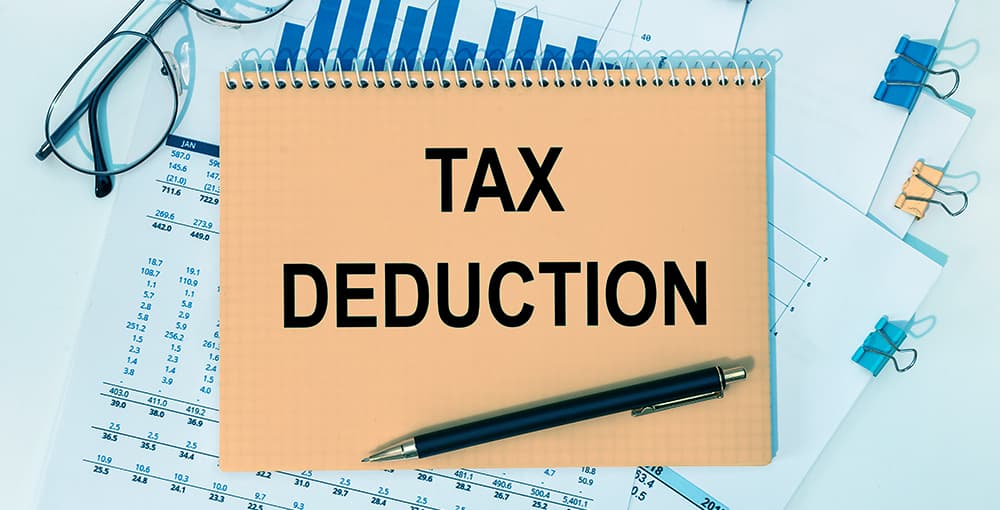
April 12, 2024
Bad Debt Tax Deduction
Welcome to a guide that uncovers the power of the "bad debt tax deduction." Have you lent money that wasn't repaid? This deduction might be your solution. In this article, we'll demystify bad debt deductions and explain how they can help your finances.
What Counts as a Bad Debt?
When it comes to the world of taxes, understanding what qualifies as a bad debt is the first step towards unlocking its benefits. In this section, we'll delve into the specifics of what the term "bad debt" means in the realm of tax deductions.
What exactly is considered a bad debt for tax purposes?
A bad debt for tax purposes is essentially a debt that has gone unpaid and is considered irrecoverable. This means that you've made reasonable efforts to collect the money owed, but despite your attempts, the debtor couldn't or wouldn't repay. When this happens, the IRS recognizes that the amount owed has become a financial loss and allows you to claim a deduction for it.
Can personal loans be considered bad debts?
Absolutely, Personal loans can indeed be considered bad debts if they meet the criteria. Let's say you loaned money to a friend or family member, and they were unable to repay you. If you've exhausted reasonable avenues to retrieve the debt and it's become clear that repayment won't happen, you could potentially qualify for a bad debt deduction.
How does a business-related debt qualify for a deduction?
Business related debts, those incurred as part of your business activities, can also be eligible for a bad debt deduction. This could include situations where you've provided goods or services on credit to a client or customer, and they fail to make payment. To qualify, you must demonstrate that you've made genuine efforts to collect the debt through usual business practices. This could involve sending reminders, notices, or even taking legal action.
Remember, the key factor in determining whether a debt qualifies as "bad" is the genuine effort you've put into trying to recover it.

Who Can Claim Bad Debt Deduction?
Now that we've explored what qualifies as a bad debt, it's time to delve into who exactly is eligible to claim this valuable deduction. Now we'll clarify whether individuals and businesses both can benefit and discuss the essential documentation needed to support your claim.
Can individuals and businesses both claim this deduction?
Both individuals and businesses have the opportunity to claim a bad debt deduction. The IRS recognizes that financial losses due to unpaid debts can affect anyone, whether you're a small business owner, a freelancer, or even an individual who extended a helping hand. However, it's important to note that the rules and procedures may vary slightly depending on whether you're claiming the deduction as an individual or on behalf of your business.
What documentation is needed to prove a bad debt?
When it comes to claiming a bad debt deduction, proper documentation is crucial. Regardless of whether you're an individual or a business, the IRS requires you to provide evidence that supports your claim. Here are the key pieces of documentation you'll want to gather:
Debt Agreement: Having a written agreement that outlines the terms of the loan or credit is a strong piece of evidence. It should detail the amount, the terms of repayment, and any collateral provided.
Communication Records: Maintain records of any communication you've had with the debtor regarding the debt. This could include emails, letters, or even text messages that show your attempts to collect the amount owed.
Invoices and Billing Statements: For businesses, having invoices and billing statements that detail the goods or services provided, along with the outstanding amount, can be instrumental in proving the existence of the debt.
Bank Records: If you've provided a loan, having bank records that show the transfer of funds can validate the transaction.
Evidence of Collection Efforts: This is perhaps the most critical aspect. You'll need to demonstrate that you've made diligent efforts to collect the debt. Keep records of reminders, notices, and any other actions taken to recover the amount owed.
Proof of Default: Ultimately, you'll need to establish that the debtor has defaulted on their obligation. This could be through legal proceedings, a letter from the debtor acknowledging their inability to pay, or other relevant documentation.
By compiling these documents and maintaining a clear record of your collection efforts, you'll be well prepared to support your claim for a bad debt deduction.

Step-by-Step Guide to Claiming the Deduction:
Navigating the path to claiming a bad debt deduction might seem complex, but fear not—we're here to guide you through it. In this section, we'll break down the process into simple steps, making sure you have all the information you need to successfully claim this valuable deduction.
How can you claim a bad debt deduction on your taxes?
To claim a bad debt deduction on your taxes, you'll need to file the appropriate forms and provide the necessary documentation. Here's a step-by-step explanation of the process:
Gather Documentation: As we discussed earlier, compile all the relevant documentation that supports your claim, including the debt agreement, communication records, invoices, and proof of collection efforts.
Complete the Required Forms: The forms you'll need to fill out depend on whether you're an individual or a business.
What forms do you need to fill out?
For individuals:
Form 8949: This form is used to report capital gains and losses, including bad debt deductions. You'll need to provide details about the debt, the amount owed, and your collection efforts.
For businesses:
Schedule D: If you're a business owner, you'll likely need to complete Schedule D, which provides a summary of your capital gains and losses, including bad debt deductions.
Form 8949: Just like individuals, businesses may also need to use Form 8949 to provide additional information about the bad debt deduction.
Is there a specific process to follow?
While there isn't a one size fits all process, there are important steps to follow to ensure your claim is successful:
Complete Accurately: When filling out the forms, accuracy is key. Double-check all the information and calculations to avoid errors that could lead to delays or issues with your claim.
Attach Documentation: Along with the forms, attach the supporting documentation that verifies your claim. This might include copies of invoices, communication records, and evidence of collection efforts.
Submit Your Return: File your tax return, including all necessary forms and documentation, by the deadline. Maintain duplicates of everything you submit for your records.
It's important to note that the process may differ slightly based on your unique circumstances, so consulting with a tax professional or using tax software can be immensely helpful.

How Much Money Can You Get Back?
Discovering the potential financial benefits of a bad debt tax deduction can be exciting. We'll go over how the deduction amount is calculated and any restrictions you should be aware of.
How is the amount of the deduction calculated?
Calculating the amount of your bad debt tax deduction involves a straightforward process, though the specific details may vary based on your situation:
For Individuals: If you're an individual claiming a bad debt deduction, you'll typically report the amount of the debt as a short-term capital loss on Form 8949. This loss can be used to offset other capital gains you might have, potentially leading to a reduction in your overall taxable income.
For Businesses: Businesses often report bad debt deductions on Schedule D, along with Form 8949. Similar to individuals, businesses can use the loss to offset other capital gains, which can ultimately lead to a lower taxable income.
Are there any limitations to the deduction amount?
While bad debt tax deductions can be valuable, there are limitations to keep in mind:
Capital Loss Limitation: The IRS places limits on the amount of capital losses you can claim in a given tax year. If your capital losses exceed your capital gains, you can deduct up to $3,000 of the excess loss ($1,500 if married filing separately)Any remaining losses can be carried over to subsequent years.
Business Deduction Limits: For businesses, the amount of the bad debt deduction may be subject to limitations based on the business's financial situation and the type of debt involved.
Documentation Requirements: Remember that thorough documentation is essential to support your deduction claim. Your claim may be denied if you do not provide proper documentation.
While bad debt deductions can lead to significant tax savings, being aware of the rules ensures you're maximizing your benefits within the bounds of the tax code. Let's proceed to the upcoming sections to unveil even more insights and strategies for making the most of this deduction.

Avoiding Common Mistakes
When it comes to claiming a bad debt tax deduction, knowledge is your best ally. We'll shed light on the most common errors people tend to make and provide practical tips on how to steer clear of these pitfalls.
What are the most common errors people make when claiming this deduction?
Claiming a bad debt deduction might seem straightforward, but there are several pitfalls that individuals and businesses alike can stumble upon:
Insufficient Documentation: Many individuals and businesses fail to provide comprehensive documentation to support their claim. Without proper records of communication, collection efforts, and evidence of default, your claim could be at risk.
Inaccurate Calculation: Misunderstanding the calculation process or incorrectly reporting the amount of the debt can lead to inaccuracies in your claim.
Failing to Distinguish Between Business and Personal Debts: Business and personal debts have different requirements and limitations. Failing to accurately categorize your debt can result in a denied deduction.
How can you make sure you don't make these mistakes?
Avoiding these common errors requires a combination of diligence and understanding:
Thorough Documentation: Keep meticulous records of every step you take, from the initial loan agreement to collection attempts. Maintain a paper trail that demonstrates your genuine efforts.
Educate Yourself: Take the time to understand the specific rules and requirements for claiming a bad debt deduction. Whether you're an individual or a business, being informed will help you navigate the process confidently.
Consult a Professional: If you're unsure about any aspect of the deduction, don't hesitate to seek guidance from a tax professional like Apex Advisors. They can offer expert advice specific to your particular situation.
Double Check Your Work: Before submitting your claim, review all the forms, calculations, and documentation. Ensuring accuracy can save you from potential headaches down the line.
Why You Should Care About Bad Debt Deduction
As we journey through the intricacies of bad debt tax deductions, it's important to understand the tangible benefits that come with this deduction. Here we'll explore how claiming a bad debt deduction can positively impact your finances and potentially lead to a lower tax bill.
How can claiming this deduction positively impact your finances?
The bad debt tax deduction isn't just a technicality; it can have a substantial impact on your financial well being:
Financial Recovery: If you've faced financial losses due to unpaid debts, claiming this deduction provides a way to recover a portion of those losses. By offsetting your taxable income, you can potentially regain some of the funds you thought were lost.
Enhanced Cash Flow: For businesses, the bad debt deduction can improve cash flow. When you've extended credit to clients or customers, non-payment can disrupt your finances. Claiming the deduction can help balance your books.
Improved Financial Standing: Individuals and businesses alike can benefit from the improved financial standing that comes with reducing taxable income. This can lead to better credit opportunities, lower interest rates, and improved overall financial health.
Will it lower your overall tax bill?
Absolutely, one of the primary advantages of claiming a bad debt deduction is its potential to lower your overall tax bill:
Reduced Taxable Income: By deducting the amount of the bad debt from your income, you effectively reduce the portion of your income that is subject to taxation. This reduction can lead to a lower tax liability and more money in your pocket.
Lower Tax Bracket: In some cases, the deduction might even lower your income enough to place you in a lower tax bracket. This can result in even greater tax savings.
More Savings: Whether you're an individual taxpayer or a business owner, every dollar saved on taxes can be redirected towards other financial goals, investments, or operational expenses.

How can you make sure you're aware of any changes in the future?
Staying informed about changes in tax laws and regulations is essential to ensure you continue to make the most of the bad debt tax deduction. Here's how you can stay up-to-date:
Follow Tax News Sources: Keep an eye on reputable tax news sources that provide updates on changes in tax laws. Websites, blogs, and news outlets often publish articles about tax law amendments, ensuring you're aware of any updates that might affect your ability to claim the bad debt deduction.
Consult with Tax Professionals: Tax regulations can be complicated and constantly changing. Consulting with tax professionals, such as accountants or tax advisors, can provide you with expert insights and guidance. They can help you navigate any changes and understand how they might impact your financial situation.
Utilize Government Resources: Government tax agencies often provide resources and guides that detail changes in tax laws. Websites maintained by tax authorities can be valuable sources of information that outline any recent amendments or clarifications.
Sign Up for Alerts: Many tax related websites and government agencies offer email alerts or newsletters that provide updates on tax law changes. By subscribing to these alerts, you can receive timely notifications about any modifications to tax regulations.
Attend Tax Workshops and Seminars: Consider participating in tax workshops, seminars, or webinars. These events are designed to educate individuals and businesses about changes in tax laws and provide practical guidance on how to navigate them.
Regularly Review IRS Resources: The Internal Revenue Service (IRS) offers publications, guidelines, and resources that detail tax law changes. Regularly visiting the official IRS website can provide you with accurate and up to date information.
Conclusion
Review your financial situation, identify any bad debts, and explore the steps to claim this deduction. Remember, informed decisions pave the way to financial success. Don't let opportunities slip away – claim what's rightfully yours and make the most of the bad debt tax deduction.
Don’t forget to share your feelings in the comment section and spread the article as far as possible.
<iframe width="560" height="315" src="https://www.youtube.com/embed/HctZg2aOPMw?si=YzICxMV2iQVvcMjn" title="YouTube video player" frameborder="0" allow="accelerometer; autoplay; clipboard-write; encrypted-media; gyroscope; picture-in-picture; web-share" referrerpolicy="strict-origin-when-cross-origin" allowfullscreen></iframe>

March 11, 2024
First Time Penalty Abatement Is The "First Time Only" Deal You NEED to Know About
Remember that sinking feeling when you finally opened that dreaded IRS notice? "Failure to file?!" my brain screamed, and suddenly, it was a full-on guilt trip with worries about money mess-ups swirling around. I, the king of organization (or so I thought), had become a tax rebel without even realizing it.
Thankfully, my panic attack was short-lived. While wading through all the legal jargon and scary red warnings, I stumbled upon something hopeful: First-Time Penalty Abatement (FTA). Could this be the solution to my tax troubles?
Turns out, it just might be. FTA is a life raft for tax newbies (or forgetful souls like me) who've accidentally been hit with a penalty for the first time. It's a chance to explain your situation to the IRS, and if you fit their requirements, they could forgive that annoying penalty.
So, what exactly is FTA and how does it work?
FTA is like a special "oops" pass from the IRS. It's for folks who accidentally messed up their taxes the first time, maybe by missing the deadline or not paying up on time. If you've been on the straight and narrow with your taxes for the last three years, they might just let it slide and give you a break on those penalties.
But, there's a catch (of course there is). FTA only deals with the penalty, not the actual tax you owe. Think of it like forgetting to pay your gym membership – they might forgive the late fee, but you still gotta pay for those unused treadmills. So, get caught up on that tax before the interest starts piling up like dirty dishes in the sink.
And remember, this is a one-time deal. Don't make a habit of forgetting your taxes – the IRS isn't a bottomless well of forgiveness (and neither is your bank account).

How can I check if I'm eligible for FTA?
So, you've heard about this First-Time Penalty Abatement (FTA). deal, and it's starting to sound pretty sweet. But before you start picturing yourself basking on a beach built of refund checks, let's check if you even qualify for this escape hatch.
Clean Record:
No major penalties in the past three years: This means no big-time screw-ups like failing to file or neglecting your taxes for years. Think of it as having a clean slate with the IRS.
Minor penalties are okay: If you had a small penalty here and there for something like underpaying your estimated taxes, you might still be eligible. Just make sure they weren't "significant" amounts (the IRS doesn't define "significant," but think of it like a parking ticket versus a speeding ticket).
Current Compliance:
Up-to-date with your filings: This means you haven't missed any deadlines for filing your tax returns or extensions.
Payments on track: You haven't skipped out on any payments you owe, whether it's the actual tax amount or any penalties that haven't been waived yet.
Penalty Type:
Failure-to-File Penalty: This one's for the forgetful folks who accidentally leave their tax return gathering dust in a drawer. FTA can wave goodbye to that late filing fee.
Failure-to-Pay Penalty: Oopsie, looks like you forgot to send the IRS their share of the pie. Don't worry, FTA might just let you off the hook for that penalty too.
Failure-to-Deposit Penalty: This one's mostly for businesses that are responsible for collecting and paying payroll taxes. But hey, mistakes happen, and FTA might be willing to overlook your forgetfulness this time.
Remember, just because you tick these boxes doesn't guarantee entry into the penalty-free zone. The IRS has the final say, and they might consider other factors like the reason for your mistake or the amount of the penalty.

How do I start the process for FTA?
Okay, you've checked your tax report card, you're penalty-free material, and now you're ready to plead your case to the big boss of taxes – the IRS. Don't worry, though, this isn't like facing the Dragon in Game of Thrones (although the red tape might feel like fire sometimes). Here's the lowdown on requesting FTA without breaking a sweat (or at least minimizing the sweating).
First things first, you have options:
Phone it in: You can call the number on your notice or head to the IRS website to find the correct one. Be prepared to wait on hold, but hey, think of it as tax-themed elevator music to get you pumped.
Write a letter: If phone calls ain't your thing, grab your pen and paper (or keyboard) and craft a polite, clear letter outlining your situation and requesting FTA.
Form 843: If you've already paid the penalty (don't worry, we'll talk about that later), this form is your ticket to potentially getting those sweet dollars back. It's a refund request form, but for penalties instead of taxes.
No matter which option you choose, keep these tips in mind:
Be polite and professional: Remember, the IRS agents are just people doing their job (even if that job sometimes involves sending scary red-fonted notices). Treat them with respect and you'll have a much smoother experience.
State your case clearly: Explain why you think you qualify for FTA and be specific about the penalty you're trying to get waived. Remember, the clearer you are, the better.
Gather your documents: Having your tax return, proof of income, and any other relevant paperwork handy will make things easier for both you and the IRS agent. Think of it like having your homework done before class.
Be patient: It might take some time for the IRS to process your request, so don't expect an instant answer. Relax, grab that cup of coffee again, and trust the process (as much as you can when dealing with taxes).

What to Do if the IRS Denies My FTA Application?
Remember, requesting FTA isn't a guarantee. The IRS has the final say, and they might have different reasons for denying your request. But don't get discouraged! Let’s explore some other options if things don't go your way.
1. Understand the Reason for Denial:
Carefully review the IRS's denial notice to understand their specific reasons. This will help you determine the best course of action. Common reasons for denial include:
Not meeting the "clean record" requirement (e.g., having penalties in the past three years).
Not being up-to-date with current tax filings or payments.
The penalty type not being eligible for FTA.
2. Consider an Appeal:
If you think the IRS got it wrong or you've got solid reasons to show you should qualify, you can totally challenge their decision.
Here's what you do: fill out Form 12153, the Request for Penalty Abatement. Make sure you've got strong, convincing proof to back up your argument.
3. Explore Other Relief Options:
Payment Plans: If coughing up the penalty all at once is tough, you can ask for a payment plan. The IRS gives you a couple of choices: a short-term one for 120 days or less, and a long-term deal with installment agreements to split the cost over time.
Offer in Compromise (OIC): If footing the whole tax or penalty bill is too much, you can propose a smaller payment through something called an OIC. This lets you suggest paying less. The IRS checks out your finances and what you can manage before making a call.
Penalty Abatement for Reasonable Cause: If there's a good reason why you couldn't file or pay taxes on time, you can ask for penalty relief. You'd need to show a solid reason, like something out of your control that stopped you from meeting your tax duties.
Temporary Hardship: If money's tight because of a short-term problem like losing your job or a sudden medical issue, you might get a break. The IRS could give you some time before collecting or even cut down on the penalties you owe.
4. Seek Professional Guidance:
If you're feeling lost about what to do or need a hand with appeals or other ways to sort out your taxes, think about talking to tax advisors. They're experts who can guide you through this and make sure you're on track to fix things the right way.

Penalty Tastic Finale
Think of FTA as your get-out-of-tax-trouble card, a chance to say "whoops, my bad" to the IRS and maybe, just maybe, escape without a financial hangover. But remember, you gotta be a responsible tax citizen for this to work – clean record, current compliance, and all that jazz.
Now, I know taxes ain't exactly everyone's idea of a Friday night, but hopefully, this guide helped shed some light on this mysterious FTA beast and gave you the tools to fight back against those pesky penalties.
So, if you found this helpful, don't keep it to yourself. Share it with your friends, family, neighbors – anyone who's ever broken out in a cold sweat at the sight of a red-fonted IRS notice.



















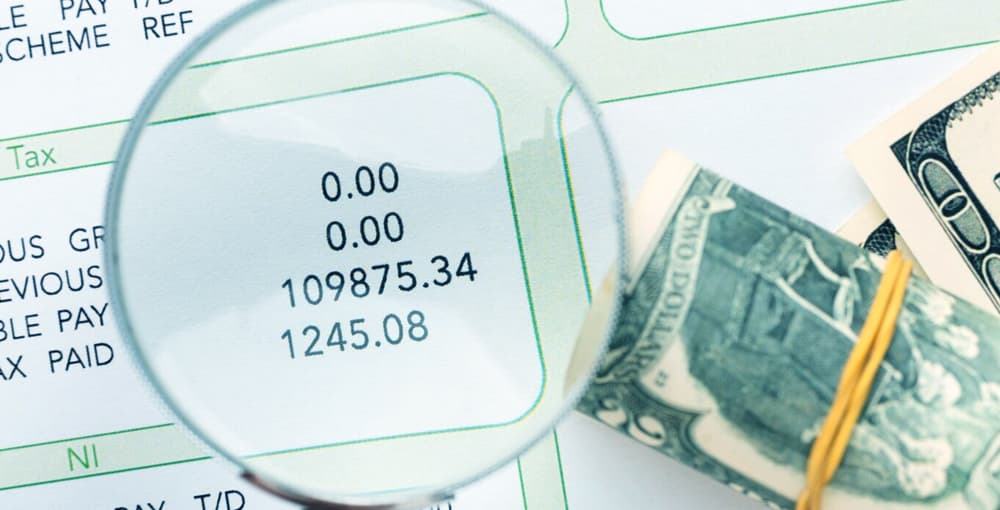




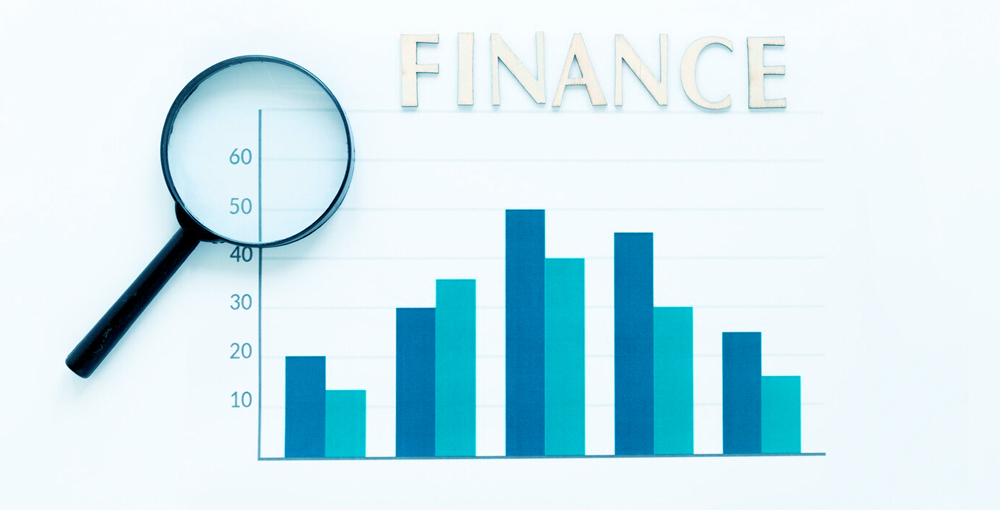
























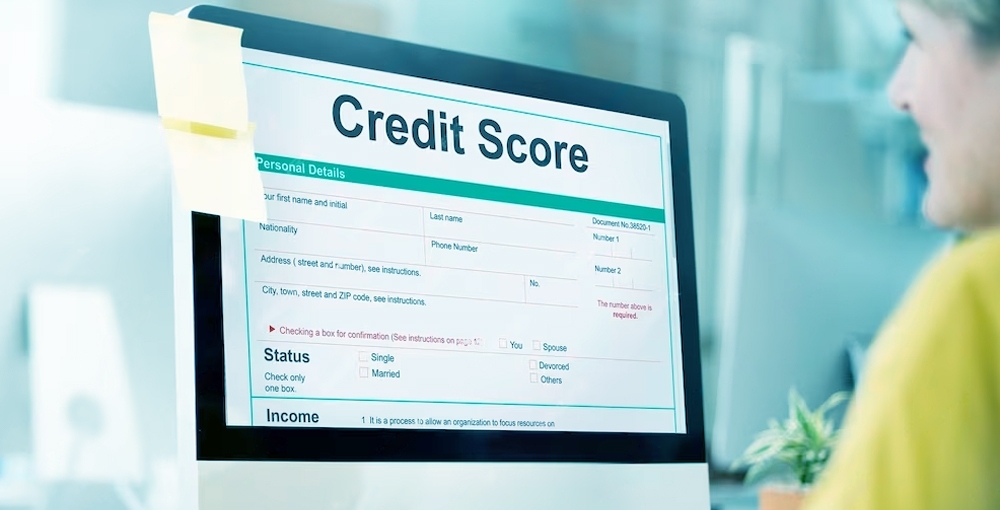









 Don't forget, this is just a roadmap, not a destination. Stay informed about changes in tax regulations and keep your tax strategy flexible to adapt to life's twists and turns. The best tax lane depends on your unique circumstances and priorities. Consult a tax counselor (or Apex Advisors) for personalized advice based on your specific situation and income bracket.
Don't forget, this is just a roadmap, not a destination. Stay informed about changes in tax regulations and keep your tax strategy flexible to adapt to life's twists and turns. The best tax lane depends on your unique circumstances and priorities. Consult a tax counselor (or Apex Advisors) for personalized advice based on your specific situation and income bracket.




























